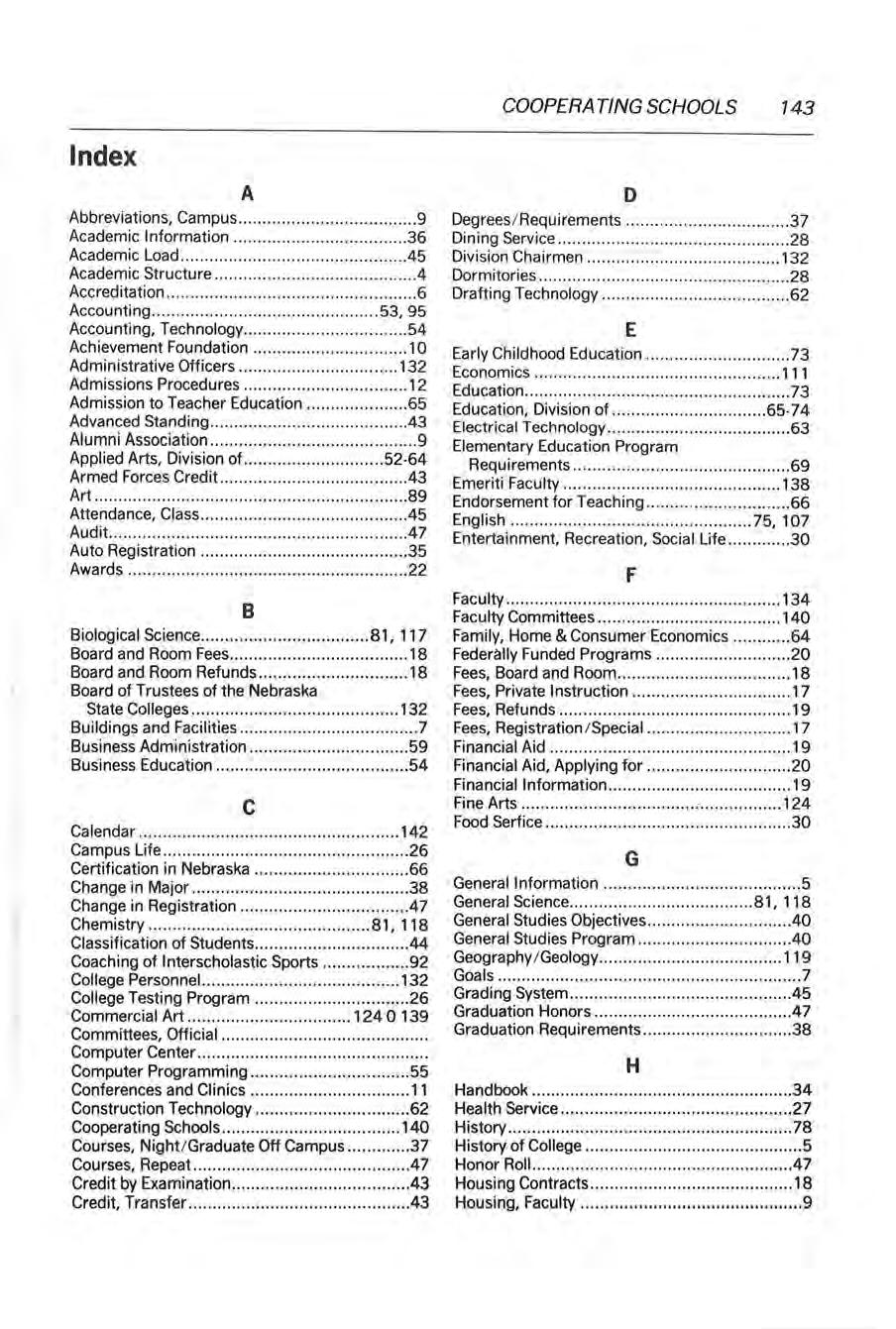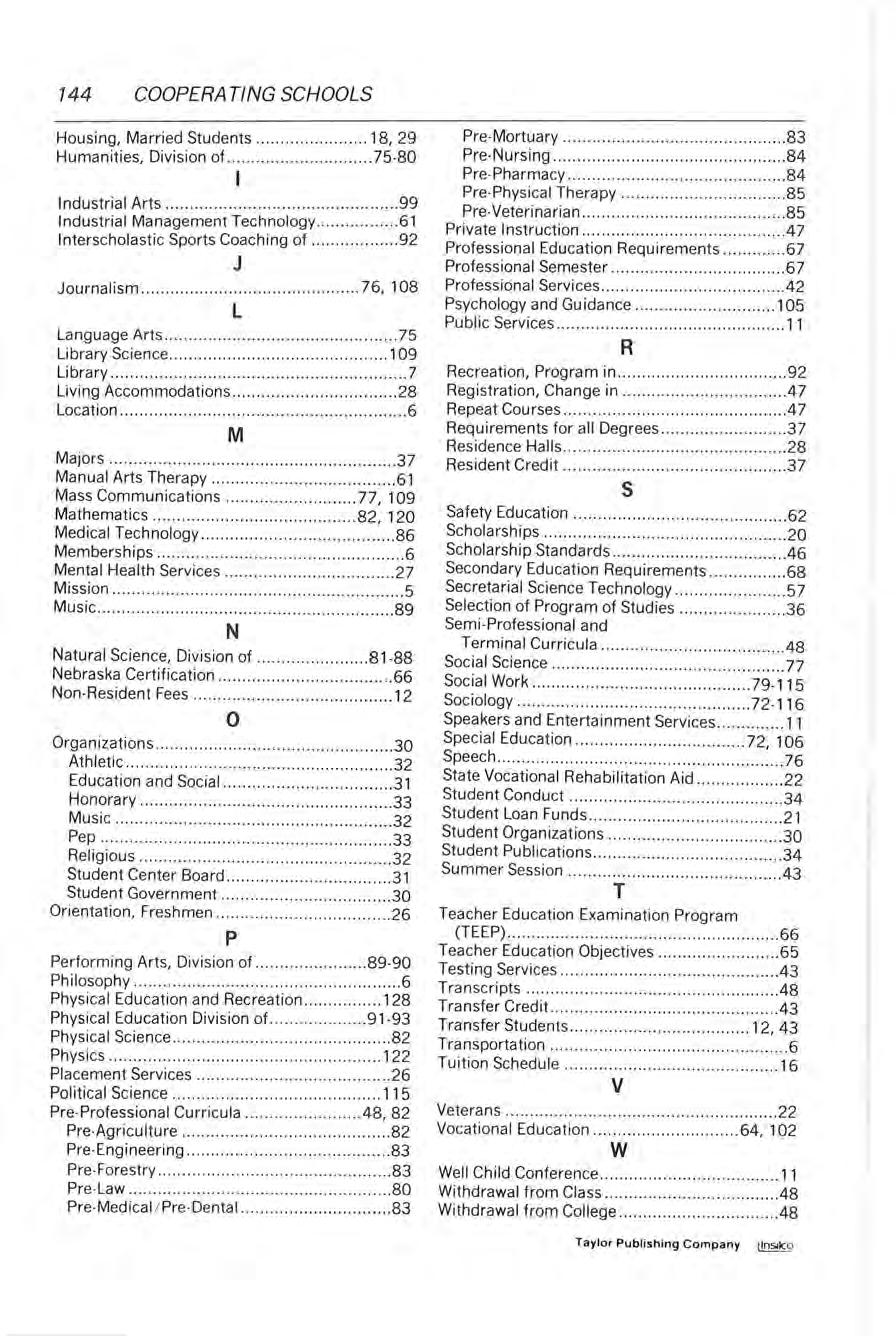




VOL. LXIII, NO. 1, 1977
Published by Peru State College at Peru, Nebraska and entered under Bulk Permit Number 4 at Peru, Nebraska, 68421.
No person attending Peru State Co llege shall , on the grounds of race, color, national origin, or sex be excluded from participation in, be denied the benefits of, or be subjected to discrimination under any program or activity receiving Federal financial assistance.
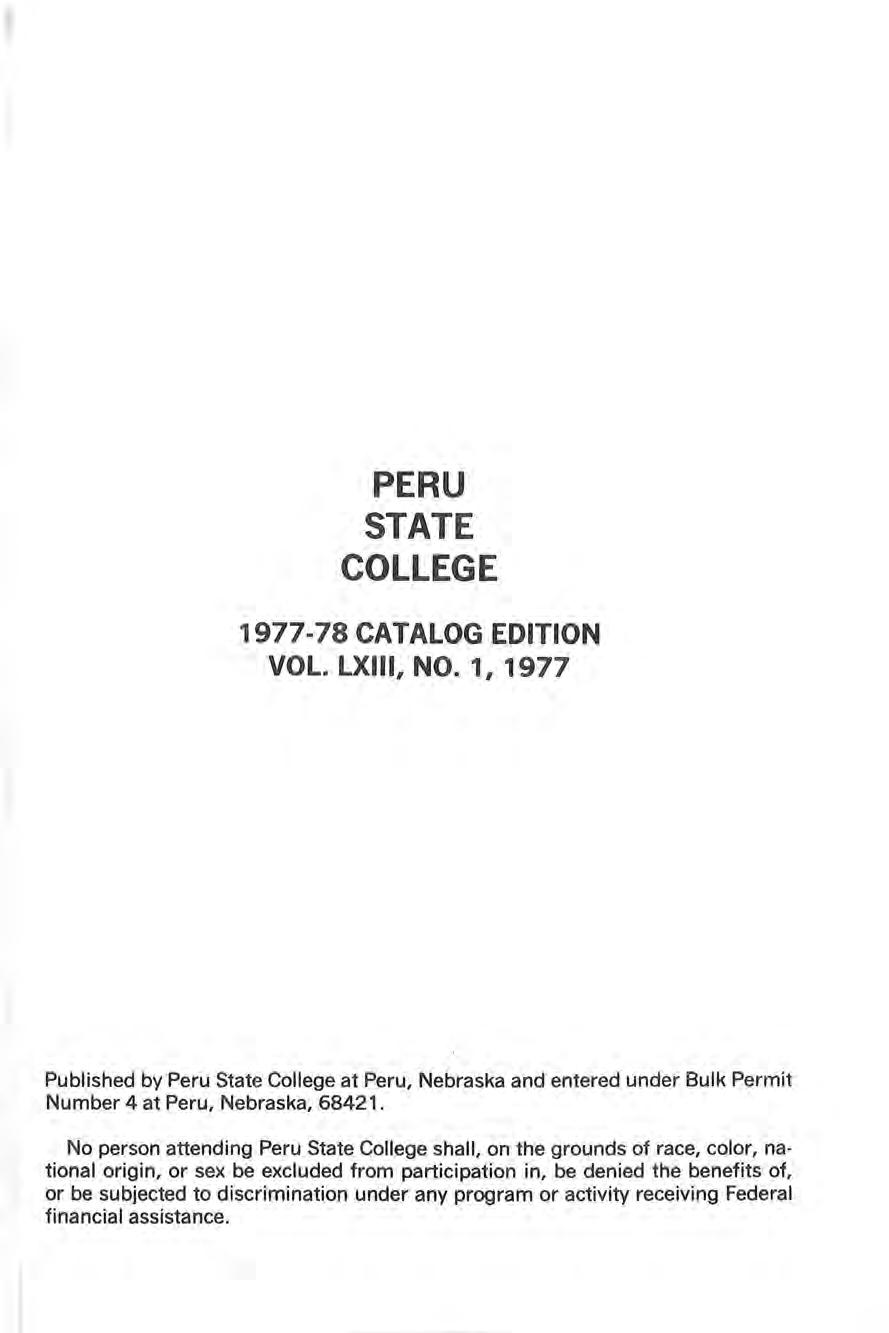
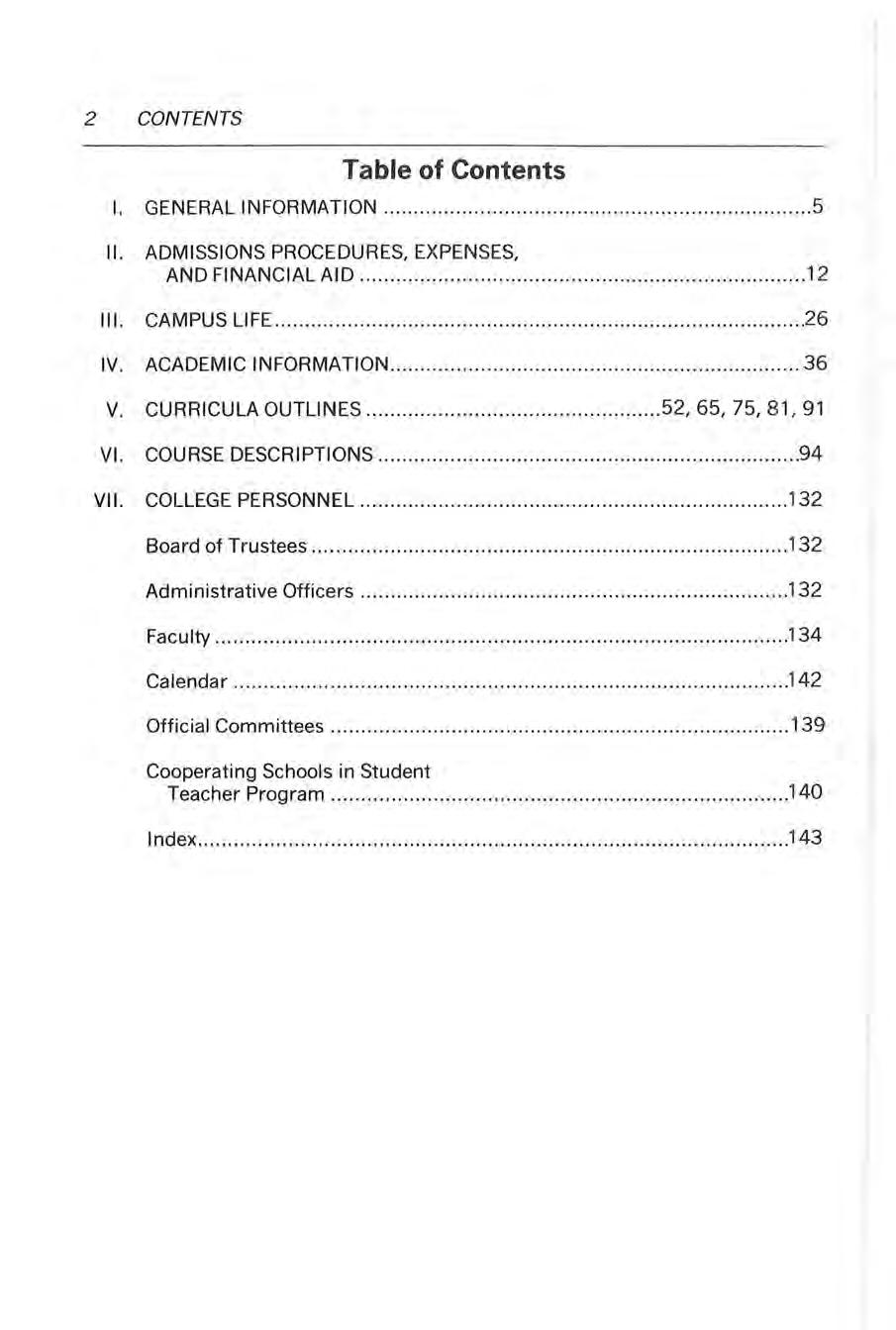
Peru State is the oldest college in Nebraska and the third oldest teachertraining institution established west of the Missouri River Peru was founded the same year Nebraska became a state For more than a century thousands of young people have crossed the Campus of a Thousand Oaks and have gone forth to become teachers and leaders in business and industry in Nebraska and throughout the nation.
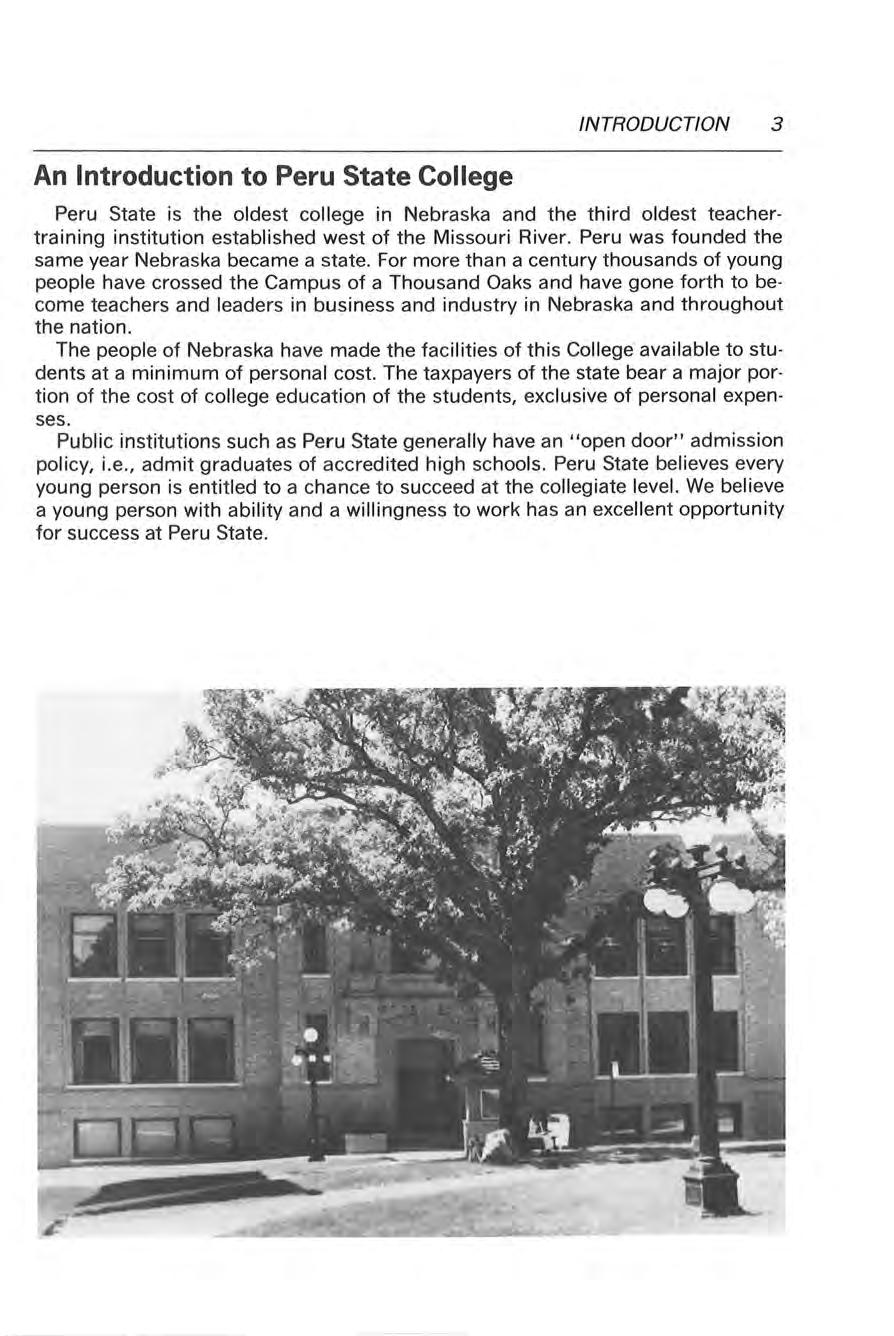
The people of Nebraska have made the facilities of this College available to students at a minimum of personal cost. The taxpayers of the state bear a major portion of the cost of college education of the students, exclusive of personal expenses.
Public institutions such as Peru State generally have an "open door" admission policy, i.e., admit graduates of accredited high schools Peru State believes every young person is entitled to a chance to succeed at the collegiate level. We believe a young person with ability and a willingness to work has an excellent opportunity for success at Peru State.
This College believes in academic excellence, in opportunities for personal growth, and in student self-determination consistent with the principles of a democratically organized society. The administration recognizes that college students are adults and should be involved in the decisions made on campus which affect them. The educational experience provided by the College is designed to enable students to learn, equip themselves for meaningful careers, and become productive members of society.
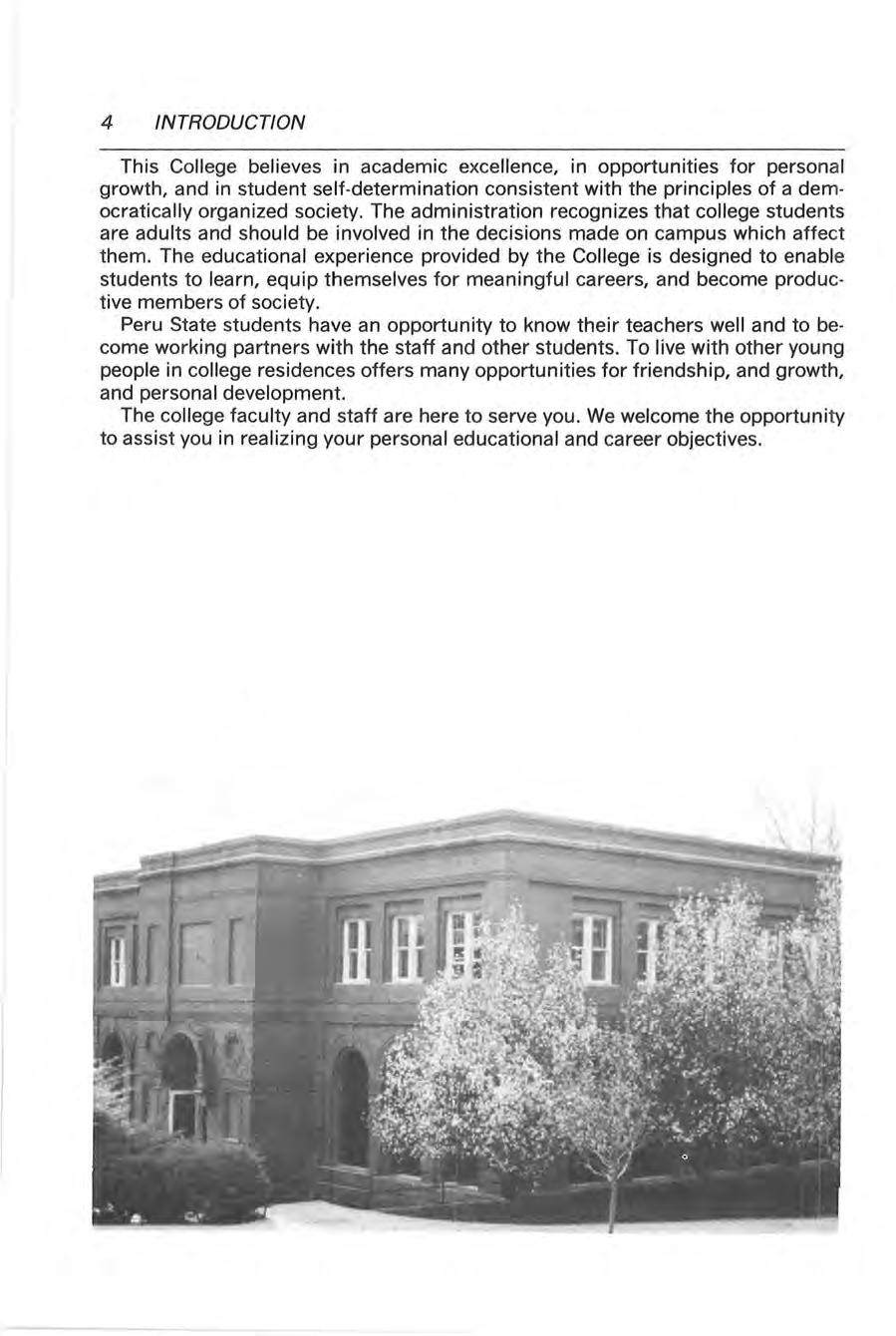
Peru State students have an opportunity to know their teachers well and to become working partners with the staff and other students. To live with other young people in college residences offers many opportunities for friendship, and growth, and personal development.
The college faculty and staff are here to serve you. We welcome the opportunity to assist you in realizing your personal educational and career objectives.
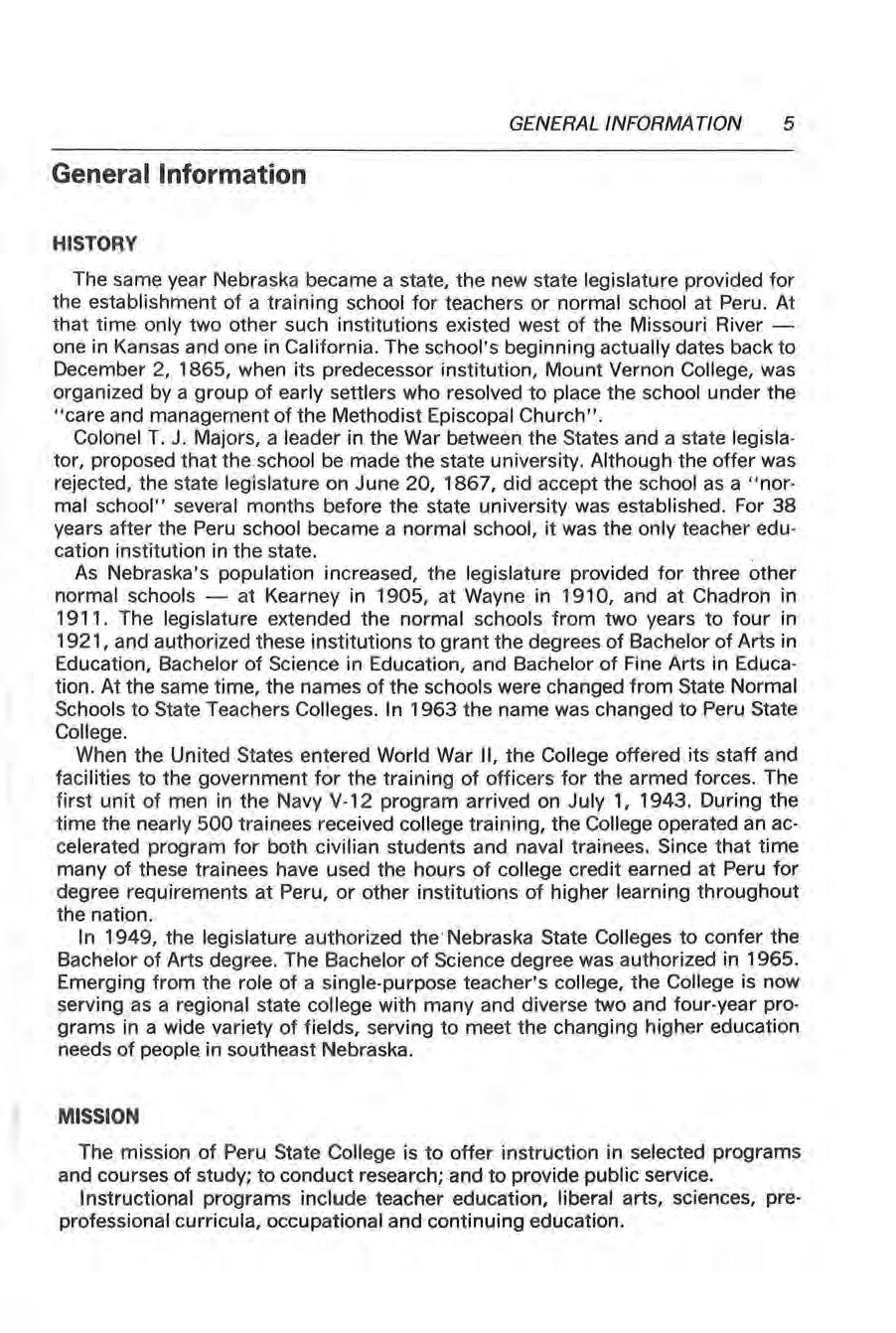
The same year Nebraska became a state, the new state legislature provided for the establishment of a training school for teachers or normal school at Peru. At that time only two other such institutions existed west of the Missouri Riverone in Kansas and one in California. The school's beginning actually dates back to December 2, 1865, when its predecessor institution, Mount Vernon College, was organized by a group of early settlers who resolved to place the school under the "care and management of the Methodist Episcopal Church".
Colonel T J. Majors, a leader in the War between the States and a state legislator, proposed that the school be made the state university. Although the offer was rejected, the state legislature on June 20, 1867, did accept the school as a "normal school" several months before the state university was established. For 38 years after the Peru school became a normal school, it was the only teacher education institution in the state.
As Nebraska's population increased, the legislature provided for three other normal schools - at Kearney in 1905, at Wayne in 1910, and at Chadron in 1911. The legislature extended the normal schools from two years to four in 1921, and authorized these institutions to grant the degrees of Bachelor of Arts in Education, Bachelor of Science in Education, and Bachelor of Fine Arts in Education. At the same time, the names of the schools were changed from State Normal Schools to State Teachers Colleges. In 1963 the name was changed to Peru State College .
When the United States entered World War 11, the College offered its staff and facilities to the government for the training of officers for the armed forces. The first unit of men in the Navy V-12 program arrived on July 1, 1943. During the time the nearly 500 trainees received college training, the College operated an accelerated ·program for both civilian students and naval trainees. Since that time many of these trainees have used the hours of college credit earned at Peru for degree requirements at Peru, or other institutions of higher learning throughout the nation.
In 1949, the legislature a uthorized the· Nebraska State Colleges to confer the Bachelor of Arts degree The Bachelor of Science degree was authorized in 1965. Emerging from the role of a single-purpose teacher's college, the College is now serving as a regional state college with many and dive rse two and four-year programs in a wide variety of fields, serving to meet the changing higher education needs of people in southeast Nebraska.
The mission of Peru State College is to offer instruction in selected programs and courses of study; to conduct research; and to provide public service.
Instructional programs include teacher education, liberal arts, sciences, preprofessional curricula, occupational and continuing education.
Research programs create new knowledge and provide a broader intellect ual and factual basis for extended knowledge.
Public service activities enhance and promote effective living of the people served by the College through assisting in the so lu tion of problems and in the development of increased skills
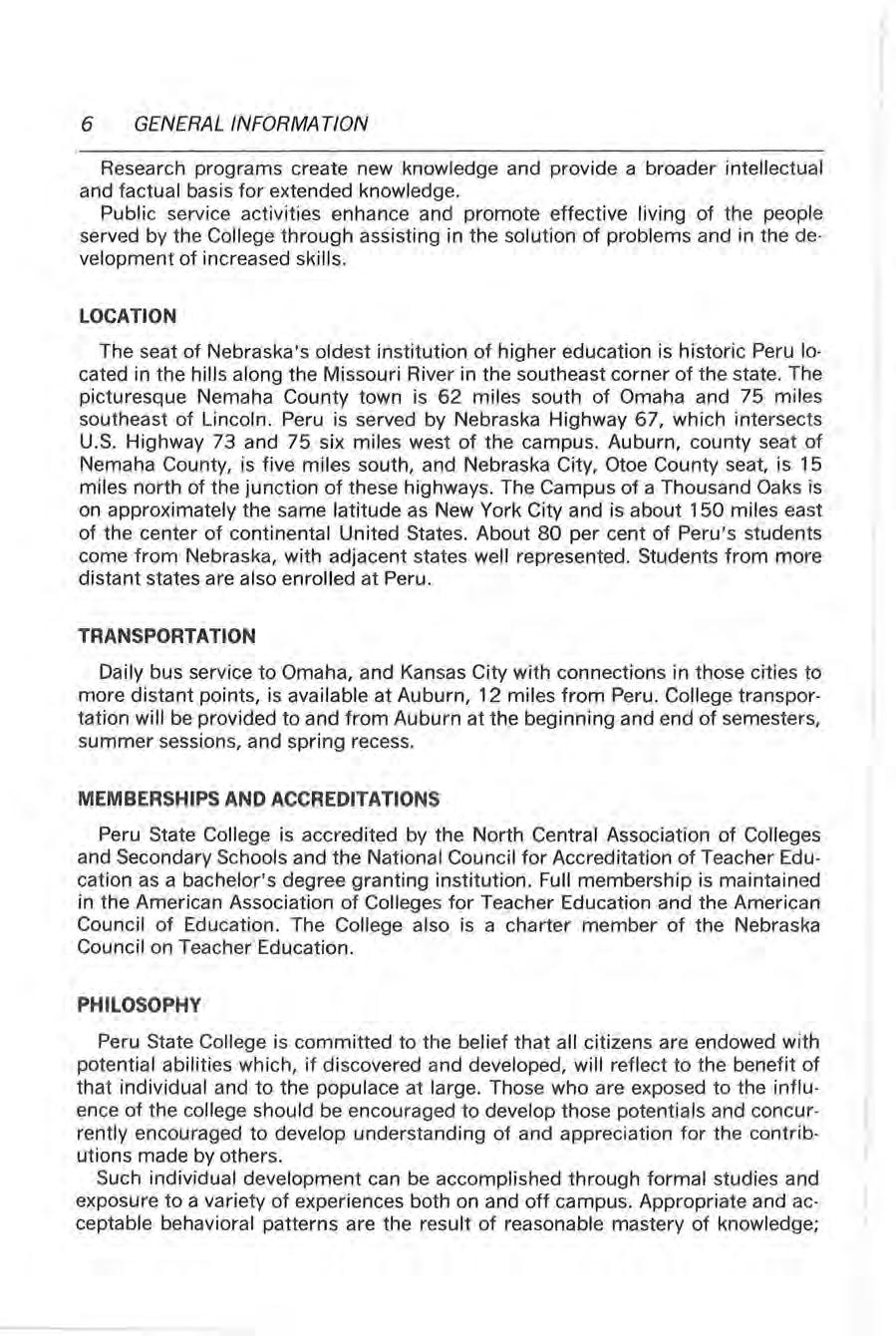
The seat of Nebraska's oldest ins titution of higher education is historic Peru located in the hills along the Missouri River in the southeast corner of the state. The picturesque Nemaha County town is 62 miles south of Omaha and 75 miles southeast of Lincoln. Peru is served by Nebraska Highway 67, which intersects U.S. Highway 73 and 75 six miles west of the campus. Auburn, county seat of Nemaha County, is five miles south, and Nebraska City, Otoe County seat, is 15 miles north of the junction of these highways. The Campus of a Thousand Oaks is on approximately the same latitude as New York City and is about 150 miles east of the center of continental United States. About 80 per cent of Peru's students come from Nebraska, with adjacent states well represented. Students from more distant states are also enrolled at Peru.
Daily bus service to Omaha, and Kansas City with connections in those cities to more distant points, is available at Auburn, 12 miles from Peru. College transportation will be provided to and from Auburn at the beginning and end of semesters, summer sess ion s, and spring recess.
Peru State College is accredited by the North Central Association of Colleges and Secondary Schools and the National Council for Accreditation of Teacher Education as a bachelor's degree granting institution . Full membership is maintained in the American Association of Co lleg es for Teacher Education and the American Counc il of Education. The College also is a charter member of the Nebraska Council on Teacher Education.
Peru State College is committed to the belief that all citizens are endowed w ith potential abilities which, if discovered and developed, will reflect to the benefit of that individual and to the populace at large. Those who are exposed to the influence of the college should be encouraged to develop those potentials and concurrently encouraged to develop understanding of and appreciation for the contributions made by others.
Such individual development can be accomplished through formal studies and exposure to a variety of experiences both on and off campus. Appropriate and acceptable behavioral patterns are the result of reasonable mastery of knowledge;
acquisition of certain skills and techniques, appreciation and understanding of areas beyond narrow personal interests, and from meaningful religious and social experiences.
To increase the quality and diversity of programs to provide for the differing aptitudes, interests, and needs of the people it serves.
To intensify a milieu of academic excellence.
To enhance the intellectual cooperation between the liberal and applied arts
To promote involvement of both students and faculty in experimental and creative research.
To strive to be a more effective public service institution.
To offer continuing and occupational education for personal and career enrichment.
To explore new and creative educational opportunities for students.
To serve as a transitional educat ional institution for students pursuing various occupational, vocational, and professional objectives.

To prepare students to become contributing members of a democratic society.
To enhance student development outside of the classroom setting.
ADMINISTRATION. The administration, business, personnel; and professional services are housed in this building which was built in 1911 and completely renovated in 1967. The campus post office and telephone switchboard are located on the first floor.
LIBRARY. The original library was established in 1869. The first story of the present building was occupied in 1905 with a second story added in 1911. The interior of the building was completely torn out and replaced with modern stacks, reading rooms, audio-visual rooms, study carrels, seminar rooms in 1962, and now houses over 75,000 volumes.
SCIENCE. The W. F. Hoyt Hall was put into use in 1930 and named for a long time professor of science. This building was remodeled and renovated in 1970 and again in 1974.
FINE ARTS CENTER. This building was occupied in January 1966. It was named in honor of V. H. Jindra, Professor Emeritus of Strings, with the Exhibition Court named for Norma Diddel, Professor Emeritus of Art, and the Auditorium named for Robert T. Benford, Professor Emeritus of Piano and Organ. The facility provides quarters for music, speech, drama and art.
INDUSTRIAL ARTS. The Industrial Arts Building was opened in 1960 and named for A. V. Larson, who had served as Chairman of the Industrial Arts Department for many years. This facility is used to provide training and equipment
in power mechanics, electricity-electronics, industrial crafts, woodworking, meta l working, drafting, graphic arts, photography, and related areas.
EDU CATION. Built in 1916 and named in honor of a founder of the College, the T. J. Majors Campus School became the Education Building when the legislature phased out laboratory schools in 1967. Besides housing the School of Education , it also contains the business education, geography, and home economics departments.
AUDITORIUM. The original facility built in 1922 was completely remodeled in 1969, with a seating capacity of approximately 650. Campus closed-circuit radio station is located in the south wing over the lobby.
GYMNASIUM. The gymnasium evolved from remodeling of the original Colleg e Chapel building in 1921, through reconstruction projects in 1928 and 1949, to the present facility which houses two basketball floors, gymnastics and wrestling rooms, tile swimming pool, locker and shower rooms for men and women, as well as physical education offices and classrooms.
OAK BOWL. Concrete seats were built on the west side of a natural bowl in 1955, to provide seating for more than 2,500 spectators at athletic events. Complete dressing rooms for home and visiting teams were added to the area in 1968. Surfaced tennis courts are south of the Oak Bowl; the baseball diamond is north of the playing field.
COMPUTER CENTER. The Computer Center, located on the first floor in the Administration Building, is designed to serve students, faculty and the college administration as an instructional and administrative tool. This IBM computing system "understands" several programming languages, including Fortran, Cobol, RPG, and APL. The center is operated on an "open shop" basis, giving student s hands-on experience in programming and operating modern computing equipment.
HEALTH CENTER. The Student Health Service, which provides first aid treatment and hospitalization for students needing emergency medical care, operates in the Health Center. A registered nurse is in residence at the Center and wo r ks under the direction of the College physician

STUDENT CENTER . This facility was occupied in January, 1961, with more dining space and services added in the fall of 1965. The building houses din i ng rooms, meeting rooms, a lounge, faculty room, game room, bookstore, and snack bar.
COLLEGE BOOKSTORE. The College Bookstore is located on the lower floor of the Student Center. Current textbooks are carried in stock. School supplies are available at moderate prices.
RESIDENCE HALLS. A full -time advisor is on duty in each hall with an apartment off the main lobby. Each hall has lounge and recreation areas , laundry, and snack facilities.
Morgan Hall, named for Miss Eliza Morgan, first pr eceptress of the College, was opened in September, 1929, and enlarged in 1960 to house 184 coeds. Major renovation was completed in 1966. •
Delzell Hall, erected in 1939 and remodeled in 1958 with further renovation in 1969, accommodates 151 men. This building was named for W. N. Delzell, faculty member and dean of men from 1905 to 1939.
Majors Hall. The 90-man East Wing was built in 1960 and named for A. D. Majors, long time governing Board member and nephew of founder T. J. Majors. In 1965, a 122-man West Wing was added .
CENTENNIAL COMPLEX. The co-educational seven-unit complex is almost a community in itself, housing 234 students in six structures Dedication of these facilities took place in 1967 during celebration of the College's Centennial year, each unit being named in honor of long-term faculty members. Students are housed in suites of two or three bedrooms, living room, and full bath.
Davidson and Palmer Halls, named for Nona Palmer and Phyllis Davidson, house women. Clayburn and Mathews Halls house men and are named for A. B. Clayburn and L. B. Mathews. Neal Hall is used by Complex residents when economically feasible, otherwise students are provided meals at the Student Center
MARRIED STUDENT HOUSING. Five housing units containing eight twobedroom apartments and six one-bedroom apartments, were completed for occupancy in 1956, in a park -like setting east of the Oak Bowl. All are furnished with basic kitchen equipment.
Nicholas Hall at Centennial Complex was converted to apartments for married students in 1970:Pate Hall at Centennial Complex is used to house guests. Each apartment contains kitchen -dining area, living room, full bath, and one or two bedrooms. All are furnished.
FACULTY HOUSING. Two units were completed in 1956, containing two onebedroom apartments, four two -bedroom apartments, and two three-bedroom apartments for faculty use Kitchen appliances furnished.
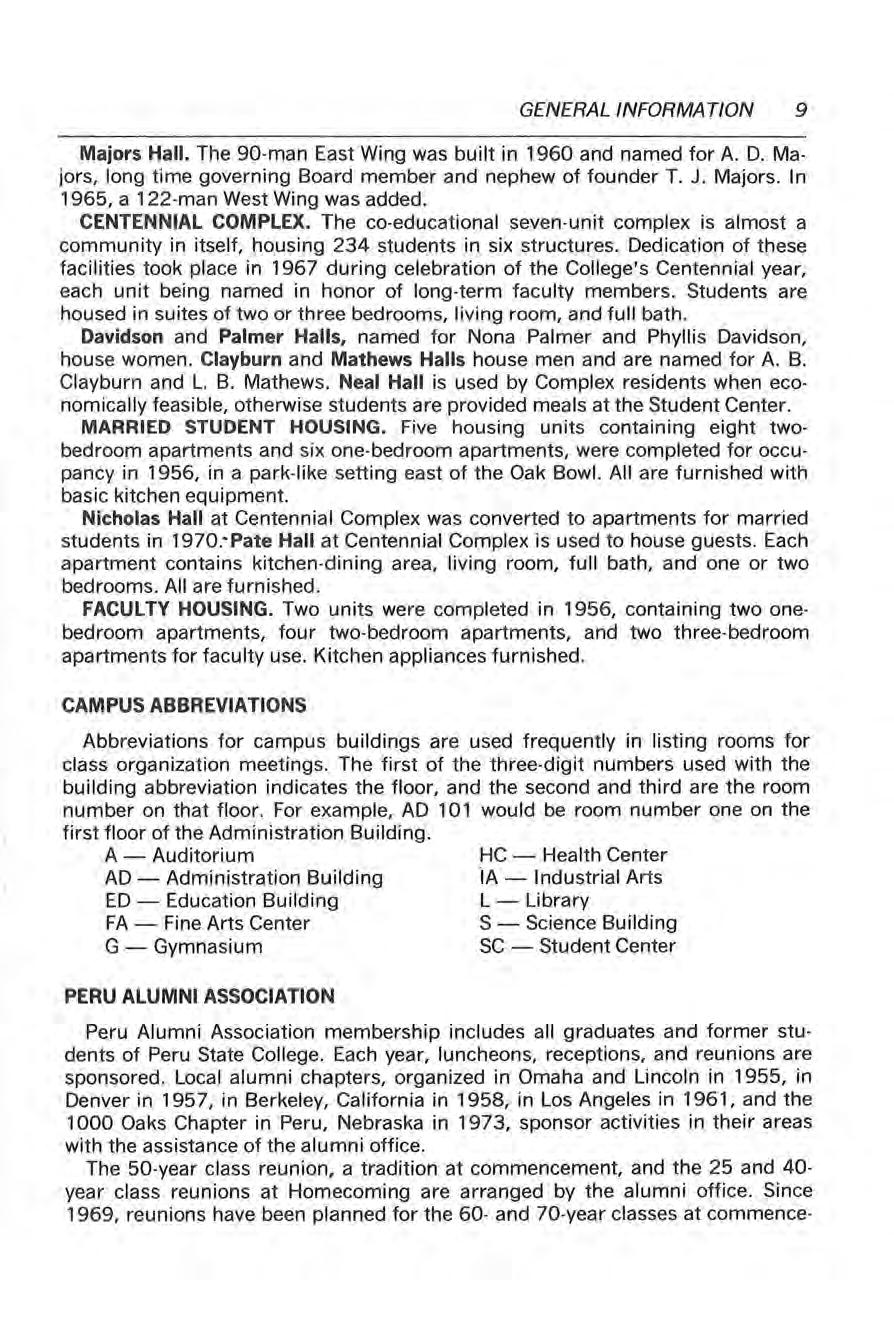
Abbreviations for campus buildings are used frequently in listing rooms for class organization meetings . The first of the three-digit numbers used with the building abbreviation indicates the floor, and the second and third are the room number on that floor. For example, AD 101 would be room number one on the first floor of the Administration Building.
A - Auditorium
AD - Administration Building
ED - Education Building
FA - Fine Arts Center
G - Gymnasium
HC - Health Center
IA - Industrial Arts
L - Library
S - Science Building
SC - Student Center
Peru Alumni Association membership includes all graduates and former students of Peru State College. Each year, luncheons, receptions, and reunions are sponsored. Local alumni chapters, organized in Omaha and Lincoln in 1955, in Denver in 1957, in Berkeley, California in 1958, in Los Angeles in 1961, and the 1000 Oaks Chapter in Peru, Nebraska in 1973, sponsor activities in their areas with the assistance of the alumni office.
The 50-year class reunion, a tradition at commencement, and the 25 and 40year class reunions at Homecoming are arranged by the alumni office. Since 1969, reunions have been planned for the 60 - and 70-year classes at commence-
ment. At Homecoming special invitations are extended to classes of five -year i ntervals for the alumni luncheon.
The Alumni Office. Located in the Administration Building, the office rr-aintain s a file of all graduates and many former students. Degree and diploma recipient s are filed by classes as well as alphabetically and geographically . A collection of yearbooks, commencement programs, alumni publications and other memorabilia is housed in the Services Building. The office cooperates with the Library in maintenance of archival materials in the special collection room of the Library.
The Peru Stater, an alumni magazine , - is distributed three times each year to alumni, former students, and friends of the Colleae .
As a result of the work of a group of alumni, the Peru Achievement Foundation was organized in June, 1955, and incorporated as a non-profit corporation for educational and charitable purposes on May 21, 1962.
Organized for the promotion and support of Peru State College, the Foundation has as its primary purpose: "to aid, assist, and promote the educational program, faculty, employees, students, and to encourage the attendance .. . of worthy and deserving students, and to grant scholar s hips and student loans to deserving students.''
This purpose is accomplished through the solicitation and acceptance of "gi f t s, grants, devises and bequests of real or personal property, or both, and to hold, administer, use and dispose of the same, both principal and income ... " from alumni and friends of the College.
Since the beginning in 1955, the Peru Achievement Foundation has provided scholarships; administered scholarships for various organizations, individuals and groups; furnished all matching funds for the National Defense Student Loan Program; provided for the furnishings of the small dining room in the Student Center; and has in other ways promoted t he College.
The primary purpose for maintaining student records at Pe r u State College is to assist students in their educational endeavors and to reflect institutional action. It is the policy of Peru State College to provide students the right to inspect, review, and challenge education records as provided in the Family Education Rights and Privacy Act of 1974 (Buckley Amendment) .
A publication which contains detailed information about the Buckley Amendment is entitled "Implementing Procedures Regarding the Access to and Dissemination of Information About Students at Peru State College" and it is available upon request at the Office of Student Services. Students are also advised of their right to file complaints concerning alleged failures by the College to comply wi t h the r equirements of the Buckley Amendment. Complaints are to be addressed to this agency: The Family Education Righ t s and Privacy Act Office (F.E.R.P.A.), Department of Health, Education and Welfare, 330 Independence Avenue, S W., Washington, D.C. 20201.

Conferences and Clinics. Nearly every month during the academic year the College is host to various conferences and clinics for high school and adult education groups. The College offers its facilities to these groups in an effort to make the institution serve the educational needs of the entire region which the College serves. In recent years music clinics for high school choral groups, bands and individual instrumentalists, clinics in speech and dramatics, meetings of business and industrial conferences, and meetings of fraternal and civic groups, as well as of women's social and educational organizations, and special interest groups, have been held on campus.

Speakers and Entertainment Services. Schools, civic, and educational organizations are invited to make use of speakers, programs, and entertainment available through the College. Faculty members are available to speak throughout the year, as well as for commencement addresses in high schools. Musical and dramatic programs, demonstrations, debates, and lectures also may be arranged through the College.
Well Child Clinic. Any child, preschool or elementary age, regardless of residence or income, is eligible to attend the Well Child Clinic at the College. The clinic, the first Friday of each month from 2 to 5 p.m. is conducted by the College in cooperation with the Southeast Nebraska Community Action Council and the State Department of Health.
Admission to Peru State College is granted to any individual who has graduated from an accredited Nebraska high school and who has not previously attended college. Out-of -state students who choose PSC generally have a good academic record in high school. The "open admissions" policy for Nebraska residents has proven time after time that highly motivated students can succeed at PSC although their academic performance in high school was below their capabilities. If you are in doubt about the likelihood of your success at PSC, you are encouraged to discuss your qualifications , goals and motivation with the experienced counselors in the Office of Admissions. For advice or for information about specific programs , please feel free to write, call or visit the Office of Admissions, Peru Sta t e College, Peru, Nebraska 68421 (phone 4 02 / 872-3815, Ext. 221 )

Peru State College follows the "rolling admissions" policy As soon as all of the admissions mate r ials are completed and received, you will be admitted. You are urged to submit your application for admission early in your senior year of hi g h school.
Nebraska Resident - If you are a Nebraska resident and a prospective freshman, you should:
1. Submit an application
2. Submit a $10 non-refundable Admission-Matriculation Fee
3. Submit verification of high school enrollment or the completed high school transcript
4 Designate Peru State College to receive ACT examination results
Out of St ate Applic ants - If you are an 0ut-of-state applican t, you should:
1. Submit an application during the first semester of your senior year in high school
2. Submit a $10 non-refundable Admission-Matriculation Fee
3. Submit a high school transcript
4. Designate Peru State College to receive ACT examination results
Transfer Stud ents - If you are a transfer student you may be admitted to PSC if you are eligible to return to the college or university last attended. You should:
1. Submit an application
2 Submit a $10 non -refundable Admission-Matriculation Fee
3 Complete and return the Student Reference Form mailed to you from the Office of Admissions
4. Submit official transcripts from each college attended
5. Submit results of ACT if you have completed fewer than 12 hours of college credit.
Applicants who have received an Associate of Arts degree or Associate of Science degree from an accredited community college will submit the same materials required of transfer applicants, as listed above. An applicant who has received an Associate of Arts degree may be determined as having met the General Studies requirements of Peru State's degree programs. Associate of Arts programs are reviewed and approved by the Academic Affairs Commission of Peru State College.
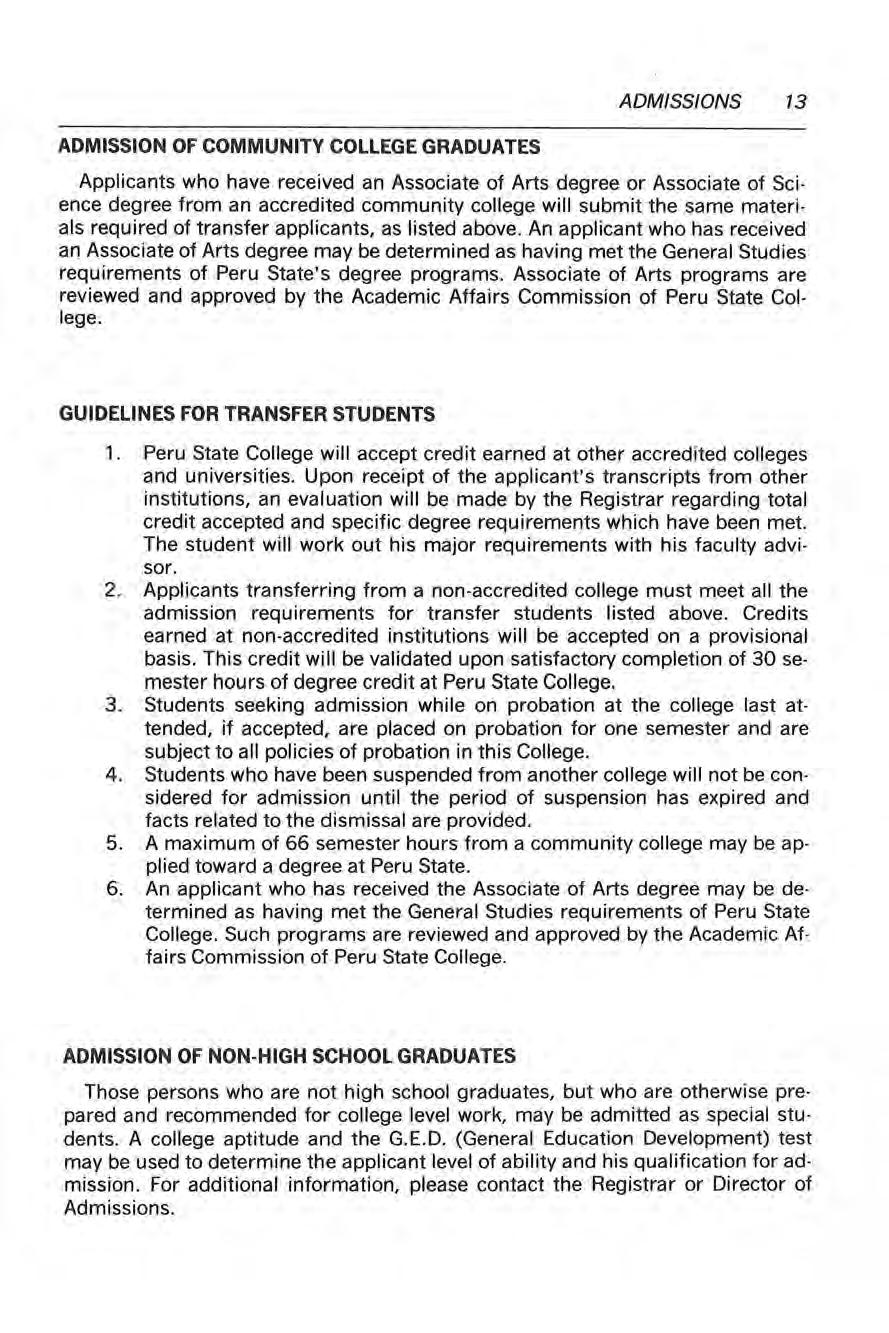
1. Peru State College will accept credit earned at other accredited colleges and universities. Upon receipt of the applicant's transcripts from other institutions, an evaluation will be made by the Registrar regarding total credit accepted and specific degree requirements which have been met. The student will work out his major requirements with his faculty advisor
2. Applicants transferring from a non-accredited college must meet all the admission requirements for transfer students li sted above. Credits earned at non-accredited institutions will be accepted on a provisional basis. This credit will be validated upon satisfactory completion of 30 semester hours of degree credit at Peru State College.
3. Students seeking admission while on probation at the college last attended, if accepted, are placed on probation for one semester and are subject to all policies of probation in this Co llege.
4. Students who have been suspended from another college will not be considered for admission until the period of suspens ion has expired and facts related to the dismissal are provided.
5. A maximum of 66 semester hours from a community college may be applied toward a degree at Peru State .
6. An applicant who has received the Associate of Arts degree may be determined as having met the General Studies requirements of Peru State College. Such programs are reviewed and approved by the Academic Affairs Commission of Peru State College.
Those persons who are not high school graduates, but who are otherwise prepared and recommended for college level work, may be admitted as special students. A college aptitude and the G.E.D. (General Education Development) test may be used to determine the applicant level of ability and his qualification for admission. For additiona l information, please contact the Registrar or Director of Admissions.
All undergraduate students who have previously attended PSC and were admitted to pursue an academic program, students who withdraw during a semester or discontinue studies a semester or more (summer excluded), and all postgraduates seeking an additional academic program must apply at the Office of Admissions for readmission.
Applicants should apply for readmission at least four weeks prior to the opening date of the semester or session for which they desire readmission .
Students are generally readmitted for the semester or summer term they wish to again commence their studies provided they left the college in good standing .
Students who interrupted their . studies and were on academic probation will generally be readmitted for the semester or summer term they wish to reente r provided they are in good standing with regard to all other related concerns.
Students who were academically suspended during a semester or summer te r m will not be considered for readmission until two semesters have elapsed (summe r session excluded).
Previously suspended students who are readmitted will, in general, be subject to permanent suspension if they are suspended for a second time.
Students readmitted to the college can continue under the guidelines of their previous academic program as outlined in the general college bulletin of the year of first entry provided they meet the normal progress policy. Some additional requirements may be expected because of possible changes within respective programs. In addition, readmitted students should not expect continuance in a program that has been or is being phased out of the curriculum.

Readmitted students are subject to all college policy and regulations and those additional provisions determined as a condition for readmission.
APPEAL PROCEDURE. Former students denied readmission may appeal to t he Academic Affairs Commission. The appeal shall be submitted in writing to t he Vice President of Academic Affairs. The appeal should clearly and specifically i ndicate the grounds upon which the appeal is based .
A student may apply for admission to Peru State College at three different academic periods:
Fall Semester - August
Spring Semester - January
Summer School - June
Please check the calendar in the back of this publication for exact beginning dates.
A student who completes his high school program at mid-year may avoid loss of time by entering Peru State at the beginning of the second semester. If this semester of work is followed with attendance in the summer session, the student may be classified as a sophomore for the following school year . Transfer students
will find that the transition to Peru State at mid -year can be accomplished with minimal disruption to their educational program.

Tuition and Fees
(Subject to change)
ESTIMATED COSTS PER SEMESTER
Fixed Costs
Tuition (15 credit hours)
Fees, Student Center, Programs, Health I.D.
Board and Room (18 Meal Plan)
Delzell or Morgan Hall
Centennial Complex
Total •Living at Delzell / Morgan
Total •Living at Complex
ESTIMATED VARIABLE COSTS PER SEMESTER
Registration of Car (Once Per Year) Books and Supplies Travel,
•~Tuition, Fee and / or Board and Room charges may be changed at any time by the Board of Trustees of the Nebraska State Colleges.
Residents of the State of Nebraska pay a tuition charge of $15 50 per cred it hour.
Non.Residents of the State of Nebraska pay a tuition charge of $27.50 per credit hour
Fees must be paid each semester at the time of registration. No person may at· tend classes or take any examination until these fees are paid or special arrange• ments are made with the Business Office.

Regular Semester (each semester)
Full time student (12 hours or more)
Part.time on•campus student (fewer than 12 hrs.)
Short, special, or workshop course on campus
facility use fee
Summer Session
Full.time students
Short, special, or worksho~ course on campus
The Student Center Fee and facility use fee are not refundable
part thereof
Regu lar semester (each semester)
(All students enro lled in seven or more hours)
The Student Programs Fee is not refundable.

Regular Semester (each semester)
(All students enrolled for 7 or more hours)
Summer Session
Full -Time Student (entire session) Short, Special or Workshop Course
The Health Center Fee is not refundable.
Identification Card
Regular Semester students enrolled in seven or more hours will be required to purchase a student I.D Card for each academic year.
Motor Vehicle Registration
Every Regular Semester day student operating a motor vehicle in the city of Peru is required to register the vehicle with the Co llege.
Admission-Matriculation Fee
An Admission-Matr iculation fee of $10 must accompany all applications for admission. This fee is not refundable and it does not apply toward tuition Paid Once Only.
Late Registration Fee
Effective the first day of classes
Late or Make-up Exam
Administration of CLEP Test
Private Music Lessons (per le sson) (Charged to Non -Music Majors)
Graduation Fee
Include s cap and gown rental
Replacement of I.D. Card
Dual Degree Transcript (after first copy)
Placement Bureau Subscription
(Fo r each placement year Sept .-Aug.)
Student Spouse Activity Ticket (per semester)
Course Fees
Some courses require additional materials, supplies or laboratory fees
BOARD AND ROOM CHANGE
(Subject to Change)
Room and Board Rates
Room and Board: 15 Meal Plan
Delzell and Morgan Halls
Centennial Complex
Room and Board: 10 Meal Plan
Delzell and Morgan Halls
Centennial Complex
Room Only (juniors and seniors only)
Delzell and Morgan Halls
Centennial Complex
Private Room (optional)
1977 Summer Sessions (Per Session) (Room Only)
Room and Board Installment Plan
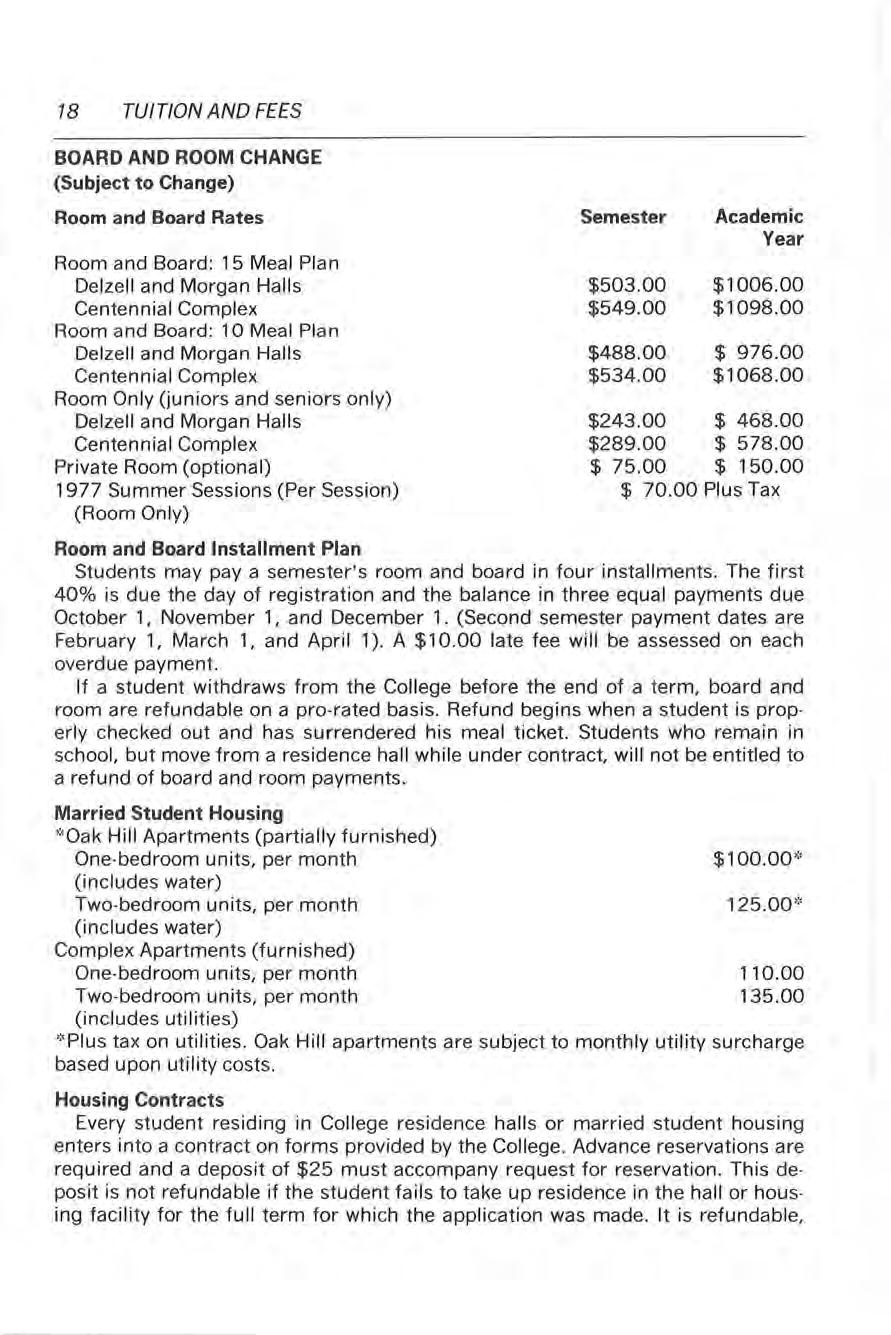
Students may pay a semester's room and board in four installments. The first 40% is due the day of registration and the balance in three equal payments due October 1, November 1, and December 1. (Second semester payment dates are February 1, March 1, and April 1) A $10 00 late fee will be assessed on each overdue payment.
If a student withdraws from the College before the end of a term, board and room are refundable on a pro -rated basis. Refund begins when a student is properly checked out and has surrendered his meal ticket. Students who remain in school, but move from a residence hall while under contract, will not be entitled to a refund of board and room payments.
Marri e d Student Housing
,:,oak Hill Apartments (partially furnished)
One -bedroom units, per month (includes water)
Two-bedroom units, per month (includes water)
Complex Apartments (furnished)
One-bedroom units, per month
Two-bedroom units, per month (includes utilities)
,:, Plus tax on utilities. Oak Hill apartments are subject to monthly utility surcharge based upon utility costs .
Every student residing in College residence halls or married student housing enters into a contract on forms provided by the College. Advance reservations are required and a deposit of $25 must accompany request for reservation . This deposit is not refundable if the student fails to take up residence in the hall or housing facility for the full term for which the application was made. It is refundable ,
les s deduction for damage to the buildings and / or equipment, at the end of the term, provided the student is in residence for the full term, or the student withdraws from the College because of reasons beyond his control, as determined by the College.
Refunds will be made only after required withdrawal procedures are completed. Refunds will be made as of date of approved withdrawal, from the College Tuition refunds may be made for a reduction in class hours during the first two weeks of a semester .
Proportionate refunds will be made to students withdrawing from College within a given period. Fees will not be refunded unless collected in error. The following schedule will be followed in refunding tuition:
The purpose of financial assistance is to provide students with sufficient funds to meet all costs of obtaining a college education beyond what they and their parents are able to provide . Thus, financial aid enables many students from low and middle income families to attend college who could not otherwise afford that opportunity.
Any assistance granted is awarded according to the financial need of the applicant. (Financial need is the difference between the money a student and his parents can provide for an education and the costs of that education.) To be considered for assistance, the applicant must demonstrate financial need
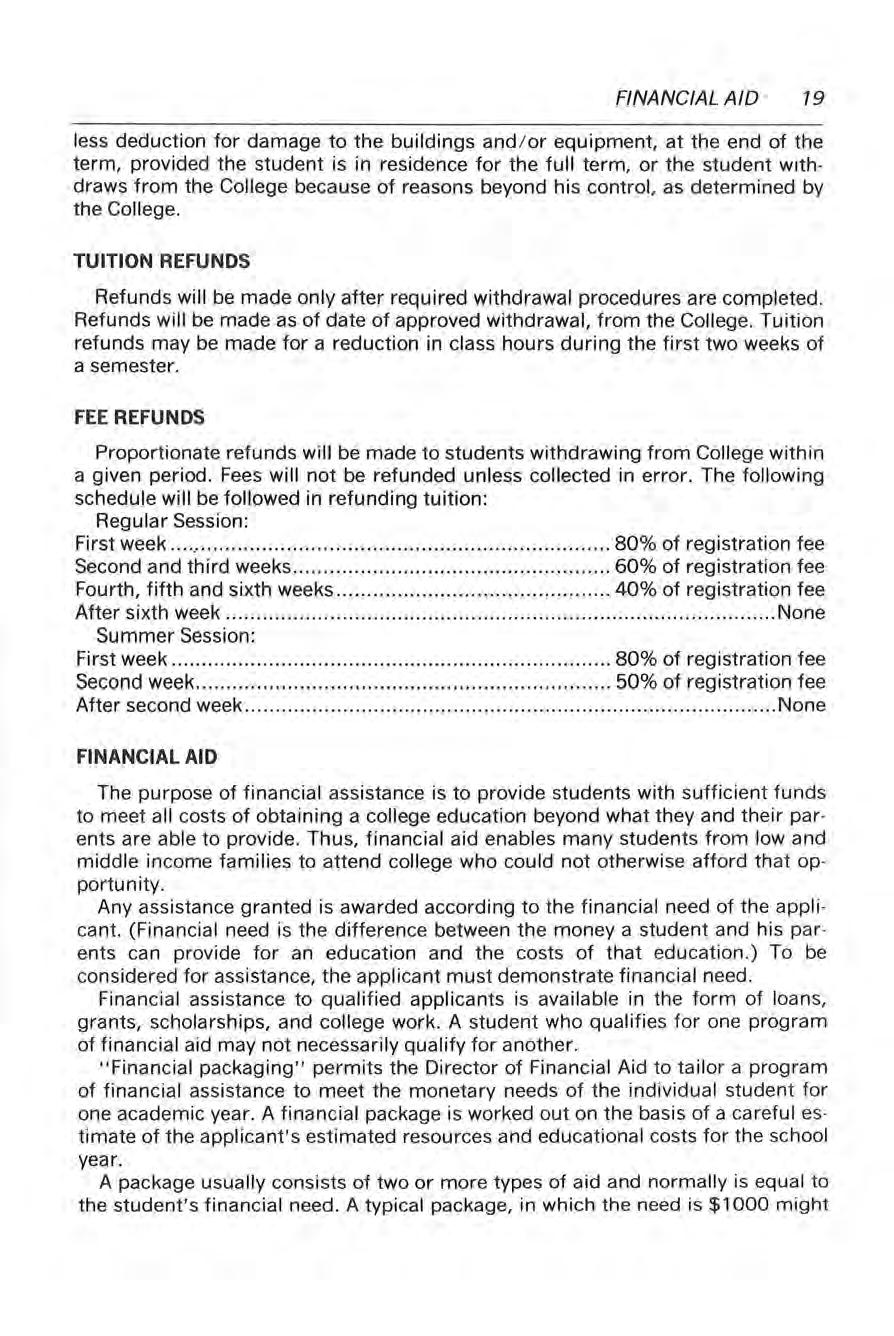
Financial assistance to qualified applicants is available in the form of loan s, grants, scholarships, and college work. A student who qualifies for one program of financial aid may not necessarily qualify for another.
"Financia l packaging" permits the Director of Financial Aid to tailor a program of financial assistance to meet the monetary needs of the individual student for one academic year. A financial package i s worked out on the basis of a careful estimate of the applicant's estimated resources and educational costs for the sc hool year.
A package usually consists of two or more types of aid and normally is equal to the student's financial need. A typical package, in which the need is $1000 might
be as follows: National Direct Loan, $350; scholarship, $150; and College WorkStud y, $500.
Funds for the operation of the different financial aid programs are drawn from Federa l and Institutional sources.
Any student who needs financial assistance, or desires to apply for a scholarship, should contact the Director of Financial Aid. Students are advised to begin the application procedure well before the deadline date, because establishing financial need is often a leng th y process. Applications for financial assistance for the coming year should be submitted to the Financial Aids office by April 15.
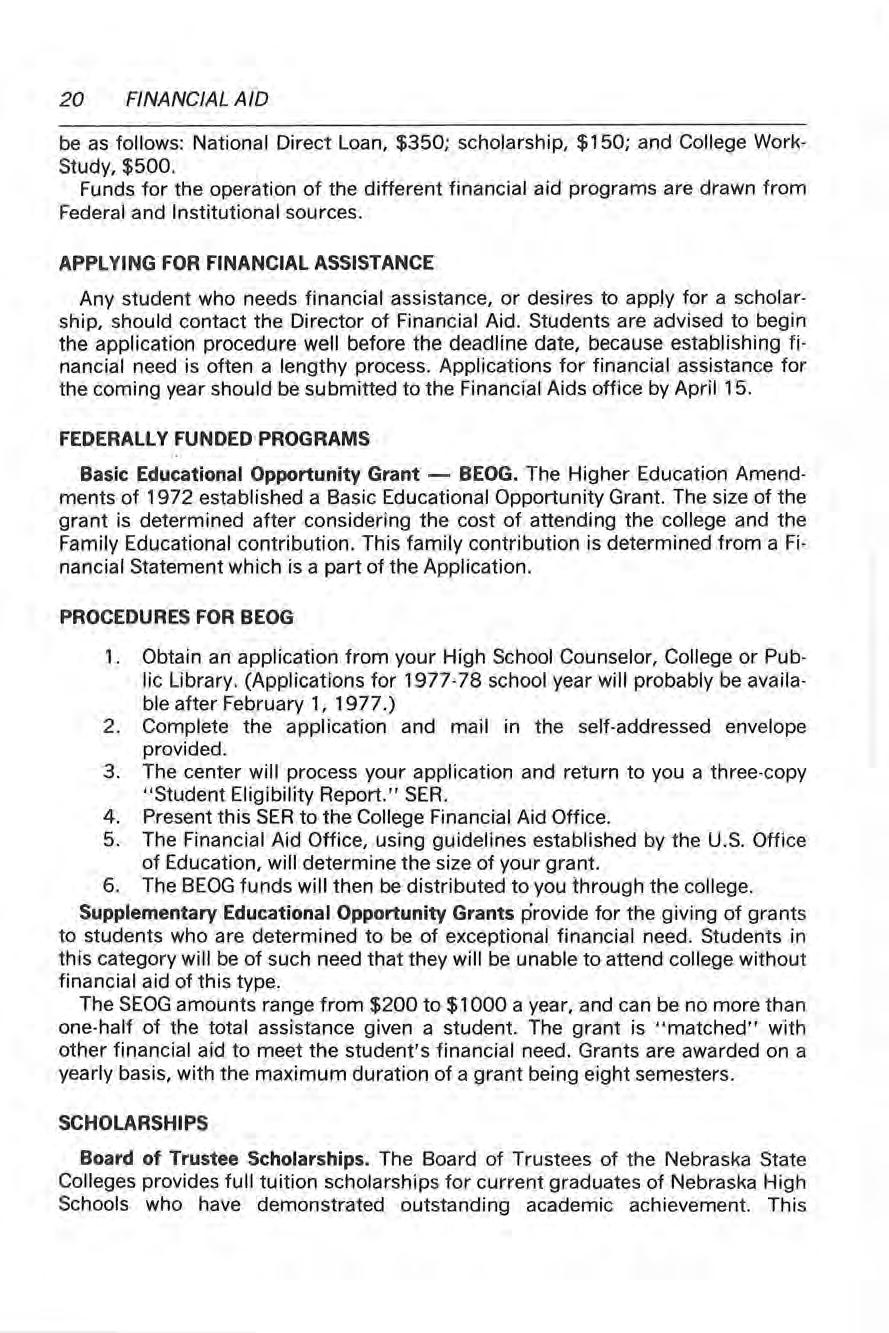
Basic Educational Opportunity Grant - BEOG. The Higher Education Amendments of 1972 established a Basic Educational Opportunity Grant. The s ize of the grant is determined after considering the cost of attending the college and the Family Educational contribution. This family contribution is determined from a Financial Statement which is a part of the Application.
1. Obtain an application from your High Schoo l Counselor, College or Public Library . (Applications for 1977-78 schoo l year will probably be available after February 1, 1977.)
2. Complete the application and mail in the self-addressed envelope provided.
3. The center will process your application and return to you a three-copy "Student Eligibility Report." SER.
4. Present this SER to the College Financial Aid Office.
5 The Financial Aid Office, using guidelines established by the U.S. Office of Education, will determine the size of your grant.
6. The BEOG funds will then be distributed to you through the college. Supplementary Educational Opportunity Grants provide for the giving of grants to students who are determined to be of exceptional financial need. Students i n this category will be of such need that they will be unable to attend college without financial aid of this type.
The SEOG amounts range from $200 to $1000 a year, and can be no more than one-half of the total assistance given a student. The grant is "matched" with other financial aid to meet the student's financial need. Grants are awarded on a yearly basis, with the maximum duration of a grant being eight semesters.
Board of Trustee Scholarships. The Board of Trustees of the Nebraska State Co llege s provides full tuition scholarships for current graduates of Nebraska High Schools who have demonstrated outstanding academic achievement. This
achievement is assessed by high school class rank and performance on the entrance examinations These scholarships are renewable to cover four regular academic years. A special application is required for this scholarship.
Cooperating School Scholarships. One -Half Tuition Scholarships are granted to designated graduates from school systems which assist Peru State College in the training of Education majors. This scholarship is applicable to one-half of the basic tuition cost for the equivalence of eight semesters of college studies. Inquiries concerning this scholarship should be directed to your High School.
Special Abilities Scholarships. Scholarships in the form of Partial Tuition Waivers are provided to students with special abilities in Athletics, Art, Debate, Drama, Journalism, Music, etc. Applicants for these awards should submit the Financial Aid Application indicating a desire to be considered for this scholarship. The applicant will then be contacted by the appropriate College official to determine the student's qualification. These are approved for only one academic year and may be renewed.

Special State of Nebraska Scholarships. Partial Tuition Waivers are awarded to worthy students who have financial need.
Foreign Student Scholarships. Full-tuition scholarships are awarded annually to qualified undergraduate students who are citizens of other countries. Candidates for such scholarships must have completed 2 semesters of satisfactory academic work at Peru State College.
Peru Achievement Foundation Scholarships. Through the generosity of alumni and friends of Peru State College, the Peru Achievement Foundation, Inc ., awards scholarships which have been established on a permanent basis.
A listing of the amounts and qualifications for Scholarships that are awarded through the Foundation can be found at the conclusion of the information on Financial Aid.
Students may make application for a specific scholarship or any available scholarship on the College's scholarship application form, which may be obtained from the office of the Director of Financial Aids.
College Work-Study is intended primarily for students from low-income families and permits them to earn a part of their college expenses. During the time they are attending classes full time, the student can work a maximum of 15 hours per week. During vacation periods the students may be allowed to work 40 hours per week. Work-Study jobs are usually on-campus, and are vital to the efficient operation of the College.
National Direct Student Loans are low interest, long term loans made to students who need financial assistance in meeting educational expenses. To be eligible, the student must be in good standing and be registered as a half-time student.
Federally Insured Student Loans are intended primarily for students who do not qualify for the other programs of financial assistance but who, nonetheless, need financial help.
College Work jobs are similar to the Work-Study jobs in pay scale, type of work performed, and hours worked .
Memorial Loan Funds established by various donors include: the $200 Willie Ethel Crone Loan Fund, established in 1943 by Miss Ruth Crone in memory of her mother; the $300 Harriet Louise Lindstrom Loan Fund, established in 1946 by the late C. R. Lindstrom and Mrs. Lindstrom in memory of their daughter; the Mrs Eva Fischer Loan Fund provided in 1962 by a $500 bequest by the late Mrs. Eva Fischer of Beatrice; the Towne Loan Fund provided by a $1,411 24 bequest by the late Norman L. Towne of Bozeman, Montana, husband of the late Lola Howe Towne, class of 1906; the $250 Patricia Buethe Loan Fund, established in 1962 by friends of the late Mrs. L. Chris Buethe
Loans from the College Loan Fund and Memorial Loan Fund are generally made on a short-term basis.
Scholarships are granted by the Nebraska Congress of Parents and Teachers to full-time students of the Nebraska State Colleges who are Nebraska residents training to become teachers. In order to be eligible for these scholarshipswhich vary in number with available funds - the student must have a pleasing personality, have high moral and social standards, and show an aptitude for teaching. Applications are sent to the College by the Nebraska Congress of Parents and Teachers shortly after the beginning of the fall semester.

Through the Division of Vocational Rehabilitation individuals with physical disabilities which constitute vocational handicaps are eligible for financial assistance in meeting costs of tuition, plus certain other financial help, depending upon the extent of their financial need.
Students interested in receiving this aid shou ld contact the Director of Financial Aid for additional information.
Students are eligible to receive veterans' benefits through the Veterans Administration. For more information contact your local Veterans Service Office or the Financial Aid Office of Peru State College.
Alpha Mu Omega Freshman Award. Presented by Alpha Mu Omega, honorary mathematics fraternity, to a member of the freshman class for excellence in mathematics.
A. V. and Wilhelmina Larson Memorial Industrial Arts Award. A $100 scholarship to be presented to a student completing his sophomore year who demonstrates promise as a teacher in the area of industrial arts.
B. E. Swenson, Jr., Athletic Award. Established in 1925 by Bert E. and Stella Swenson in memory of their son, B. E., Jr., and their parents who made possible their early education at Peru. Juniors and seniors are eligible and no student shall receive the award more than once Basis for judging: 100 points. GeneralCharacter and personality, 15; Scholarship, 15; Loyalty to school tradition, 20; Athletics - Must receive school letter in at least two different sports, including either major or minor sports, 50 points. The two letters need not be earned in any one year.
Business Club Award. Presented by the United Business Education Association to an outstanding student in Business Education.
Dramatic Club Awards. Presented each year to the senior man and senior woman who have contributed most to dramatics during the four years in the College.
Kappa Delta Pi Educational Award. Presented by the Beta Mu Chapter of Kappa Delta Pi, national honorary educational fraternity, to the freshman whose scholarship and professional attitude are outstanding.
Louise Mears Geographical Award. Presented to a student with high scholastic performance in the field of geography.
Neal S. Gomon Award. The Neal S. Gomon Award is presented annually to the Pedagogian staff member who is voted most outstanding in his contributions to the paper
John C. Christ Award. An award established in honor of Dr. John C. Christ, Professor of Biological Science. The award of fifty dollars is to be given to an outstanding high school senior who plans to major in the natural sciences at Peru State College.
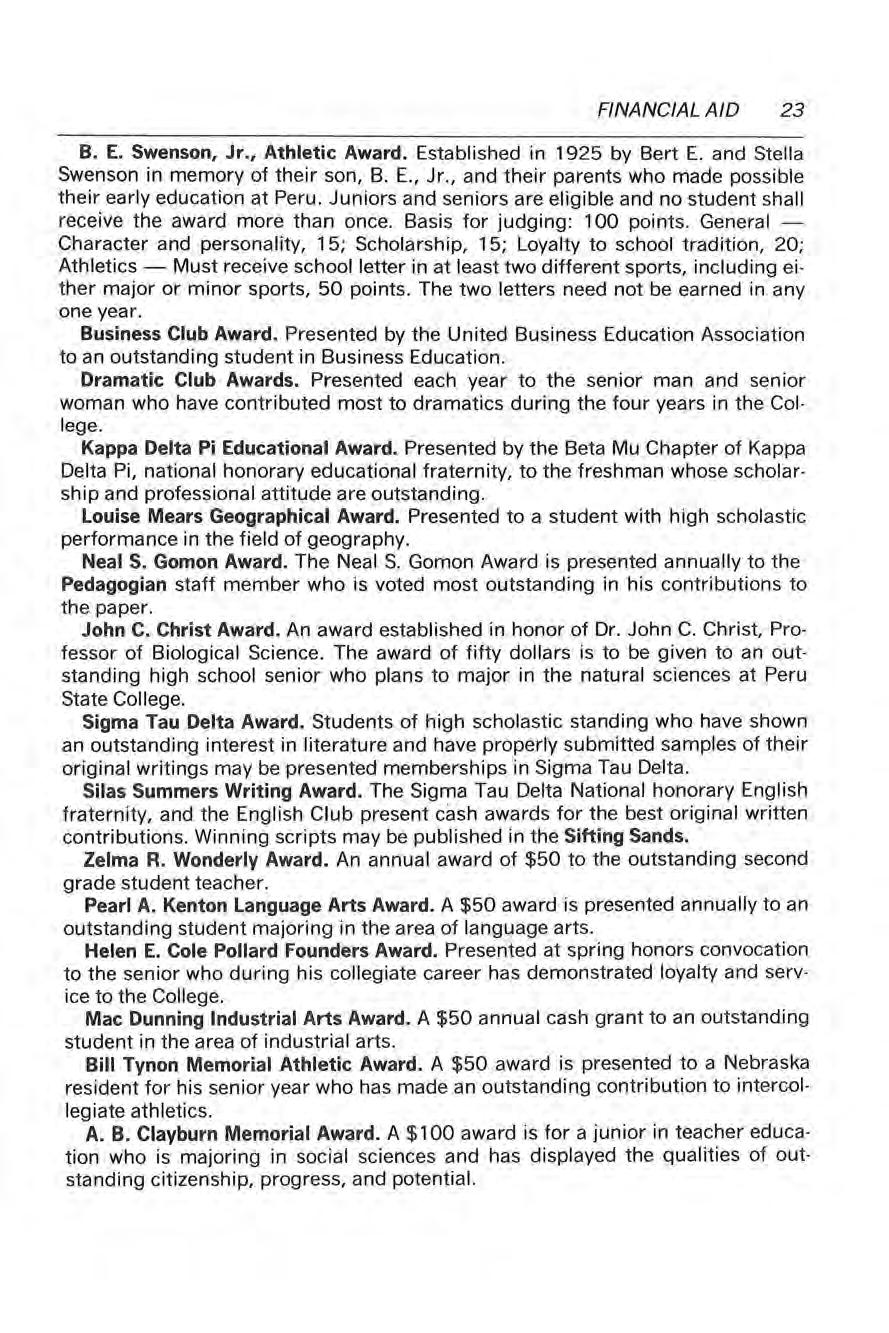
Sigma Tau Delta Award. Students of high scholastic standing who have shown an outstanding interest in literature and have properly submitted samples of their original writings may be presented memberships in Sigma Tau Delta
Silas Summers Writing Award. The Sigma Tau Delta National honorary English fraternity, and the English Club present cash awards for the best original written contributions. Winning scripts may be published in the Sifting Sands.
Zelma R. Wonderly Award. An annual award of $50 to the outstanding second grade student teacher.
Pearl A. Kenton Language Arts Award. A $50 award is presented annually to an outstanding student majoring in the area of language arts.
Helen E. Cole Pollard Founders Award. Presented at spring honors convocation to the senior who during his collegiate career has demonstrated loyalty and service to the College.
Mac Dunning Industrial Arts Award. A $50 annual cash grant to an outstanding student in the area of industrial arts.
Bill Tynon Memorial Athletic Award. A $50 award is presented to a Nebraska resident for his senior year who has made an outstanding contribution to intercollegiate athletics.
A. B. Clayburn Memorial Award. A $100 award is for a junior in teacher education who is majoring in social sciences and has displayed the qualities of outstanding citizenship, progress, and potential.
Lura Hendricks Eichler Memorial Kindergarten Education Award. The $50 award is presented annua lly to a student who has demonstrated ability, aptitude, and interest in kindergarten education.
A. V. Larson Award. Presented to the student contributing most to the College yearbook.
Chemistry Award. The Chemical Rubber Co. has made avai lable the New 53rd Edition of the CRC Handbook of Chemistry and Physics and a scro ll to be presented to the student ranking at the top in the freshman chemistry courses.
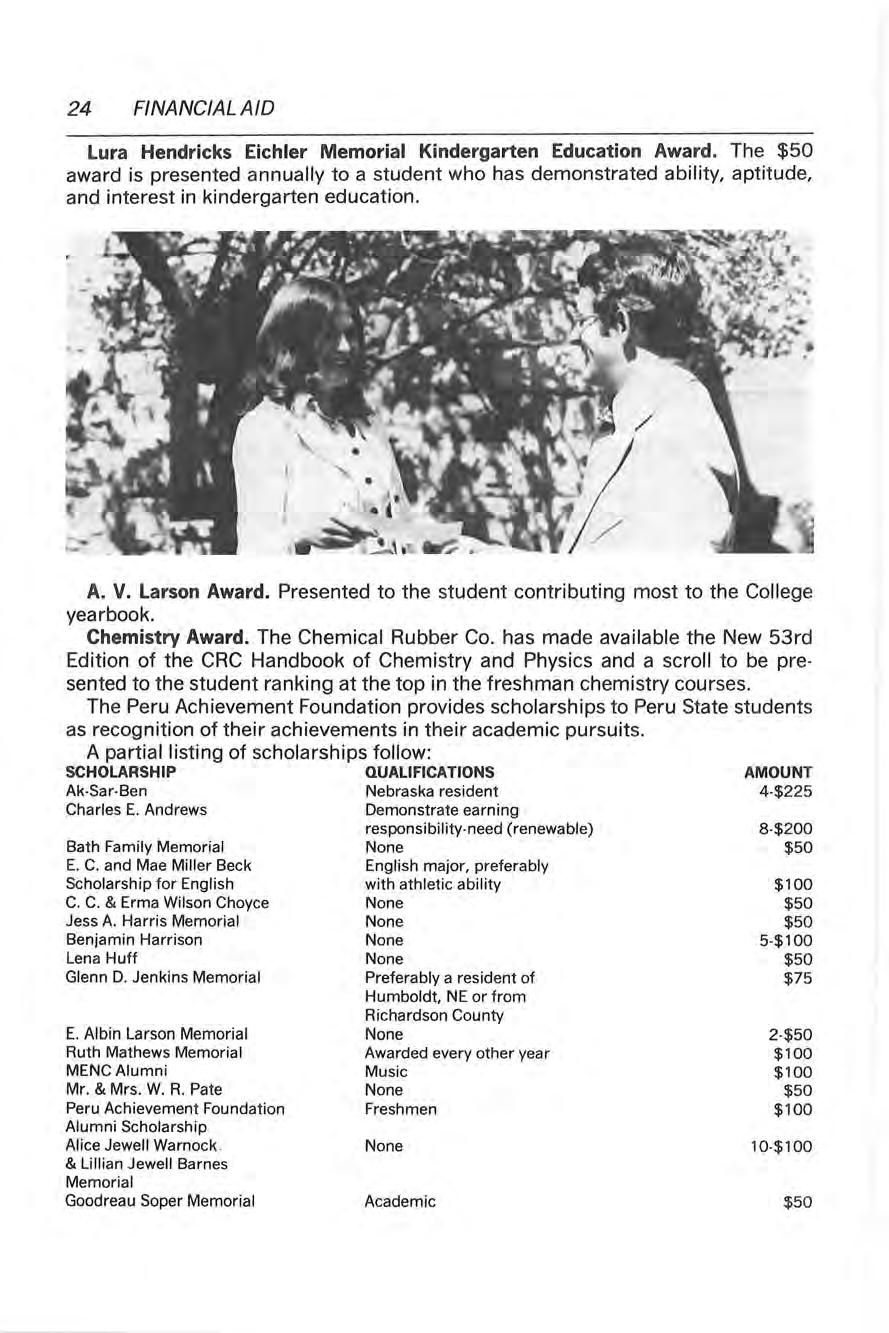
The Peru Achievement Foundation provides scholarships to Peru State students as recogn ition of their achievements in their academ ic pursuits.
A partial listing of sc holarship s follow:
SCHOLARSHIP QUALIFICATIONS
Ak-Sar-Ben
Charles E. Andrews
Bath Family Memorial
E C and Mae Miller Beck
Scho larsh ip for English
C. C. & Erma Wilson Choyce
Jess A. Harris Memorial
Benjamin Harrison
Lena Huff
Glenn D Jenkin s Memorial
E. Albin Larson Memorial
Ruth Mathews Memorial
MENCAlumni
Mr. & Mrs. W. R. Pate
Peru Achievement Foundation Alumni Scholarship
Alice Jewell Warnock
& Lillian Jewell Barnes
Memorial
Goodreau Soper Memorial
Oliver J. Stevenson Memorial
John Wear Memorial
Charles Weigand
Louise Mears
Elsie Fisher Award
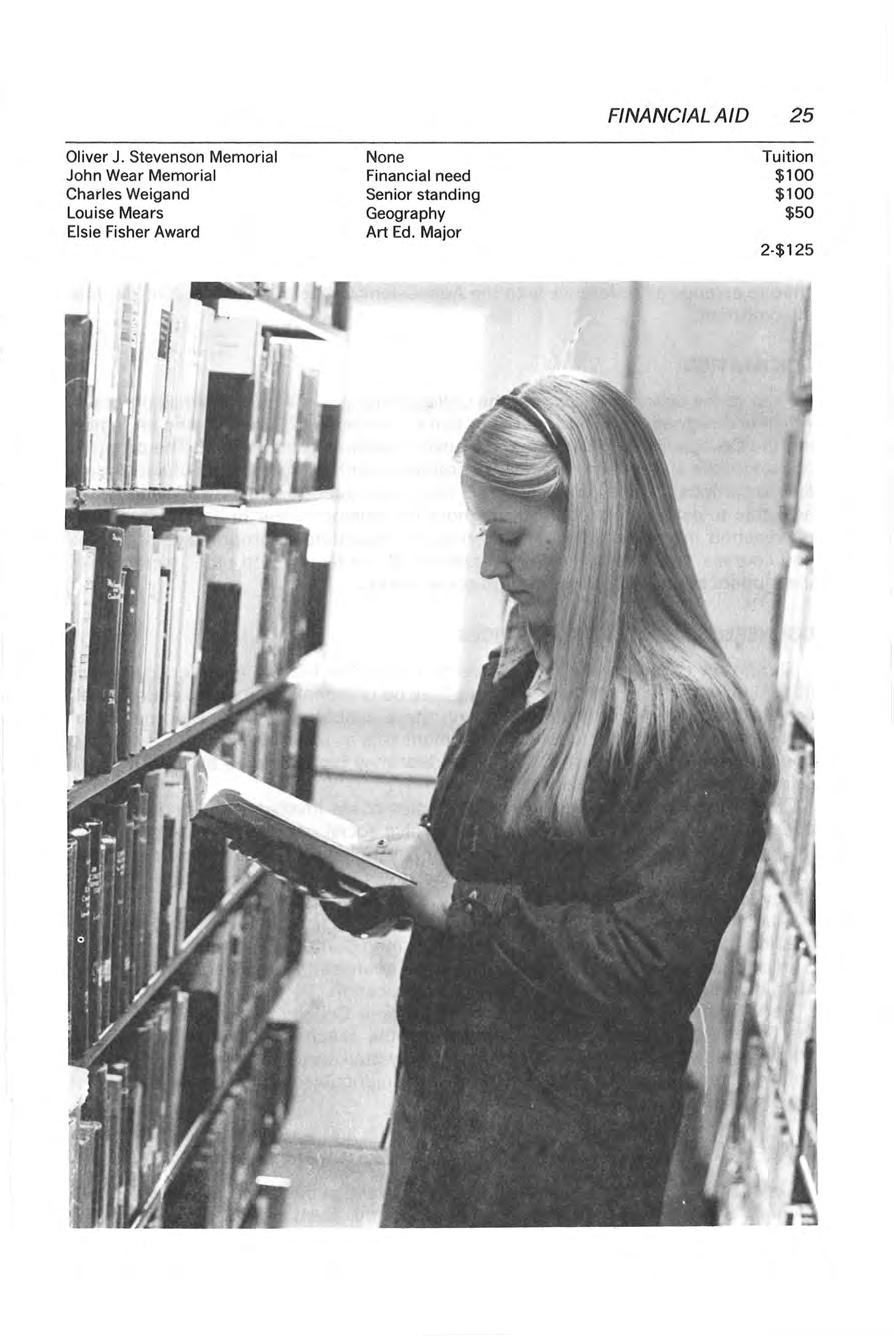
The College has as its constant goal the best possible adaptation of its educational opportunities to the interest, needs, and abilities of each student.
Each student is assigned to a faculty advisor who is qualified to advise him in his field. Students needing advice before the opening of the college year are invited to arrange a conference with the Admissions Office of the College by definite appointment.
Prior to the opening of classes, the College arranges a Welcome Week program, which is designed to give special attention to problems of students who are entering the College. Both Freshmen and transfer students are to attend. The program acquaints the student with his new environment and offers him a helpful introduction to campus life . He completes tests and is assigned to a faculty advisor who is available to assist the student throughout his college career i n defining goals to be reached in college and give information regarding appropriate curriculums and courses . Opportunity to meet members of the faculty and other members of the student body is afforded through social events.
During the college experience, students sometimes feel the need for assistance in dealing with their problems, whether they be personal, vocational, educationa l, or social. To aid students in coping with these concerns, a counseling psychologist within the Office of Student Development acts as an initial contact. Depending upon the nature of the difficulty, the student may be counseled by that office or referred to other campus services.

The Office of Student Development handles cases involving vocational choice, educational planning, and cases which involve social or psychological problems. In some instances cases involving social or psychological dysfunction are referred to clinical psychologists or psychiatric social workers available through the Blue Valley Mental Health Association in Auburn, Ne'braska.
Students needing tutoring, study skills counseling, or help in developmental reading may be referred to the Teaching-Learning Center.
In addition to the above services, pastoral counseling is available through the auspices of the United Ministries to Higher Education.
Peru State routinely administers the American College Assessment Program, the College Level Examination Program, and the Teacher Education Program. In addition, other tests are available on an individual basis in the areas of mental ability, personal adjustment, and interest in conjunction with the Office of Student Development.
Teacher Placement. Peru State College maintains a central office for the confidential recommendations of students and alumni. Each candidate is to provide
personal information and recommendations that will assist him in securing a position
Business and Industrial Placement. Assistance is given students in finding full time employment in business, industry, and governmental services. Literature on various companies is available to students who may be interested .
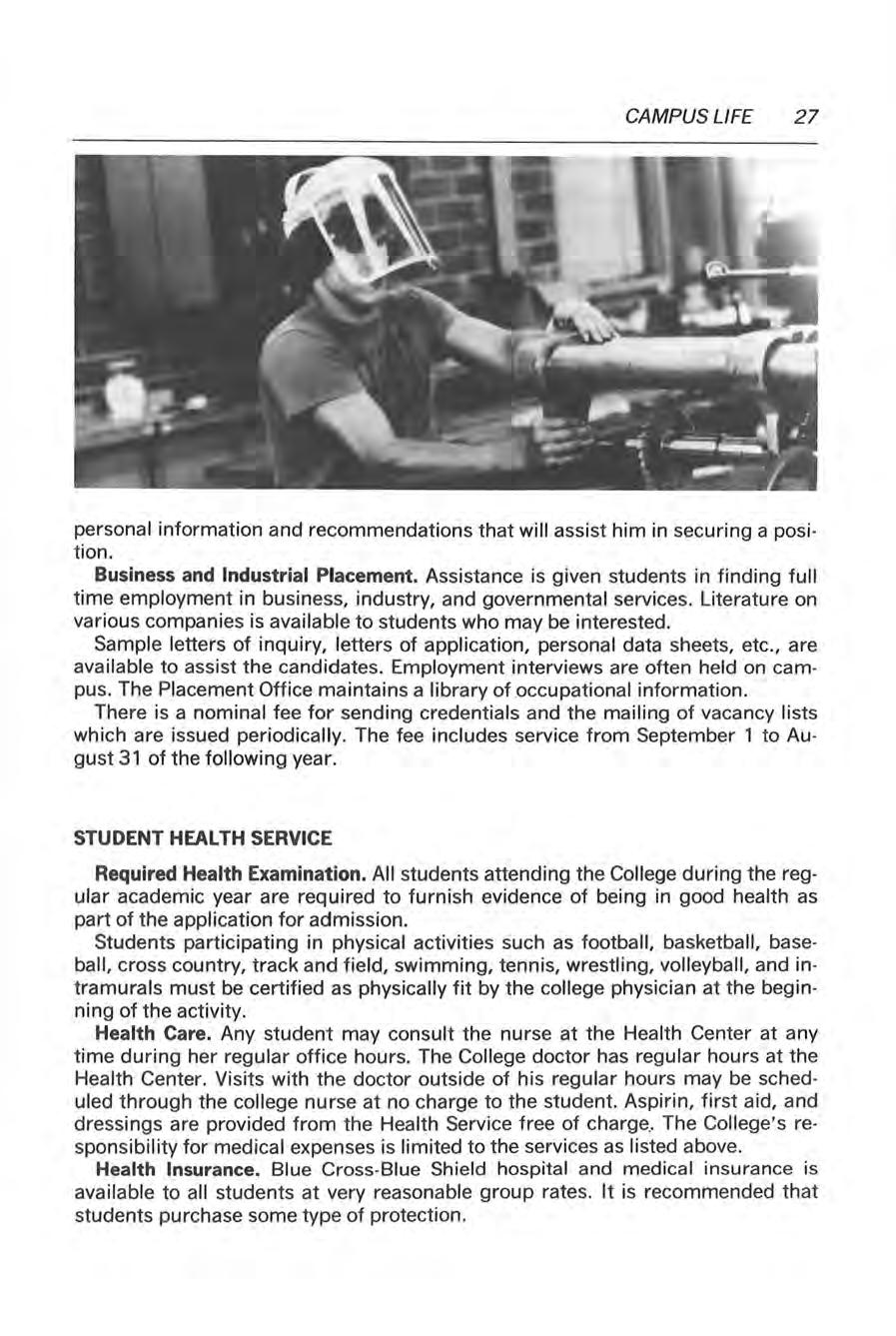
Sample letters of inquiry, letters of application, personal data sheets, etc., are available to assist the candidates Employment interviews are often held on campus. The Placement Office maintains a library of occupational information.
There is a nominal fee for sending credentials and the mailing of vacancy lists which are issued periodically. The fee includes service from September 1 to August 31 of the following year.
Required Health Examination. All students attending the College during the regular academic year are required to furnish evidence of being in good health as part of the application for admission.
Students participating in physical activities such as football, basketball, baseball, cross country, track and field, swimming, tennis, wrestling, volleyball, and intramurals must be certified as physically fit by the college physician at the beginning of the activity.
Health Care. Any student may consult the nurse at the Health Center at any time during her regular office hours. The College doctor has regular hours at the Health Center. Visits with the doctor outside of his regular hours may be scheduled through the college nurse at no charge to the student. Aspirin, first aid, and dressings are provided from the Health Service free of charge . The College's responsibility for medical expenses is limited to the services as listed above.
Health Insurance. Blue Cross-Blue Shield hospital and medical insurance is available to all students at very reasonable group rates. It is recommended that students purchase some type of protection.
All requests for information concerning living accommodations and requests for room reservations in one of the residence halls should be directed to the Dean of Student Services Office. A schedule of room and board rates is listed in the Financial Information Section.
Residence Halls - The College residence halls are considered the last word in housing, incorporating features most conducive to study, rest, and wholesome living. A full -t ime adult and student assistants offer a program for individual advising and aid each resident in developing his social, educational and recreational interests.
Students are responsible for cleaning their own rooms. Cleaning equipment is available and may be checked out from the hall office. Students are also responsible for supplying their own linen and bedding, including pillows and mattress pads. Residents are welcome to bring other personal belongings from home such as radios, stereos, etc. Hot plates for cooking are not allowed.
The lower level of each hall is equipped with kitchen facilities, washers and dryers, and recreation equipment such as pool and ping pong tables.
All unmarried freshman and sophomore students, except those living with parents or guardians, must live in college residence halls. Exceptions to this will be handled by the College on an individual basis, with requests for exceptions to be submitted to the Housing Office. For details concerning specific regulations of the residence halls refer to the "Residence Hall Contract" which may be obtained from the Office of the Dean of Student Services.
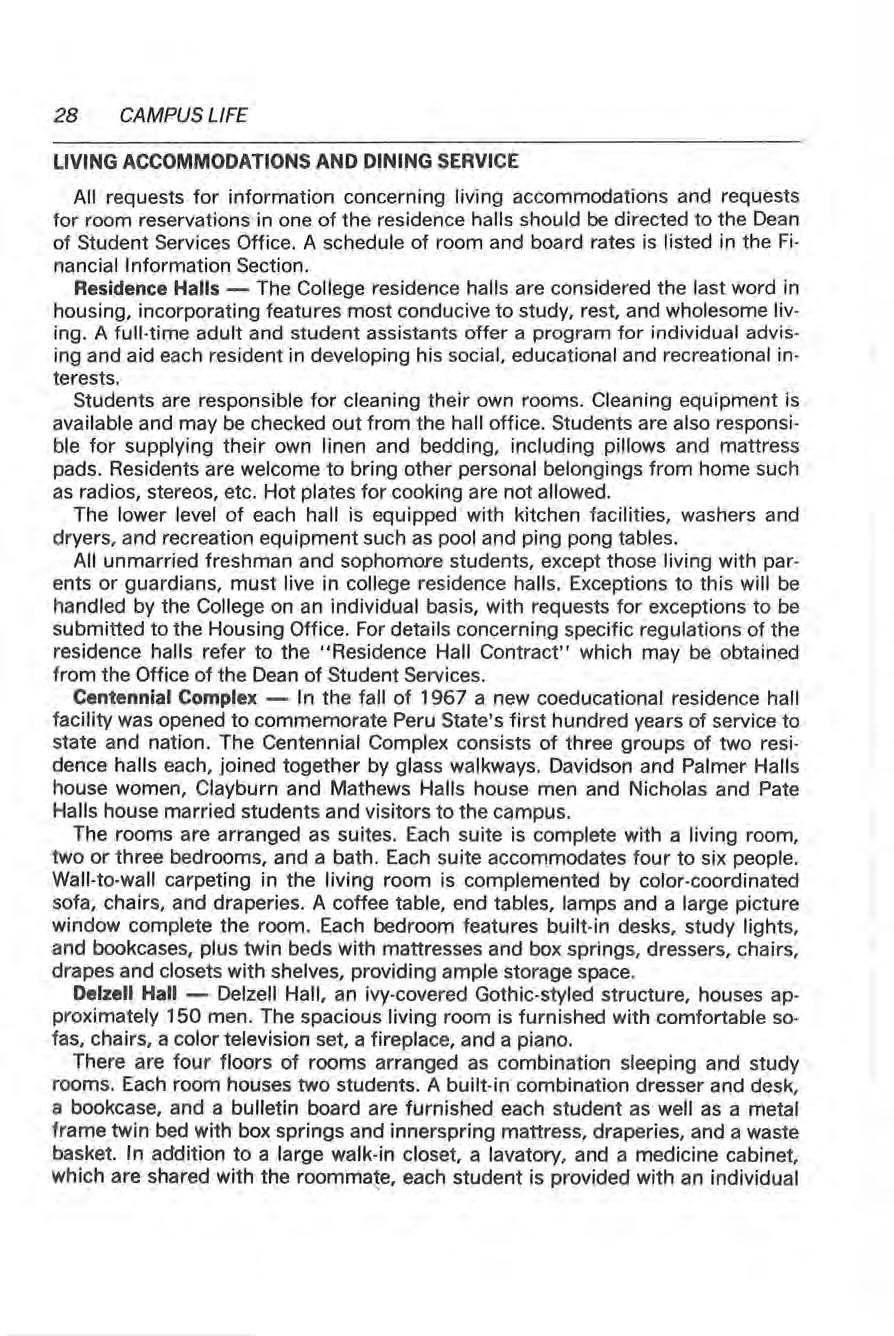
Centennial Complex - In the fall of 1967 a new coeducational residence hall facility was opened to commemorate Peru State's first hundred years of service to state and nation. The Centennial Complex consists of three groups of two residence halls each, joined together by glass walkways. Davidson and Palmer Halls house women, Clayburn and Mathews Halls house men and Nicholas and Pate Halls house married students and visitors to the campus.
The rooms are arranged as suites. Each suite is complete with a living room, two or three bedrooms, and a bath. Each suite accommodates four to six people. Wall-to-wall carpeting in the living room is complemented by color-coordinated sofa, chairs, and draperies. A coffee table, end tables, lamps and a large picture window complete the room. Each bedroom features built-in desks, study lights, and bookcases, plus twin beds with mattresses and box springs, dressers, chairs, drapes and closets with shelves, providing ample storage space.
Delzell Hall - Delzell Hall, an ivy-covered Gothic-styled structure, houses approximately 150 men. The spacious living room is furnished with comfortable sofas, chairs, a color television set, a fireplace, and a piano.
There are four floors of rooms arranged as combination sleeping and study rooms. Each room houses two students. A built-in combination dresser and desk, a bookcase, and a bulletin board are furnished each student as well as a metal frame twin bed with box springs and innerspring mattress, draperies, and a waste basket. In addition to a large walk-in closet, a lavatory, and a medicine cabinet, which are shared with the roomma!e, each student is provided with an individual
built-in wardrobe. There is a large shower room of ceramic tile and marble centrally located on each floor.
Eliza Morgan Hall - Eliza Morgan Hall, located in the northwest corner of the campus was opened in 1929. The recently renovated "L" shaped building has four floors and houses approximately 170 women. The carpeted living room is furnished with comfortable sofas, chairs, a color television set and a piano.
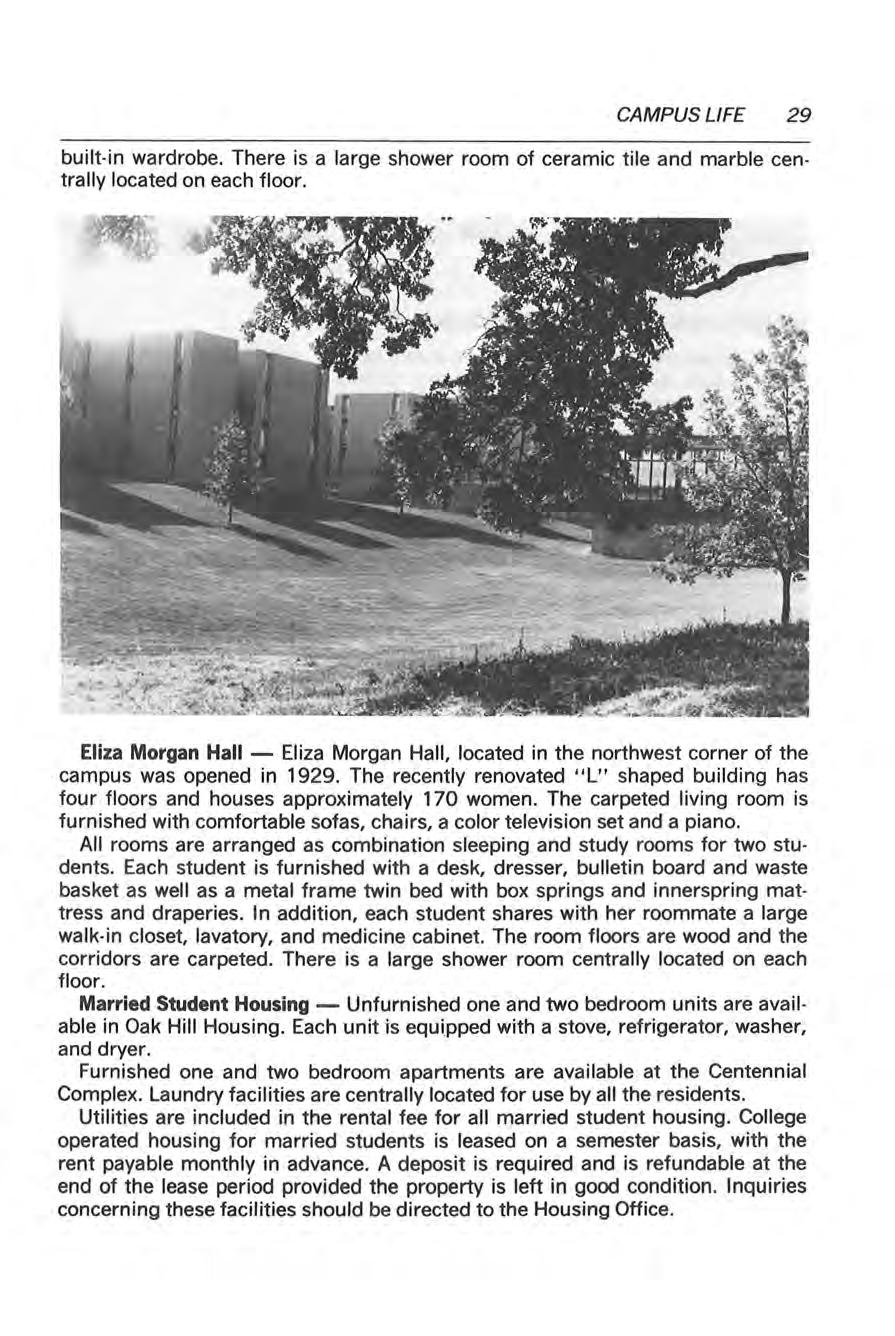
All rooms are arranged as combination sleeping and study rooms for two students. Each student is furnished with a desk, dresser, bulletin board and waste basket as well as a metal frame twin bed with box springs and innerspring mattress and draperies. In addition, each student shares with her roommate a large walk-in closet, lavatory, and medicine cabinet. The room floors are wood and the corridors are carpeted. There is a large shower room centrally located on each floor.
Married Student Housing - Unfurnished one and two bedroom units are available in Oak Hill Housing. Each unit is equipped with a stove, refrigerator, washer, and dryer.
Furnished one and two bedroom apartments are available at the Centennial Complex. Laundry facilities are centrally located for use by all the residents.
Utilities are included in the rental fee for all married student housing. College operated housing for married students is leased on a semester basis, with the rent payable monthly in advance. A deposit is required and is refundable at the end of the lease period provided the property is left in good condition Inquiries concerning these facilities should be directed to the Housing Office.
Food Service - Air-conditioned food service areas are located in the Student Center. The main dining room in the Student Center is open Monday through Friday for regular meal service to residents of the halls, faculty, staff, guests, and visitors. Weekend service is available only in the Snack Bar, which is open at stated hours.
Throughout the school year concerts, plays, lectures, and recitals are presented at the College by students, faculty members, and professional artists. Studentplanned and student-directed productions are an important part of the College entertainment schedule.
Besides recreational facilities of the College which are utilized in an intramural program for both men and women, Peru's location in the rolling wooded hills offers opportunities for hikes and outings . Laura Neal Memorial Park, a few blocks south of the campus, is the scene of many student, faculty, and alumni meetings. Other parks in the area where Peruvians gather are Coryell Park near Brock, the city parks at Auburn and Nebraska City, and the Arbor Lodge State Park, also in Nebraska City. During the summer months many Peru Staters enjoy the outdoor municipal swimming pools in Auburn and Nebraska City.
The social season at the College centers around the following events - Homecoming, Thanksgiving, Christmas, Valentine's Day and Spring Week - when allcollege dances are given. Other social activities are sponsored by various student organ izations. These groups give dances, teas, parties, receptions, and picnics for their members and guests. Faculty organizations include the Faculty Women's Club and a branch of the American Association of University Women.

The Student Governing Association of Peru State College is made up of elected representatives including President, Vice President, senators at large, senators from off campus, and class officers. The SGA is dedicated to bringing students ' interests and opinions to a meaningful focal point in the operation of the College.
The SGA has voting members on the following official college bodies: the College Affairs Council, Academic Affairs Commission, Library Committee, Teacher Education Committee, and Student Affairs Commission. SGA offices are located in the Student Center.
SENIOR, JUNIOR, SOPHOMORE, AND FRESHMAN classes are considered definite organizations. Each class is assisted with its activities by a member of the facu lty, who acts as sponsor during the school year.
MEN'S HALL COUNCILS AND WOMEN STUDENTS ASSOCIATION are representati ve councils selected by the residents of the men's and women's residence halls, respectively. The governing bodies of the halls handle problems and plan soc ial activities for the residents.
The Student Center Board is a coordinating body for Student Center activities, as well as campus socia l events. Numerous activities of a social nature are sponsored throughout the year under the sponsorship of the Student Center Board . Concerts by nationally known groups are scheduled to appear on the Peru State Campus during each school year.
The CONCERNED BLACK STUDENTS is open to all students interested in promoting the understanding of people
The CIRCLE K CLUB is a Kiwanis-affiliated service organization which is dedicated toward the betterment and advancement of the campus and community.
The DRAMATICS CLUB, one of the state's oldest dramatic organizations, throughout its existence has presented to the College community the best in drama.
The HOME ECONOM IC S CLUB otters opportunities for development of personality and for stimulation of interest in homemaking and the professional field . It is affiliated with the Home Economics Association, American Home Economics Association, and the Nebraska Home Economics Association.
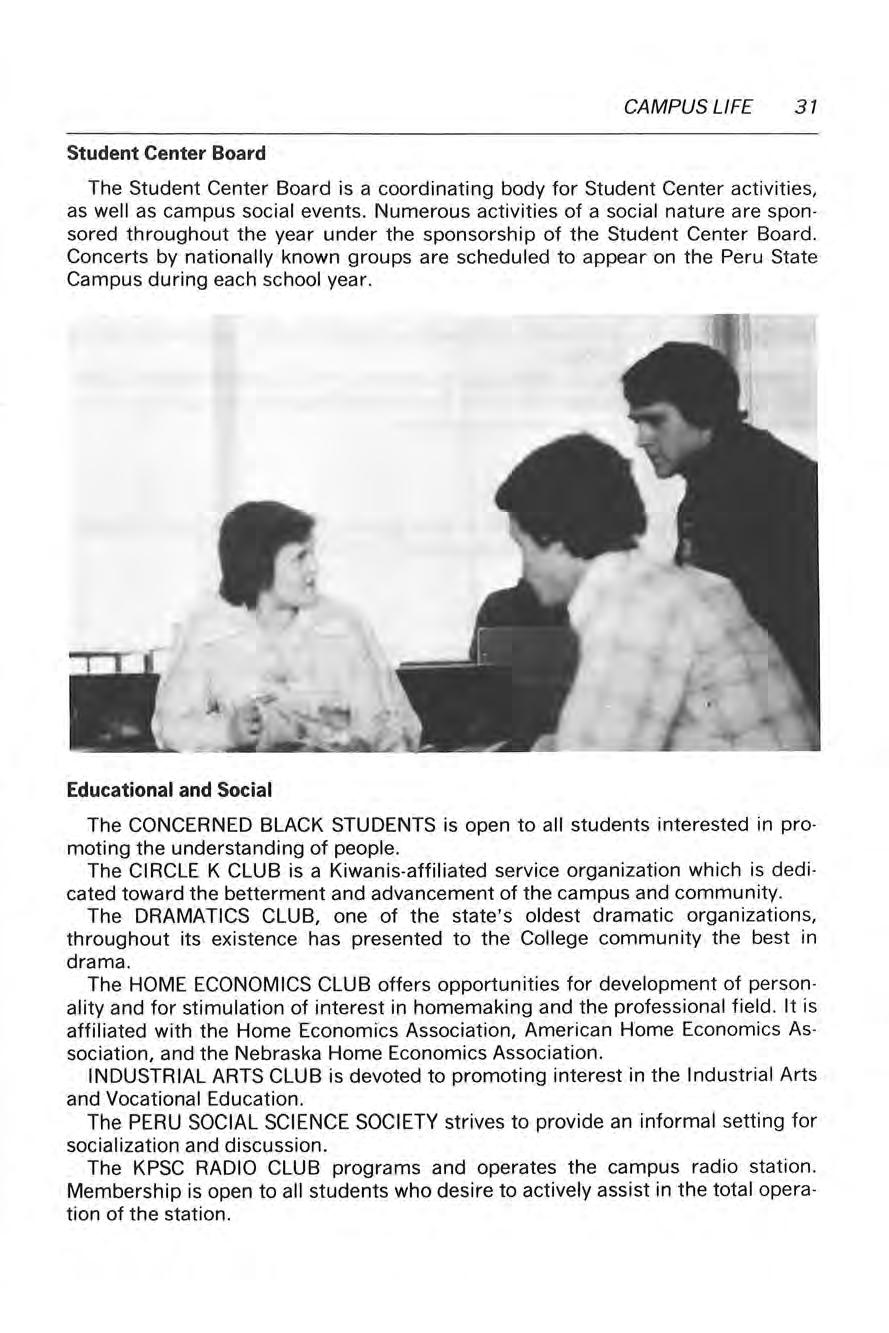
INDUSTRIAL ARTS CLUB is devoted to promoting interest in the Indu stria l Arts and Vocational Education.
The PERU SOC IAL SC IENCE SOCIETY strives to provide an informal setting for socialization and discussion.
The KPSC RADIO CLUB programs and operates the campus radio station . Membership is open to all students who desire to actively assist in the total operation of the station.
STUDENT ASSOCIATION FOR RETARDED CITIZENS is composed of Special Education majors and other students intere sted in the education of exceptional children.
STUDENT EDUCATION ASSOCIATION is an organization for potential teachers. It is affiliated with the Nebraska State Education Association and the National Education Association. The activities of the association are devoted to the improv ement of education.
The ENGLISH CLUB promotes the mastery of written expression, encourages worthwhile reading, and fosters a fellowship among students specializing in the Eng lish language or literature.
The SOCIAL WORK CLUB offers opportunities for the Social Work Majors to participate in further development of the Social Work Program, through field trips, sponsored activities, and community services .
Religious
Two religious groups are available to Peru Staters. These groups are the Fe llowship of Christian Athletes and Peru Students for Christ.
Music
The PERU CHORUS, open to all students, is devoted to the study and performance of good choral literature . One semester hour credit may be earned by chorus members by registering for Music 19, Chorus.
The BAND PROGRAM is divided into three divisions - the Marching Band, the Concert Band, and the Instrumental Ensembles Marching Band members may fulfill the ir P.E activities requirement by participating in Music 21A for two semesters . The Concert Band is primarily a concert organization while the In strumental Ensembles consisting of the Woodwind Choir, Brass Choir, and Stage and Pep Band are-for the purpose of study and performance of compositions for sma ll ensemb le s Members may earn one semester hour each semester in each of these groups by registering for Music 21 A, Music 21 Band Music 29 .
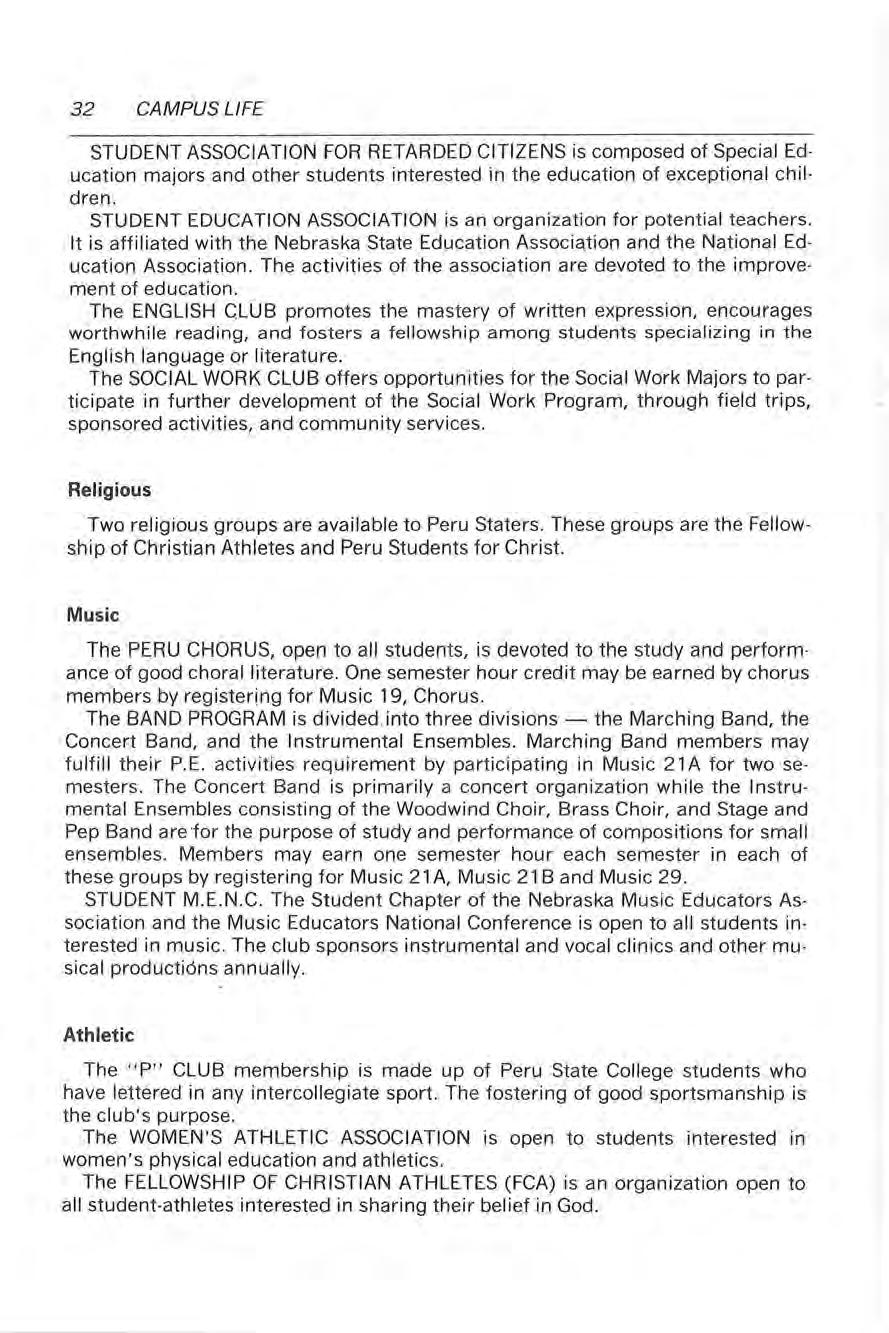
STUDENT M.E.N.C. The Student Chapter of the Nebraska Music Educators Assoc iation and the Music Educators National Conference i s open to all stude nt s interested in music. The club sponsors instrumenta l and vocal clinics and other musical productions an nu a lly.
The "P" CLUB membership is made up of Peru State College stude nts who have lettered in any intercoll egiate sport. The fostering of good sportsmanship is the club's purpose.
The WOMEN'S ATHLETIC ASSOCIATION is open to students interested in women's physical education and athletics.
The FELLOWSHIP OF CHRISTIAN ATHLETES (FCA) is an organization open to all stude nt-athletes interested in sharing their belief in God.
PERU STATE COLLEGE CHEERLEADERS are chosen after a tryout before a panel of faculty and staff. They lead chants and boost spirit at athletic event s
PERU STATE COLLEGE DRILL TEAM is composed of students interested in providing half-time entertainment at football and basketball games and developing support for the teams
ALPHA MU OMEGA, honorary mathematics fraternity , aims to develop and promote interest in the study of mathematics Students who have or are currently enrolled in analytical geometry with above average grades in m athematics are eligible for membership .
EPSILON Pl TAU is a national honorary professional industrial arts education and vocational education fraternity Members are selected from students of junior or senior standing who have a grade point average of 6.40 in the industrial arts and an average grade of 5 25 in other fields
KAPPA DELTA Pl, national honorary education fraternity, is open to men and women of junior standing ranking in the upper quintile of the class and who show evidence of a continued interest in the field of education
PHI ALPHA THETA, national honorary history fraternity, is open to those of high scholastic standing who have more than 12 hours history.
SIGMA TAU DELTA, a National honorary English fraternity, granted the Phi Alpha Chapter of Peru State College a charter in 1926 . Students who demonstrate an interest in literature and creative writing, and who are above average in scholarship are eligible for membership. The local fraternity aids the English Club in publishing Sifting Sands.
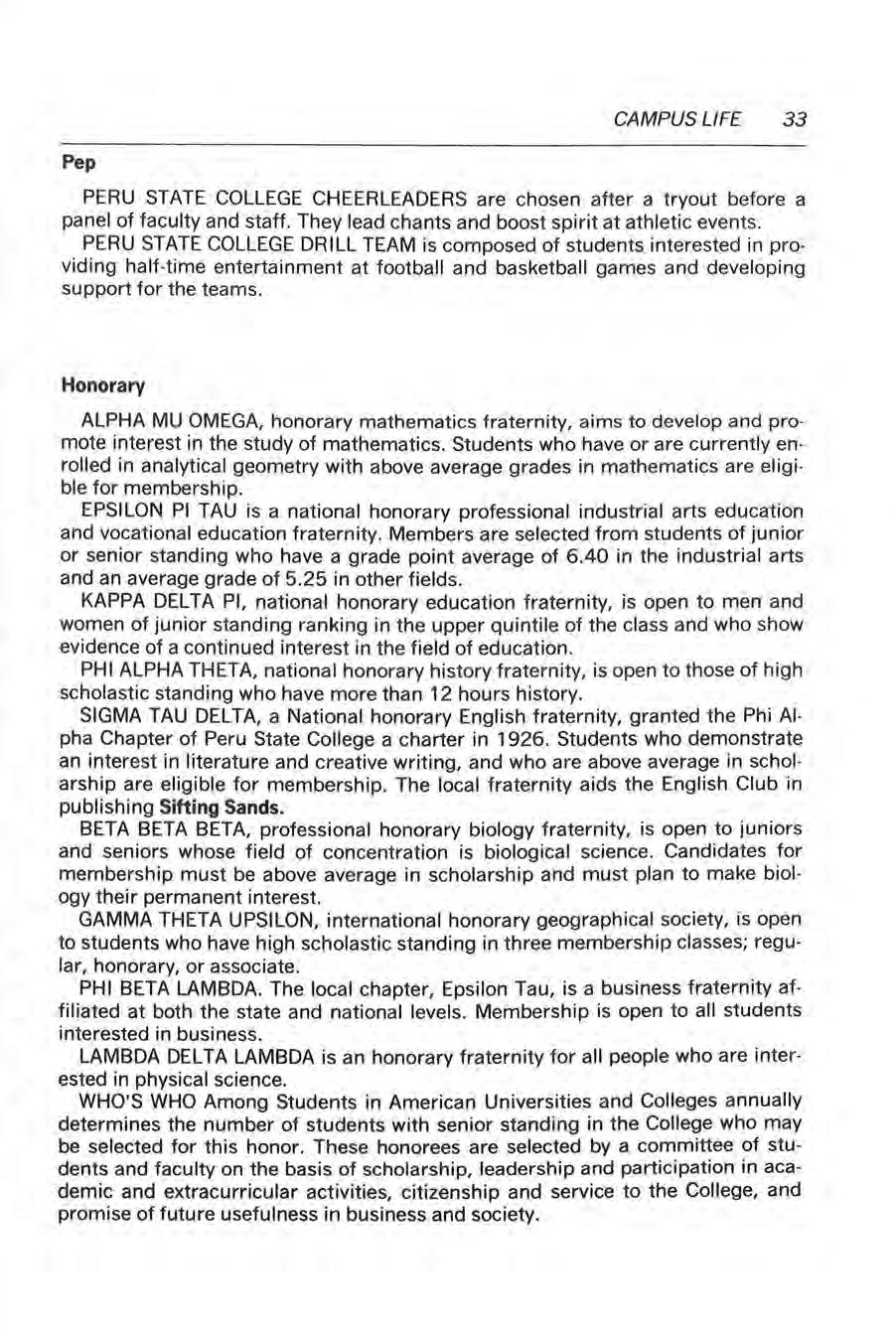
BETA BETA BETA, professional honorary biology fraternity, is open to juniors and seniors whose field of concentration is biological science. Candidates for membership must be above average in scholarship and must plan to make biology their permanent interest.
GAMMA THETA UPSILON, international honorary geographical society, is open to students who have high scholastic standing in three membership classes; regular, honorary, or associate .
PHI BETA LAMBDA. The local chapter, Epsilon Tau, is a business fraternity affiliated at both the state and national levels . Membership is open to all students interested in business .
LAMBDA DELTA LAMBDA is an honorary fraternity for all people who are interested in physical science.
WHO'S WHO Among Students in American Universities and Colleges annually determines the number of students with senior standing in the College who may be selected for this honor. These honorees are selected by a committee of students and faculty on the basis of scholarship, leadership and participation in academic and extracurricular activities, citizenship and service to the College, and promise of future usefulness in business and society.
The Pedagogian is the official college newspaper. It is published weekly during the academic year under the supervision of the journalism instructor. Although contributions are welcomed, the majority of the writing and editing is done by the students in journalism classes.
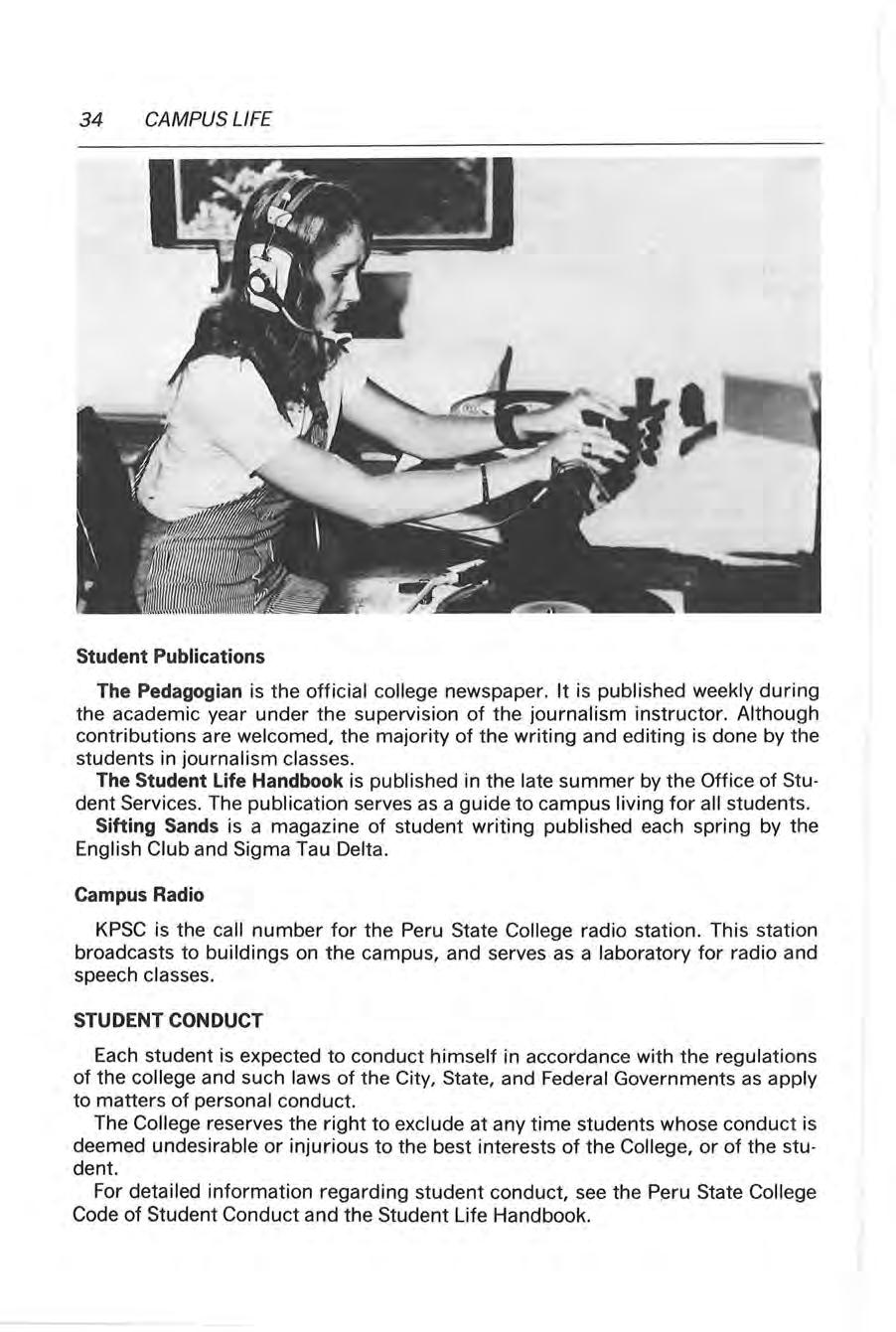
The Student Life Handbook is published in the late summer by the Office of Student Services. The publication serves as a guide to campus living for all students.
Sifting Sands is a magazine of student writing published each spring by the English Club and Sigma Tau Delta.
KPSC is the call number for the Peru State College radio station. This station broadcasts to buildings on the campus, and serves as a laboratory for radio and speech classes.
Each student is expected to conduct himself in accordance with the regulations of the college and such laws of the City, State, and Federal Governments as apply to matters of personal conduct.
The College reserves the right to exclude at any time students whose conduc t is deemed undesirable or injurious to the best interests of the College, or of the student.
For detailed information regarding student conduct, see the Peru State College Code of Student Conduct and the Student Life Handbook.
Every student must register his motor vehicle with the Office of Student Life, if such vehicle is operated or possessed within the city limits of Peru. Vehicles are defined as all gasoline powered vehicles: automobiles, motorcycles, motor scooters, and any other gasoline powered vehicle. The registration fee is three dollars.
Detailed copies of the vehicle regulations may be obtained at the Office of Student Services.
Only automobiles with proper identification are allowed to park in dormitory and other restricted areas. Adequate parking for all students is available in off-street areas. Students are not to park in residential areas adjacent to the campus.

The College is . supported by the State of Nebraska for the purpose of meeting the educational needs at the college level of citizens of the state . The College is a multi-purpose regional institution with a broad variety of programs in general liberal arts, vocational-technical education, teacher education, and a variety of preprofessional or terminal vocational education programs culminating in a Bachelor of Arts, Bachelor of Science, or a Bachelor of Technology degree and Associate of Arts degrees in certain vocational areas . The College also provides programs of instruction for adults in learning centers throughout southeast Nebraska.
The studies offered by the College include four-year professional curricula in elementary education and in secondary education; a four-year liberal arts program; a bachelor of science program flexible enough to satisfy a variety of interests and objectives; and a number of one-year and two-year terminal and pre-professional curricula.
In general, the various curricula offered by the College consist partly of general studies course and partly of specialized courses. The general studies courses are those set forth as important for all individuals for effective living, regardless of their vocations. The specialized courses are those that prepare specifically for teaching or other vocations, or satisfy special avocational or cultural interests.
Upon enrolling, a student chooses a vocational objective or a major of principal cultural interest. This determines the curriculum that he will follow and the advisor who will guide him in his educational experiences. The choice may be tentative and may be changed later. Students who desire special assistance in selecting a vocational goal may request vocational counseling from their academic advisors and the Director of Placement.
Students who are undecided in regard to a vocational and / or educational goal may register in a general category.
The College is authorized by law and rules of the Board of Trustees of the Nebraska State Colleges to issue the following degrees:
Bachelor of Arts in Education (A.B. in Educ.) This degree is given to candidates whose field of concentration is in one of the following fields: Art, History and Social Science or Language Arts.
Bachelor of Fine Arts in Education (B.F.A. in Educ.) Music.
Bachelor of Science in Education (B.S. in Educ.) This degree is given to candidates whose field of concentration is in one of the following fields: Physical Education, Practical Arts, Mathematics and Science, Elementary Education or Libra ry Science.
Bachelor of Arts (A.B.) This degree is given to candidates without regard to field of concentration and without the professional education requirements. (See Additional Requirements)

Bachelor of Science (B.S.) This degree is given to candidates without the professional education and / or the modern language requirement.
Bachelor of Technology. This is an alternative degree for cand idates who transfer from other institutions, having completed a prescribed one or two-year technical program. Students may elect to meet requirements for this degree rather than the usual requirements for the B.A. or B.S. (See special requirements)
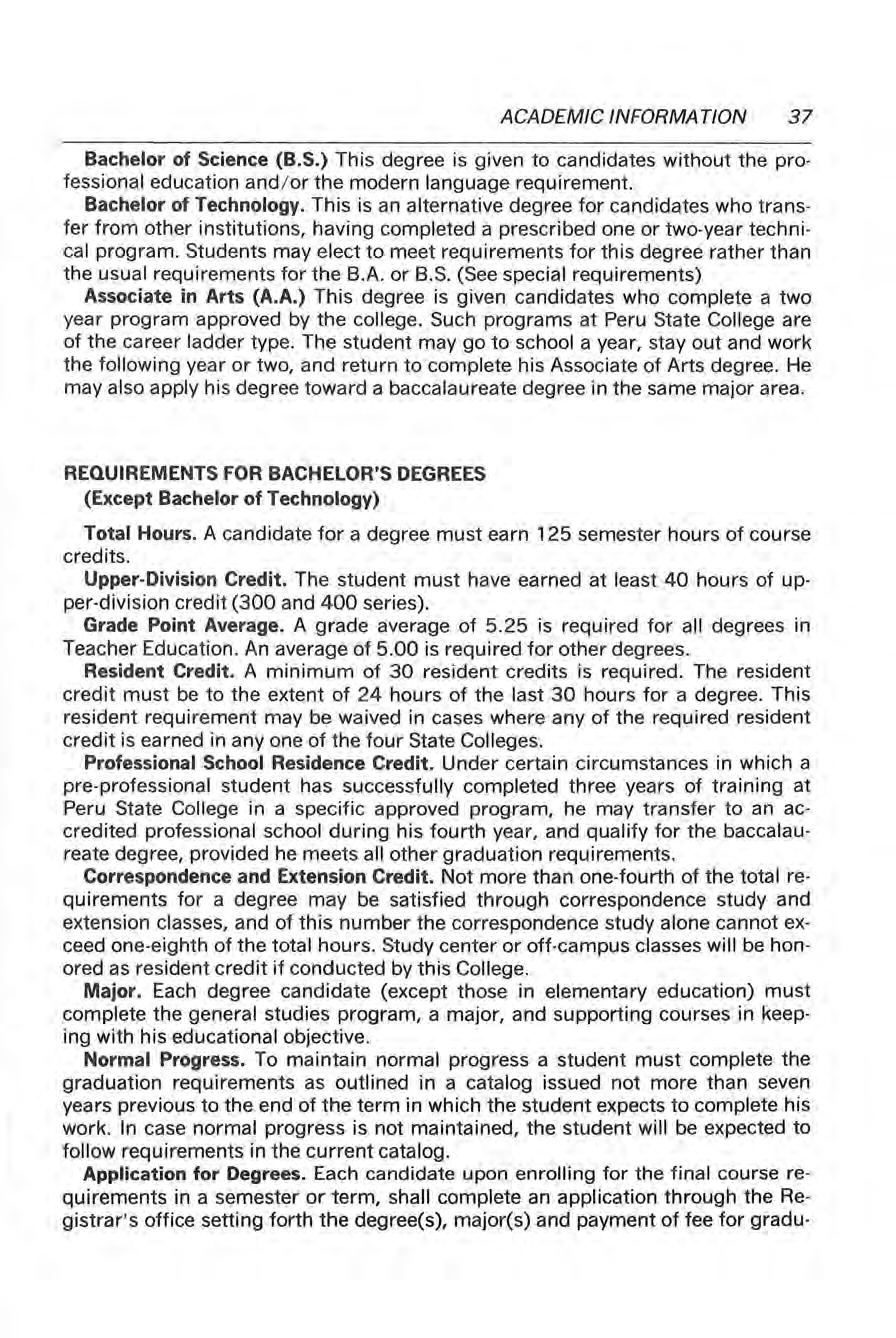
Associate in Arts (A.A.) This degree is given candidates who complete a two year program approved by the college. Such programs at Peru State College are of the career ladder type. The student may go to school a year, stay out and work the following year or two, and return to complete his Associate of Arts degree. He may also apply his degree toward a baccalaureate degree in the same major area.
(Except Bachelor of Technology)
Total Hours. A candidate for a degree must earn 125 semester hours of course credits.
Upper-Division Credit The student must have earned at least 40 hours of upper-division credit (300 and 400 series).
Grade Point Average. A grade average of 5.25 is required for all degrees in Teacher Education. An average of 5.00 is required for other degrees.
Resident Credit. A minimum of 30 resident credits is required. The resident credit must be to the extent of 24 hours of the last 30 hours for a degree . This resident requirement may be waived in cases where any of the required resident credit is earned in any one of the four State Colleges.
Profes sional School Residence Credit. Under certain circumstances in which a pre-professional student has successfully completed three years of training at Peru State College in a specific approved program, he may transfer to an accredited professional school during his fourth year, and qualify for the baccalaureate degree, provided he meets all other graduation requirements.
Correspondence and Extension Credit. Not more than one -fourth of the total requirements for a degree may be satisfied through correspondence study and extension classes, and of this number the correspondence study alone cannot exceed one-eighth of the total hours. Study center or off -campus classes will be honored as resident credit if conducted by this College.
Major . Each degree candidate (except those in elementary education) must complete the general studies program, a major, and supporting courses in keeping with his educational objective.
Normal Progress. To maintain normal progress a student must complete the graduation requirements as outlined in a catalog issued not more than seven years previous to the end of the term in which the student expects to complete his work. In case normal progress is not maintained, the student will be expected to follow requirements in the current catalog.
Application for Degrees. Each candidate upon enrolling for the final course requirements in a semester or term, shall complete an application through the Registrar's office setting forth the degree(s), major(s) and payment of fee for gradu-
ation. This application must be completed within the first five weeks of the semester or within the first two weeks of the first summer session.
Students who elect to change their major at a point beyond the sophomore year should be aware of.the probability of their graduation date being extended. Also, it may be necessary for the student to follow the requirements i n the current bulletin, rather than the one in effect at the time of matriculation
Academic Progress forms are maintained to guide and record the student's progress toward his graduation Two copies are maintained, one by the Registrar's office and the second by the student. This is necessary for effective advisement, registration plus the mutual protection of the student and the College . The accuracy of each registration and the checking of all requirements are the final responsibility of the student.
In general, students will follow the graduation requirements as outlined in the bulletin current at the time of matriculation. Students whose progress toward a degree has been irregular or interrupted to a point of five years or more since the date of matriculation will meet the requirements of graduation in the most recent bulletin. Students for whom a progress sheet has been made, and who are making normal progress toward a degree, will continue in their original bulletin.
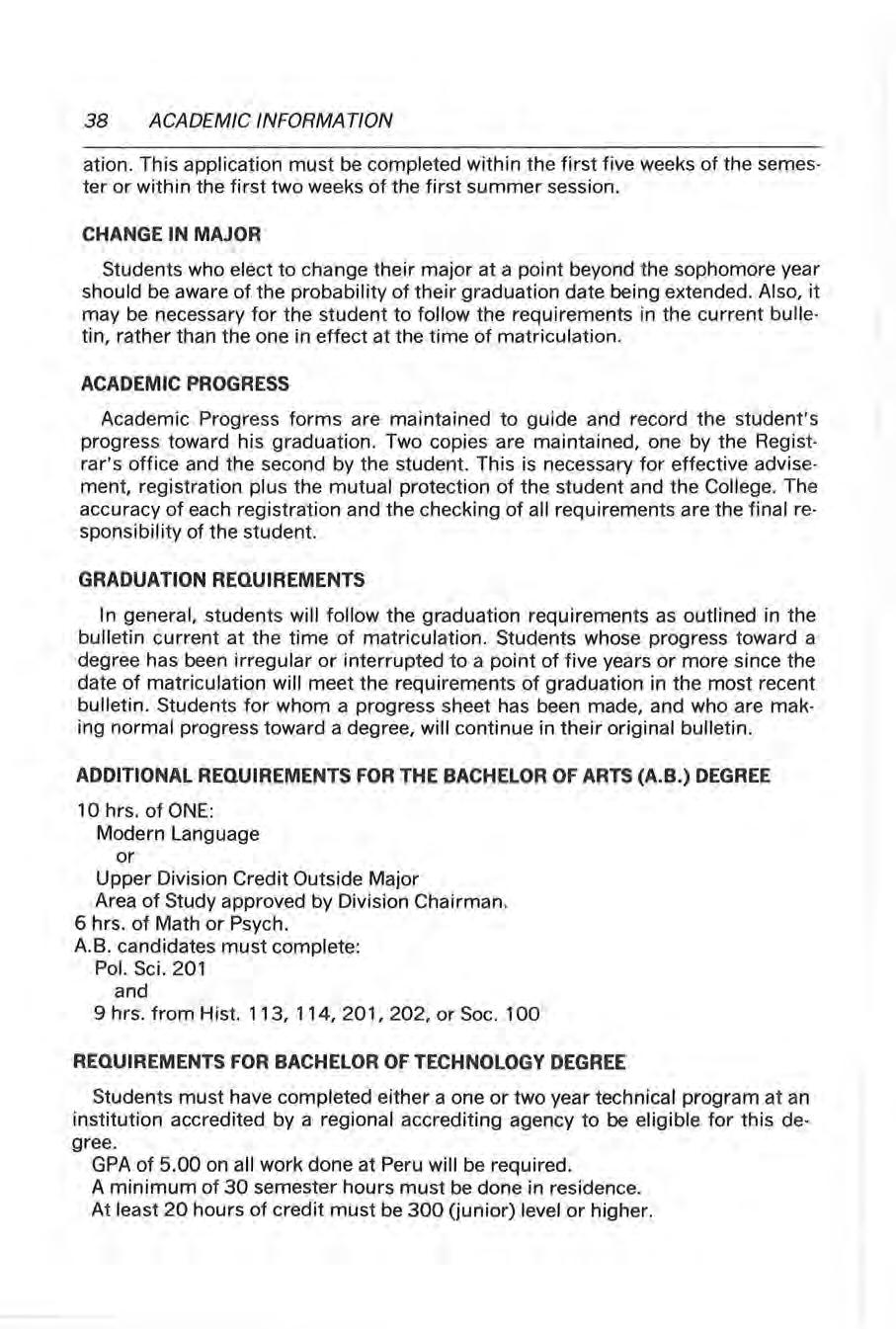
10 hrs of ONE: Modern Language or Upper Division Credit Outside Major Area of Study approved by Division Chairman. 6 hrs. of Math or Psych.
A.B candidates must complete: Pol. Sci. 201 and 9 hrs. from Hist. 113, 114, 201, 202, or Soc. 100
Students must have completed either a one or two year technical program at a n institution accredited by a regional accrediting agency to be eligible for this degree.
GPA of 5.00 on all work done at Peru will be required. A minimum of 30 semester hours must be done in residence. At least 20 hours of credit must be 300 (junior) level or higher.
Students who have completed their programs at a non-accredited technical institution are subject to the same probationary provisions as are students seeking the B.S. and B.A. degrees who transfer from non-accredited institutions.
The degree for successful candidates will read Bachelor of Technology in whatever the transfer major is with an additional emphasis in whatever the resident area of emphasis is.
EXAMPLE: Bachelor of Technology in Food Service with additional emphasis in Biology.
Program of Study at Peru State College For Transfer Students With An A.A. or A.S. Degree
General Studies: Thirty semester hours required exclusive of hours used to fulfill resident area of emphasis At least 3 hours selected from each area listed below and no more than 9 hours of the 30 hour total in any one area.
English Composition
Communications
Social & Behavioral Science
Applied Arts
Mathematics / Science
Literature / Fine Arts
Health & Hygiene / P.E.
Resident Area of Emphasis: Minimum of 25 semester hours. Courses selected by student and advisor, but must be concentrated in one discipline . Composite grade average of "5" is required in courses making up this area of emphasis.
Transfer Technical Major: 60 semester hours maximum . This is the maximum number of hours from the A.A. or A.S. degree applicable toward the 125 hours required for the Bachelor of Technology Degree.
Directed Electives To Total of 125 Hours: Hours may be selected from general studies beyond the required 30 hours; additional courses supportive of the resident area of emphasis or the transfer technical major, or others as directed by the advisor
Program Of Study At Peru State College For Transfer Students Who Have Completed A Designated One Year Program General Studies: Thirty semester hours required exclusive of hours used to fulfill resident area of emphasis. At least three hours selected from each area listed below and no more than 9 hours of the 30 hour total in any one area .
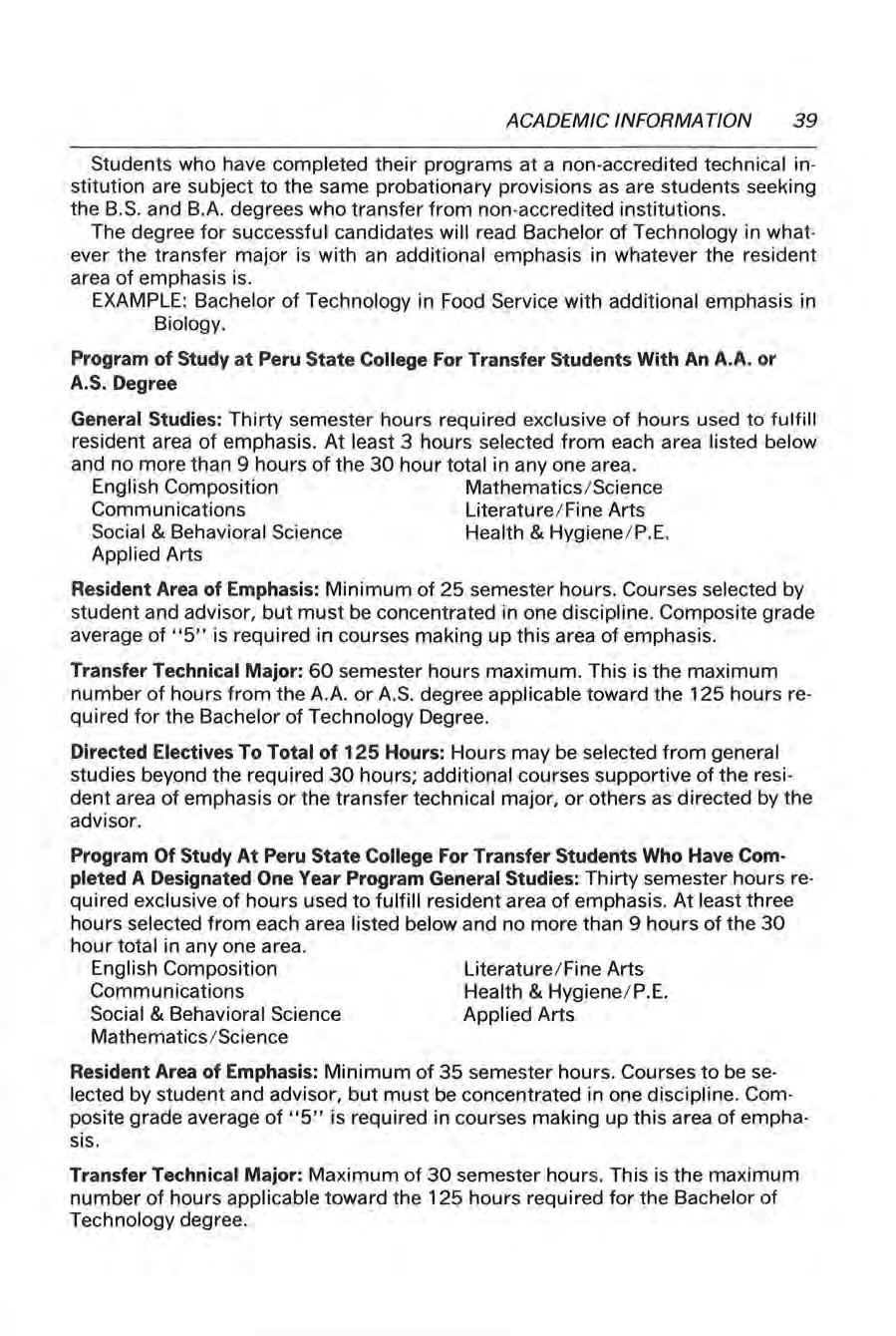
English Composition
Communications
Social & Behavioral Science
Mathematics I Science
Literature I Fine Arts
Health & Hygiene / P.E.
Applied Arts
Resident Area of Emphasis: Minimum of 35 semester hours. Courses to be selected by student and advisor, but must be concentrated in one discipline. Composite grade average of "5" is required in courses making up this area of emphasis
Transfer Technical Major: Maximum of 30 semester hours. This is the maximum number of hours applicable toward the 125 hours required for the Bachelor of Technology degree.
Directed Electives To Total of 125 Hours: Hours may be se lected from genera l studies beyond the required 30 hours; additional courses supportive of the resident of emphasis or the transfer technical major, or others as directed by the advisor.
The purpose of General Studies at Peru State is to provide undergraduates with the concepts, understandings, skil l s, and values necessary for living purposefully in modern society. These studies, emphasizing the relation and unity of basic ideas from the several disciplines, are selected for their usefulness in helping to solve the common problems in both an individual and social context. To establish the unity of knowledge and experience, the distinct courses in general studies share common goals in the sense that they all should promote a spirit of inquiry, relate knowledge from various fields, and encourage continued liberal education on the part of the student. Specific courses are held to a minimum, with the intent that students should be encouraged to select those courses most appropriate to their educational needs.
1. Promote the student's understanding of his rights, privileges and responsibilities of participation and leader ship in a democratic society.
2. Encourage intellectual curiosity.
3. Increase the student's ability to app ly abstract knowledge to practica l and concrete s itu ations.
4. Provide the opportunity to understand his interaction with his environment.
5. Provide opportunity to develop physical, social and emotional maturity.
6 . Increase the student's ability to read and listen with critical comprehension.
7. Increase his ability to convey ideas, feelings and / or experiences to others with clarity.
8. Provide the opportunity to establish educational and vocational goals.
9. Encourage the growth of desirable leisure time activities.
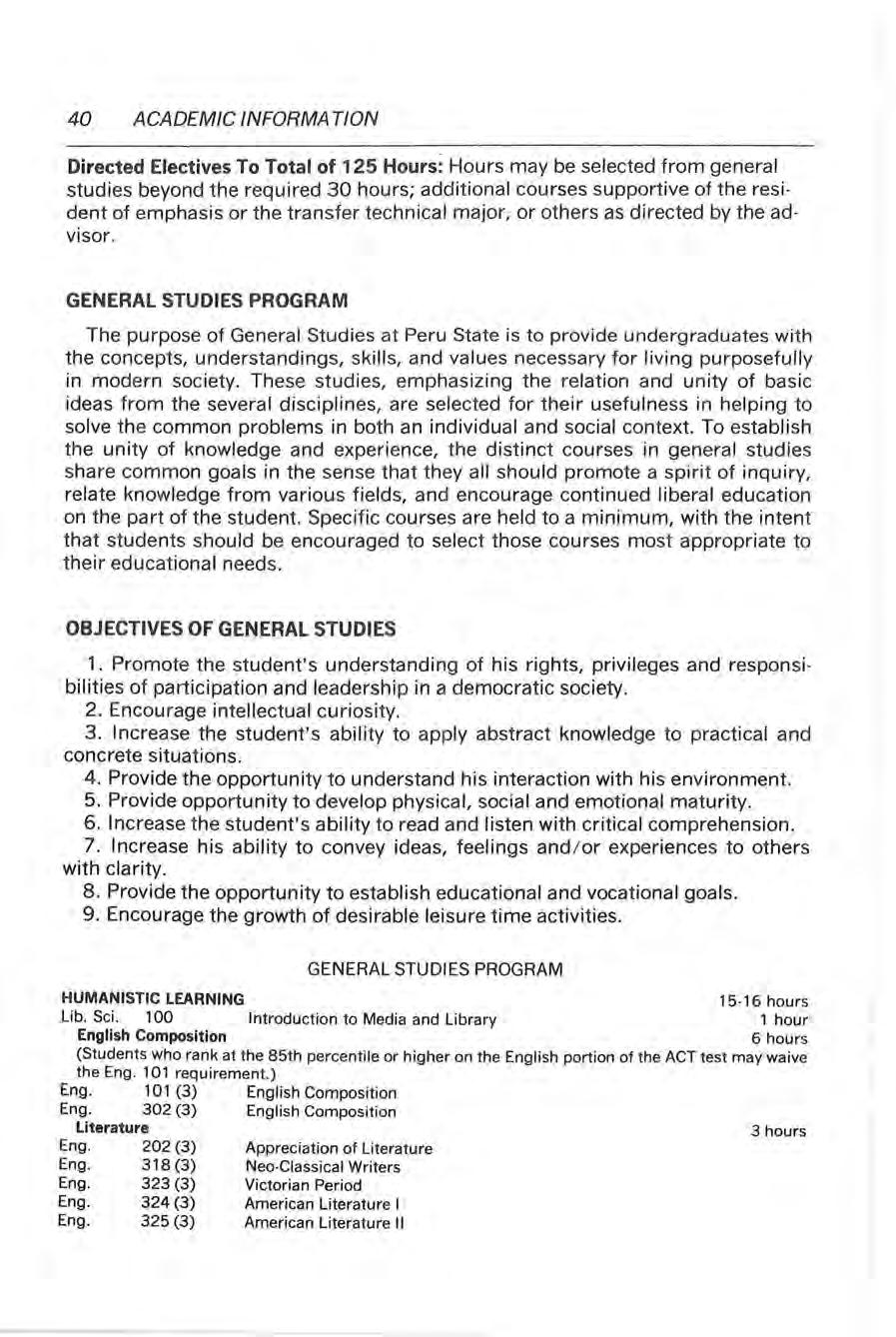
(Students who rank at the 85th percentile or hig her on the English portion of the ACT test may waive the Eng. 101 requirement.)
Eng. 101 (3) English Composition
Eng. 302 (3) English Composition
318 (3)
323 (3) Eng. 324 (3)
325 (3)
Communications
Speh. 152 (3)
Speh. 254 (3)
~ /(le, 260(3)
Fine Arts
Fundamentals of Speech
Public Speaking Radio and Television Announcing
Art 306 (2) Art Appreciation
Art 317 (3) Art History I
Art 318 (3) Art History II
Art 319 (3) Midwestern Museums of Art
Mus. 311 (3) Music Appreciation al'jd History of Musi Ci
SOCIAL LEARNING Jl-,,.., .s 4 U Ii - .,.f Uu < H - .'.l 1-lr.S
3 hours
2-3 hours
16-17 hours
Education Degree recipients must have completed Pol. Sci. 201 and three hours of American History.
Social and Behavioral Science
(No more than 6 hours in history)
Econ . 333 (3) Economic History of the U.S.
Geog. 103 (3) Cultural Geography
Hist. 113 (3) History of the U.S. to 1865
Hist. 114 (3) History of the U.S. Since 1865
Hist. 201 (3) World Civilization to 1500
Hist. 202 (3) World Civilization Since 1500
Hist. 455 (3) Twentieth Century Russia
Hist. 303 (3) The U .S. in the 20th Century
Hist. 467 or Pol. Sci. 467 (3)
Phil. 201 (3)
Phil. 301 (3)
Pol. Sci 201 (3)
Psych 121 (3)
Rec. 220 (3)
Soc. 201 (3)
Soc. 300 (3)
Soc. Sci. 100 (3)
Health and Hygiene
Educ. 415 (2)
H.Ec. 332 (3)
P E. 205 (3)
P.E. 215 (3)
Soc. 340 (3)
P.E. Activities
P. E. 90 (1)
P.E. 101 (1)
P.E. 102 (1)
P.E. 3 (1)
P E. 5 (1)
P.E. 103 (1)
P.E. 104(1)
P.E. 4(1)
P. E. 8(1)
P.E. 9 (1)
P.E. 10(1)
P.E 1 (1)
P.E 2 (1)
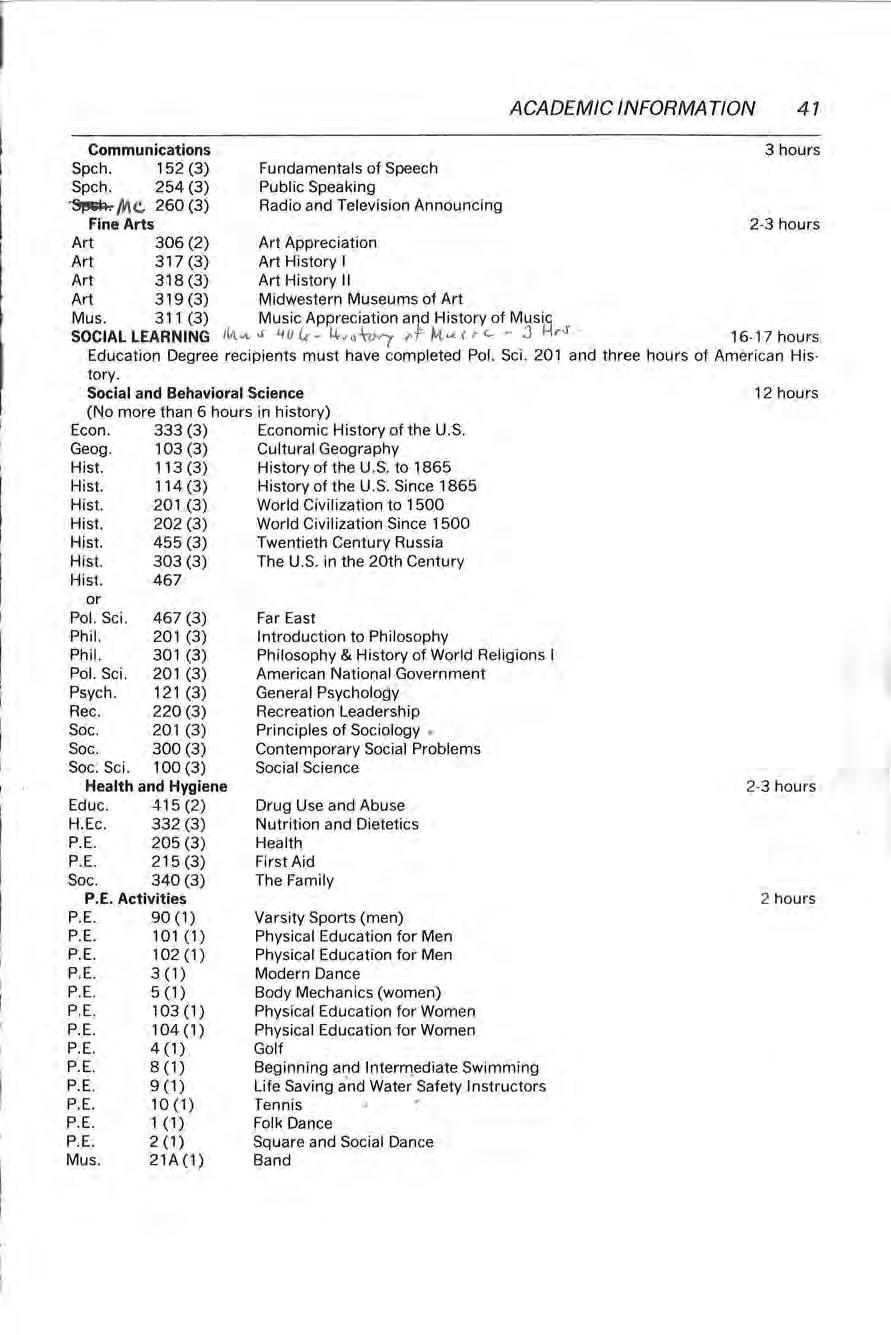
Mus. 21A(1)
Far East
Introduction to Philosophy
Philosophy & History of War-Id Religions I
American National Government
General Psychology
Recreation Leadership
Principles of Sociology • Contemporary Social Problems
Social Science
Drug Use and Abuse
Nutrition and Dietetics
Health
First Aid
The Family
Varsity Sports (men)
Physical Education for Men
Physical Education for Men
Modern Dance
Body Mechanics (women)
Physical Education for Women
Physical Education for Women
Golf
Beginning and lr,term ediate Swimming
Life Saving a ' nd Water Safety Instructors
Tennis •
Folk Dance
Square and Social Dance Band
12 hours
2-3 hours
2 hours
SCIENTIFIC LEARNING
Mathematics
(Students who rank at the 85th percentile or higher on the mathematics section of the ACT test may waive the mathematics requirement )
Math 100 or
Bus 100 (3)
Math. 10(1)
Math. 20(1)
Math 30 (1)
Math 40 (1)
Math 50(1)
Math. 70 (1)
Math . 80 (1)
Math 101 (3)
Math / Bus. 102 (3) or Math 105 (5)
Math. 200 (3)
Math . 300 (3)
Math / Bus. 340 (3) Science
Biol. 101 (3)
Biol. 102 (3)
Chem 101 (4)
Chem. 102 (4)
Geol. 201 (4)
Geol. 202 (1 -3)
·
Geol. 203 (1-3)
Geol. 304 (3)
G.Sci. 201 (3)
G.Sci. 202 (3)
G.Sci. 205 (3)
G Sci. 206 (3)
Phys 201 (4)
Phys 202 ~)
t,: ic.: .13J j)
TECHNICAL LEA NING
Logic and Sets
Geometry
Practical Trigonometry
Slide Rule and Logarithms
Math Appreciation
College Algebra
Introduction to Data Processing
Precalculus Mathematics
Basic Concepts of Mathematics
Algebra and Geometric Concepts
Statistics
Plant Biology
Animal Biology
General Chemistry I
General Chemistry II
Physical Geology
Rocks and Minerals
Introduction to Fossils
Meteorology and Climatology
Biological Science (Elementary Educ. only)
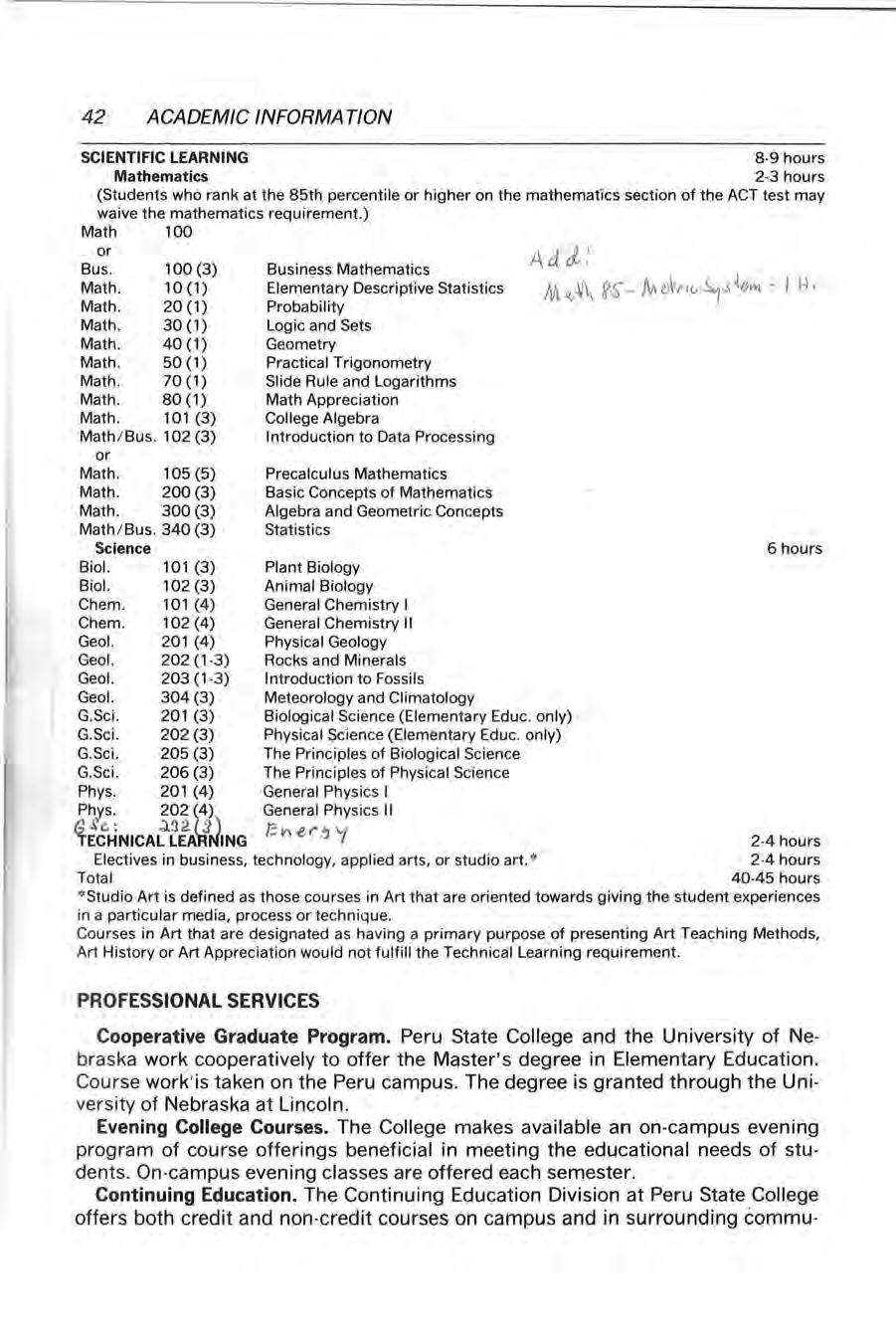
Physical Science (Elem entary Educ only)
The Principles of Biological Science
The Principles of Physical Science
General Physics I
General Physics II /:;ne,l'!J'f
Electives in business, technology , applied arts, or studio art. ,; ,.
Total
6 hours
2-4 hours 2-4 hours 40-45 hours
* Studio Art is defined as those courses in Art that are oriented towards giving the student experiences i n a particular media, process or technique.
Co urses in Art that are designated as having a primary purpose of presenting Art Teaching Methods, Art History or Art Appreciation would not fulfill the Technical Learning requirement
Cooperative Graduate Program. Peru State College and the University of Nebraska work cooperatively to offer the Master's degree in Elementary Education. Course work•is taken on the Peru campus The degree is granted through the University of Nebraska at Lincoln. •
Evening College Courses. The College makes available an on-campus evening program of course offerings beneficial in meeting the educational needs of students. On-campus evening classes are offered each semester.
Continuing Education. The Continuing Education Division at Peru State College offers both credit and non -credit courses on campus and in surrounding commu-
nities Requests for information should be sent to the Director of Continuing Education
Summer Session. A 10-week summer session is divided into two five-week terms which makes it possible for a student to earn a maximum of 12 semester hours of credit, six hours in each term. Courses are available which make it possible for a recent high school graduate to begin his post secondary education during the summer. Request for information concerning the summer session and summer school bulletin should be directed to the Director of Summer Sessions
This implies attainment beyond the minimum for admission to the College. The status may be acquired by (1) presenting work completed in another college; (2) demonstrating proficiency in a certain field, thus removing the requirement of certain prerequisites. The latter may be with or without credit.
Peru State College will accept in transfer credit earned at another college or university. This condition applies also to credit earned on an interim basis at another college while essentially a student at Peru State College
A transfer student who has earned an Associate of Arts or Associate of Science degree will be regarded as having met the general studies program of Peru State provided the program of the college from which the individual is transferring has been approved by the Academic Affairs Commission of this College. Special provisions apply to transfer students seeking a Bachelor of Technology Degree.
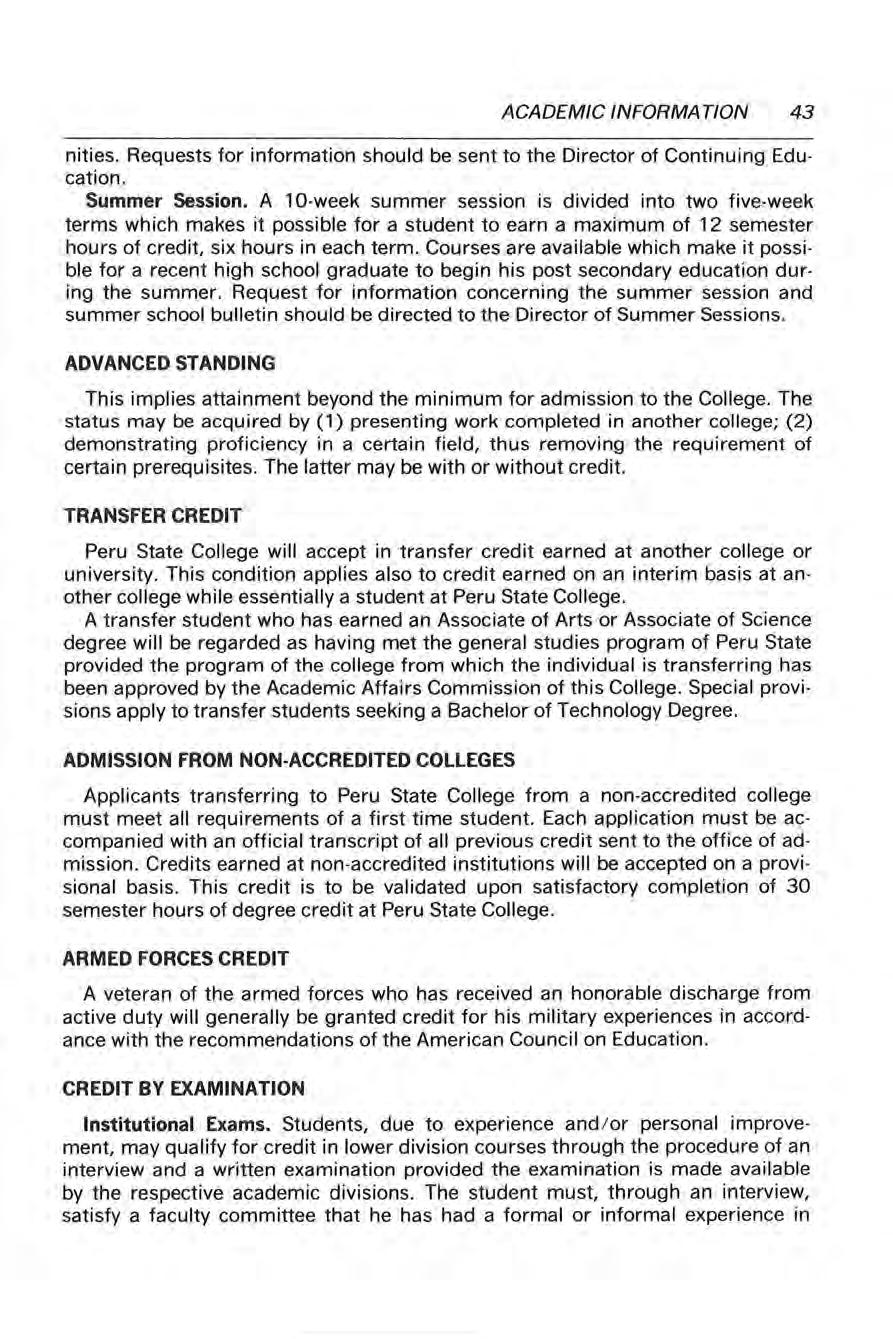
Applicants transferring to Peru State College from a non-accredited college must meet all requirements of a first time student. Each application must be ac;companied with an official transcript of all previous credit sent to the office of admission. Credits earned at non -accredited institutions will be accepted on a provisional basis. This credit is to be validated upon satisfactory completion of 30 semester hours of degree credit at Peru State College.
A veteran of the armed forces who has received an honorable discharge from active duty will generally be granted credit for his military experiences in accordance with the recommendations of the American Council on Education.
Institutional Exams. Students, due to experience and / or personal improvement, may qualify for credit in lower division courses through the procedure of an interview and a written examination provided the examination is made available by the respective academic divisions The student must, through an interview, satisfy a faculty committee that he has had a formal or informal experience in
which the course content may have been acquired. If the committee deems the above conditions have been met, the student will be given a written comprehensive examination.
The amount of credit to be allowed, the course for which substitution, if any, is made, and the particular graduation requirements which may be satisfied, will be determined by the Chairperson of the division and will be subject to all gene r al graduation requirements. The student must register for the course and pay the tuition charges before writing the examinations. College Level Examination Program. A student may earn credit by examination through the College-Level Examination Program (CLEP) prepared by the College Entrance Examination Board. Details of this procedure may be obtained from the Chairperson of the division representing t he student's field. The following subject areas represent possible credit by examination through this program.
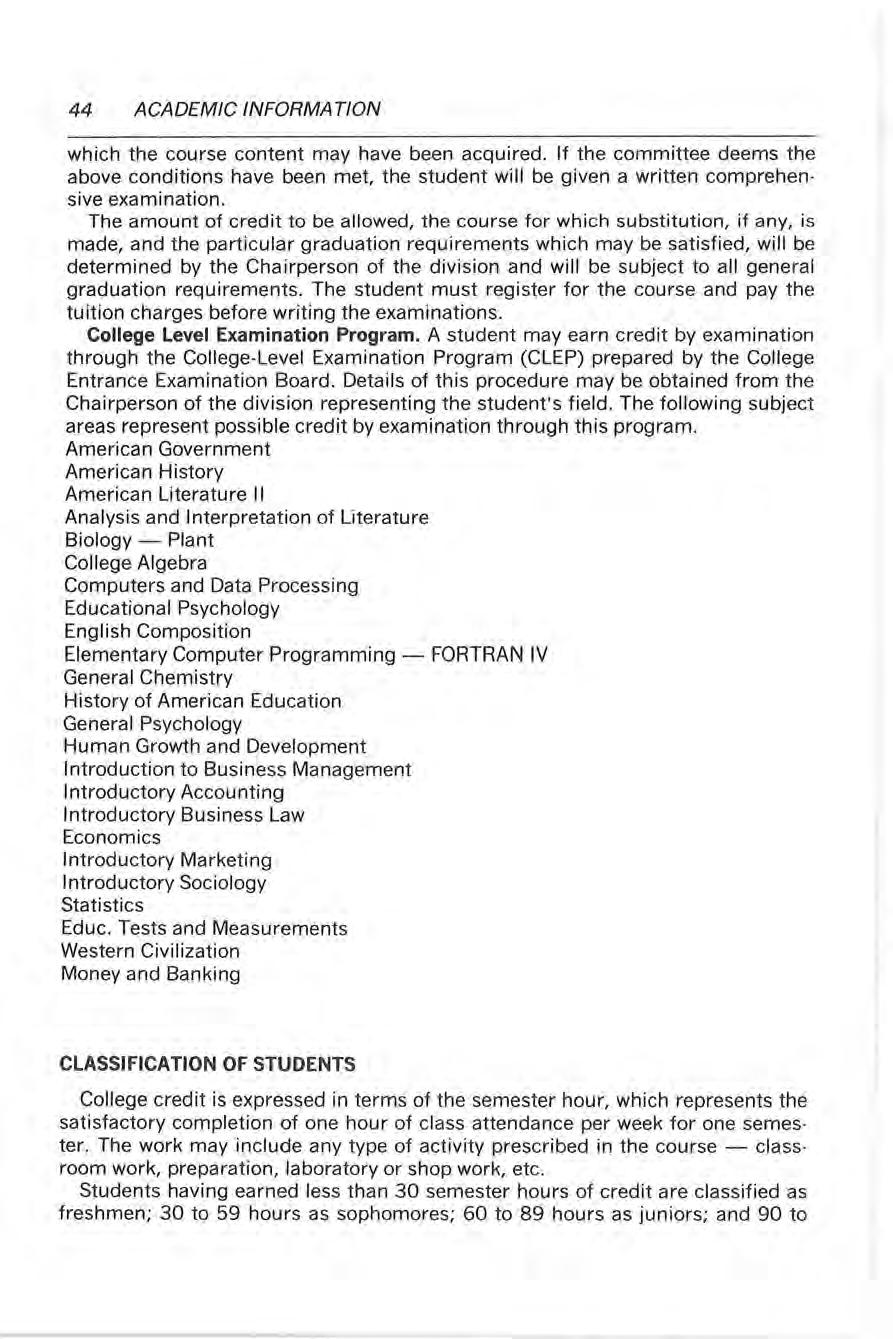
American Government
American History
American Literature 11
Analysis and Interpretation of Literature
Biology - Plant
College Algebra
Computers and Data Processing
Educational Psychology
English Composition
Elementary Computer Programming - FORTRAN IV
General Chemistry
History of American Education
General Psychology
Human Growth and Development
Introduction to Business Management
Introductory Accounting
Introductory Business Law
Economics
Introductory Marketing
Introductory Sociology
Statistics
Educ. Tests and Measurements
Western Civilization
Money and Banking
College credit is expressed in terms of the semester hour, which represents the satisfactory completion of one hour of class attendance per week for one semester The work may include any type of activity prescribed in the course - classroom work, preparation, laboratory or shop work, etc.
Students having earned less than 30 semester hours of credit are classified as freshmen; 30 to 59 hours as sophomores; 60 to 89 hours as juniors; and 90 to
125 hours as seniors. Degree students earning additional undergraduate credit are classified as post graduate students.
The normal class load for a full time student is 12 to 16 semester hours. The maximum load without special permission is 17 hours Students with a grade point average of 7.00 for the previous semester may apply to the Registrar for one additional hour, making a total of 18. An excess of 18 hours must be approved by the Chairperson of the division in which the student is majoring. ,,,,,___
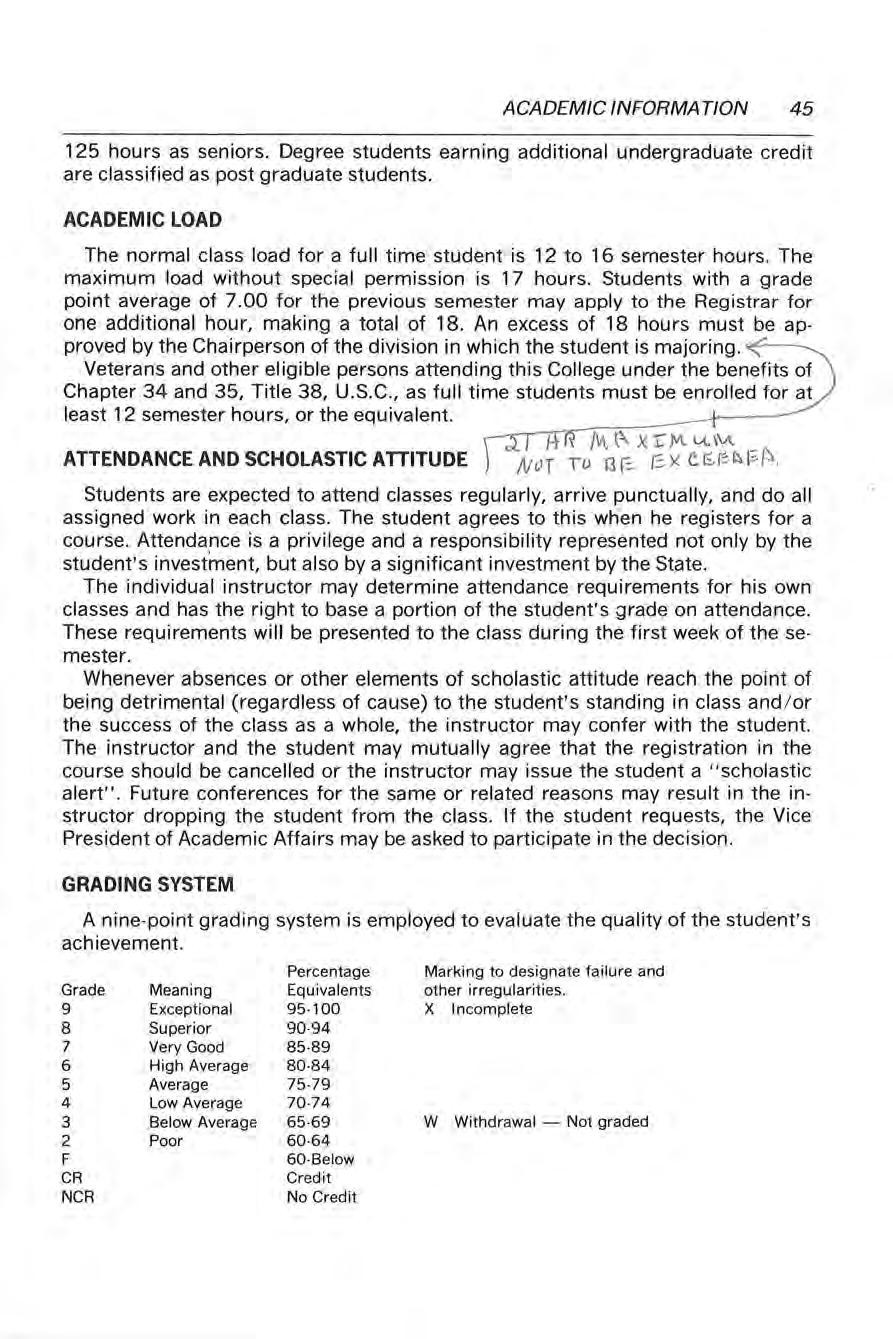
Veterans and other eligible persons attending this College under the benefits of Chapter 34 and 35, Title 38, U.S.C., as full time students must be enrolled for at least 12 semester hours, or the equivalent.
Students are expected to attend classes regularly, arrive punctually, and do all assigned work in each class. The student agrees to this when he registers for a course Attendance is a privilege and a responsibility represented not only by the student's investment, but also by a significant investment by the State.
The individual instructor may determine attendance requirements for his own classes and has the right to base a portion of the student's grade on attendance. These requirements will be presented to the class during the first week of the semester.
Whenever absences or other elements of scholastic attitude reach the point of being detrimental (regardless of cause) to the student's standing in class and / or the success of the class as a whole, the instructor may confer with the student. The instructor and the student may mutually agree that the registration in the course should be cancelled or the instructor may issue the student a "scholastic alert". Future conferences for the same or related reasons may result in the instructor dropping the student from the class. If the student requests, the Vice President of Academic Affairs may be asked to participate in the decision.
A nine -point grading system is employed to evaluate the quality of the student's achievement.
The grades in numbers indicate the value of each semester hour of credit and also become th e means of calculating the student ' s grade point average (GPA) to compare with scholarship standards . Students are urged to calculate t heir own GPA from time to time and realize their own status The following two examples will be valuable in understanding the calculations :
GPA = 117 - 16 = 7 . 31
* When credit is ungraded , it is not included in * This effects a lower GPA since credit valu e is divisor for GPA. part of divisor.
GPA = 37 - 15 = 2.47 (This GPA subjects the
Incomplete (X) work may be completed and cleared through the instructor to earn a passing mark, and this must be done within the next semester or the record will show F (Failing).
A candidate for a baccalaureate degree must earn at least 125 semester hours with a minimum grade point average of 5.00. A minimum GPA of 5 25 must be earned for degrees in Education. A candidate for the Associate of Arts degree must earn at least 60 semester hours with a minimum grade point average of 5 . 00.
To provide early information to students in regard to their academic work, grades are reviewed at the end of each nine weeks A mid -term report for low o r failing work is provided the student. A student receiving this notification should confer with the instructor and his faculty advisor.
A student to be in good standing academically must maintain the required GPA for the respective degree being pursued . A notice of unsatisfactory scholarship is forwarded to the student by the Vice President of Academic Affairs at the end of the semester if the GPA is 4.0-4.99. The notice is not a penalty, but a warning to notify the student that improvement is needed.
Should a student's GPA be 2.00-3.99 at the end of the semester, the student is notified he is on academic probation for the next semester and will be subject to academic suspension if his GPA is still under 4.0 at the end of the probationary semester. Academic suspension is generally for two semesters.

If a student's GPA is below 2.00 at the end of any term, he will be academically suspended
Students suspended for academic or social reasons are to apply at the Office of Admissions for readmission. Policies and conditions governing readmission are in the Student Handbook.
Students readmitted following academic suspension must maintain an average of 5.0 or higher for all course work taken each term or raise the cumulative G.P.A. to 4.0 or higher
At the end of each semester the Vice President of Academic Affairs publishes the Honor Roll, which includes the names of students who have earned a grade point average of 7.25 and higher for that term .
Graduation honors are conferred on bachelor's degree candidates who have earned a minimum of 60 hours in residence and associate degree candidates who have earned a minimum of 45 hours in residence. Only resident hours will be considered in the grade point average. Grades and credits earned at other colleges or universities are not applicable.
The scholastic requirements are as follows:
8.50 - 9.00 With Highest Distinction
8 00 - 8.49 With High Distinction
7.25 - 7.99 With Distinction
To register for a course on an audit basis implies no credit. The student pays the regular tuition fee, and is not required to write tests, examinations, and / or papers.
Private instruction is available in music. Music students will receive private instruction without charge, in relation to their major. Other students will pay the rate per lesson as listed in the Financial Information section of catalog
A student may and is urged to repeat any course in which he has failed. There may be occasions when a student chooses to repeat a course purely for review, to be taken on an audit basis, without a change of grade.
The accuracy of each registration as related to class periods, sections, days and other possible conflicts is the responsibility of the student. Also, the ultimate responsibility for the meeting of all requirements rests with the student. In the event a change in program is unavoidable following a registration, the student must secure the approval of the advisor and the instructor . No courses may be added after the first two weeks of a semester. When applicable, a tuition refund will be made during the first two weeks of a semester.
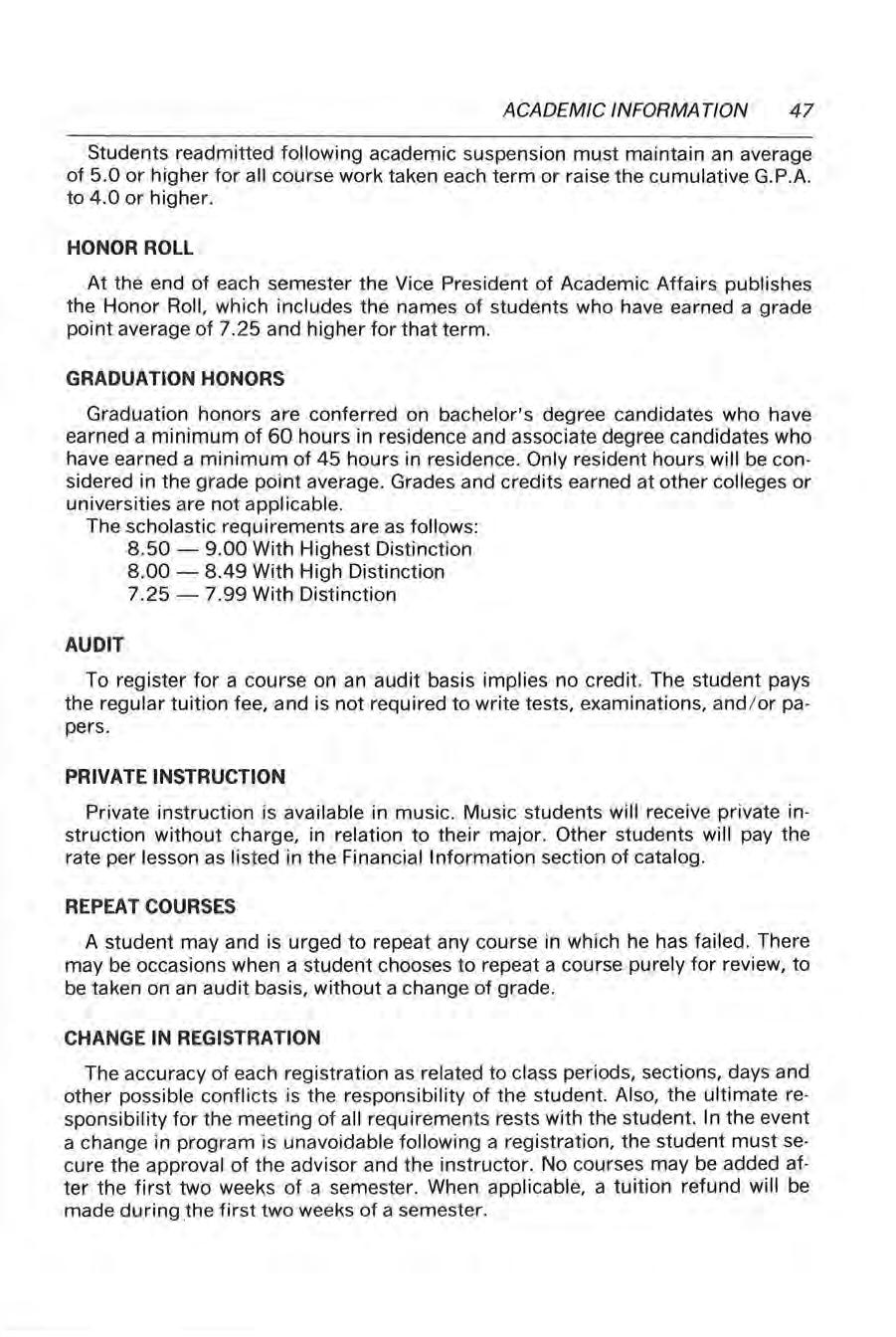
A student finding it necessary to withdraw from a class at any time must notify his advisor and the instructor and must officially withdraw at the Registrar's Office. Students withdrawing without official approval will be graded "F".
Withdrawal prior to the last two weeks of the term will be recorded as "W" on the permanent record. Withdrawal during the last two weeks and prior to the time of the final examination will result either in a grade of "W" or "F" depending on the grade at the time of withdrawal.
If it is nece ssary for a student to withdraw from College, he secures the appropriate form from the Dean for Student Development. This form must be presented to identified members of the faculty for their signatures. The withdrawal form i s filed in the Registrar ' s Office The reimbursement of fees is made from the Business Office according to the refund schedule. Students withdrawing with officia l approval will be graded "W" (Withdrawal) for all courses in which they are enrolled. Students withdrawing without offic i al approval will be graded "F".
Each student may request and receive at any time one free transcript of his academic record. There is a fee of $1.50 for each additional transcript. No transcrip t will be issued if the student has not met all financial obligations to the College.
Most professional schools require for entrance two or mo r e years of colleg e credit in general education or basic liberal arts courses which vary only s ligh tly from one profession to another . Since such work is required for the professional curricula in training teachers, this College offers a variety of courses that serve as pre -professional education. Suggested among these are those for prospective doctors, dentists, pharmacists, optometrists, nurses, veterinarians, lawye rs, engineers , agriculturists, foresters, morticians, business executives, journalists and others. It is almost impossible to list all of the many pre-professional curricula This does not preclude the avai lability of other pre -professional courses at Peru State. A student following a pre-professional program is urged to secure a bulletin from the institution to which he intends to transfer in order that specif ic requirements will be met. The various pre -professional programs are described under the appropriate school.

Students who are unable to attend college four years or more and wish to prepare for vocations requiring less time in preparation will find a variety of educational opportunities in this College There are increasing opportunities today for young people in the occupational area classified as semi -professional. Examp les of these are Medical Technology and X-Ra y Technology. A student interested in
an occupation in the above classification should know the requirements of the particular professional or technical school to which he will transfer It will then be possible for a counselor to assist him in making a parallel program of the required formal college courses. Examples are noted in the appropriate schools.

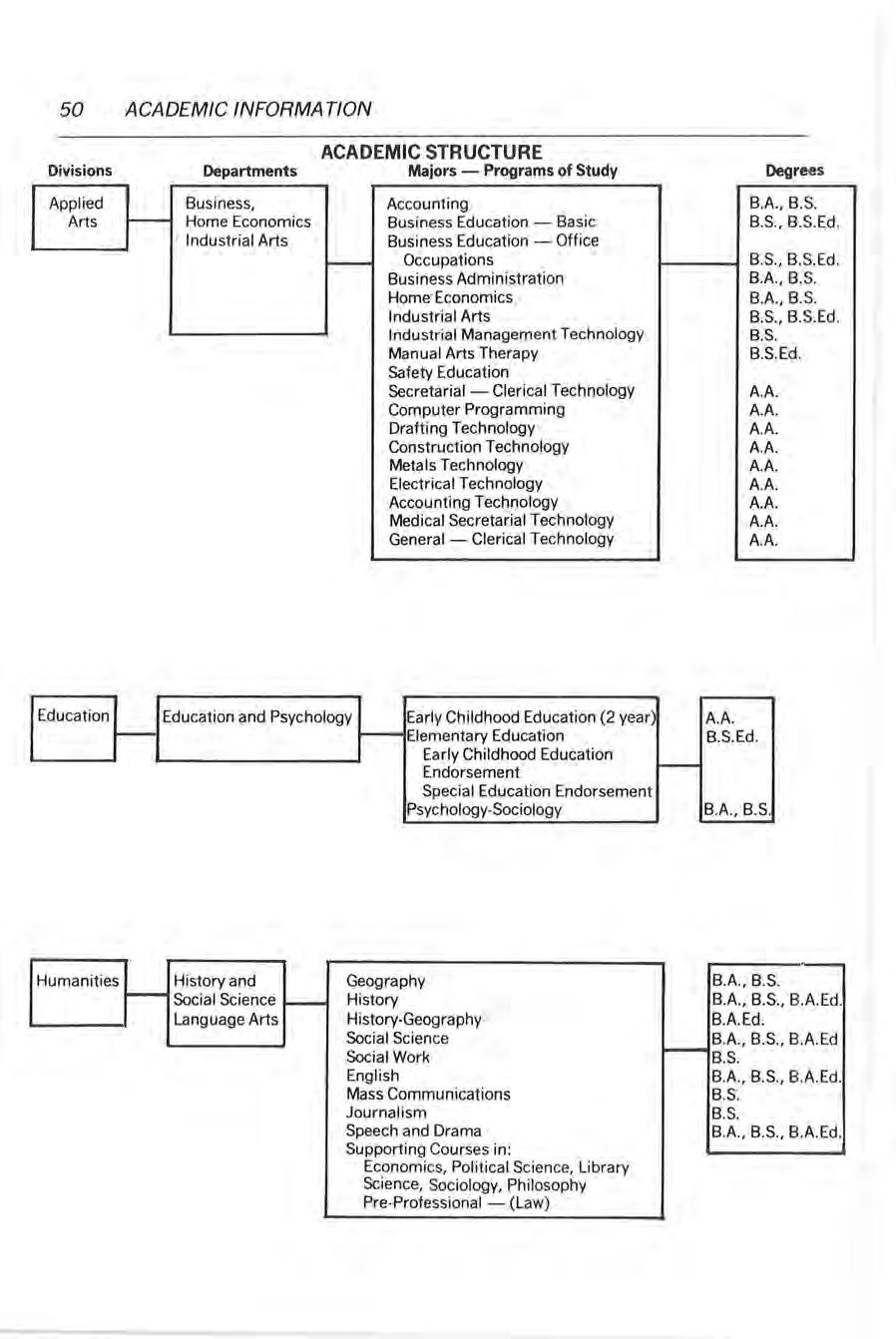

The Division of Applied Arts offers programs emphasizing practical activities and understanding typified by Industrial Arts, Business, Home Economics, and Technical Education The major objective is to enable individuals to prepare for personal living needs through practical activities. Courses are designed to give students the knowledge, habits and skills necessary to provide sufficient preparation for vocational use and / or teaching.
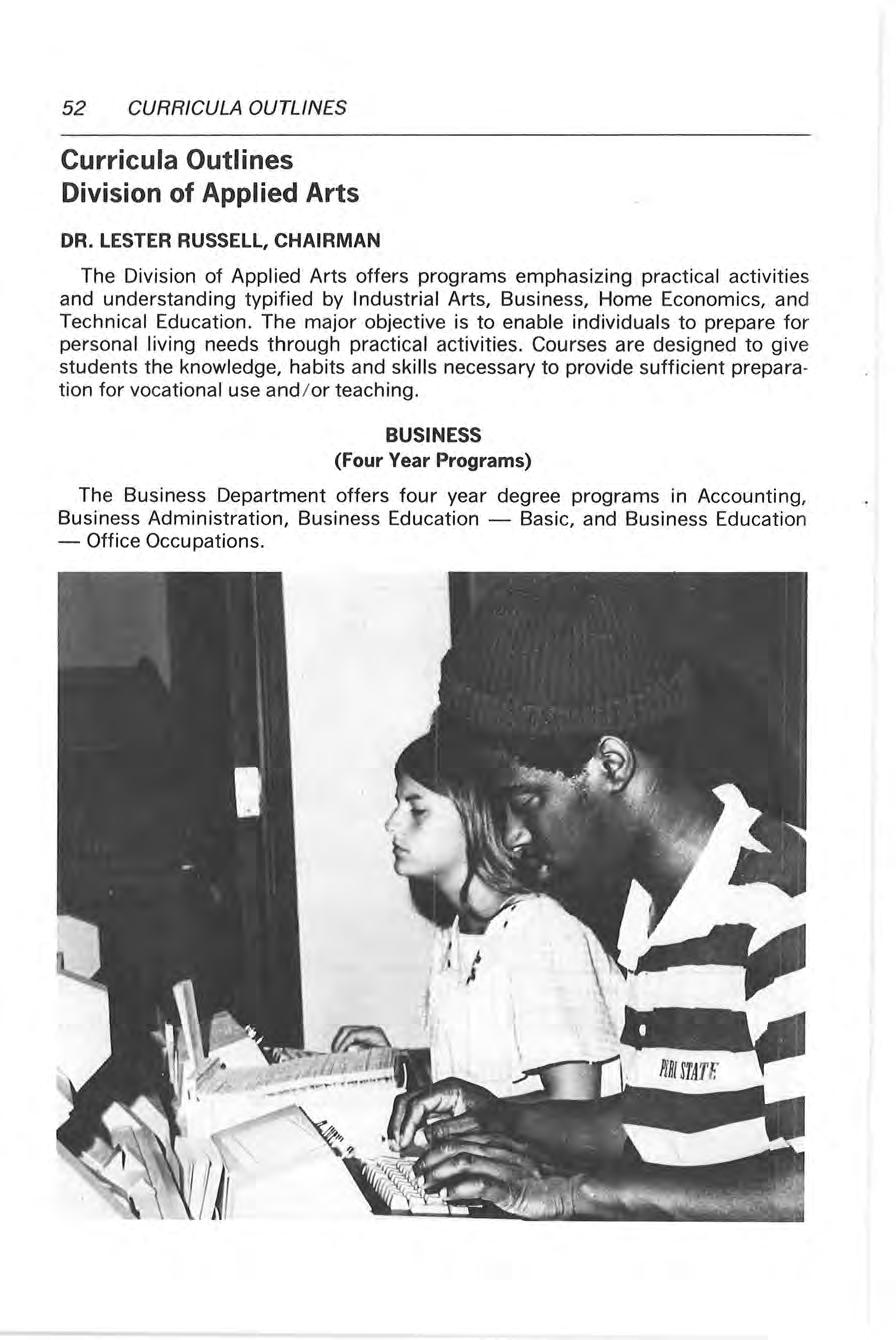
The Business Department offers four year degree programs in Accounting, Business Administration, Business Education - Basic, and Business Education - Office Occupations.

(Two Year Progra m s)
.
The Bu s ine ss Department offers Associate of Arts degree programs in Accounting Technology, Computer Programming, General -Clerical Technology, Medical Sec re tar ial Technology, and Secretarial- Science Technology. Student s majoring in Accounting Technology are prepared for basic record keeping, report writing, tax and cos t accounting, auditing procedures , use of busine ss machines, and operation of electronic data proce ssing machines. Computer programming majors are pr epa r ed for po s itions in data proce ss ing. Majors in General -Clerical Technology and Se cretarial -Science Technology are trained for employment in general busine ss offices as well a s for work in office s of lawyers, accountants, etc The Medical Secretarial Technology prepares the student for work with doctors, pharmacists , or other per sonnel in health fields


Students who have had prev ious instruction in typing are not to enrol l in the beg inni ng typing course without the approva l of the instructor.
Students w ho have had a lg ebra or some other advanced work in math are not to enro ll in Busine ss Math.
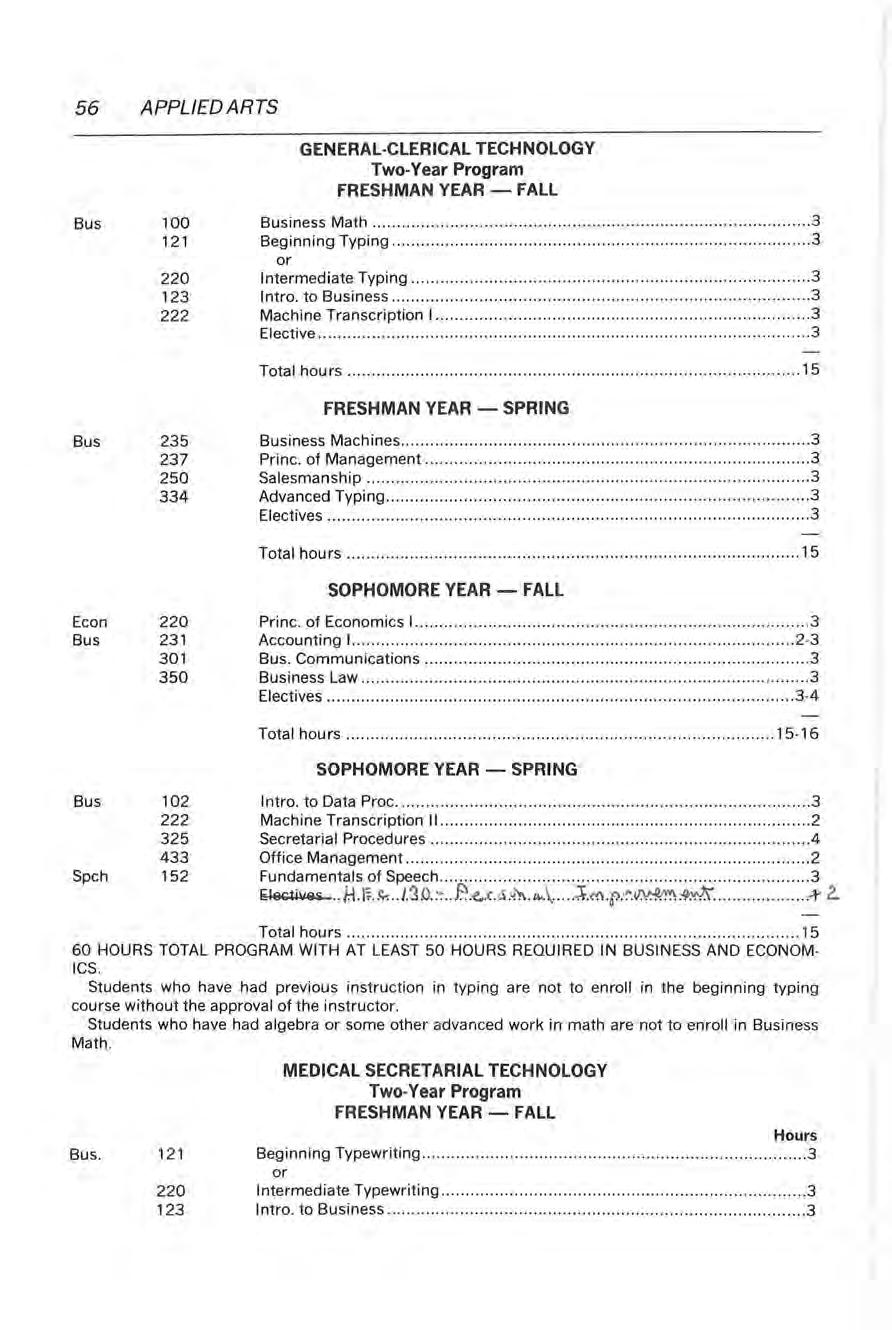


These programs are designed for students who have had considerable training in business at the high school level, and want to enter the business world with a minimal amount of training at a collegiate level.
Upon successfully completing the above program, the business department will offer a certificate of completion to all students who achieve a 5 .00 cumulative grade point average in all courses taken in the business department, and who receive a grade of no less than a 4 in a specifically required skill course
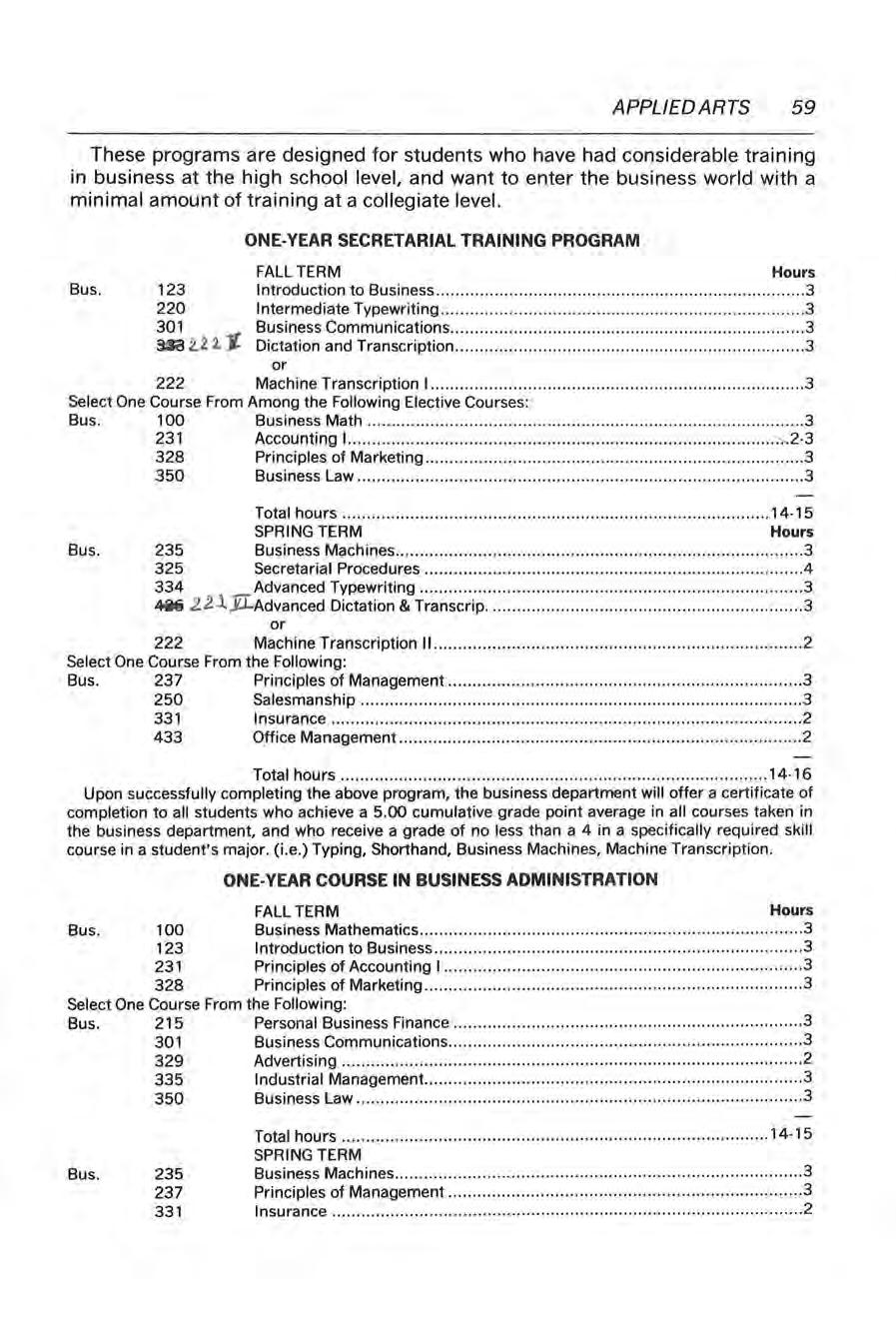
* If ACT score i n Mat hemat ics is above t h e 85t h percent il e, t h is course may be wa ived. Se l ect another co u rse from among the e lect ives
T he Business Department wi ll offer a certificate of comp let ion to those who successfu ll y complete t h e above program
For those seeking approval i n Vocational Office Occupation Education, the following is required in addit ion to the general degree requirements:
1. A comprehensive major of 45 semester hours.
2. Six hours of vocat iona l courses:
a. Vocational Education 441 G
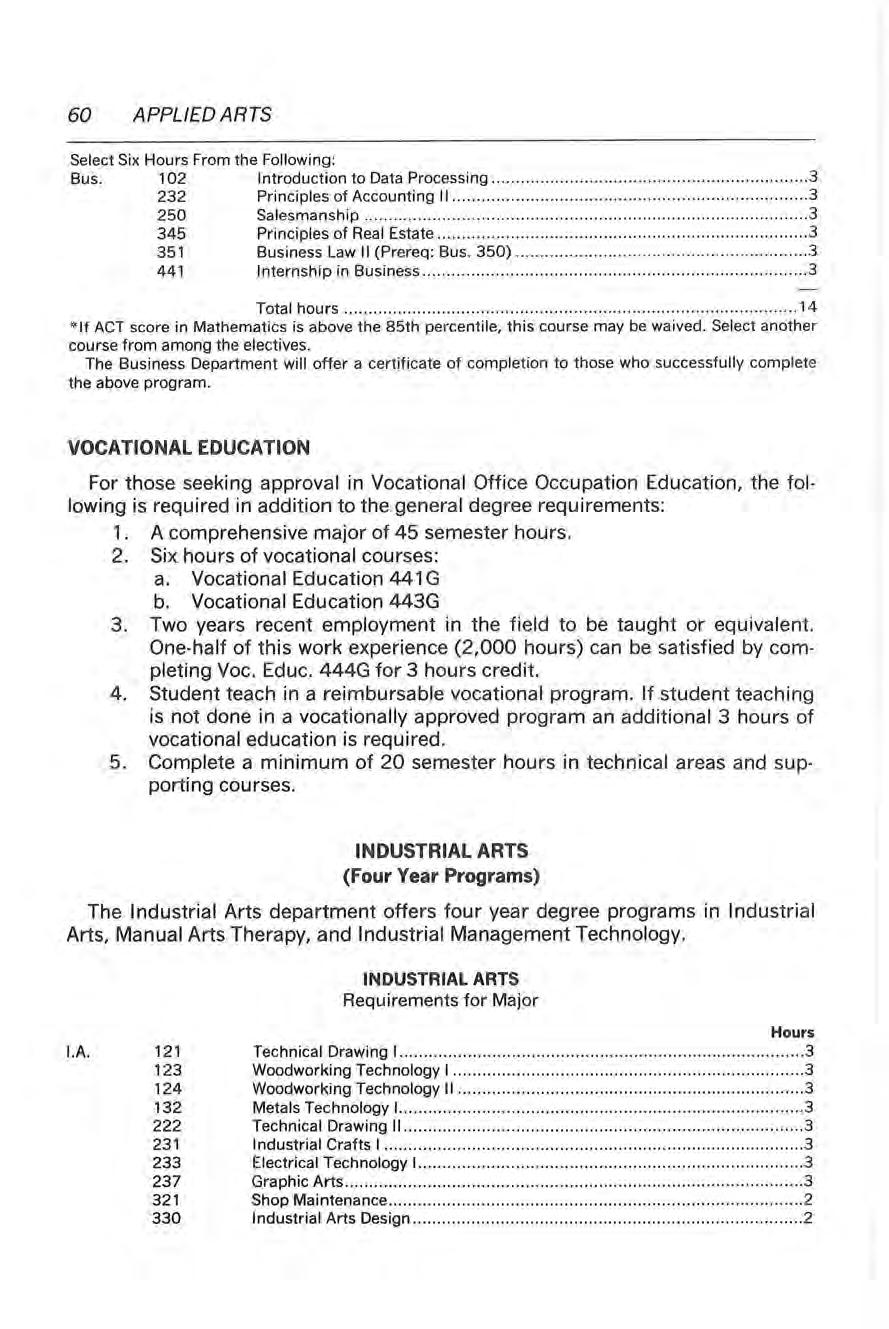
b. Vocationa l Education 443G
3. Two years recent emp loyment in the field to be taught or equiva lent. One -half of this work experience (2,000 hours) can be satisfied by com -
p let i ng Voe. Educ. 444G for 3 hours credit.
4. Student teach in a reimbursable vocational program. If student teach i ng is not done in a vocationa ll y approved program an additiona l 3 hours of vocat ional education is required
5. Complete a minimum of 20 semester hours in technical areas and support i ng courses.
ARTS (Four Year Programs)
The Industr ial Arts department offers four year degree programs in Industrial Arts, Manua l Arts Therapy, and Industria l Management Technology.
Students in Industrial Arts Teacher Education must have six credits in at least four of the following seven areas: drafting, electricity.electronics, woodworking, power mechanics, metal •working, graphi c arts and crafts.
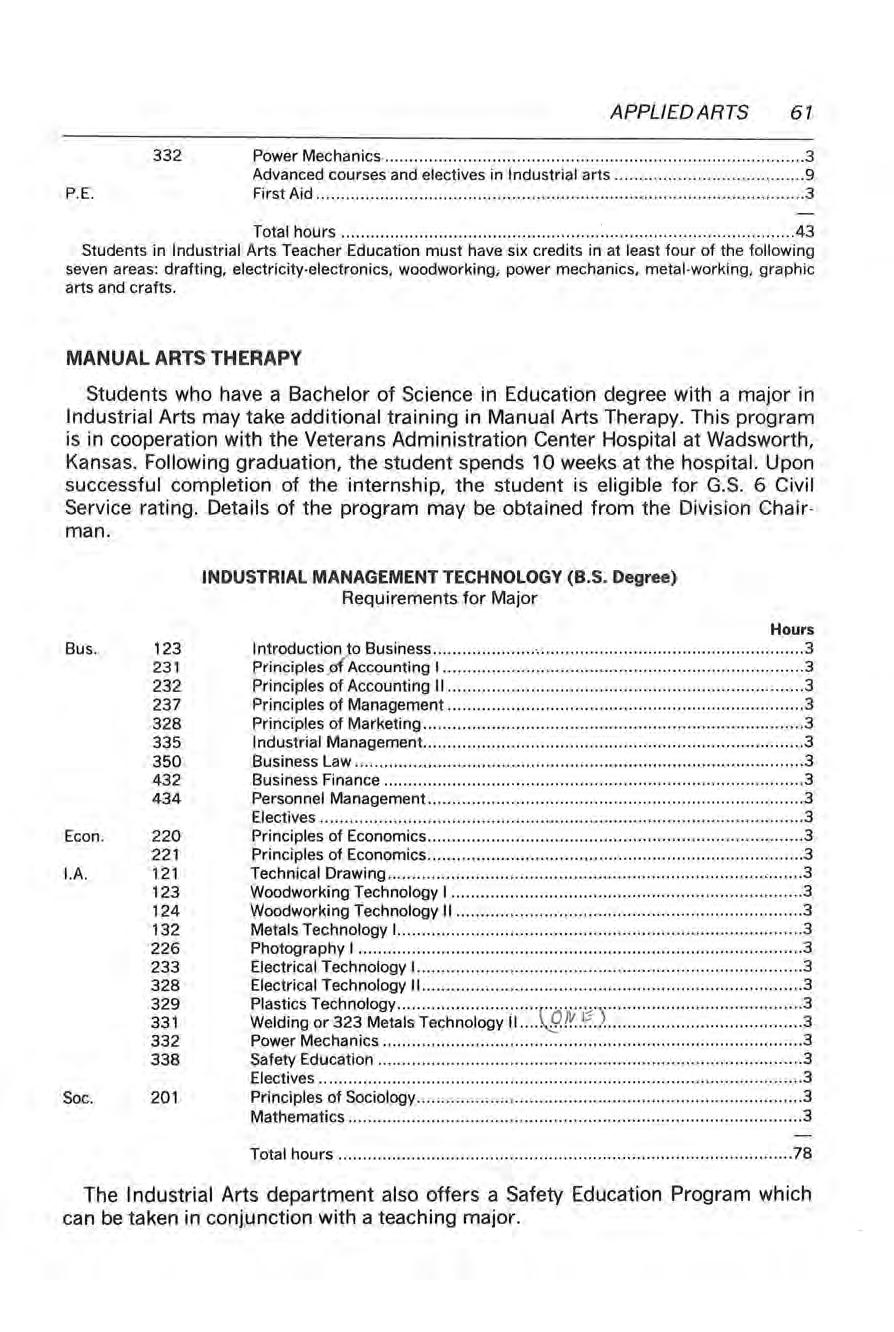
Students who have a Bachelor of Science in Education degree with a major in Industrial Arts may take additional training in Manual Arts Therapy. This program is in cooperation with the Veterans Administration Center Hospital at Wadsworth, Kansas . Following graduation, the student spends 10 weeks at the hospital. Upon successful completion of the intern ship, the student is eligible for G S. 6 Civil Service rating . Details of the program may be obtained from the Division Chair • man.
The Industrial Arts department also offers a Safety Education Program which can be taken in conj.unction with a teaching major.
Mus t hold a Nebraska driver's license
Must have a minimum driving record of two years and 20, 000 miles (state and local) free from chargeable accidents and moving traffic violations
A teaching certificate with a teaching major or endorsement, in addition to driver education is r e• quired.
IN
(Two Yea r Progr a m)
The Industrial Arts department offer s Associate in Arts degree programs in Construction Technology, Drafting Technology, Electrical Technology, and Meta ls Technology . Students who complete the Associate of Arts deg r ee may continue to study for the four year degree with a major in Industrial Arts.
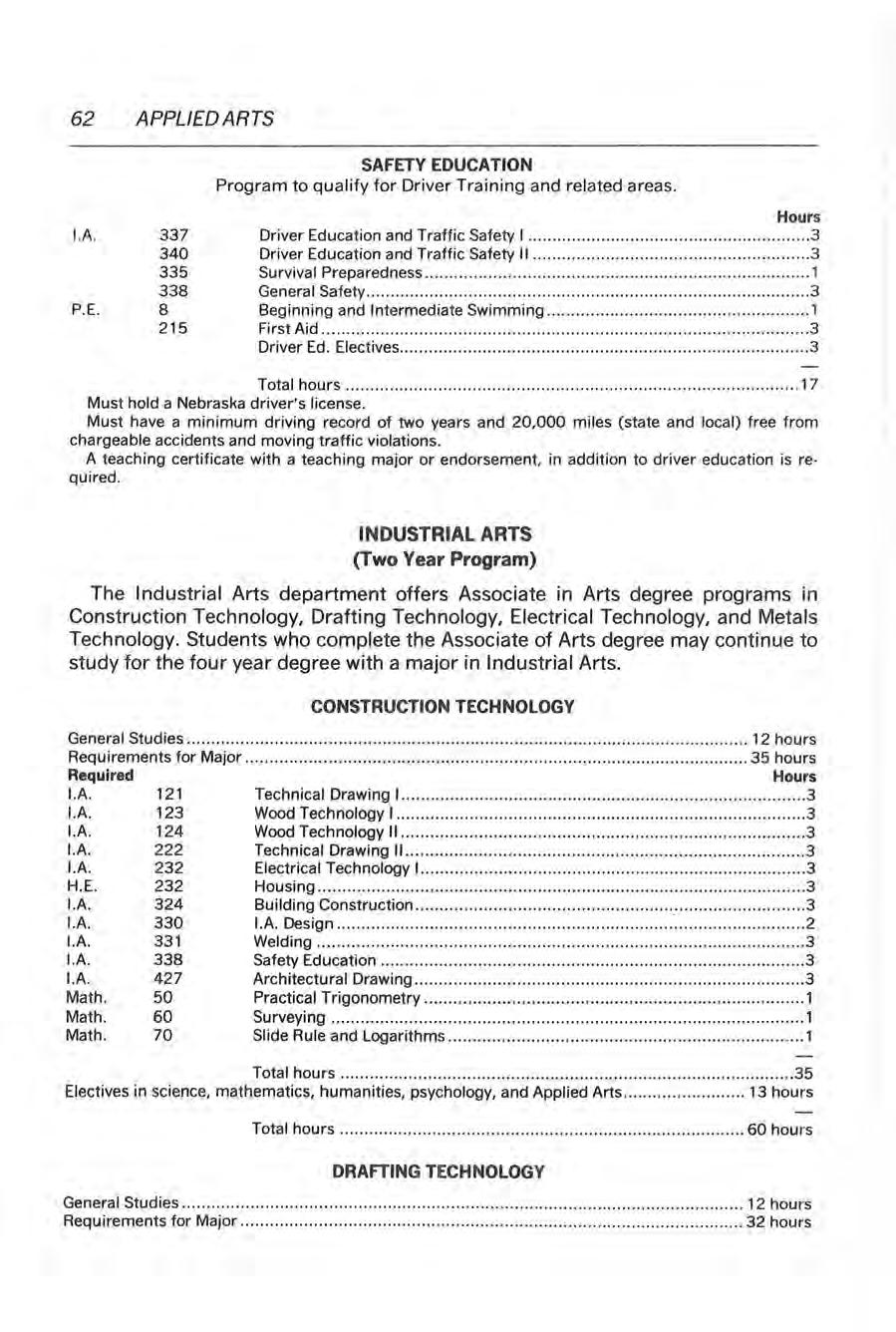

For those seeking approval in Vocational Trades and Industrial Education, the following is required in addition to the general degree program.
1. A comprehensive major of 45 semester hours
2. Six hours from the following Vocational courses :
a. Vocational Education 441 G
b. Vocational Education 442G

c. Vocational Education 443G
3. Two years recent employment in the field to be taught or equivalent. One-half of this work experience (2,000 hours) can be satisfied by completing Voe . Educ. 444G for 3 hours credit.
4. Student teach in a reimbursable vocational program. If student teaching is not done in a vocationally approved program an add ition a l 3 hours of vocational education is required.
5. Complete a minimum of 15 semester hours of technical course work directly related to the area of specializat ion to be taught.
This four year degree program is also offered by the Division of Applied Arts
The Division of Education offers programs in Psychology and Teacher Education. The Division has as its primary responsibility the preparation of effective teachers . The focus, then, of the teacher education curriculum is upon the acquisition and development of effective instructional skills by each student in the program.
Each teacher should be able to demonstrate behaviors which will help the learner to:
1. Acquire the greatest possible understanding of himself and an appreciation of his worthiness as a member of society.
2. Acquire understanding and appreciation of persons belonging to socioeconomic groups different from his own.
3. Achieve the fullest development of his academic potential.
4. Acquire a positive attitude for developing knowledge through the learning process.
5. Acquire health habits and an understanding of the conditions necessary for the maintenance of physical a nd emotional well-being.
6 Acquire the habits and attitudes associated with responsible citizenship.
7. Receive opportunity and encouragement to become competent in one or more fields of endeavor.
8. Understand and appreciate human achievement and the interdisciplinary nature of the natural sciences, the social sciences, the humanities and the arts.
9 . Understand the opportunities for preparing himself for a productive life and encourage him to participate in these opportunities .
10. Prepare for a world of rapid change and unforeseeable demands in which continuing education becomes a part of his adult way of life.
Teacher candidates should apply for admission to teacher education during their sophomore year. Admission • to th'e program is a prerequisite for student teaching. Application forms are available in rooms ED 200 and 201.
The Teacher Education Committee is responsible for admission or denial to teacher education. In all cases students will be informed of their status. Students may request a hearing before the Teacher Education Committee by making written application to the Chairman, Division of Education and Psychology.
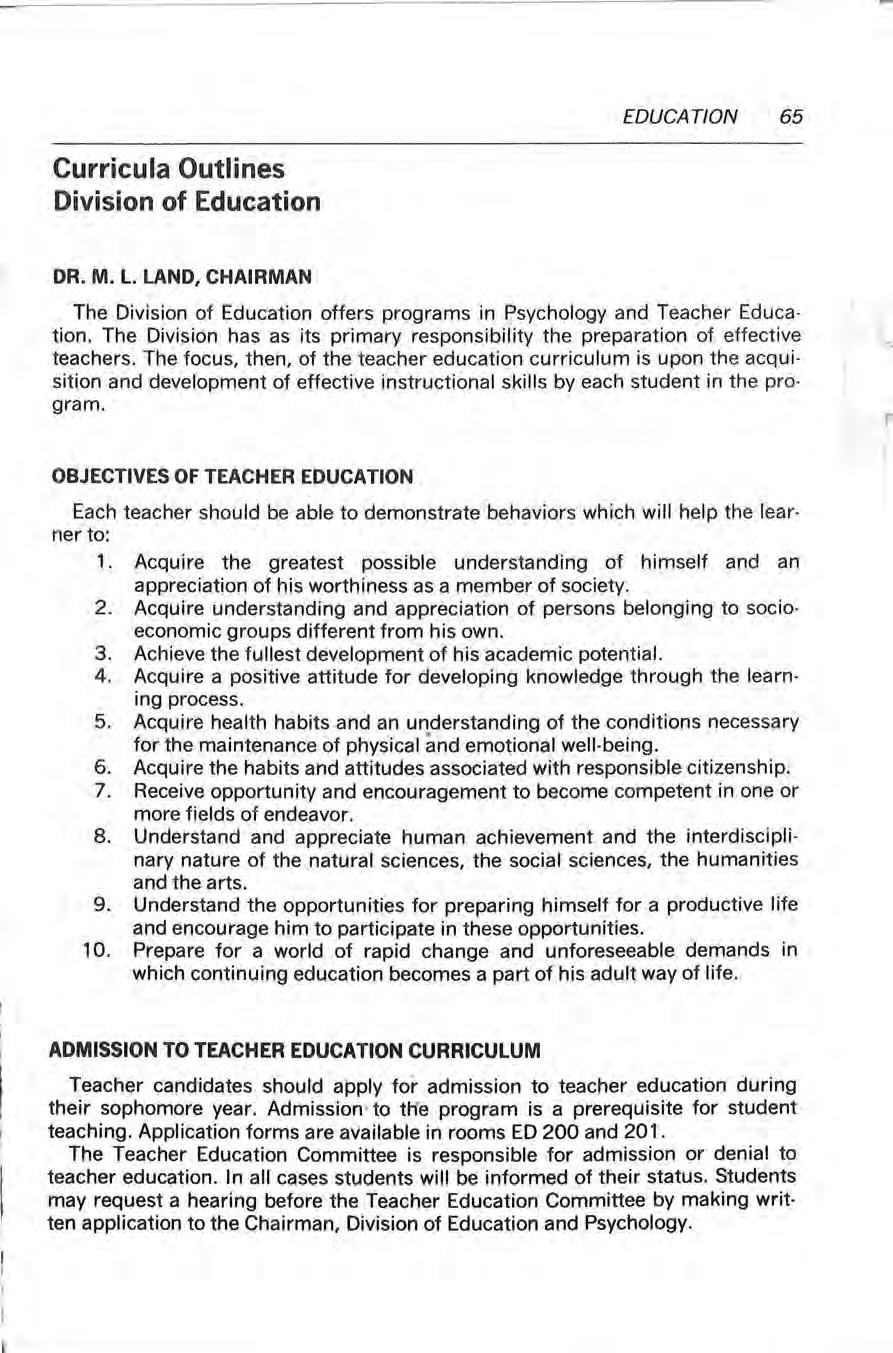
1. Free from social probation.
2 Overall Grade Point Average of at least 5 25
3. Overall Grade Point Average in major field of concentration of 5 25.
4 Recommended by persons who by virtue of past association are in a pos • ition to know the student as a prospective teacher
5. Evidence of proficiency in English and mathematics as indicated by scores at or above the fiftieth percentile on the ACT Program in the areas of English and mathematics. Students with scores less than this are required to achieve a grade of "5" or above in English 101 and / or a grade of "5" or above in Business / Mathematics 100, Mathematics 200 or other higher level mathematics course. Transfer students are expected to achieve equivalent scores on tests or equivalent grades in classes. This policy becomes effective for the 1975-76 academic year, and is in effect fpr those enrolling at Peru for the first time in the Fall of 1975.
A student may apply for admission to the Teacher Education Curriculum before he meets: (1) the Grade Point Average of 5.25; (2) is free from social probation; (3) meets the standardized test requirements and other requirements for full ad• mission. No formal action is taken for Admission to the Teacher Education Pro • gram until written notice is received by the Director of Student Teaching regard· ing deficiencies in the student's application.
Information regarding teaching .certificates may be obtained from the Chairman of the Division of Education or from the Director of Teacher Certification, State Capitol, Lincoln, Nebraska, 68509.
All applicants are hereby advised that meeting academic or graduation requirements does not automatically complete requirements for institutional endorse• ment.
According to Nebraska Teacher Certification, the College has the responsibility of endorsing qualified persons for certificates. This responsibility has been dele · gated to the Teacher Education Committee , An endorsement indicates the grade level, subject field or area of specialization for which the teacher was especially prepared, and implies that the applicant has met appropriate standards of scholarship, sound mental and physical health, good citizenship, and moral character.

Those desiring endorsem~nt must submit application to the Teacher Education Committee not less than three (3) -.yeeks prior to the end of the term. Applicant must have written the TEEP pri'o r to making application for endorsement.
The Teacher Education Examination Program is a comprehensive two-part test required of all students seeking teacher certification. The first part of the test cov•
ers five areas in which competence is considered basic to effective teaching : Social -Philosophical -Historical Bases of Education, Learning and In struction, written English Expression, Cultural Background, and Science and Mathematics, the second part of the test is designed to gauge the candidate ' s knowledge and ability for teaching a specific field . The test is given three times each year and takes approximately four hours. ·
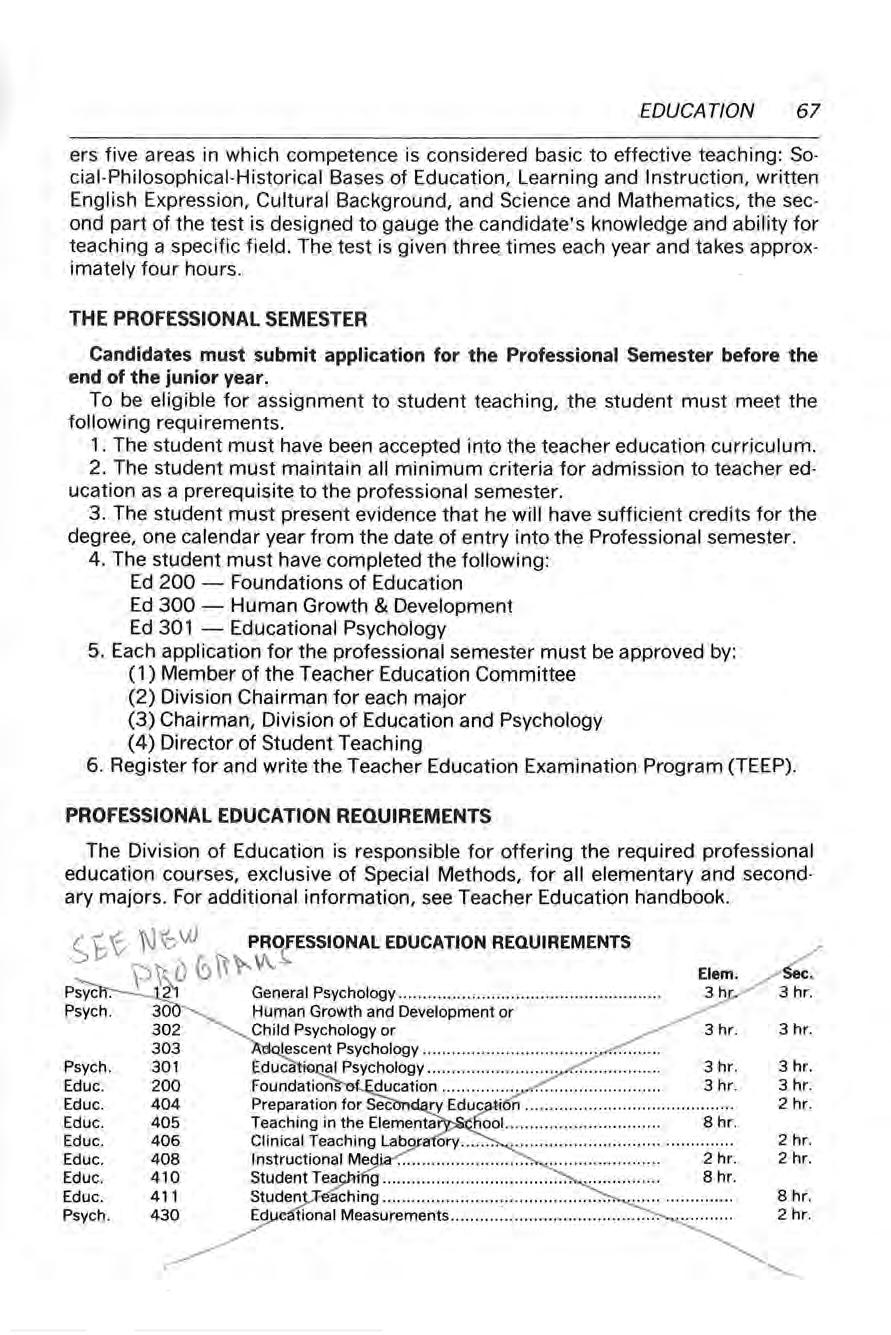
Candidates must submit application for th e Profess ional Se me ster before the end of the junior year.
To be eligible for assignment to student teaching, the student must meet the following requirements .
1 The student must have been accepted into the teacher education curriculum.
2. The student must maintain all minimum criteria for admission to teacher education as a prerequisite to the professional semester
3 . The student must present evidence that he will have sufficient credits for the degree, one calendar year from the date of entry into the Professional semester .
4. The student must have completed the following :
Ed 200 - Foundations of Education
Ed 300 - Human Growth & Development
Ed 301 - Educational Psychology
5 . Each application for the professional semester must be approved by:
(1) Member of the Teacher Education Committee
(2) Division Chairman for each major
(3) Chairman, Division of Education and Psychology
(4) Director of Student Teaching
6 . Register for and write the Teacher Education Examination Program (TEEP).
The Division of Education is responsible for offering the required professional education courses, exclusive of Special Methods, for all elementary and secondary majors. For additional information, see Teacher Education handbook
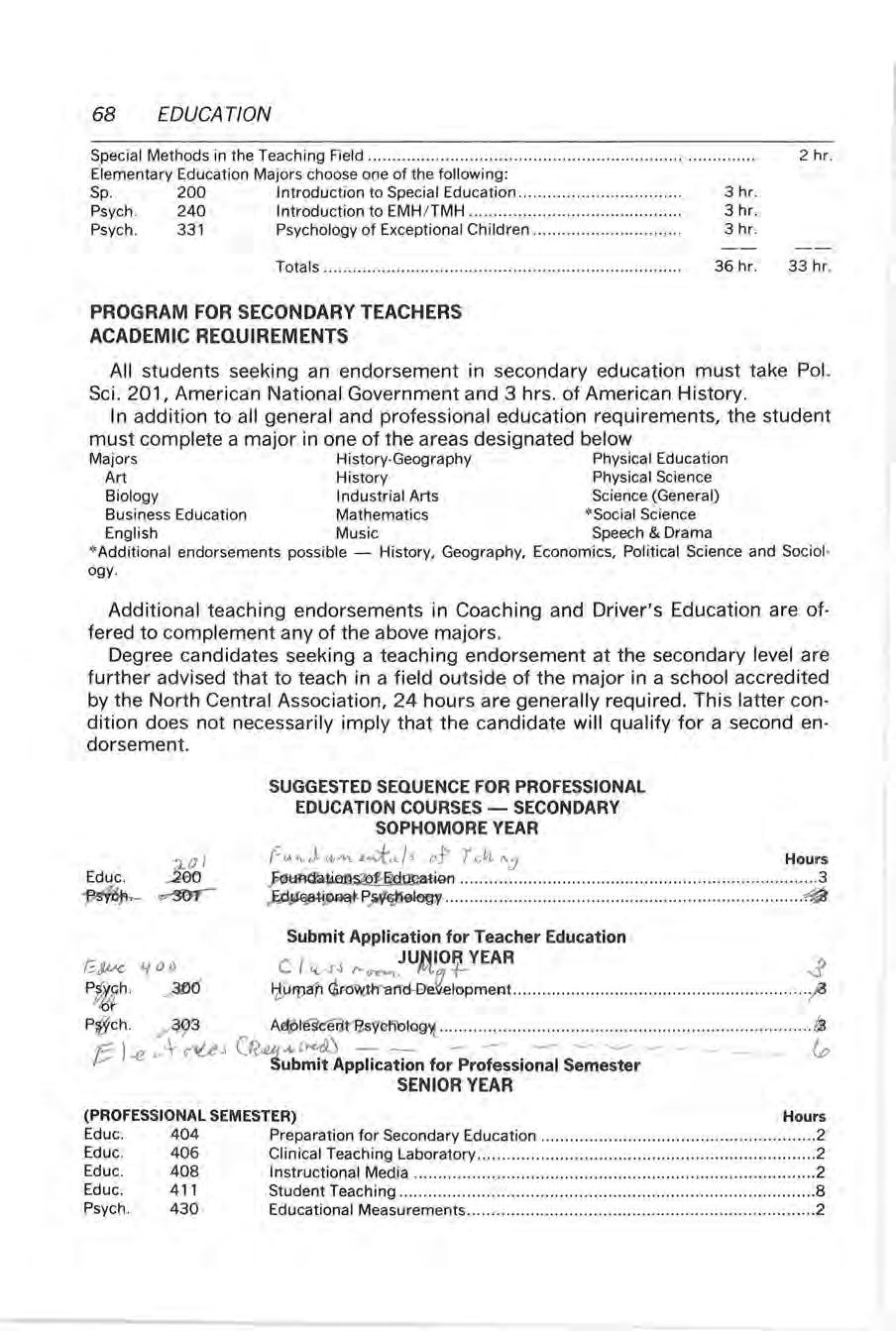
All students seeking an endorsement in secondary education must take Pol. Sci. 201, American National Government and 3 hrs. of American History
In addition to all general and professional education requirements, the student must complete a major in one of the areas designated below Majors History.Geography
Art History
Biology Industrial Arts
Business Education Mathematics
English Music
Physical Education
Physical Science
Science (General)
*Soc ial Science
Speech & Drama
* Additional endorsements possible - History , Geography, Economics, Political Science and Sociol• ogy.
Additional teaching endorsements in Coaching and Driver's Education are offered to complement any of the above majors.
Degree candidates seeking a teaching endorsement at the secondary level are further advised that to teach in a field outside of the major in a school accredited by the North Central Association, 24 hours are generally required. This latter condition does not necessarily imply that the candidate will qualify for a second endorsement
The Department of Education offers four year degree programs in Elementary Educat ion , Elementary Education with an endorsement in Early Childhood Education, Elementary Education with an endorsement in Spec ial Education, and a Psychology
B.S degree program
In add ition to all general and professional education requirements, students must complete the following academic requirements. The candidate must also earn 24 hours in one academic area, and 15 hours in each of two additional areas commonly taught in the e lementary schools, along with 15 hours (electives) . These " a reas" represent the various instructional divisions of the College .

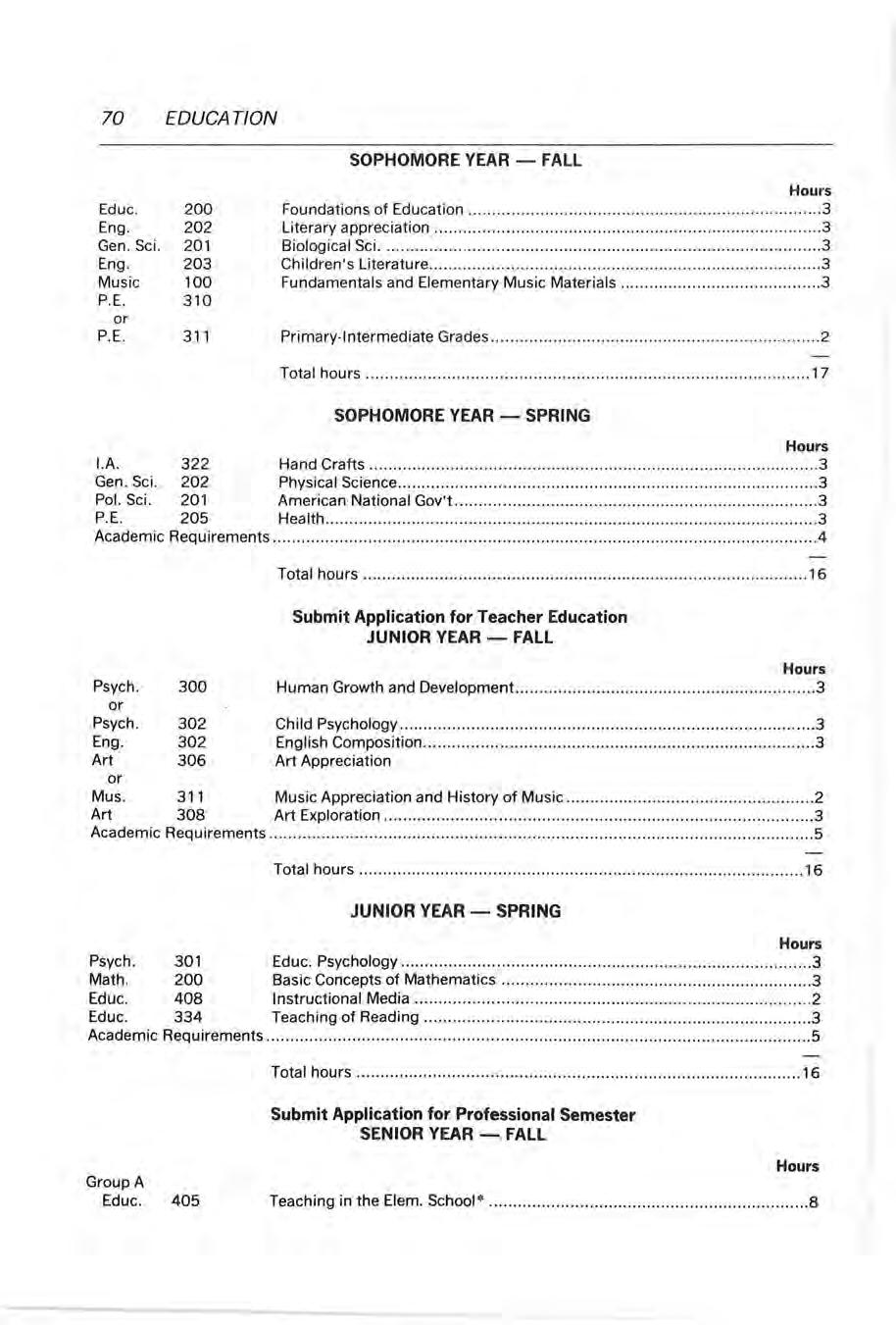
Requireme nts for Major
The curriculum leading directly to a Bachelor of Science in Education degree for elementary majors with an endorsement in early childhood education is designed for those who wish to prepare for teaching in day care, preschool or kindergarten programs. The Curriculum follows the program for elementary teachers (which meets the academic requirements for elementary teaching certification) and requires the following sequence of courses which may be used in lieu of the 24 hour block ordinarily required in elementary education.
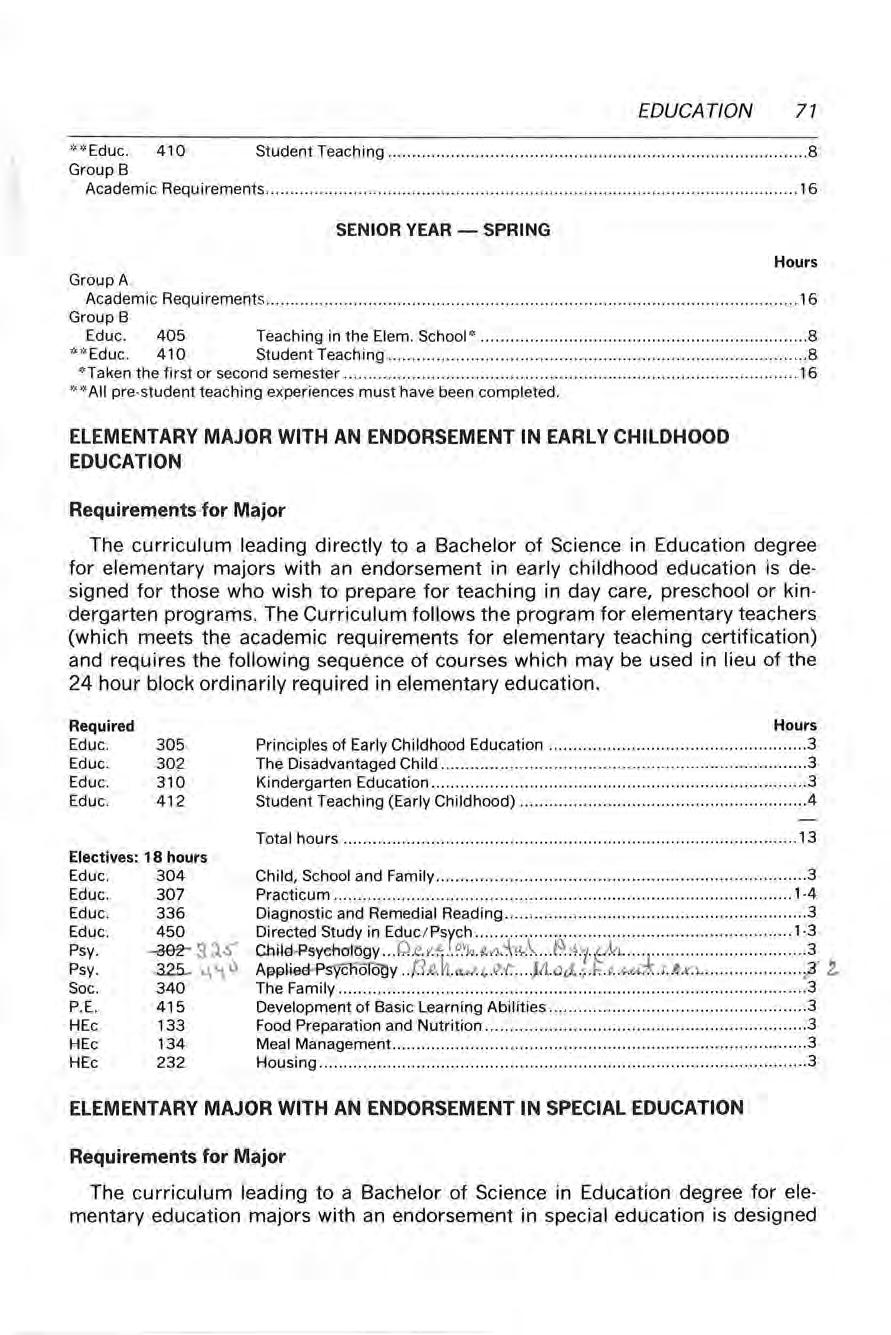
The curriculum leading to a Bachelor of Science in Education degree for elem e ntary education majors with an endorsement in special education is designed
for those who (1) wish top epare for teaching the educable or trainable ment a lly handicapped; and, (2) wi s h to prepare as a resource and itinera nt teacher. T he
Curriculum follows the program for elementary teache rs (which meets the academic re quirements for elementary te ach i ng certification) and requires the following sequence of courses which may be used in lieu of the 24 hour -block ordinarily required in elemen ta ry education.

(Two Year Program)

The Department of Education offers an A ssoc iate of Arts degree program in Ear ly Childhood Education. The curriculum is designed to prepare paraprof es• sionals for positions in early childhood education.
All courses carry full cred it toward the Bachelor of Science degree and may be applied to a regular four.year program. Students are encouraged to ultimately pursue the baccalaureate degree.
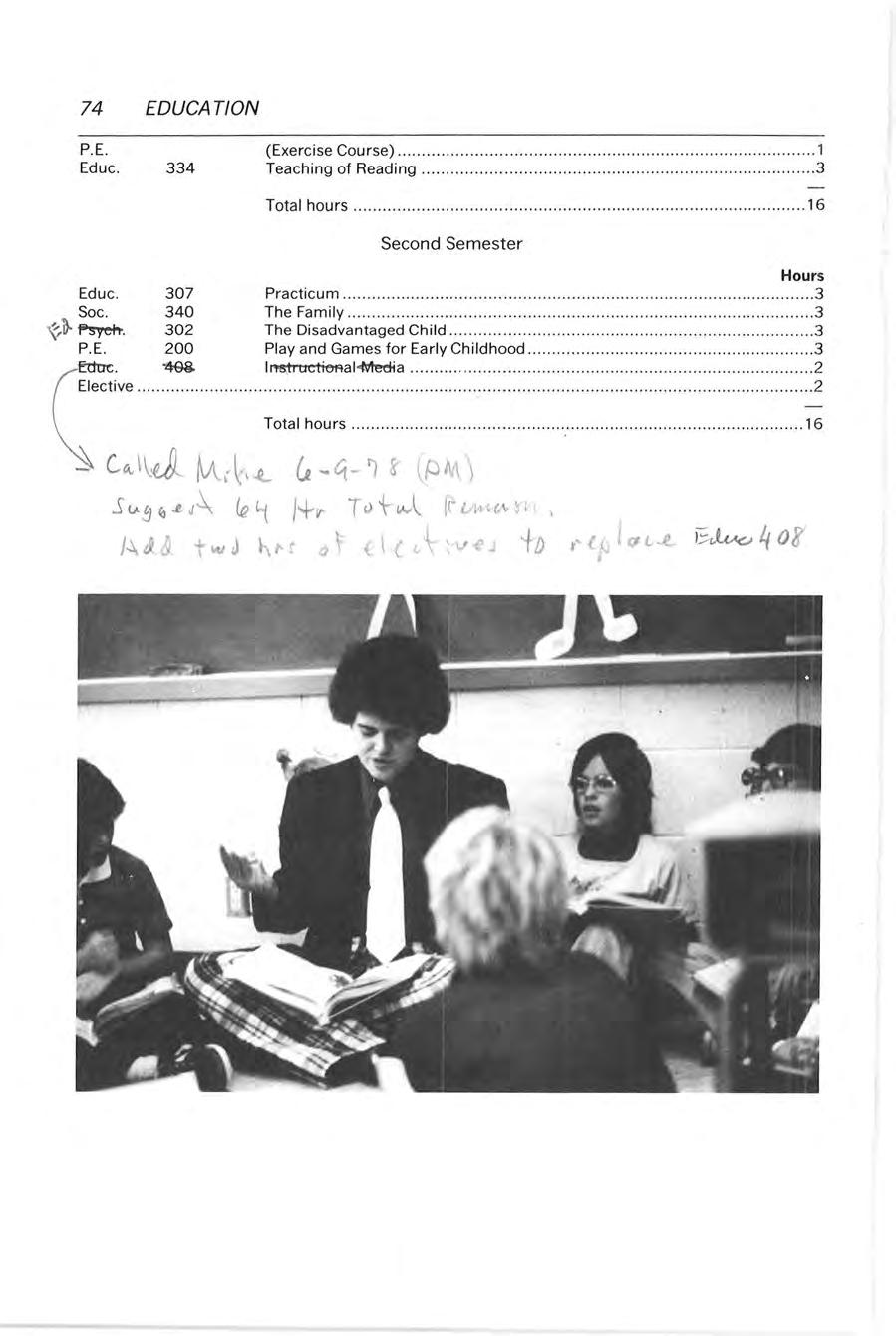
The Division of Humanities offers programs in English, Geography, History, Journalism, Mass Communications, Social Science, Social Work, and Speech and Drama. Each discipline is structured and designed to provide background for a variety of professional careers. All programs offer the students the opportunity for enrichment and breadth of understanding.
The Department of Language Arts offers four year degree programs in teacher education in English and in Speech and Drama. Four year non-teaching degree programs are offered in Journalism and Mass Communications.

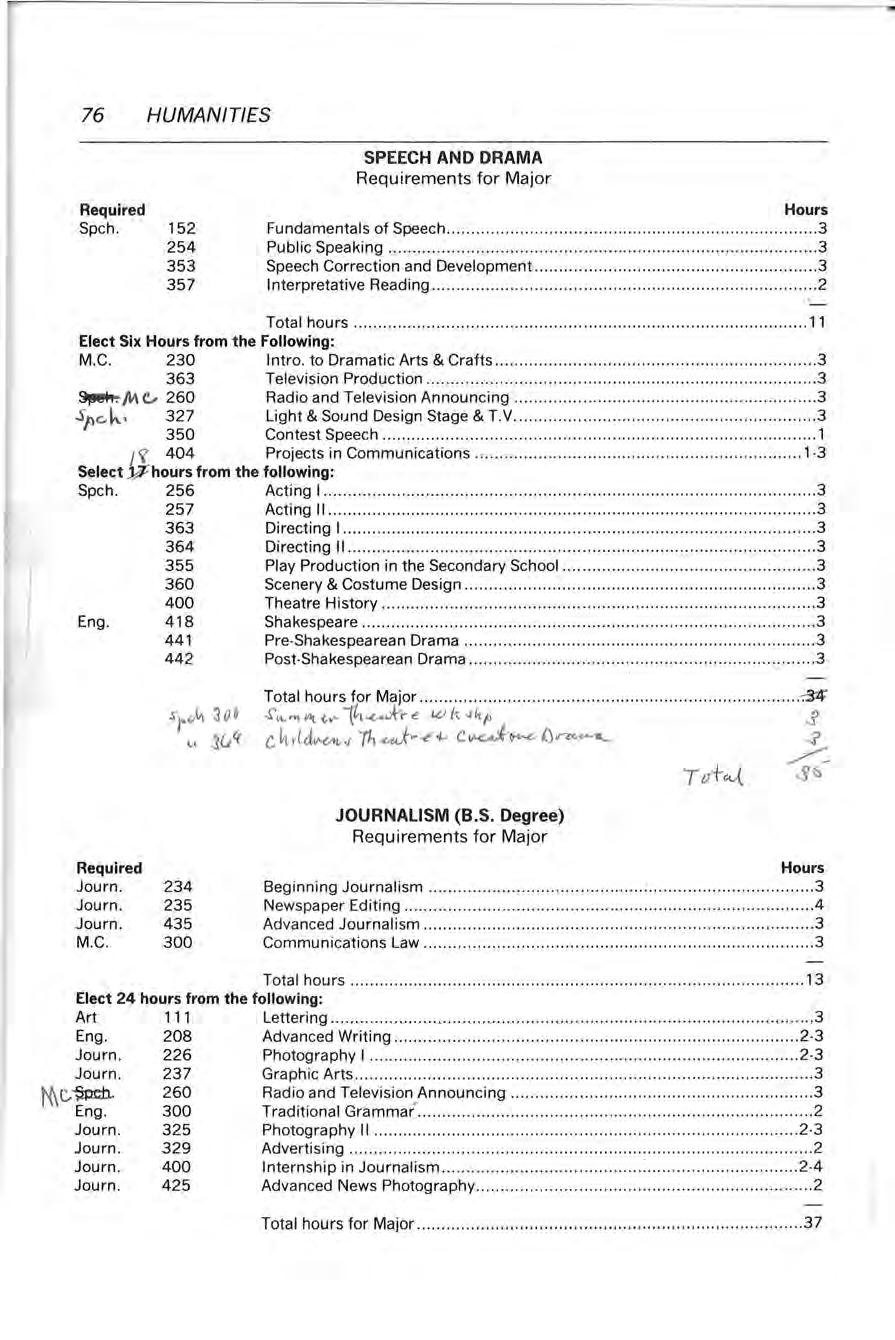
(Four Year Program)
The Social Science department offers four year degree programs in teacher education in History, History-Geography, and Social Sciences Four year nonteaching degree programs are offered in Geography and Social Work.

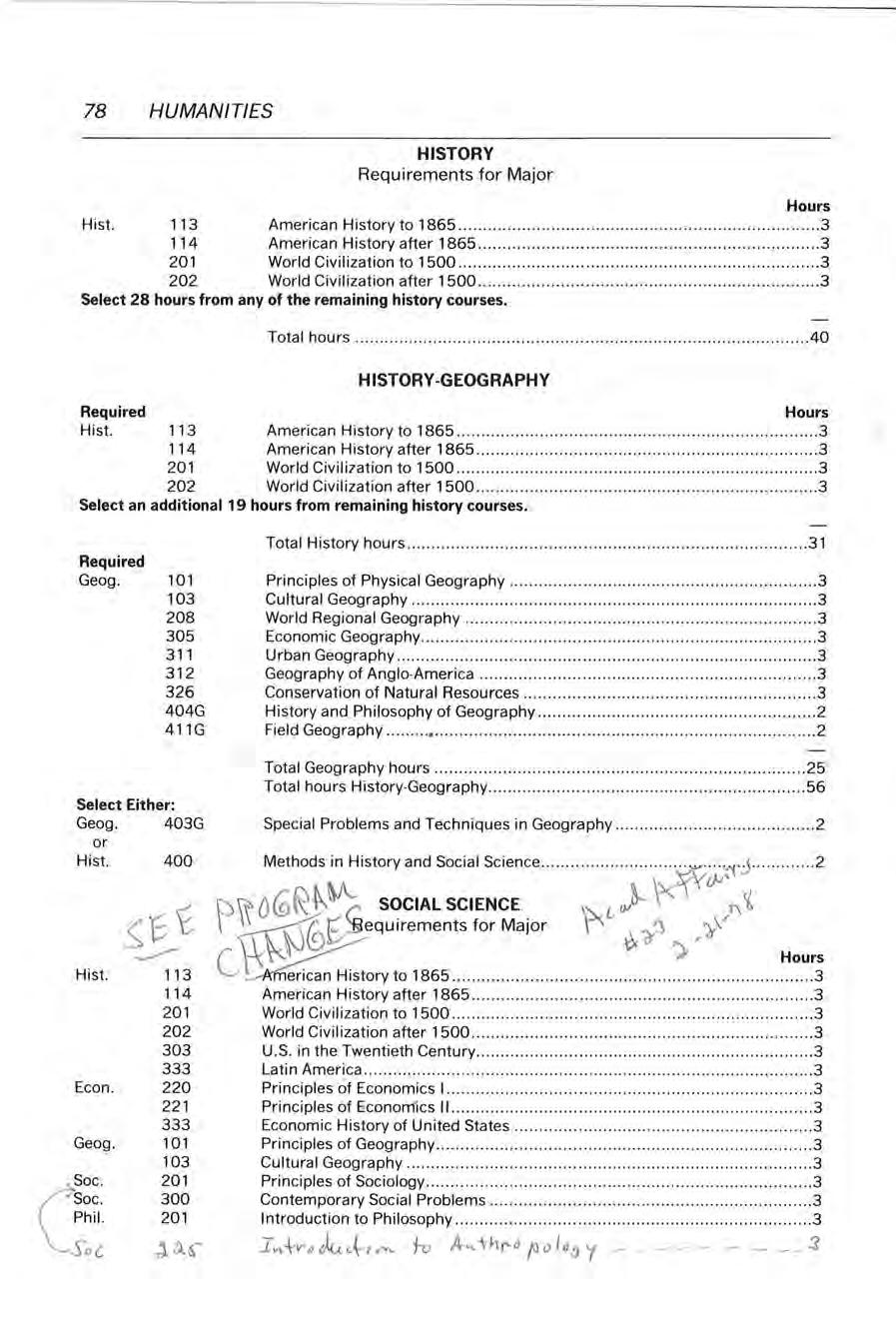
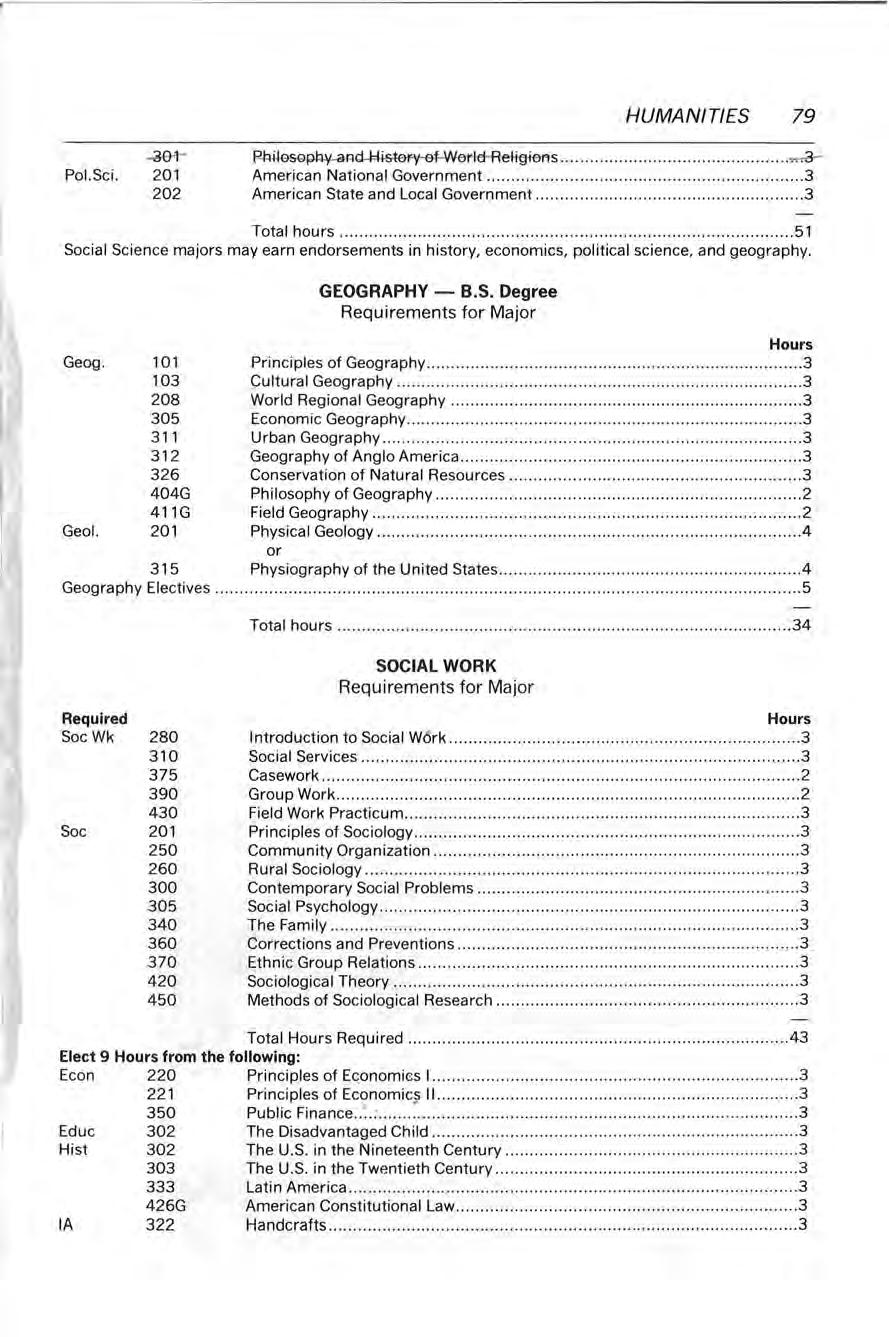
Prospective law students are urged to take a Bachelor ' s degree prior to beginning their legal studies Application to the law school of the student's choice should be made early in the fourth year of the pre-legal study
Most students interested in law may choose much of their course work from those fields in which he has the most interest.
Some work in English composition is important since the ability to use the English language effectively is highly recommended for law students Pre-law students are assigned an advisor who works closely with them in programming the four years of study.
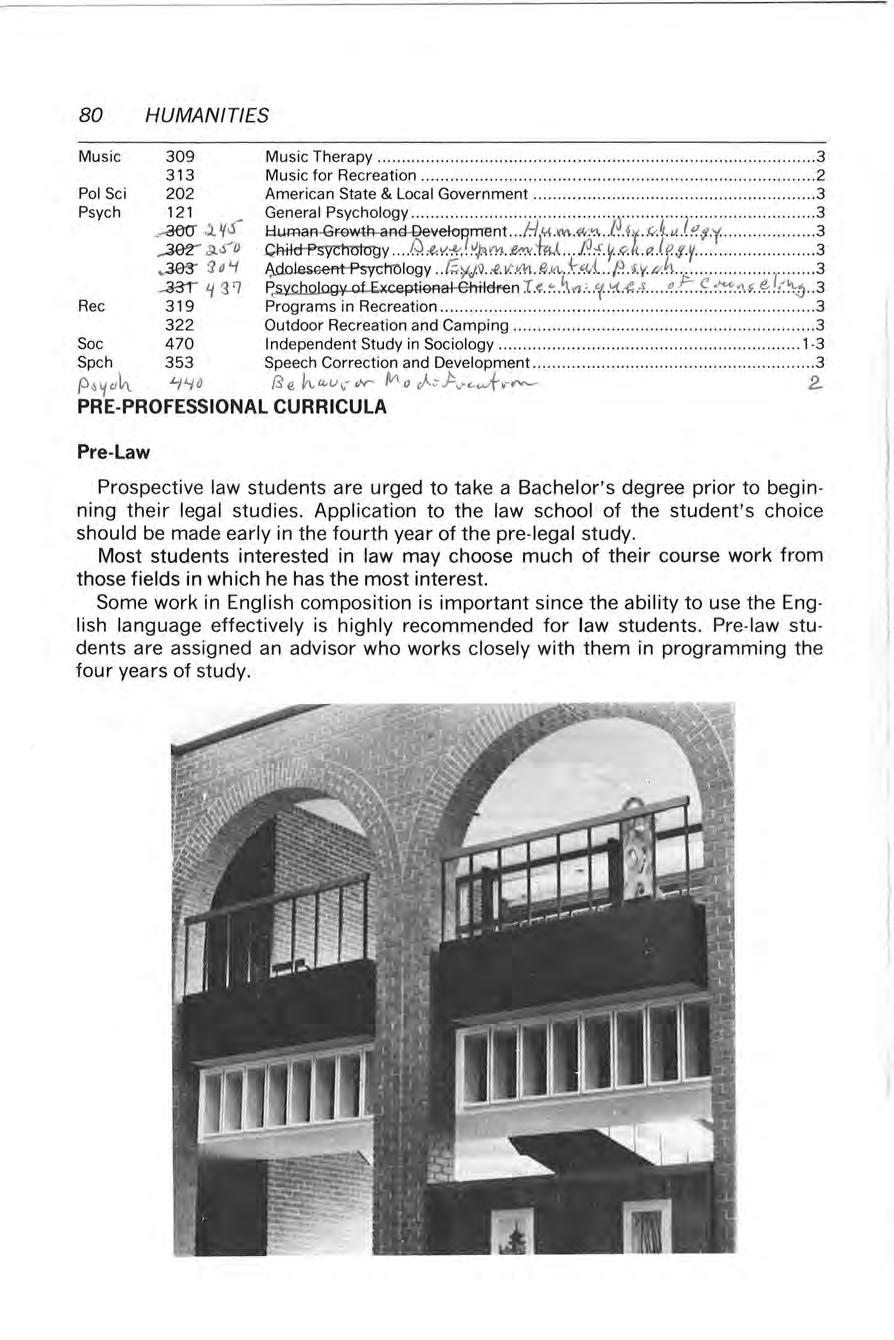

The Division of Natural Science offers programs in Biological Science, General Science, Mathematics, and Physical Science. The programs are designed to provide an adequate background for teaching at the secondary level, provide a background for graduate study, and provide for individual enrichment A wide variety of preprofessional programs are offered for students needing preliminary instruction prior to entry in a professional school.
(Four Yea r Programs)
The Natural Science Division offers four year programs in teacher education in Biological Science, General Science, Mathematics, and Physical Science. 8.A. and S.S. degrees are also offered in these disciplines.

Below is a sugg ested outline for both programs. The student is advised to secure a catalog from th e professional school he expects to attend , as individual school s vary in requirements tor pre dental and pr
The requirements for diff e rent forestry sc hools vary Early in the pre -fore stry program the stud ent should con sult the c atalog of th e college he plans to atte nd lat er Grades of below average will proba

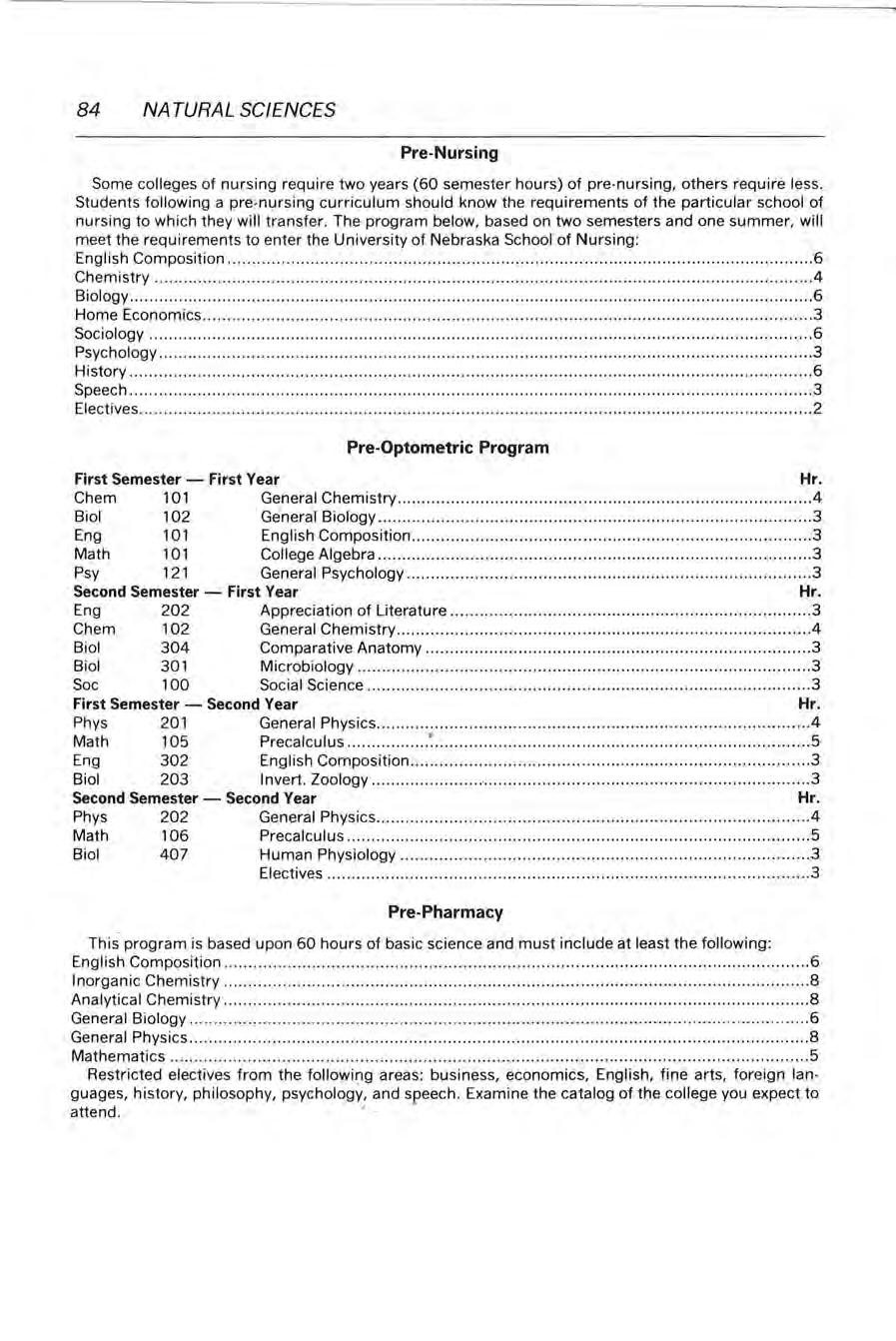
The following program is recommended for students who may wish to be X•Ray Technicians and also earn a Bachelor of Science degree. Upon completion of the program suggested below, the student

Medical Technology
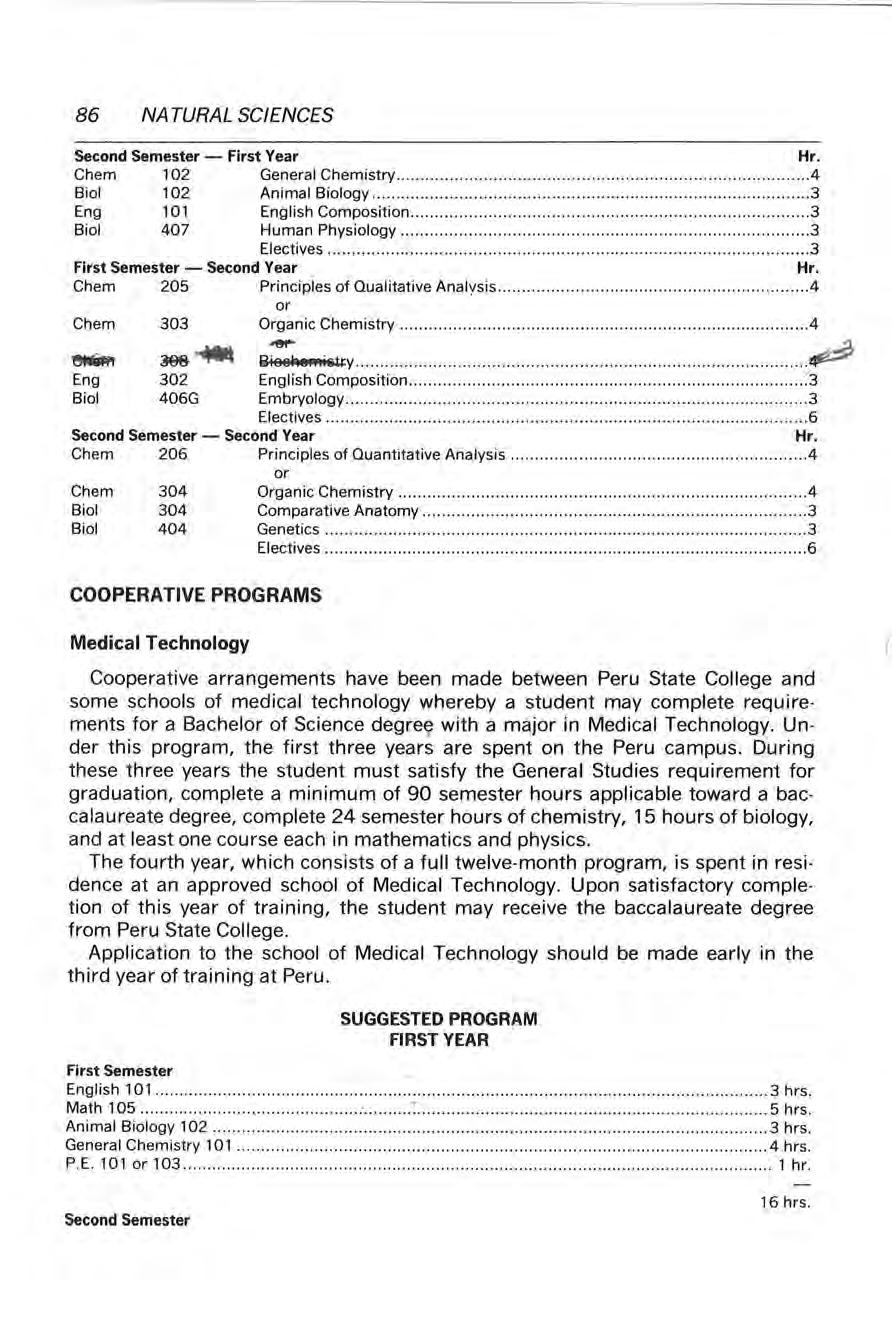
Cooperative arrangements have been made between Peru State College and some schools of medical technology whereby a student may complete requirements for a Bachelor of Science degre ~ with a major in Medical Technology. Under this program, the first three years are spent on the Peru campus. During these three years the student must satisfy the General Studies requirement for graduation, complete a min i mum of 90 semester hours applicable toward a baccalaureate degree, complete 24 semester hours of chemistry, 15 hours of biology, and at least one course each in mathematics and physics.
The fourth year, which consists of a full twelve -month program, is spent in residence at an approved school of Medical Technology. Upon satisfactory completion of this year of training, the student may receive the baccalaureate degree from Peru State College.
Application to the school of Medical Technology should be made early in the third year of training at Peru.
Fulfill Residence Requirement at Approved School of Medical Technology
"T h e student would have some c hoic e where General Studies courses occur due to the fle x ibility in General Studies Requirements.

A cooperative arrangement has been •made between Peru State College and Nebraska Methodist School of Nursing whereby a student may take one year of training at Peru State College and the re• mainder of his / her training at Nebraska Methodist Hospital in Omaha.
Under this arrangement the students are responsible for securing admission to the nursing pro• gram. During the year of schooling at Peru, students would take those courses recommended by Ne • braska Methodist as being desirable courses preceding entrance into professional training
Students enrolled in this program do not receive a degree through Peru State College


DR. LELAND SHERWOOD, CHA IRMAN
The Division of Performing Arts offers programs in Art and Music. The programs are designed to develop active participation in creative pursuits, which in turn will develop sens itivity and concern for human values, and interest in understanding intellectu a l, sp iritu a l, and aesthetic ideal s. ART (Four Year Program)
The Art department offers a four year degree program in teacher education in Art.
required to have a Senior Show of works produced as a Peru State student. The
for th~ files one piece of art work from each student.
The Music Department offers a four year degree program in Music K- 12. Students may take a Bachelor of Fine Arts in Educat ion Those not pursuing a career in education may take a B.S. or B.A. degree.
NOTE : It is the policy of the Music Department that all music majors should participate in band and choir each semester as t his is a very important part of the student's training During the semester in which the student presents his or her senior recital, adjustments can be made.
Music students are required to attend recitals and concerts as a partial fulfillment of the graduation requirement Music majors working toward the Bachelor of Fine Arts degree in Education are required to give a full recital.
Applied Music. Private instruction is provided in voice, piano, organ, strings, woodwinds, brass and percussion. There is no charge for private lessons to students within the department. Those outside the department may register for lessons at the rate as indicated in the Financial Section . Music students are required to show a proficiency in piano to meet the demands of their classroom activities. At least one semester of private voice instruction is required of majors

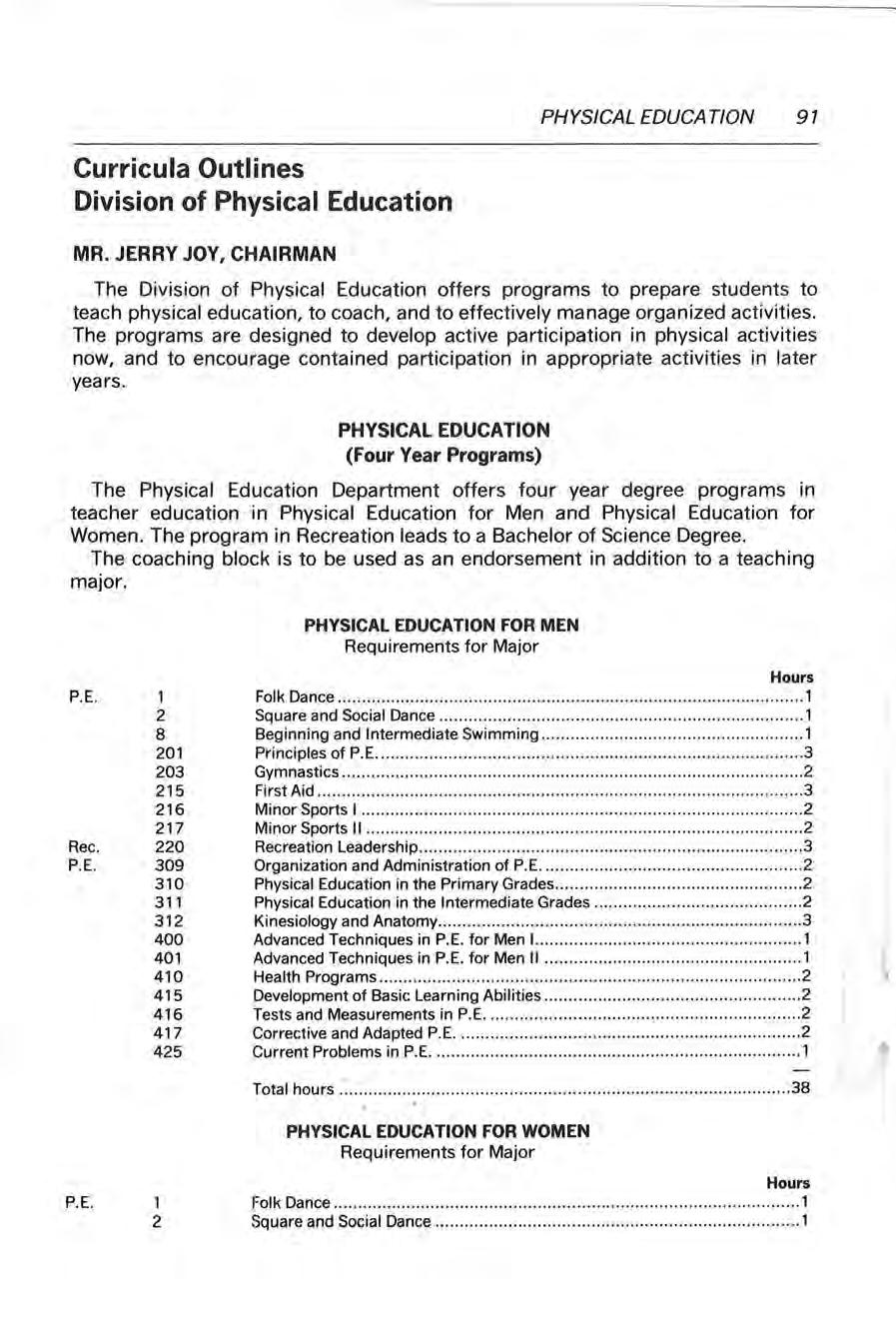
The Division of Physical Education offers programs to prepare students to teach physical education, to coach, and to effectively manage organized activities. The programs are designed to develop active participation in physical activities now, and to encourage contained participation in appropriate activities in later years.
The Physical Education Department offers four year degree programs in teacher education in Physical Education for Men and Physical Education for Women. The program in Recreation leads to a Bachelor of Science Degree. The coaching block is to be used as an endorsement in addition to a teaching major.
The following program is provided for those students interested in the 'coaching of interscholastic sports. It is designed to fit the needs of the high school coach and leads to in st itutional recommenda • tion for endorsement. Students completing this program are required to have a major in another area Students desiring the coaching block endorsement should select a minimum of .tl:lfee of the five the• ory courses listed below in addition to the other listed requirements . -f 0 1(,f'
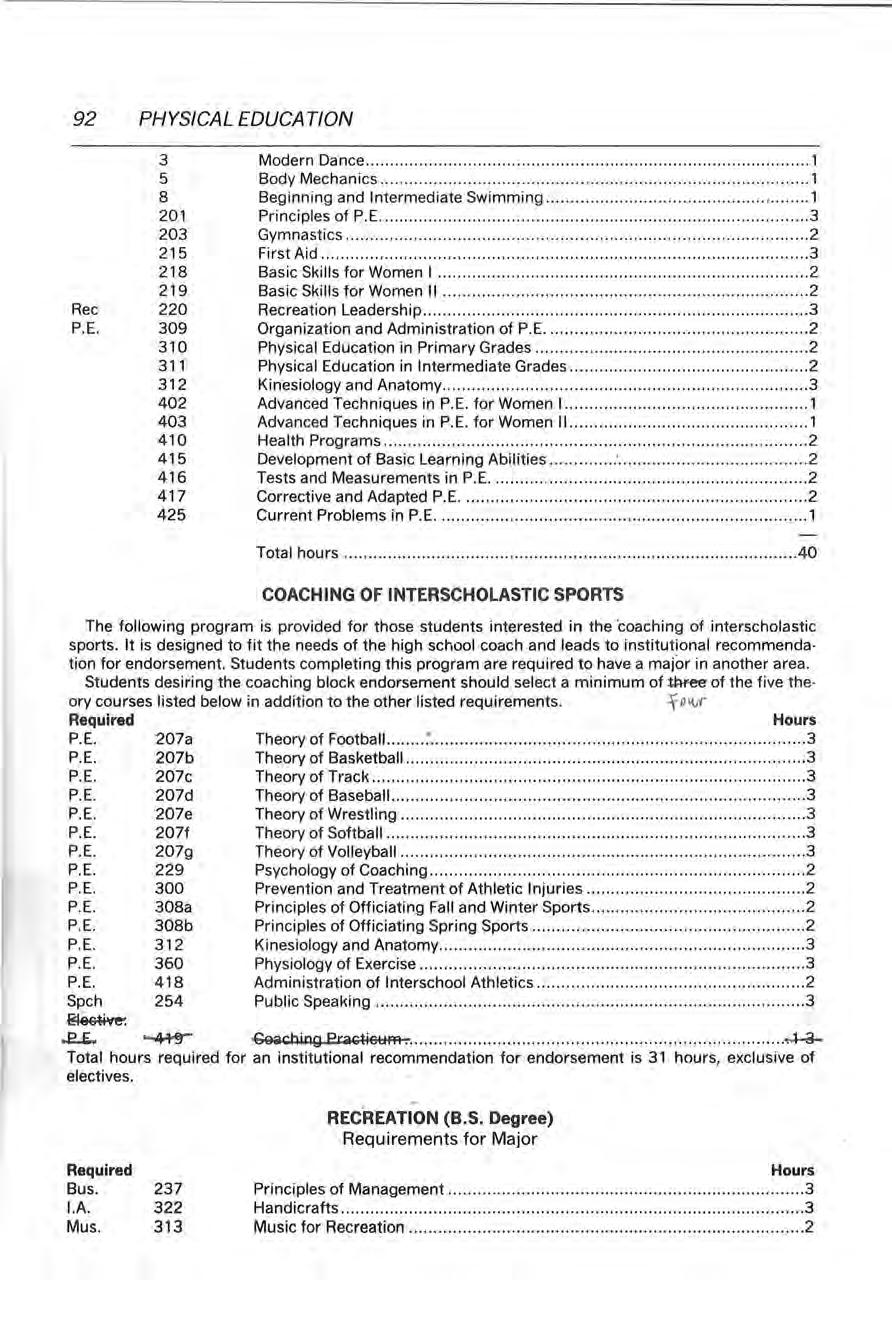
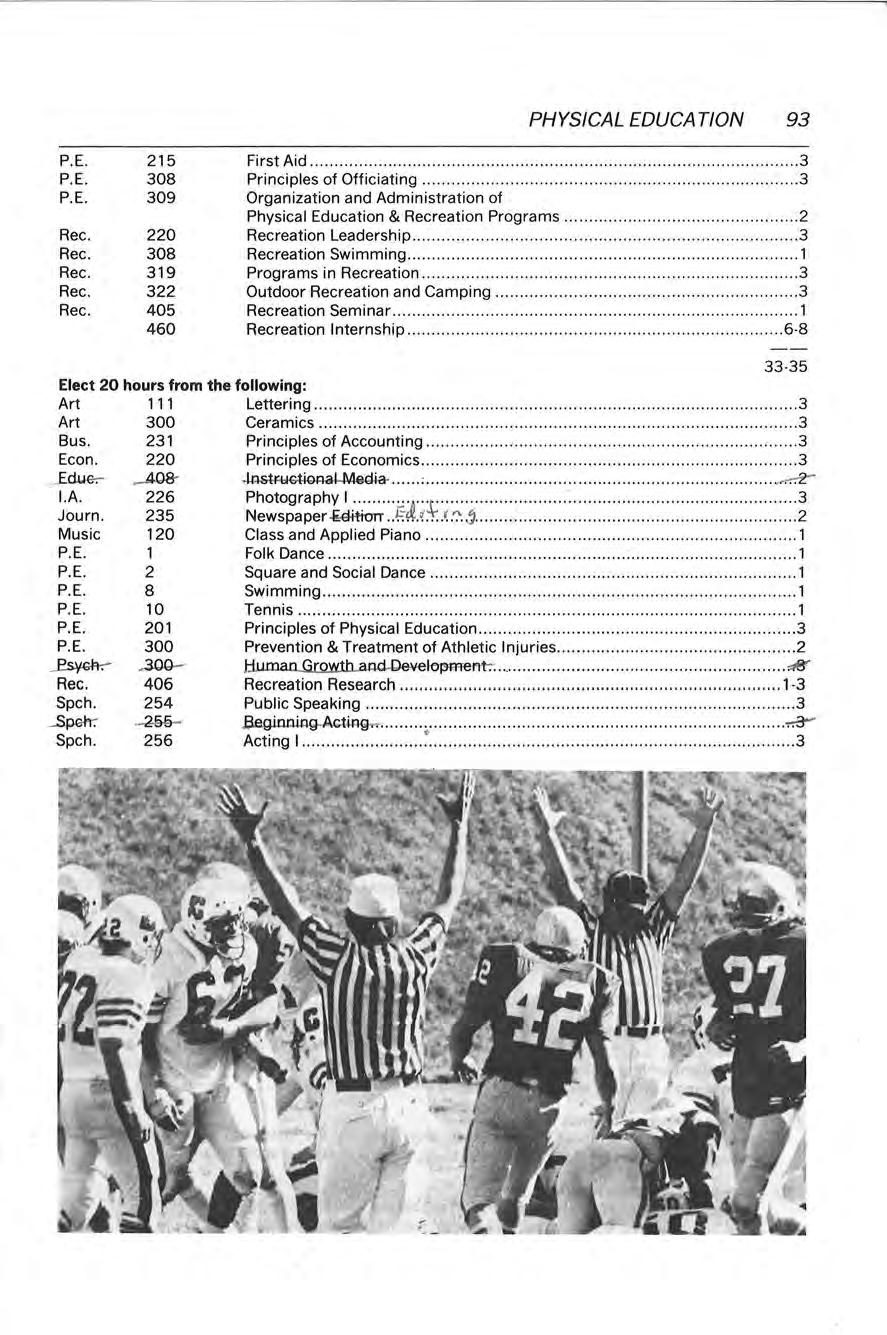
100 Business Mathematics
3 hr.
A review of the four fundamental operations of arithmetic applied to whole numbers, fra ctions, and decimals; applications of percentage ; computing interest and discounting notes ; consumer credit; cash and trade discount; computing markup, retail and commission; marking goods; the arithmetic of payrolls
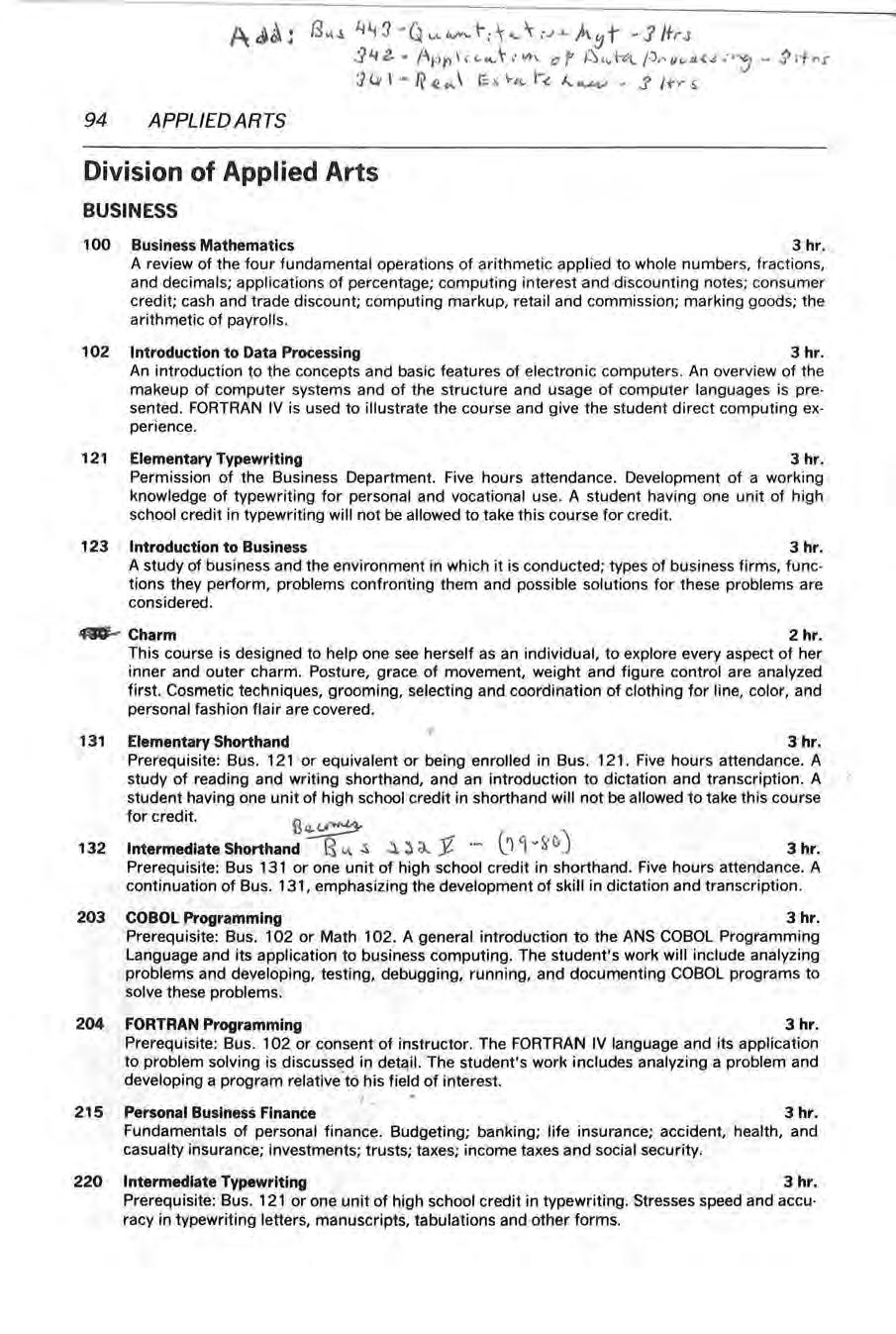
102 Introduction to Data Processing
3 hr.
An introduction to the concepts and basic features of electronic computers An overview of the makeup of computer systems and of the structure and usage of computer languages is presented . FORTRAN IV is used to illustrate the course and give the student direct computing experience
121 Elementary Typewriting
3 hr. Permission of the Business Department. Five hours attendance. Development of a working knowledge of typewriting for personal and vocational use A student having one unit of high school credit in typewriting will not be allowed to take this course for credit.
123 Introduction to Business
3 hr .
A study of business and the environment in which it is conducted; types of business firms, functions they perform, problems confronting them and possible solutions for these problems are considered
Charm
2 hr.
This course is designed to help one see herself as an individual, to explore every aspect of her inner and outer charm Posture, grace of movement, weight and figure control are analyzed first. Cosmetic techniques, grooming, selecting and coordination of clothing for line, color, and personal fashion flair are covered.
131 Elementary Shorthand
3 hr.
Prerequisite : Bus 121 or equivalent or being enrolled in Bus. 121 Five hours attendance A study of reading and writing shorthand, and an introduction to dictation and transcription A student having one unit of high school credit in shorthand will not be allowed to take this course for credit.
Prerequisite: Bus 131 or one unit of high school credit in shorthand. Five hours attendance A continuation of Bus 131 , emphasizing the development of skill in dictation and transcription
203 COBOL Programming
3 hr.
Prerequisite : Bus. 102 or Math 102 A general introduction to the ANS COBOL Programming Language and its application to business computing The student's work will include analyzing problems and developing, testing, debugging, running, and documenting COBOL programs to solve these problems
204 FORTRAN Programming
3 hr.
Prerequisite: Bus 102 or consent of instructor The FORTRAN IV language and its application to problem solving is discussed in detail. The student's work includes analyzing a problem and developing a program relative' t 6 his fieid of interest. ·
215 Personal Business Finance
3 hr.
Fundamentals of personal finance . Budgeting ; banking; life insurance; accident, health, and casualty insurance; investments; trusts; taxes; income taxes and social security
220 Intermediate Typewriting
3 hr.
Prerequisite: Bus. 121 or one unit of high school credit in typewriting. Stresses speed and accuracy in typewriting letters. manuscripts, tabulations and other forms.
3 hr
Prerequisite: Bus 220 or equivalent Development skills in operating th e transcribing unit. 1' Meets five hours a week. To b e arranged
Machine Transcriptions II
2 hr.
Prerequisite: Bus. 220 or equivalent and permission Further development of skills on the transcribing units . This course includes vocabularies for special employment areas. Meets four hours a week. To be arranged
Machine Transcriptions Ill
2 hr
Prerequisite: Bus. 220 or equivalent and permission. Further development of the skills on the transcribing machine specializing in the area of medical terms and correspondence Meets four hours a week . To be arranged.
Machine Transcriptions IV
2 hr
Prerequisite: Bus 220 or equivalent and permission Further development of the skills on the transcribing machine specializing in the area of legal terms, documents and c orrespondence Meets four hours a week To be arranged

Principles of Accounting
2-3 hr. Four hours of attendance per week. An introduction to the processes of recording financial data and preparing periodic financial statements . The complete accounting cycle will be studied. One and two year secretarial majors may register for the 2 hrs. credit and will attend the first 10 weeks of the course Those completing only the 2 hr program are not eligible to enroll in Bus 232
Principles of Accounting II
3 hr.
Prerequisite: Bus 231. Four hours attendance. A continuation of Bus 231, considering the accounting process in the corporation; the student is introduced to accounting theory, financial statement analysis and cost accounting
Business Machines
3 hr.
Three hours attendance with individual lal'.>oratory work arranged. Basic calculating machine operations, care of the machines and business application problems are stressed
Principles of Management
3 hr.
Prerequisite: Bus. 123. A studu of the functions of management with an introduction to such areas as organization theory, decision making , leadership, and motivation as they apply to all organized groups, but geared primarily toward the existing business organization.
Salesmanship
3 hr.
A study of the skills and techniques used in selling and persuasion The course is designed to help the student learn to sell products and ideas through a study of proven techniques used by successful salesmen.
Business Communications
3 hr
Prerequisite : Ability to type. A study of Business English and communication as well as learning how to compose and produce the various kinds of letters used in the business world
Secretarial Procedures
4 hr.
Prerequisites : Bus. 123, 220 Five hours of attendance per week This course is designed to develop competencies in both operational and managerial functions performed by the top-level secretary Operational functions involve ctn in -depth study of office and secretarial procedures This will include records manage~'ent, magnetic card typewriter, duplicating machines, and transcribing machines. Managerial functions involve the development of a high degree of competency in administrative secretarial skills.
3 hr. A study of the buying, selling, transporting and storing functions involved in marketing; the student is introduced to retailing, wholesaling and marketing management.
Principles of Marketing
Prerequisite : Bus 328 A study of advertisements and media from three viewpoints : management-marketing, communications-creativity, and consumer -citizen
Prerequisite: Bus 123. A study of the major types of personal and business insurance, including life, property, health and accident, public liability and social insurance .
Prerequisite: Bus . 232. A study of the major uses of investment funds, including saving accounts in banks and other financial institutions, government bonds, corporate stocks and bonds, annuities and real estate.
Prerequisite: Bus 132 and 220 or two units High School Shorthand Four hours attendance. Emphsis is placed on increasing skills in taking dictation and transcribing it into mailable form.
Bus . 220. Three hours attendance . Stresses the development of a high degree of proficiency in composition, machine dictation arid production typewriting . 335
Prerequisite: Bus. 237 . A study of the management of an industrial plant; location, construction, layout, equipment, supplies and personnel are considered.
337 Intermediate Accounting I
3 hr.
Prerequisite: Bus 232. A study of the problems involved in establishing sound valuations for asset, liability and net worth items; proper reporting of financial position and net income is stressed .
338 Intermediate Accounting II
3 hr.
Prerequisite : Bus. 337 An in-depth continuation of Bus 337 with special emphasis on long : term liabilities, intangible assets , statement analysis; stockholders' equity, application of funds, and present value . •
339 Cost Accounting
3 hr.
Prerequisite : Bus. 232. A study of manufacturing cost under process and job-order cost systems; determination and application of standard cost, analysis of cost behavior and cost budg• eting to aid management in making decisions are stressed.
340 Statistics
3 hr.
A study of the methods of summarizing and interpreting data, elementary probability and its relation to distributions. The meanings, importance, and applications of the normal and binomical distributions The methods of random sampling, testing of hypotheses, analysis of varied data, and interpretation of standardized test scores.
341 Income Tax Accounting
3 hr.
Prerequisite: Bus. 232. The Federal Income Tax laws and regulations concerning taxable income, inclusions and exclusions, allowable deductions, and basis of determining gain or loss of reporting purposes for individuals, businesses, and corporations
345 Real Estate Principles and Practice
3 hr.
Prerequisite: Bus. 123 . A study .of real estate law as it affects marketing, ownership, interests, sales, leases and agencies. Financing iristitution, financial aspects of ownership and marketing will be covered, as well as managerial aspects of brokerage, property valuation, and real estate appraising.
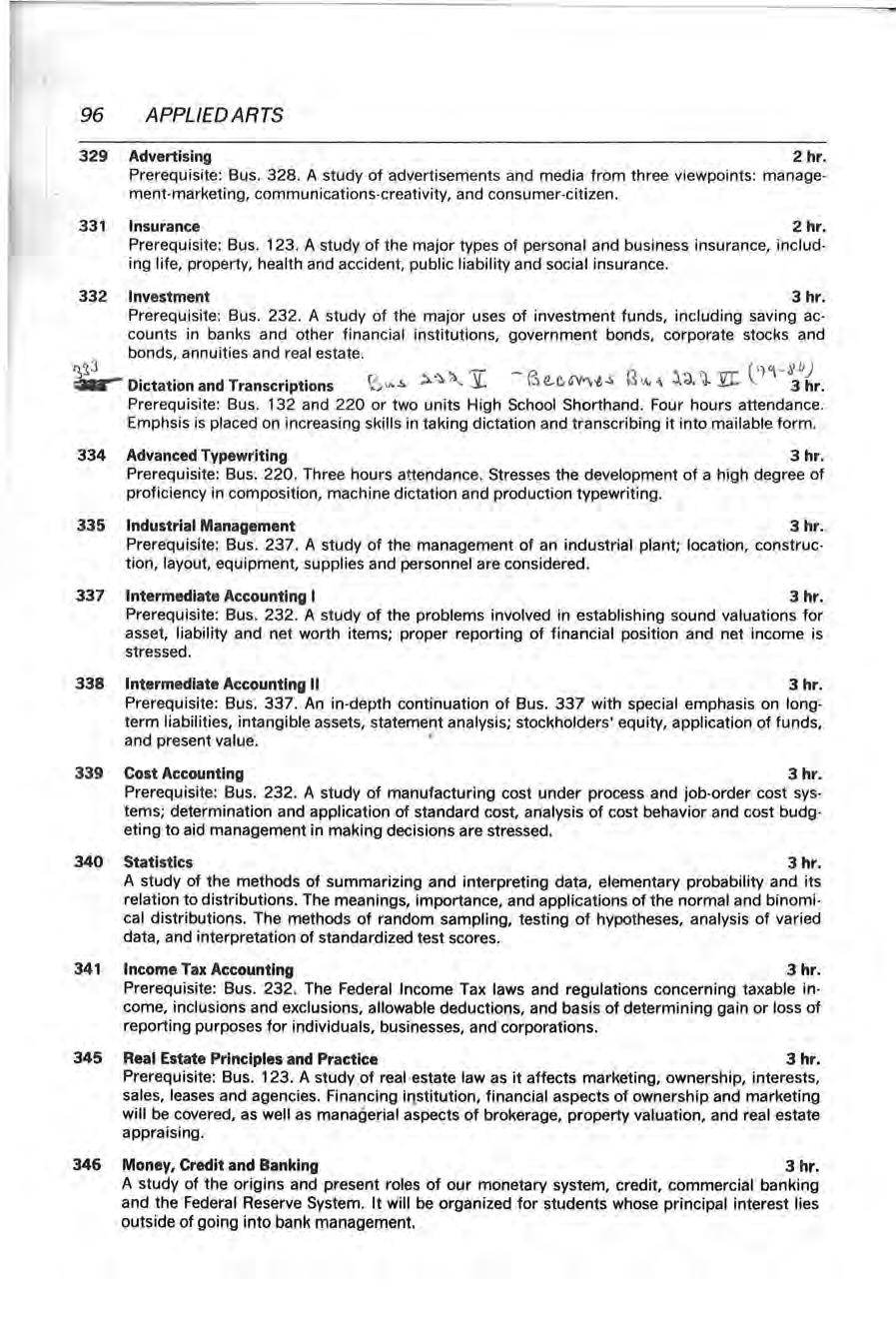
346 Money, Credit and Banking
3 hr.
A study of the origins and present roles of our monetary system, credit, commercial banking and the Federal Reserve System. It will be organized for students whose principal interest lies outside of going into bank management.
3
Prerequisite: Bus. 123. A study of the legal rights and obligations of parties to contracts concerned with such matters as exchange, property, agency, insurance and bankruptcy; special lega l problems of partnerships and corporations are considered.
3
C'.lrerequ:s :te, Sus . ~SO. A study of l ega l principles covering sales, negotiable instruments, secu · rity, bailments, the uniform commercial code, corporat ion and partnerships, and the laws governing real and personal property.
3 hr.
Prerequisite: Bus. 345. A detailed analysis of the methods and techniques of financing the purchas e of real estate. Areas of study include fund sources, analysis of mortgage risk, FHA underwriting, other Government influ ences and agencies, legal aspects involved, and the policies and procedures of lending institutions

Prerequisite: Business 2 03 or Math 203 or Business 204 or Math 204. Supervised projects in advanced computer
Prerequisite: Bus. 328 An analysis of marketing principles from the manager's point of view and their application toward meeting various marketing objectives involving the study of mar• kets, consumers, advertising, personal selling, retailing, pricing, and distribution. Methods
Current methods of teaching typewriting, shorthand, bookkeeping, office practice and basic business are considered; sources and uses of instructional aids are emphasized
Prerequisite: Bus. 333. Four hours attendance Greater increase in the speed and accuracy in taking timed dictation.
Prerequisite : Bus . 232 and Econ . 220 . A study of the uses of funds to finance assets, internal and external sources of funds and the cost of funds obtained from alternative sources under various conditions
433 Office Management
2 hr.
Prerequisite: Bus. 237. A study of the management of an office; location, layout, equipment, supplies and personnel are considered.
434 Personnel Management
3 hr.
Prerequisite: Bus. 237. A case study approach to the management of labor; selection, training, compensation and supervision are considered.
436 Projects In Typewriting
1-4 hr.
Prerequisites: Senior standing and permission of the in structor. Designed for a st udent to do advanced projects in typewriting based upon his individual needs and interests.
440 Independent Study in Business
Prerequisites: Permission of the instructor.
441 Internship in Business
1-4 hr.
1-4 hr. On-the-job training with a business firm or industry. To be taken near the ending of formal college courses by students in the areas of management, marketing, accounting, and secretarial. A student must intern in the area of his vocational career interest. One hour of college credit will be given for 1 15 hours of internship work. The student must attend a two hour seminar each month. Business majors only
442 Managerial Accounting
3 hr•
Prerequi site: Bus 232 Designed to study the uses of accounting infDrm31ion tor m1111c1geriol decisions and internal management purposes. Focus will be on cost contro l s, budgeting, performanc e eva lu ation, and financial information for planning and decision making.
450 Advanced Accounting
3 hr.
Prerequisite: Bus. 338. A detailed study of accounting problems arising out of partnerships, combinations, installment sa les, and the preparation of consolidated financial statements. Also included is home off ic e and branch accounting.
470 Auditing Principles
3 hr.
Prerequisites: Bus. 337 and 339 or by permission. Genera lly accepted audit in g standards and procedures with philosophy supporting them. Auditing techniques ava il able to the independent public accountant.
133 Food Purchasing and Preparation
3 hr. Two hours lecture and discussion; three hours laboratory. Fundamental principles of food se lection, purchasing and preparation. The course also includes a study of the nutritional value of foods.
134 Meal Management
3 hr.
Principles of food purchasing, preservation and management procedures as related to family serv ice in the cha ngin g American Society. Application of the principle of meal management i n a basic study and preparation of different world and American regional cuisines.
141 Clothing Selection and Construction
3 hr .
Selection of wearing apparel based on the s ignificance of clothing in American society, and the prnciples of design as applied to personal appearance Constructing appare l through the use of a basic pattern and fundamental pattern methods; application of principles of design, ba s ic construction techniques, and good management.
205 Selection, Use and Care of Household Equipment
3 hr. Working principles of larg e and small electrica l app lian ces and hou sewares in terms of the ap• plication of mechanics, heat, and electr ic ity Methods of determining performance and an understanding of common repair problems
232 Housing
3 hr.
Social , physical, aesthetic and economic aspects of hou s ing as it concerns the family during stages of the fami ly lif e cycle. Principles of buying, building or remodeling to meet family needs.
302 Child Development
3 hr.
Scope of course covers from prenata l through preschool ages. Course content includes a four week preschool laboratory.
310 Methods and Media in Home Economics Demonstration
2 hr.
Prerequisites: H.Ec. 133 and 141 Selection and app li cat ion of methods and media for use in presentation of programs in home economics by the teacher, home econom ics agent and commercial demonstrator.
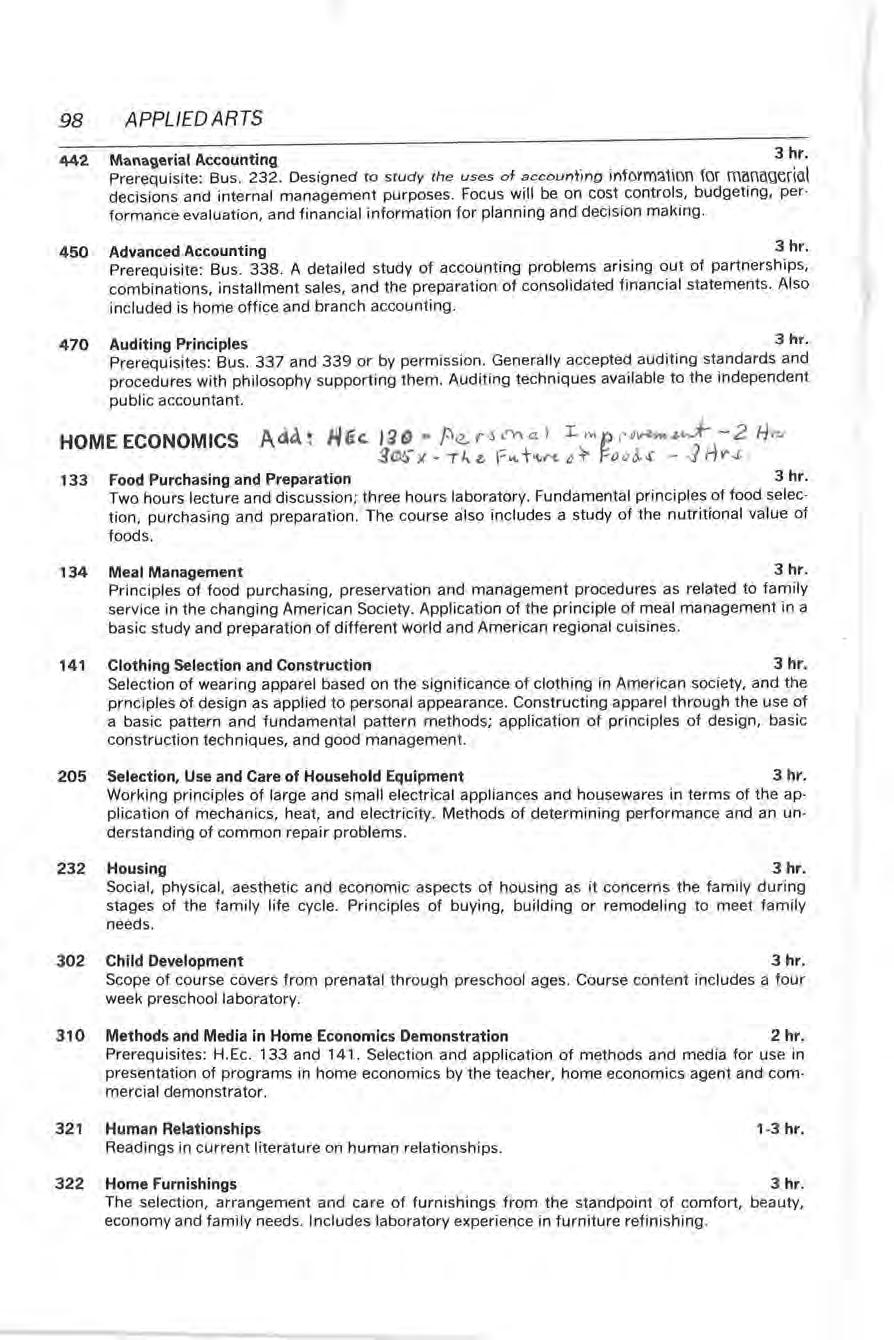
321 Human Relationships
Readings in curre nt lit erature on human relationships.
322 Home Furnishings
1-3 hr .
3 hr. The selection, arrangement and care of furnishings from the standpoint of comfort , beauty, economy and family needs Includes laboratory experience in furniture refinishing
332 Nutrition
3 hr.
Fundamental principles of human nutrition, its development through research as related to the needs of individuals according to their age, sex, and occupation. Course requirements includ e readings in latest developments of nutrition.
333 Textiles
hr.
A study of fabric construction, yarns, fibers and finishes as they affect the selection, use and care of fabrics for clothing and for the home.
334 Tailoring
A course designed to meet the student's need for the more difficult construct ion problems which are encountered in tailoring.
400 Special Problems in Home Economics
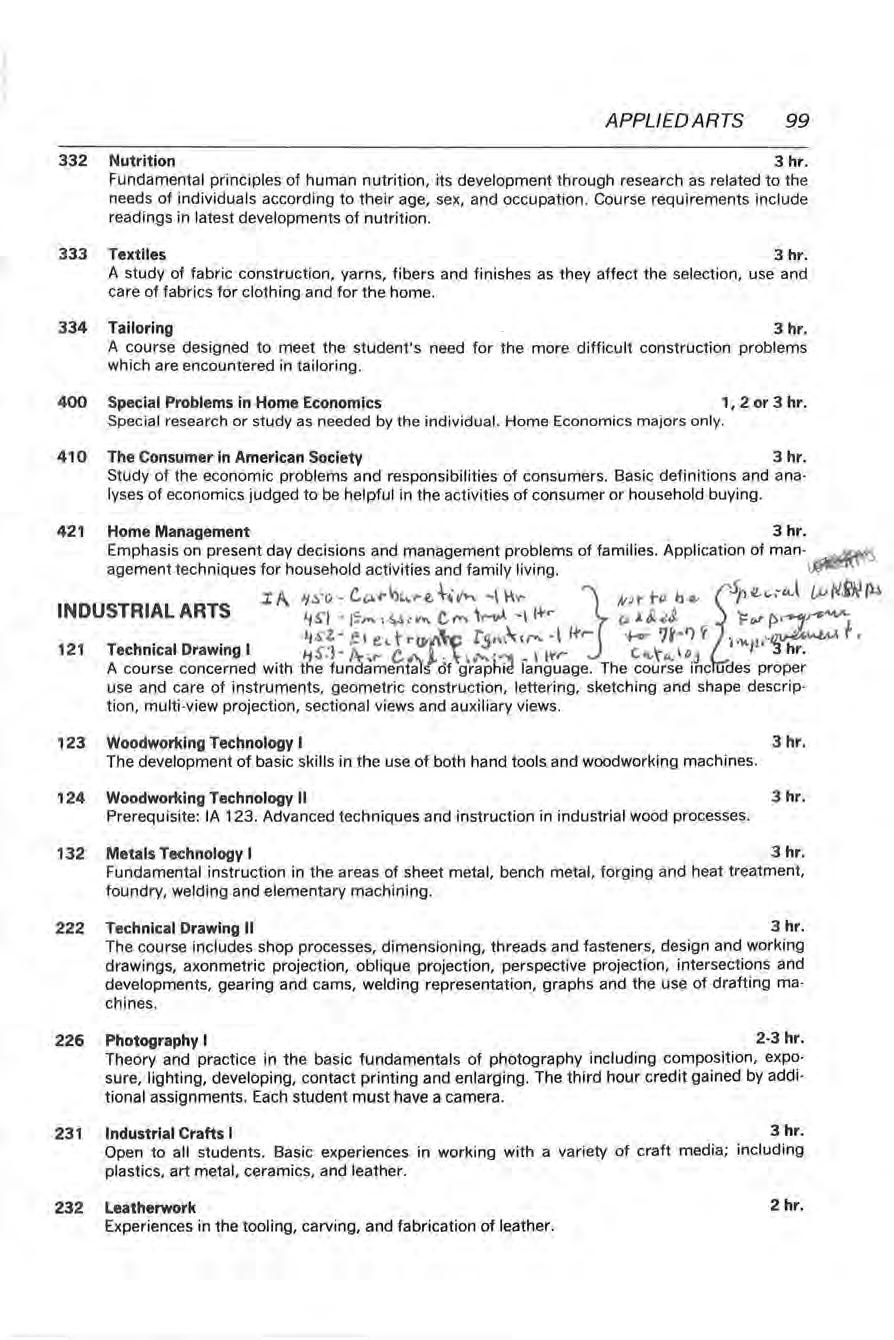
Specia l research or study as needed by the individual. Home Economics majors on ly
410 The Consumer in American Society
Study of the economic problems and responsibilities of consumers Basic definitions and analy ses of econom ics judg ed to be helpful in the activities of consumer or hou se hold buying.
421 Home Management
on present day decisions and management problems of families. Application of man
agement techniques for household activities and family living .
A course concerned with the fundament~s of graph~ language The course inc des proper use and care of instrument s, geometric construction, lettering, sketch ing and shape description, multi-view projection, sectiona l views and auxiliary views .
123 Woodworking Technology I
The development of basic sk ills in the use of both hand tools and woodworking machines
124 Woodworking Technology II
Prerequisite: IA 123. Advanced techniques and instruction in industrial wood processes.
132 Metals Technology I
3 hr.
3 hr.
3 hr.
Fundamental instruction in the areas of sheet metal, bench metal, forging and heat treatment, foundry, welding and elementary machining.
222 Technical Drawing II
3 hr.
The course includes shop processes, dimensioning, threads and fasteners, design and working drawings, axonmetric projection, oblique projection, perspective projection, intersections and developments, gearing and cams, welding representation, graphs and the use of drafting machines.
226 Photography I
2-3 hr.
Theory and practice in the basic fundamentals of photography including composition, exposure, lighting, developing, contact printing and enlarging The third hour credit gained by additional assignments. Each student must have a camera.
231 Industrial Crafts I
3 hr.
Open to all students. Basic experiences in working with a v ar iety of craft media; including plastics, art metal, ceramics, and leather
232 Leatherwork
Experiences in the tooling, carving, and fabrication of leather
2 hr.
233 Electrical Technology I
3 hr
Basic theory, principles , and app li cations of electricity in industry and the home. Areas of instruction include the product ion of electricity, magnetism, theory and basic circu it s, residential wiring, motors and generators, automotive electricity, app lian ce repair , electro-chemistry.
237 Graphic Arts
3 hr.
Study and practice in basic processes of printing and a lli ed industries, including work in lett erpress, silkscreen printing, bookbinding, rubberstamp making and goldleaf stamping. Also benef ic ial for those interested in journalism
318 Finishing Technology
3 hr.
Instruction in surface preparation, materials, and finishing app li cations and processes. Primay concentration on wood finishing. Refinishing, airbrush work, and spot finishing will also be studied.
320 Motor and Applicance Repair and Servicing
3 hr.
Prerequisite: IA 233. Study and practice in techniques of testing, trouble shooting, repairing, and maintaining e lectrica l motors and appliances

321 Shop Maintenance
2 hr.
Instruct ion in the use and care of equ ipment common ly found in the industrial arts laboratory, and shop planning as it relates to the proper functioning of industrial arts facilities. Practice wi ll be given in the cond iti oning and repair of hand and power tools and equipment.
322 Handcrafts
3 hr.
A course designed to develop sk ill s and knowledge in working with ceramics, metals, plasti cs , wood and other craft materials Instruction will include specifying and purchasing craft supp li es and methods of in corporating these activities into school and community programs. Recommended for elementary school teachers, recreat ion majors, and for people interested in leisure time craft activities.
323 Metals Technology II
3 hr.
Prerequisite: IA 132. A seco nd course in metalwork with emphasis on foundry and machine technology, and a study of metallurgy as it relates to the fo undry, machine s hop , and heat treating processes.
324 Building Construction
3 hr.
Prerequisite: I.A 124. Fundamentals of wood frame building construction. Basic plumbing, electricity, masonry , and related areas will be studied.
325 Photography II
2-3 hr.
Prerequisite: IR 226. Lens testing, infr a-red photography, high speed photography, portraiture, use of negative and positive co lor films, co lor printing and movie making
326 Upholstery
3 hr.
Prerequisite: I.A. 124 or by spec ial permission. Designed to give experience in and information about various methods of construction in upholstery both with and without use of springs.
327 Furniture Making
Prerequisite: IA 12 3. The design and construct ion of a contemporary piece of furniture.
328 Electrical Technology II
3 hr.
3 hr
Prerequisite: I.A. 233 or by special permission. A study of the principles of application of electronics and their applications in circuits , test equipment, vacuum tubes, transistors, radio a nd television
329 Plastics Technology
3 hr.
Prerequisite : I.A. 231 or by special permission. A study of the industrial utiliz ation, manufacture , and processing of plastics. In struction and pract ice in tooling, thermo forming, casting, coating, and molding with plastics.
330 Industrial Arts Design
2 hr.
A study of the principles of design as applied to problems of construction. Drawing and sketching of projects for the major areas of Industrial Arts. Also, the study of current furniture styles.
331 Welding
3 hr.
Prerequisite: I.A. 132 or by special permission. Instruction and practice in the use of electric welding machines and the oxyacetylene torch in welding and cutting.
332 Power Mechanics I
3 hr.
The study of the sources of power and of the machines used in its development with emphasis upon the internal combustion engine
333 Small Engine Maintenance and Repair
3 hr
Instruction in caring for and repairing engines commonly used on boats, motorcycles, snowmobiles, and lawn and garden equipment.
334 Automotive Maintenance and Tune -up
3 hr.
A course in which students will gain technical information, analyze automotive functional problems and make necessary adjustments and repairs to maintain economic operation of the automobile.
335 Survival Preparedness
A study of facts related to survival in time of local, state or national disaster.
337 Driver Education and Traffic Study I
1 hr.
3 hr.
Prerequisite: Twenty thousand miles or two years of driving experience free of repeated chargeable accidents and moving violations This course will include presentation of materials and methods of traffic safety and driver training with emphasis upon attitude, development, organization and administration, driving regulations and safe motor car operation
338 General Safety
3 hr.
This course is designed to familiarize the student with problems of accident prevention and conservation of human life and limb. Emphasis will be placed in the following areas: occupational, farm and home transportation, and school. Instructional materials will be developed and studied.
340 Driver Education and Traffic Safety II
3 hr
Prerequisite: Driver Education I. This course will provide an opportunity to construct materials relating to and experiment with methods of presenting lessons in traffic safety and behind-thewheel driving. Each student will be expected to teach a beginning driver.
400 Individual Studies in Industrial Arts
1-3 hr.
Prerequisite : Approval by department. Independent study of Industrial Arts to meet the needs of the student. For majors only.
401 Career Education
3 hr.
A study providing students from K-12 the direction to acquire the skills which will allow him to make a livelihood for himself and for his future family, no matter at which step of the ladder of the educational system he leaves.
405 Electrical Technology Ill
3 hr.
Prerequisite : I.A. 328. A study of solid state devices and electronic circuits in communication and indust-rial applications
407 Machine Shop Technology
3 hr.
Prerequisite : IA 323. An advanced course in machine tool theory and practice. Emphasis on operation of engine lathe, milling machines, drill presses, shapers, gear hobbing machines, saws, and grinders.
425 Industrial Arts Methods and Observation
2 hr. The course will emphasize teaching methods and aids, course construction, testing, shop discipline, grading, safety and other problems pertinent to the teaching of the industrial arts.
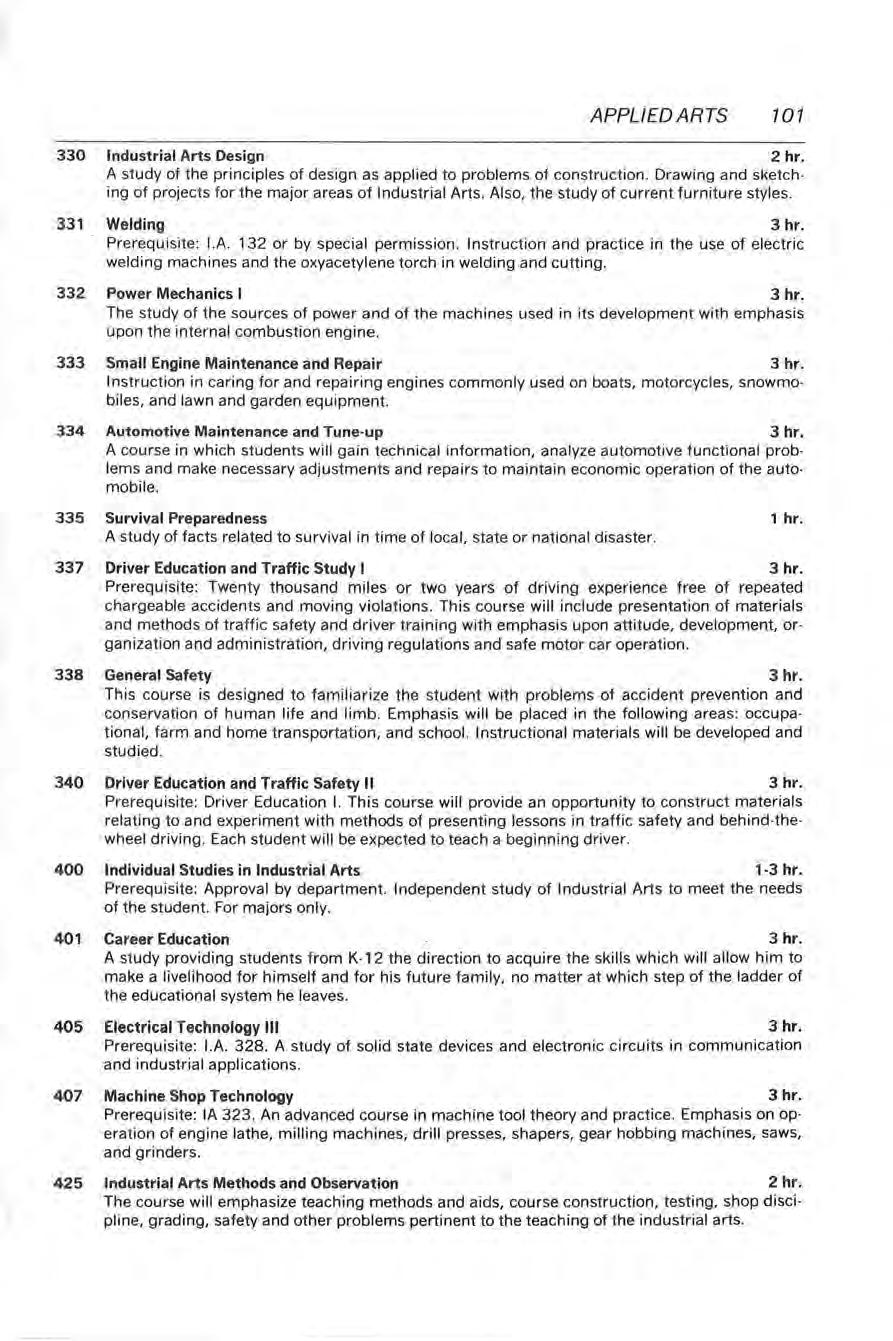
427 Architectural Drawing
3 hr.
Prerequisite: I.A. 222. The principles of planning a dwelling to fit modern need s. Drawings will include a plot plan, floor plan, four e levation s, sections and details. Specifications will be determined by the student for the dwelling.
428G The World of Construction
3 hr.
A study of the Indu str ia l Arts Curriculum Project World of Construction. The course is designed to develop a n understanding of the goals and techniques of IACP in struct ion
Methods of conducting le arning activities through role playing, group activ itie s, and simulation games will be emp hasized as they relate to the problems involved in construction on a site
429G The World of Manufacture
3 hr.
A study of the Indu stria l Arts Curriculum, Project World of Manufa ctur ing. The course is designed to develop an understanding of the goals and techniques of IACP instruction. Methods of conducting learning activities through role playing, group activities, and sim ul ation games will be emp hasized as they relate to the prob l ems involv ed in manufacturing products in a plant.
431 Welding II
3 hr
Prerequisite: IA 33 1 An advanced cou rs e in welding with emphasis on shie ld ed metal arc , metal inert gas, tungsten inert gas and other modern welding techniques.
432 Auto Mechanics
3 hr.
Prerequisite : I.A. 332 A study of the basic mechanical operations of the automobile. Emphasis will be placed on principles and theories of operation of components including overhaul pro cedures and maintenance.
440 Research in Alternative Technology
3 hr.
Prerequisite: Junior or Senior majors. The study of the major concepts of current technology. Conceptualization and fabrication comb ining severa l technological spec ializ atio n s.
441G History and Philosophy of Vocational Education
3 hr. Origins and philosophy of vocational ed ucation and the re lat ion sh ip to the sc hoo l curr iculum. Required for vocat ion a l cert ification and recommended as an e lec tive for school administrators.
442G Organization and Administration of Vocational Education
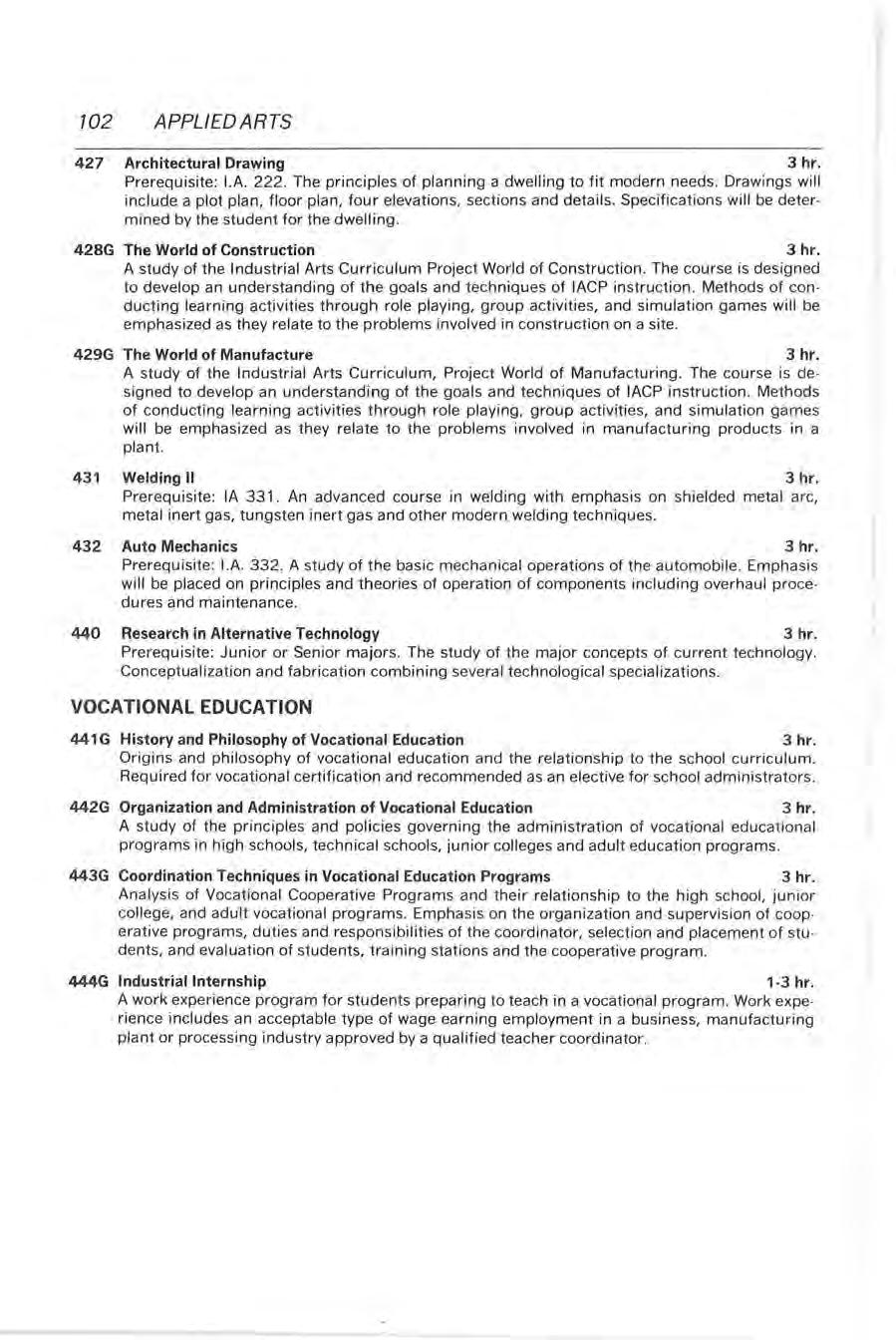
3 hr.
A study of the principles and policies governing the administration of vocational educationa l programs in high schools, technical sc h oo ls, junior colleges and adult educat ion programs.
443G Coordination Techniques in Vocational Education Programs
3 hr. Analysis of Vocation al Cooperative Programs and their relationship to the high school, junior col lege, and adult vocationa l programs. Emphasis on the organizat ion and supervision of cooperat iv e programs, duties and re spons ibiliti es of the coord in ato r, selection and placement of students, and eva luation of students, training stat ions and the coopera ti ve program.
444G Industrial Internship 1-3 hr.
A work experience program for students preparing to te ach in a vocationa l program. Work experience include s an acceptable type of wage earn ing employment in a business, manufacturing plant or processing industry approved by a qualified teacher coordinator. ·
Foundations of Education 3 hr.
· Prerequisite : Psych 121. Successful personal interaction as a prerequisite to effective teaching is stressed.
302 The Disadvantaged Child
3 hr.
Prerequisites : Psych 121 and 301. An interd isciplinary seminar designed to interpret the influ • ences of culture in regard to the institution of family, school, government, and religion.
304 Child, School and Family Relationships
3 hr.
A study of the relationships between the individual in the school and family, the art of living co• operatively with others and the responsibility of each person in the school and home in the de• velopment of satisfactory relationships
305 Principles of Early Childhood Education
3 hr.
Prerequisite: Psych . 300. Theory and practice of early childhood education in the nursery school and primary grades. The course deals with curriculum, program planning , use of materi• als and equipment, role of teacher, techniques of classroom management, and meeting the needs of individual children in the group situation.
307 Practicum
Approval. Laboratory based experiences with teaching and nonteaching responsibilities.
310 Kindergarten Education
1·8 hr.
3 hr.
Prerequisites: Psych 121 and 300. Modern methods and study of materials that are used in the kindergarten program.
334 Teaching Reading
3 hr.
Prerequisite : Approval of Instructor. A study of current methods of teaching developmental reading, study of reading materials and their uses, evaluating reading progress, and relating developmental reading to an understanding o f children.
335 Problems in Reading Seminar
3 hr.
A seminar designed to give a mutual understanding of the problems in reading, grades 1 to 12 inclusive .
336 · Diagnostic and Remedial Reading
3 hr.
Prerequisite : 15 hours professional education or instructor's permission Techniques of recog• nizing and classifying reading problems.
Preparation of Secondary Education
2 hr.
Prerequisite: Approval for professional semester. Emphasis is given to developing knowledge, skills, and techniques for successful teaching in the secondary schools.
405 Teaching in the Elementary School
Jl0ft
8 hr.
Prerequisite: Approval for professional semester. Students will have an opportunity to consider approaches to instruction including most subjects commonly taught in the elementary school and participation in the clinical teaching laboratory.
Prerequisite: Approval for professional semester. Testing of educational theory and techniques under carefully controlled conditions. Students have an opportunity to develop and refine teach• ing skills, through the use of simulation, microteaching and video -ta ping, teacher self-appraisal models, technical skills of teaching laboratory, and preparation of instructional materials.
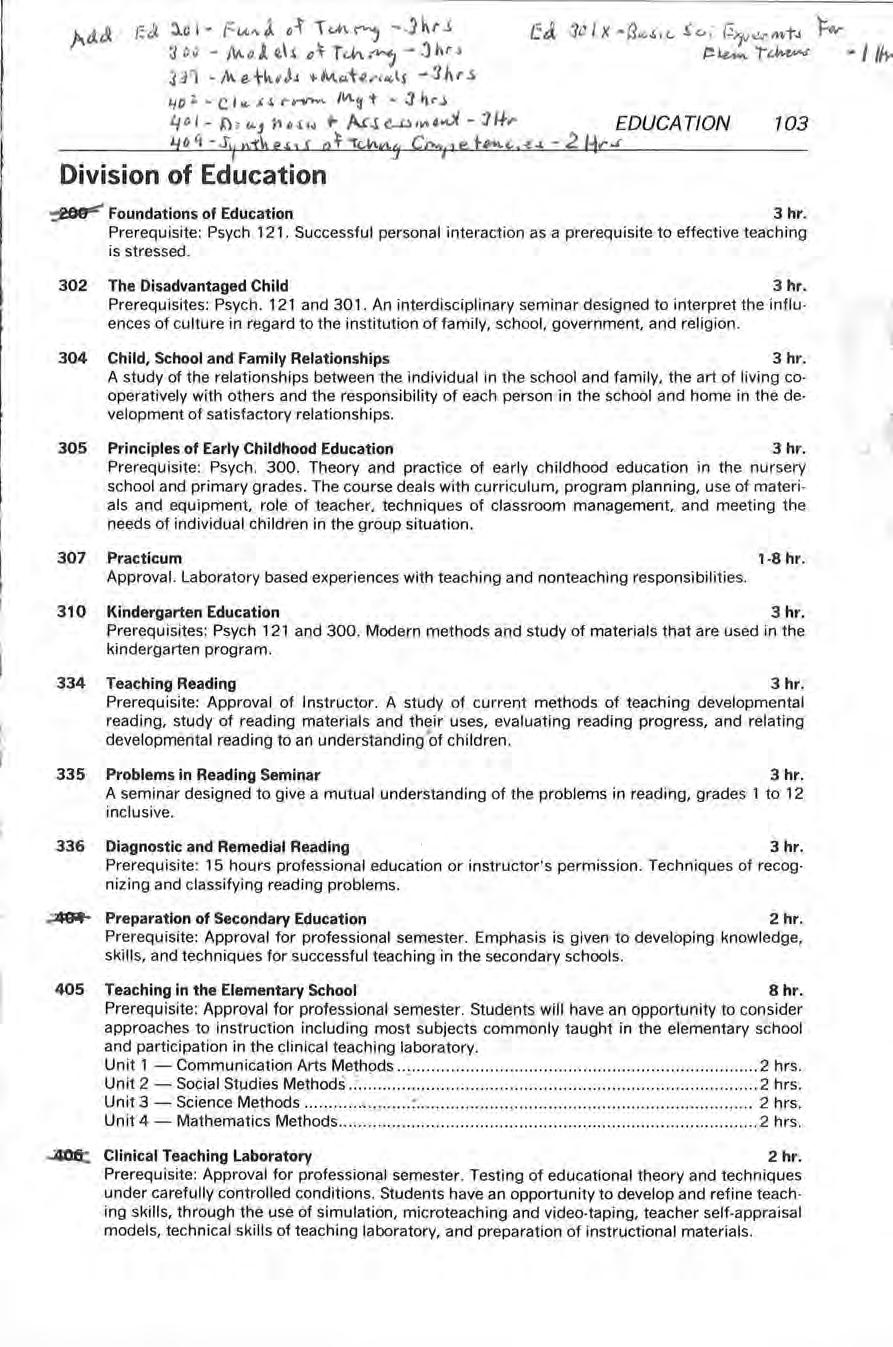
Instructional Media
2 hr.
Demonstration and laboratory practice with In structional Media used in the classroom and school system, including motion picture, film strip, slide and opaque projectors; also tape recorders, record players, closed circuit television and video tape recorder.
Student Teaching (Elementary)
4 hr., 8 hr.
Prerequisite: Psych 121, 201, and 401; Educ. 300 and 405. A practical application of principles of learning in the classroom. Progressive induction into full teaching responsibility at the elementary level. Students teach full-time for nine weeks. Application for student teaching must be made at the end of the junior year.
Student Teaching (Secondary)
8 hr.
Prerequisite : Approval for professional semester. Experience in the application of sound educational theory by actually teaching students in the secondary school. All students who intend to be certified as secondary teachers are cautioned that the courses in the professional semester are integrated with student teaching and should not be taken in previous semesters. Application for student teaching must be made at the end of the junior year.

Student Teaching (Early Childhood)
4 hr.
Prerequisite: Approv a l for professional semester. Observation, laboratory and teaching experience in directing the learning activities of children in K-3 classes. During the eight weeks of teaching, the student applies the theories and principles of learning and instruction.
Workshop
1 to 6 hr.
Work on practical educational problems of special interest to the students. The individual or group is expected to make a written report to his finished project which will be duplicated and made available to other members of th e Workshop
Special Learning Disabilities
3 hr.
Designed to prepare teachers to adjust instructional strategies and to use teacher-materials in order to overcome social, emotional, psychological, physiological and educational deficiencies of children in the academic area.
Methods and Materials in Special Education
3 hr.
Prerequisites: Psych 240. A course in developing appropriate materials in the major area of academic study. Emphasis will be on developing knowledge, skills and techniques for successfully teaching in the special education classroom.
,{I.
Student Teaching (Exceptional Child-)
4 hr.
Prerequisite: Approval. Observation, laboratory and teaching experience in the special education classroom The student assumes full teaching responsibility for eight weeks - experiences the problems involved in the teaching of the educable mentally handicapped.
School Law for Teachers
3 hr.
This course includes a study of the origin and development of school law Emphasis is given to school laws and their application as they pertain to classroom teachers in Nebraska .
Trenda and Issues in Education
3 hr.
Prerequisite: Permission of instructor The organization of learning experiences to deal effectively with individual differences, and varied curriculum patterns Consideration of recent trends and research - programmed lea rning, team teaching, departmentalization, self-contained and ungraded classroom, core program, use of special professional services, etc
Readings in Education
3 hr.
Prerequisite: Permission of instructor. Class readings and discussion of selected articles and books. Emphasis on educational practices and their implications for the classroom teacher and administrator
Individualization of Instruction
3 hr. Several models for individualization are investigated. The student will design a topic of instruction following one of the model5. The student's experience this individualized design by the way the course is managed.
Principles and Techniques of Supervising Student Teachers
3 hr.
Prerequisite: Permission of instructor. A course designed to prepare teachers to act as supervisors of student teachers
Teaching Secondary Reading
3 hr.
Prerequisite: Educ 200 and Jr. standing. A study of the current trends and practices in developmental, corrective, and remedial reading in the secondary schools. Adolescent literature and reading needs will be related to the instructional demands in both reading improvement skills and using reading as a tool for learning in the content fields.
450 Directed Study in Education and Psychology
1-3 hr.
Prerequisite: Junior or senior standing with permission of the instructor. Individual study and research in depth on a topic jointly approved by the instructor and student.
3 hr.
A general education course which provides an introduction to the field of Psychology. Initial course for those pr~ as teachers or professionals in the field.
3 hr.
Prerequisites: Spec. Ed 200. A survey course of the characteristics, abilities and needs; the psychological, environmental and cultural factors which contribute toward retardation. Appropriate teaching materials and techniques are taught.

Human Growth and Development
3 hrs.
Prerequisite: Psych 121 or approval of instructor. Principles of human growth and development with consideration given to the basic philosophy underlying effective teaching
Educational Psychology
3 hr.
Prerequisites: Psych 121 and 300. The principles of psychology applied to educational practice.
Child Psychology
3 hr.
Prerequisite : Psych 121. A study of the principles of behavior in fancy and childhood, physical, social, emotional, intellectual and persona lity development from childhood to pre-adolescence.
Adolescent Psychology
3 hr
Prerequisite: Psych. 131. The study of physical, social, emotional, intellectual and personality development of adolescents and discussion of problems peculiar to adolescence.
Social Psychology
3 hr.
Prerequisite : Soc. 201. Analysis of processes involved in the interaction between person and group, including dynamics of group influence on personal behavior and the impact of personal variables on the functioning of primary and secondary groups in the contemporary society.
Applied Psychology
3 hr.
Prerequisite : Psych. 121 Facts and principles from the study of human behavior applied to business, industry, society, r?,rofessional life and group processes.
P~fe1~, otfiteeplie11Ji Ghilllren- ,
3 hr.
Prerequisites: Psych 240. lntrodu ~fion to materials and techniques for identifying and helping to understand the specific developmental needs of gifted pupils and understand types of learning tasks and how to evaluate achievement with them.
Introduction to Mental Hygiene
3 hr.
Prerequisites: Psych. 121 and 300. Home, school and community factors in the adjustment of individuals.
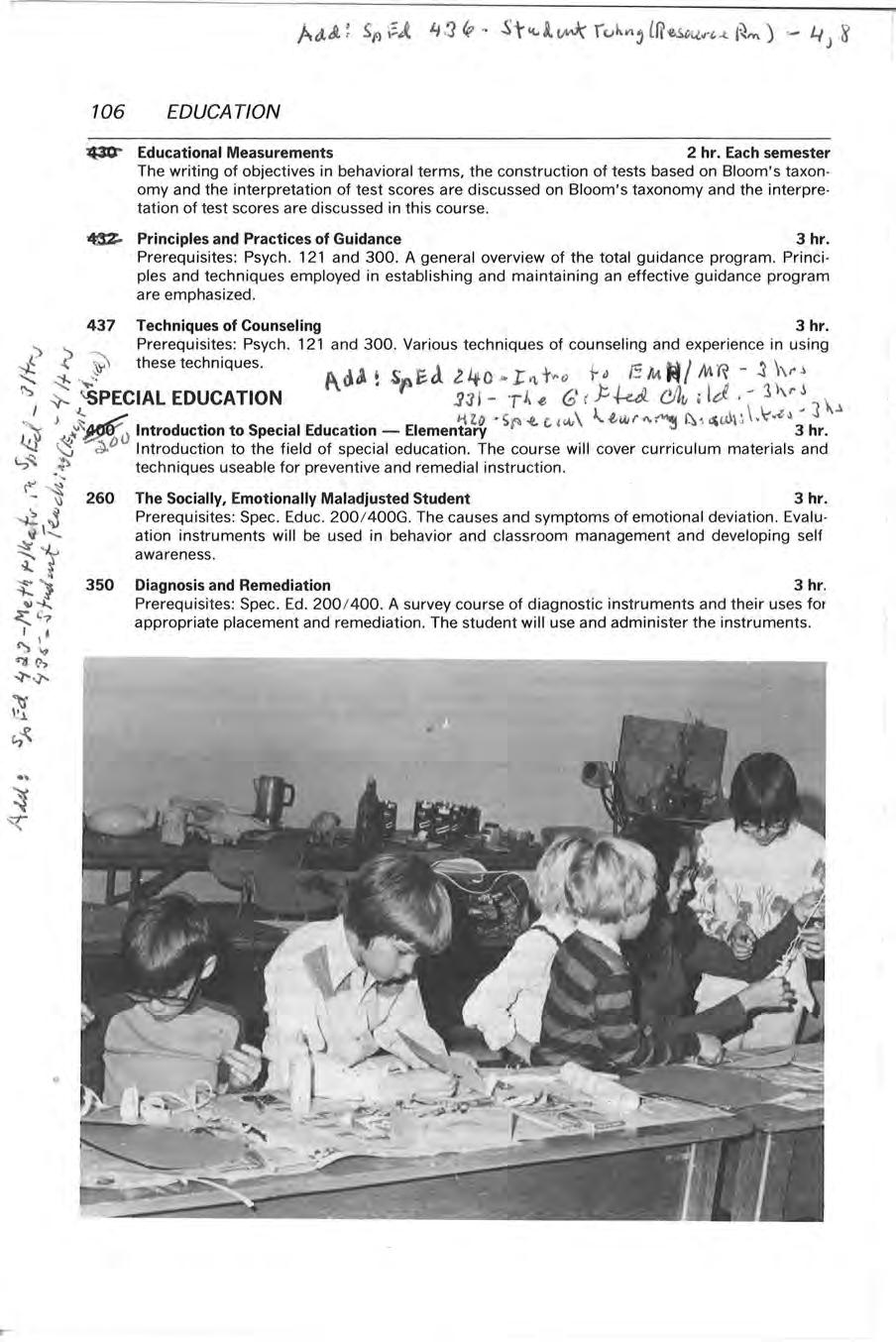
lPO'" Educational Measurements
2
The writing of objectives in behavioral terms, the construction of tests based on Bloom ' s taxonomy and the interpretation of test scores are discussed on Bloom's taxonomy and the interpretation of test scores are discussed in this course. Principles
Prerequisites: Psych 121 and 300. A general overview of the total guidance program Principles and te c hniques employed in establishing and maintaining an effective guidance program are emphasized
Psych 121 and 300 Various techniqu es of counseling and experience in using
these techniques.
course
useable for prev entive and remed ia l instruction.
Spec. Educ. 200 / 400G. The causes and symptoms of emotional deviation
ation instruments will be used in behavior and classroom management and developing self
: Spec. Ed. 200 / 400. A survey course of diagnostic instruments and their uses for
appropriate placement and remediation The student will use and administer the instruments
ENGLISH
101 English Composition
3 hr.
A study of the principles of clear and effective expression as applied to the sentence, paragraph, and the whole composition. A review of grammar, mechanics, and correct usage . Training in organization, and the writing of short and long papers. Required course for al l freshmen. (Note: Students who rank at the 85th percentile or higher on the English portion of the ACT may be excused from Eng 101 )
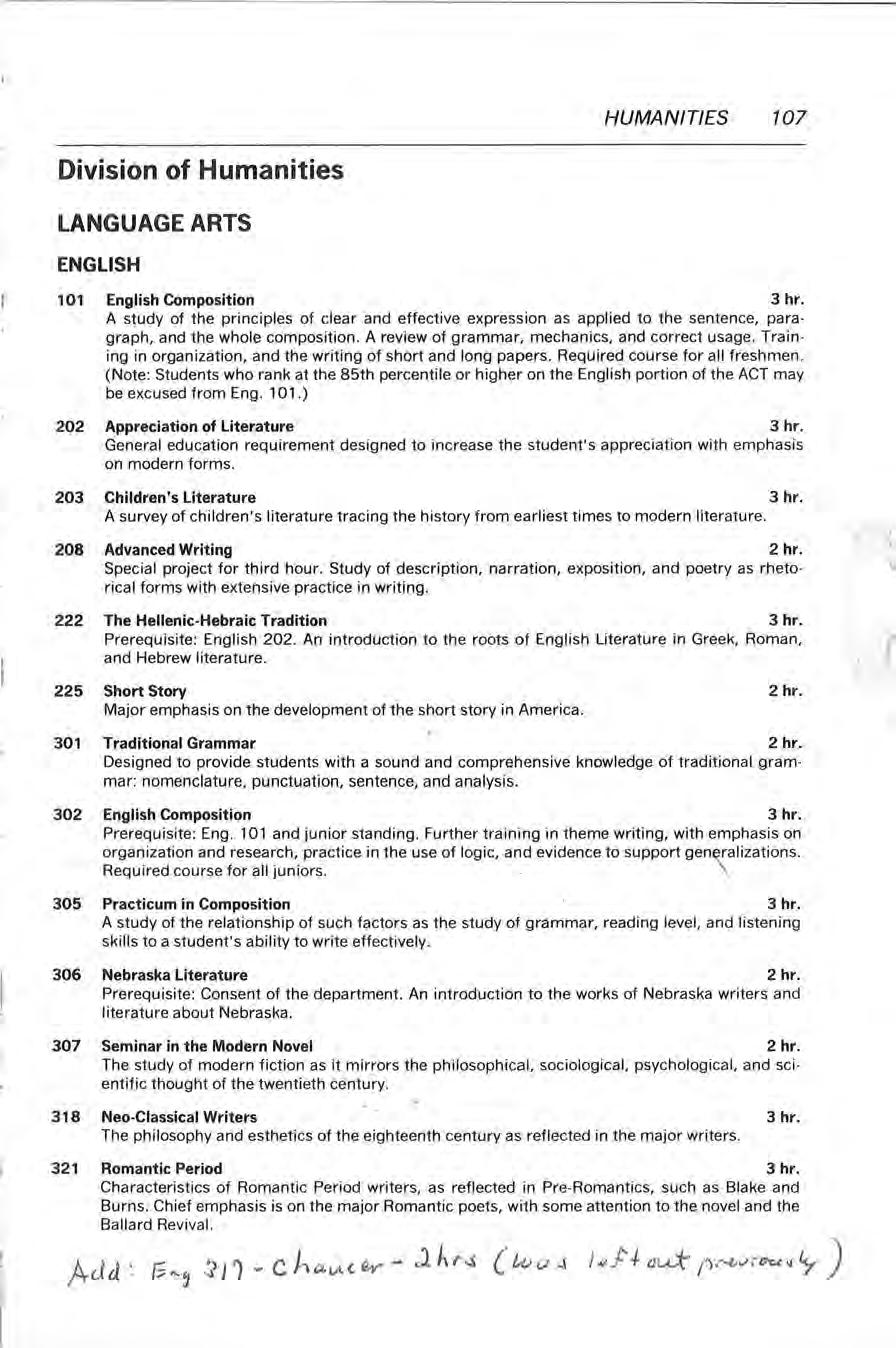
202 Appreciation of Literature
3 hr.
General education requirement designed to increase the student's appreciation with emphasis on modern forms
203 Children's Literature
A survey of chi ldren 's literature tracing the history from earliest times to modern lit erature.
208 Advanced Writing
3 hr.
2 hr.
Special project for third hour. Study of description, narration, exposition, and poetry as rhetorica l forms with extensive practice in writing.
222 The Hellenic-Hebraic Tradition
3 hr.
Prerequisite : English 202. An introdu ct ion to the roots of English Literature in Greek , Roman, and Hebrew literature.
225 Short Story
Major emphasis on the development of the short story in America
301 Traditional Grammar
2 hr .
2 hr. Designed to provide students with a sound and comprehensive knowledge of traditional grammar: nomenclature, punctuation, sentence, and analysis.
302 English Composition
3 hr.
Prerequisite : Eng 101 and junior stand ing Further training in theme writing, with emp ha sis on organization and research, practice in the use of logic, and evidence to support gen~ra li zations. Required course for all juniors. \
305 Practicum in Composition
3 hr.
A study of the relationship of such factors as the study of grammar, reading level, and li stening ski ll s to a student's ability to write effect iv e ly .
306 Nebraska Literature
2 hr.
Prerequisite : Consent of the department. An introduction to the works of Nebraska writers and literature about Nebraska
307 Sem inar in the Modern Novel
2 hr.
The study of modern fiction as it mirrors the phi losop hical, sociolog ica l, psychological, and scientific thought of the twentieth century. ·
318 Neo-Classical Writers
3 hr. The philosophy and esthetics of the eighteenth century as reflected in the major writers .
321 Romantic Period
3 hr.
Characteristics of Romantic Period writers, as reflected in Pre -Romantics, such as Blake and Burns. Chief emphasis is on the major Romantic poets, with some attention to the novel and the Ballard Revival.
322 Continental World Literature
3 hr. Emphasis o n a few major pieces of continental literature (chiefly novel) from the Rena issance to the present. A study of the writer as think er and the lit erat ure as a mirror of the times. Dostoevsky, Tolstoy, Flaubert, Voltaire, Mann, and Cervantes are among the aut hor s studied
323 Victorian Period
3 hr.
Nineteenth cent ury England as see n by her major poet s and noveli sts; some attention given to prose writers.
324 American Literature I
3 hr.
An historical survey of s ignificant American writing from the Colonial Period to 1865. Major writers receive chief emphasis.
325 American Literature II
A continuation of English 324 from 1865 to the present.
328 Modern Poetry
3 hr.
2 hr.
A study of British and American poetry of this cent ury and it s relevance to contemporary literature and life.
405 Teaching English and Speech
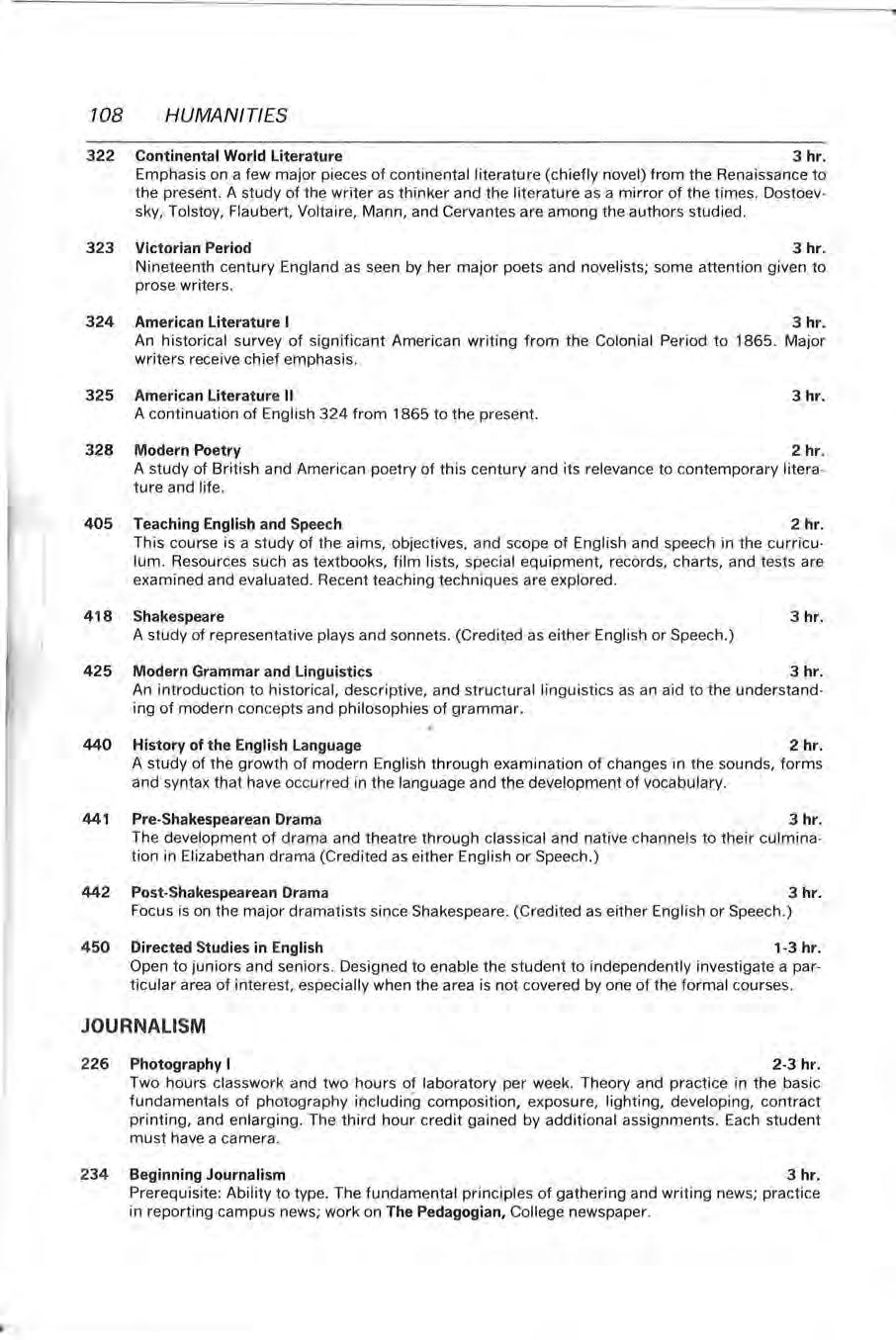
2 hr.
This course is a study of the aims, objectives, and scope of English and speech in the curriculum. Resour ces such as textbooks, film lists, spec ial equ ipm e nt, r ecords, c harts, and tests are exa mined and evaluated. Recent teaching techniques are explored.
418 Shakespeare
A study of representative plays and so nn ets. (Credited as eit h er English or Speech.)
425 Modern Grammar and Linguistics
3 hr.
3 hr.
An introduction to hi storica l, descriptive, a nd structural l ing ui st ics as an a id to the understanding of modern concepts and philosophies of grammar.
440 History of the English Language
2 hr.
A study of the growth of modern English through examination of changes in the sounds, forms and sy nta x that ha ve occurred in the language and the development of vocabulary.
441 Pre-Shakespearean Drama
3 hr.
The development of drama and theatre through classical and n at iv e channels to their culmination in Elizabethan drama (Credited as either English or Speech.)
442 Post-Shakespearean Drama
3 hr. Focus is on the major dramatists since Shakespeare. (Cr edited as either Engli s h or Speech.)
450 Directed Studies in Eng lish
1-3 hr. Open to juniors and se nior s. Desig ned to enable the student to independently investigate a particular area of interest, especially when the area is not cove red by one of th e formal courses.
226 Photography I
2-3 hr.
Two hours classwork and two hours of laboratory per week. Theory and practice in the basic fundamentals of photography in c luding composition, expos ure, lighting, d eve loping, contract printing, and e nlarging. The third hour credit gained by additional assignments. Each student mu st have a ca mera .
234 Beginning Journalism
3 hr.
Prerequ isi te : Ability to type. The fundamental principles of gathering and writing news; pra ctice in reporting campus news; work on The Pedagogian, College newspaper.
235 Newspaper Editing
2 hr.
Prerequisite: Journ. 234. Credit not to exceed a total of four hours. An intensive course in journalistic desk work that includ es copy preparation, headline writing, page layout; extensive work on The Pedagogian desk.
237 Graphic Arts
3 hr.
Six hours laboratory Study and practice in basic processes of printing and al lied indu stries, inc luding work in letterpress, silkscreen printing, bookbinding, rubberstamp making, and goldleaf stamping
325 Photography II
2-3 hr.
Lens, testing, infra -red photography, high speed photography, portraiture, use of negative land positive color films, co lor printing, and oil co loring of prints.
329 Advertising
2 hr.
A study of advertisements a n d media from three viewpoints: management-marketing, communications-creativity, and co n sumer-citizen
400 Internship in Journalism
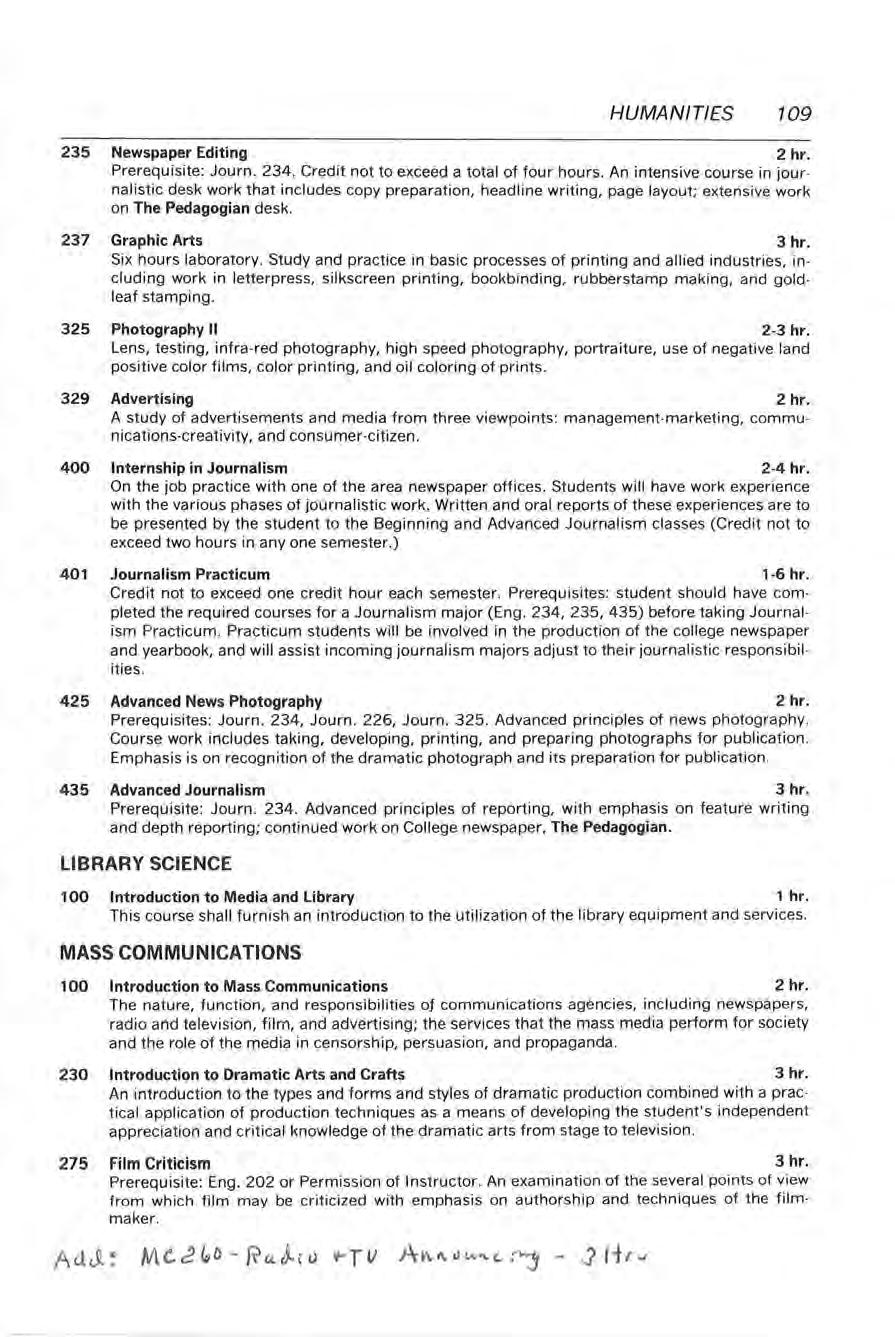
2-4 hr. On the job practice with one of the area newspaper offices. Students will have work experience with the various phases of journalistic work. Written and oral reports of these experie nces are to be presented by the student to the Beginning and Advanced Journalism classes (Credit not to exceed two hours in any one semester.)
401 Journalism Practicum
1-6 hr.
Credit not to exceed one cred it hour each semester. Prerequisites: student shou ld have c ompleted the required courses for a Journalism major (Eng. 234, 235, 435) before taking Journ a lism Pract icum Practicum stude nt s will be invol ved in the production of the co ll ege newspaper and yearbook, and will assist incoming journ alism majors adjust to their journalistic responsibilities.
425 Advanced News Photography
2 hr.
Prerequisites: Journ. 234, Journ. 226, Journ. 325. Advanced principles of news photography. Course work includes taking, developing, printing, and preparing photographs for publication
Emphasis is on recognition of the dramatic photograph and its preparation for publication.
435 Advanced Journalism
3 hr.
Prerequisite: Journ. 234. Advanced principles of reporting, with emphas is on feature writing and depth reporting; co ntinu ed work on College newspaper, The Pedagogian.
100 Introduction to Media and Library
1 hr. This course sha ll furnish an introduction to the utilization of the library equipment and services.
100 Introduction to Mass Communications
2 hr. The nature, function, and r espons ibiliti es of communications agencies, including newspapers, radio and television, film, and advertising; the services that the mass media perform for society a nd the role of the media in censorship, persuasion, and propaganda.
230 Introduction to Dramatic Arts and Crafts
3 hr. An introduction to th e types and forms and styles of dramatic production combined with a practical application of production techniques as a means of developing the student's independent appreciation and crit ical knowledge of the dramatic arts from stage to television.
275 Film Criticism
3 hr.
Prerequisite: Eng 202 or Permission of In structor. An examination of the severa l points of view from which film may be c ritic ized with emphasis o n authorship and techniques of the filmmaker
300 Communications Law
3 hr.
The laws regarding media responsibility, placing the legal problems of media work in a practical context; libel, contempt, constitutional guarantees, access to public records; the invasion of privacy, criticism, and copyright.
363 Television Production
3 hr.
P o sq ·1c bl .U I. :A.n individual approach to television production which allows the student to produce and direct his own productions .
SPEECH AND DRAMA Ad.ti! .SJ'l(, i-1.
152 Fundamentals of Speech
3 hr. Each semester and summer
The principles of speech. Development of bodily freedom, distinct utterance, and improved oral communication Includes fundamental process of speech correction and development, with emphasis on the development of excellent speech habits and the diagnosis and treatment of elementary speech defects.
254 Public Speaking
3 hr.
Training in effective methods of adapting composition and delivery to various types of audiences. A study is made of the forms of address, impelling motives, speech ends, speech organization, composition, and delivery. Practice is given in gathering, choosing, working and mastering speech materials.
256 Acting I
3 hr.
A concentration on stage movement, pantomime with emphasis on the development of the creative imagination.
257 Acting II
3 hr.
Prerequisite: Speh 256. Intensive training in stage business, dialogue and characterization, analyzation of character and the principles of dramatic interpretation.
Radio and Television Announcing
3 hr.
An introduction to radio and television as communication media. Introduction to modern facilities and practices. Laboratory projects related to both media.
300 Summer Theatre Workshop
3 hrs. credit per session
Practical training in all aspects of theatre production; acting set design, lighting, costuming, make-up, improvisation, music, and dancing. Public performance every weekend. Offered both sessions, no prerequisites, may be taken either or both sessions for a total of six hours credit.
327 Light and Sound Design for Stage and Television
3 hr.
Prerequisite : MC 230. Theory and practice of stage and television lighting and sound systems. Study of instruments and control systems employed in light and sound in various media situations. Study of color in light, its effect upon costumes, scenery and make-up. Acoustical problems analyzed. Planning of light and sound plots.
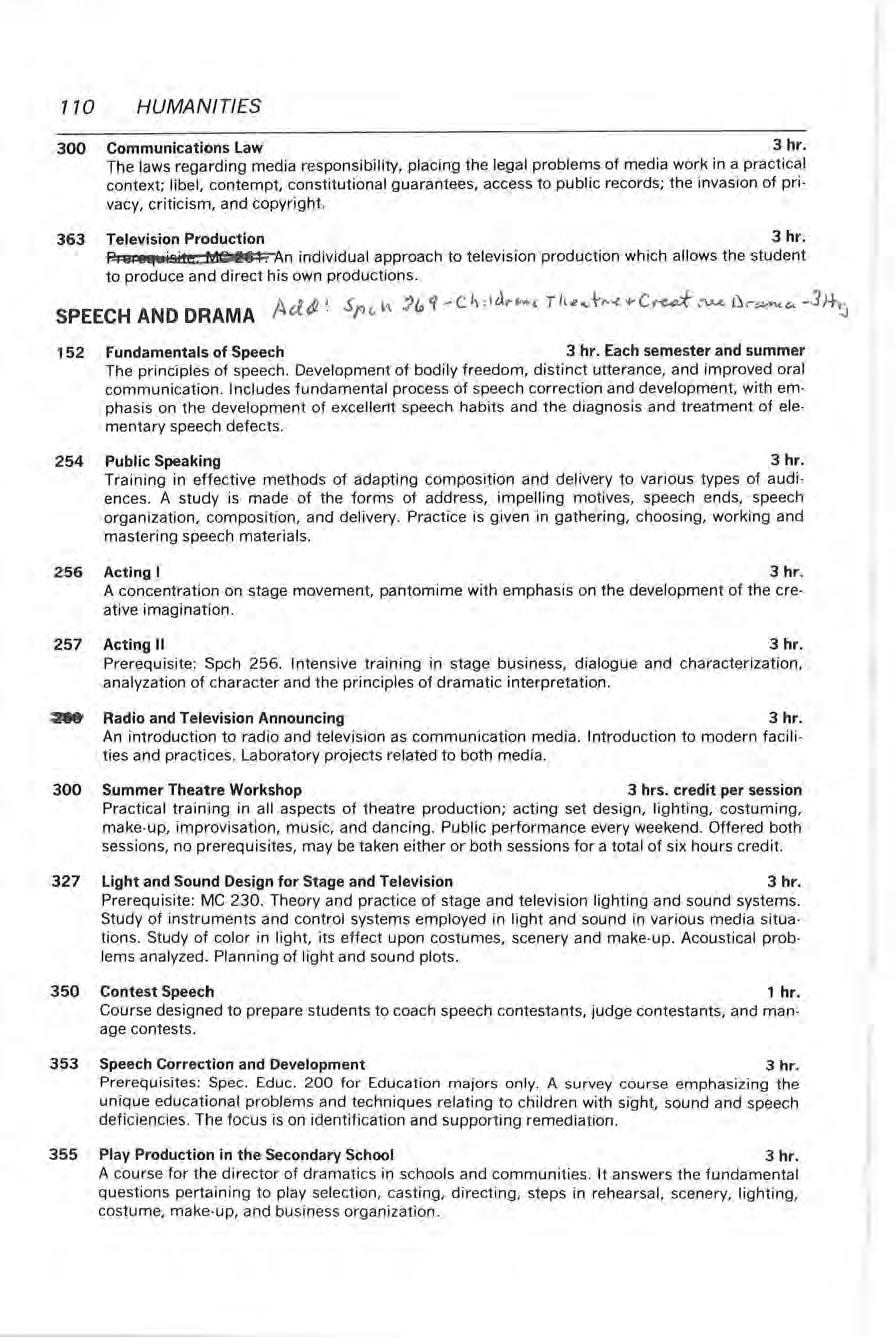
350 Contest Speech
1 hr.
Course designed to prepare students to coach speech contestants, judge contestants, and manage contests.
353 Speech Correction and Development
3 hr.
Prerequisites: Spec. Educ. 200 for Education majors only. A survey course emphasizing the unique educational problems and techniques relating to children with sight, sound and speech deficiencies. The focus is on identification and supporting remediation.
355 Play Production in the Secondary School
3 hr
A course for the director of dramatics in schools and communities. It answers the fundamental questions pertaining to play selection, casting, directing, steps in rehearsal, scenery, lighting, costume, make-up, and business organization
357 Interpretative Reading
2 hr.
Designed to emphasize meaningful ora l reading of worthwhile lit erature in group and so lo situations The course will include close, crit ical ana ly sis of the practice se lections, as well as study and practice of the basic techniques involved in delivery.
360 Scenery and Costume Design
3 hr.
Prerequisite: MC 230. Theory and practice of Costume and Scenery Design. Application of the principles of design as they apply to Scenery and Costumes and the interrelationship of the two design areas Development of the scenery and cost um e designs through drawings, sketches , co lor plates and models.
363 Directing I
3 hr.
Prerequisite: Speh. 256. This course answers the fundamental questions pertaining to play select ion, casting, directing, scenery, li g hting , costume, and make-up.
364 Directing II
3 hr.
Prerequisite: Speh 256 and 363. Further study in the hi storica l interpretations of action, and an intense practical app li cat ion of the fundamentals learned in Directing I.
400 Theatre History
3 hr.
This course will examine the nature, practice function, and lit erature of the theatre from its beginnings to the present day. The approach will consist of a study of each of the major periods in theatre history and representative plays of that period.
404 Projects in Communications
1-3 hr.
Prerequisite: Speh 15 2 or Speh 254 Open to juniors and seniors for individualized study projects in Speech, Mass Communications or Theatre.
220 Principles of Economics I

3 hr.
Elementary concepts with emphasis on money, banking, savings, insurance, production, distribution, taxation, va lu e, price, capita l, and labor.
221 Principles of Economics II
3 hr.
Prerequisite: Economics 220 . Consideration of wages, interest, rent and profits; persona l distribution of income; consumption; monopolies; agriculture; government taxation and expend iture s; international trade; and comparative economic systems.
222 Contemporary Economic Problems
3 hr.
Prerequisites: Economics 220 and 221 Analysis of major economic problems relating to wage and income distribution, money and cred it, business cycles, domestic and international trade and tariffs.
333 Economic History of United States
U S economic history from colonial t im es to the present.
350 Public Finance
3 hr.
3 hr.
Prerequisites: Econ. 220 and 221. A critica l a n a lysis of the capitalist ic economic systems followed by a survey a nd critical ana ly sis of socialism and communism
375 Labor and Industrial Relations
3 hr. Econ. 220 and 22 1. Labor , management and government as they are int erre lat ed involving co llective bargaining, lab or laws, and wage theories.
380 Environmental Economics
3 hr.
Prerequisites: Econ. 220 -221. An economic analys is of the environmental cr isis and possible so lutions The role of the market system and its failure to compensate for the suffering generated by a highly advanced society
470G Special Problems in Economics
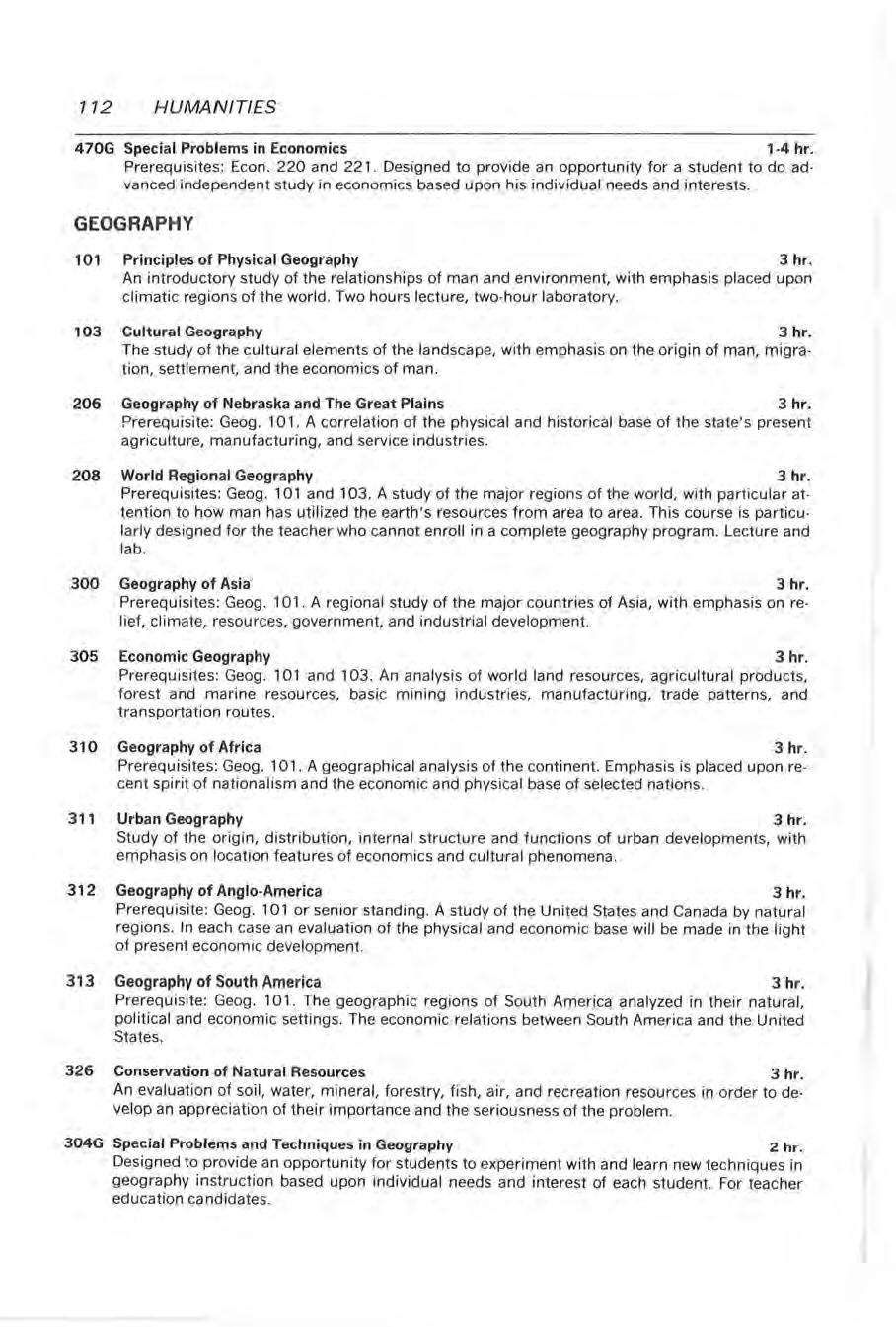
1-4 hr.
Prerequisites: Econ. 220 an d 22 1 Designed to provide an opportunity for a student to do advanced independent study in econom ics based upon his individu al needs and inter ests
101 Pr in ciples of Physical Geography
3 hr.
An introductory st u dy of the relationships of man and e n v ir onment, with emphasis p laced upon c lim at ic regions of the world. Two hours lecture, two- h our laboratory.
103 Cultural Geography
3 hr.
Th e study of t he c ultu ra l elements of the landscape, with emphas i s on the origin of man, migration, sett lement, an d the eco n om ics of man.
206 Geography of Nebraska and The Great Plains
3 hr.
Prerequisite: Geog. 101 . A correlation of the physical and historical base of the state's present agriculture, manufacturing, and se rvice industries.
208 World Regiona l Geography
3 hr.
Prerequisites: Geog. 101 and 103. A study of the major regions of the world, with particular attention to h ow man has utili zed the ear th' s resources from area to area Thi s co ur se i s part icularly designed for the teacher who ca n not enro ll in a comp lete geography program. Lecture a n d lab.
300 Geography of Asia
3 hr.
Prerequisites: Geog. 10 1 A regional st u dy of the major co untri es of Asia, with e mp has is on relief, climate, resource s, government, and industrial development.
3 0 5 Economic Geography
3 hr.
Prerequisites: Geog. 101 and 103. An a n alys i s of world land resources, agric ultu ra l products, forest and marine resources, basic mining ind u str ies, manufacturing, trade patterns, a nd tra n sportat ion rou t es.
310 Geography of Africa
3 hr.
Prerequisites: Geog. 10 1 A geograph ica l ana ly sis of the con tin ent. Emphasis i s placed up on recent spirit of nationalism and the eco nom ic and p h ysical base of se le cted nations.
3 1 1 Urban Geography
3 hr.
Study of the origi n, dis tri but ion , internal structure an d functions of urba n developments, with emphas is on locat io n features of eco no mi cs a nd cu ltur a l phe nomena.
312 Geography of Anglo-America
3 hr.
Prerequisite: Geog 101 o r sen ior sta nding A stu dy of the United States a nd Canada by n atura l reg ions. In each case an eva lu at ion of the physical and economic base w ill be made in the light of present economic deve lopme n t.
313 Geography of South America
3 hr.
Prerequisite: Geog. 101. Th e geograp hi c reg ion s of South America analyzed in their natural, political and econom ic sett in gs Th e eco nom ic r e lat io n s between So uth America a nd the United Sta t es.
326 Conservation of Natural Resources
3 hr. An eva lu at io n of so il , water, mineral, forestry, fish , a ir, a n d recreation reso ur ces in order to deve lo p an appreciation of their importance and the ser iou s ness of the problem.
304G Special Proble ms and Techniques in Geography
2 hr. Designed to provide an opport unit y for stud ents to exper im e nt w ith and lea rn new techniques in geog r ap hy in struction based upon individu al needs and in terest of each student. For teacher education candidates.
404G History and Philosophy of Geography
2 hr.
Prerequisites: Geog. 101 and 103. A study of the basic philosophies of geography in clud ing the study of the history of geographic thought from ancient to modern times.
411G Field Geography
2 hr .
Prerequisite : Geog. 101 . An intensive course of training in the geographic field methods a nd in the direct application of geographic principles to important problems in selected districts. Two hour s lectur e, laboratory by arrangement.
470 Independent Study Geography/Geology
1 to 3 hr.
Prerequisite: junior or senior standing, with adeq uate preparation in the field and the in structor's permission Individual instruction in the techniques of research, with either extensive readings and reports or a term paper required.
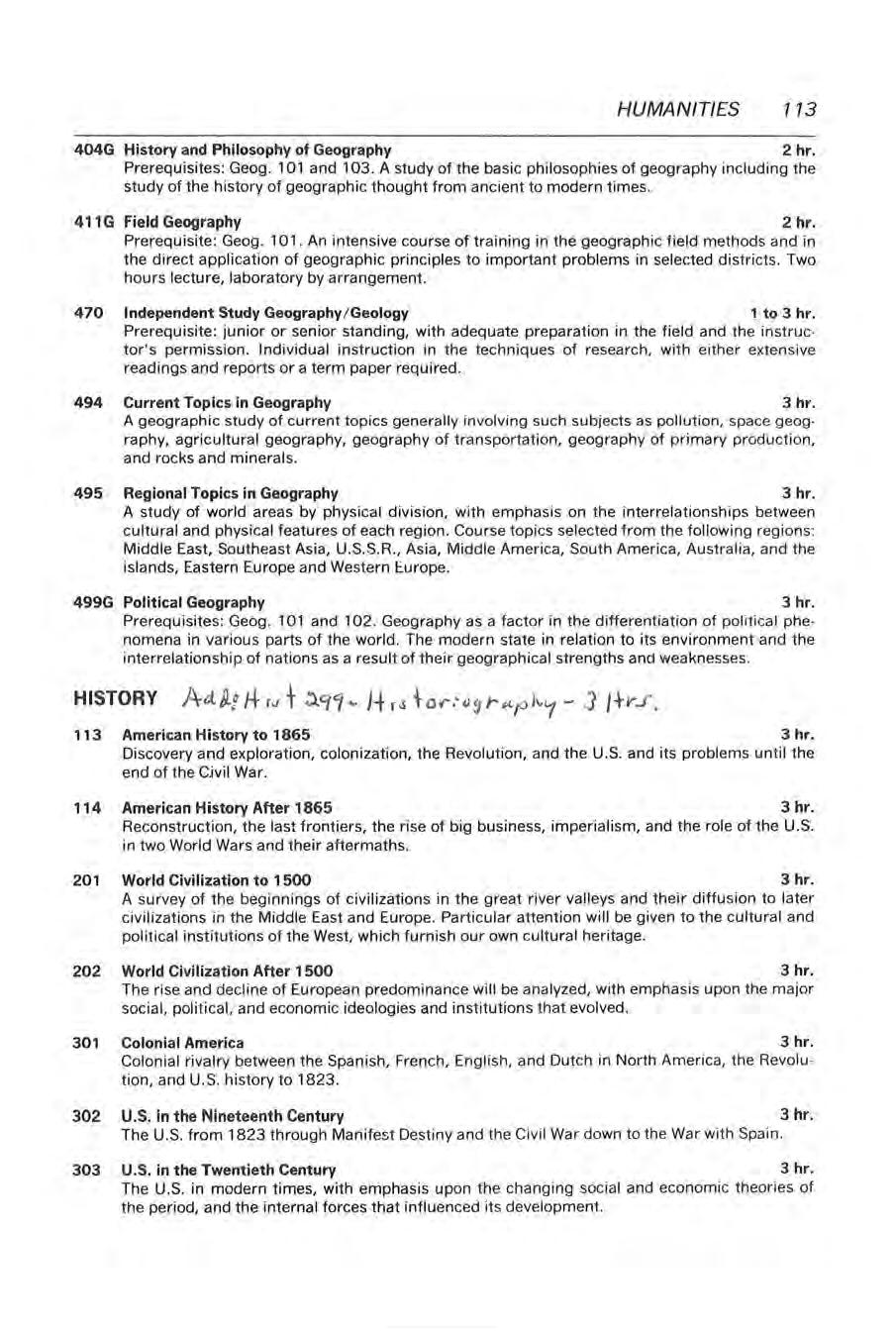
494 Current Topics in Geography
3 hr .
A geographic st udy of c urrent topics generally inv o lving suc h subjects as pollution, space geography, agricultural geography, geography of transportation, geography of primary production, and rocks and minerals.
495 Regional Topics in Geography
3 hr
A study of world areas by physical division, with emphasis on the interrelation ships between cultura l and physical features of each region. Course topics selected from the following regions : Middle East, Southeast Asia, U S S.R., Asia, Middle America, South America, Australia, and the islands, Eastern Europe and Western l:.urope.
499G Political Geography
3 hr.
Prerequisites: Geog. 101 and 102. Geography as a factor in the differentiation of political phenomena in variou s parts of the world. The modern state in relation to its environment and the int erre lationship of nations as a result of their geographical strengths and weaknesses
113 American History to 1865
3 hr. Discovery and exploration, colonization, the Revolution, and the U .S. and its problems until the end of the CJvil War.
114 American History After 1865
3 hr.
Reconstruction, the last frontiers, the rise of big business, imperialism, and the role of the U S. in two World Wars and their aftermaths.
201 World Civilization to 1500
3 hr .
A survey of the beginnings of civilizations in the great river valleys and their diffusion to later civilizations in the Middle East and Europe. Particular attention will be given to the cu ltur a l and political institutions of the West, which furnish o ur own c ultural h eritage.
202 World Civilization After 1500
3 hr.
Th e rise and decline of European predominance will be ana lyzed, with emphasis upon the major social, political, and econo mi c ideologies and institutions that evolved.
301 Colonial America
3 hr.
Colonial rivalry between the Spanish, French, English, and Dutch in North America, the Revolution, and U.S. history to 1823.
302 U.S. in the Nineteenth Century
Th e U S. from 1823 through Manifest Destiny and the Civil War down to the War with Spain.
303 U.S. in the Twentieth Century
3 hr.
3 hr.
The U .S in modern times, with em phasis upon the c hanging social and eco nomi c theories of the period, and the internal forces that influenced it s development.
329 History of Nebraska
2-3 hr.
A survey of t h e political, economic, social, and const ituti ona l deve lopment of Nebraska from pre hi stor ic times to the present
333 Latin America
3 hr.
The evo luti o n of the states of modern Lat in Am erica fol low in g their in dependence, their po liti ca l a nd eco n o mi c development a nd their in te rn a ti o n a l relations.
343 Eng li sh History from 1688
2 hr.
A survey of t h e social, pol iti ca l, and eco n om ic development of Eng land since the Glorious Revol utio n Covers the soc ia l an d religious impact on t he development of the English Parliamentary system, the effects of the Indu str ial Revolution upon the Brit i sh Empire, a nd t h e prospects of t he m odern welfare state on contemporary England
344 Soc ial and Cultu ral Europe 1500-1815
3 hr.
An historical description and ana ly si s of European soc iety and cu lture from t h e Renaissance to the Co n gress of Vi e nn a. Particular atte ntion w ill be g ive n to correlate the fine arts and lit erature to the ri se of national states, absolutism, and religious developments.
345 Modern Europe
3 hr.
A co mpar at ive historical a n a ly si s of th e ongoing process of m ode rni za tion in Eur ope. Emp h as is on movements and in stit uti ons su c h as Lib era li sm, Conservatism, Romanticism, Soc ia li sm, Imperialism, and Totalitarianism.
361 Non-Western C ivili zations
3 hr.
A broad survey of the Sov iet Union and of the pr in cipal areas of the Middle East, Asia, and Africa, w ith particular emp h as is on contemporary soc ia l, political and econom ic developments.
400 Methods in History and Socia l Science
2 hr. In struction in the methods of teach ing high schoo l history and socia l sc iences.
411G American Frontier
T h e importan ce of the frontier in American hi sto ry from colon ia l times to the 20th Century.
426G American Constitutional Law

3 hr.
3 hr.
Prerequi site: Pol. Sc i . 201 or 202 or in struc t or's permission . A st udy of the hi sto ri ca l and politica l context of the cases. Traces const ituti ona l doctr in e t h ro u gh major decisions Emphasis on const itut ional growth th at relates c lose ly to the fundamental structure of the Am e rican government and socia l order.
455 Twentieth Century Russia
3 hr.
An ana lysis of the soc ial and cu ltur al, po li t ica l, and economic evo luti on of Russia under the T sars through the Bolsh evik Revolution, and the format io n of the Sov iet Union to the prese nt.
467 The Far East
3 hr.
Concerned w ith polit ica l traditions and historical evo lu t io n s of the member states of th is area, the im pact of the West and its profound influen ces on po l itica l order, and the iss ues that come to t h e fore in t oday's revo l utionary and fluid situation.
470 Independent Study in History
1 to 3 hr.
Prerequisite: juni or or se ni or sta ndin g, with adeq u ate preparat i on in the field and in structor's permission. Individual in str u ction in the techniques of hi stor ical researc h , wit h e ither extens iv e readings and reports or a term paper requ i red Recommended for students co nt e mplating graduate work in history.
PHILOSOPHY tJ.' l: J.. '-U ~ 111 e,.,, r-e I fa,.,,._,,.,.;(- /+, d -;- J...,--f
201 Introduction to Philosophy
3 hr
An introduction to philosophy throug h se lected wr it in g from some of t h e outstand i ng phi losop h ers, class ica l and current. Lectures and c lass discuss ions on s u ch topics as et hi cs, philosophy of history, phi losophy of r e ligion, and metaphy sics.
d , ~~-! ~4<> -o,ct r-el(+-ii~t-J- • . d+'l-tl:+
300 Social Ethics
A study of morals and principles for judging human action and responsibility.
301 Philosophy and History of World Religions
3 hr.
3 hr.
Traces the historical origins and philosophies of the world's major religions and their developments .
201 American National Government
3 hr. The government of the United States, its origins, philosophy, aims and power s.
202 American State and Local Government
3 hr. The nature and extent of government of the state and local levels and its contributions t o the political life of the nation.
301 Comparative Government
3 hr. A co mparison and analysis of political systems and institutions of the major co untries
426G American Constitutional Law
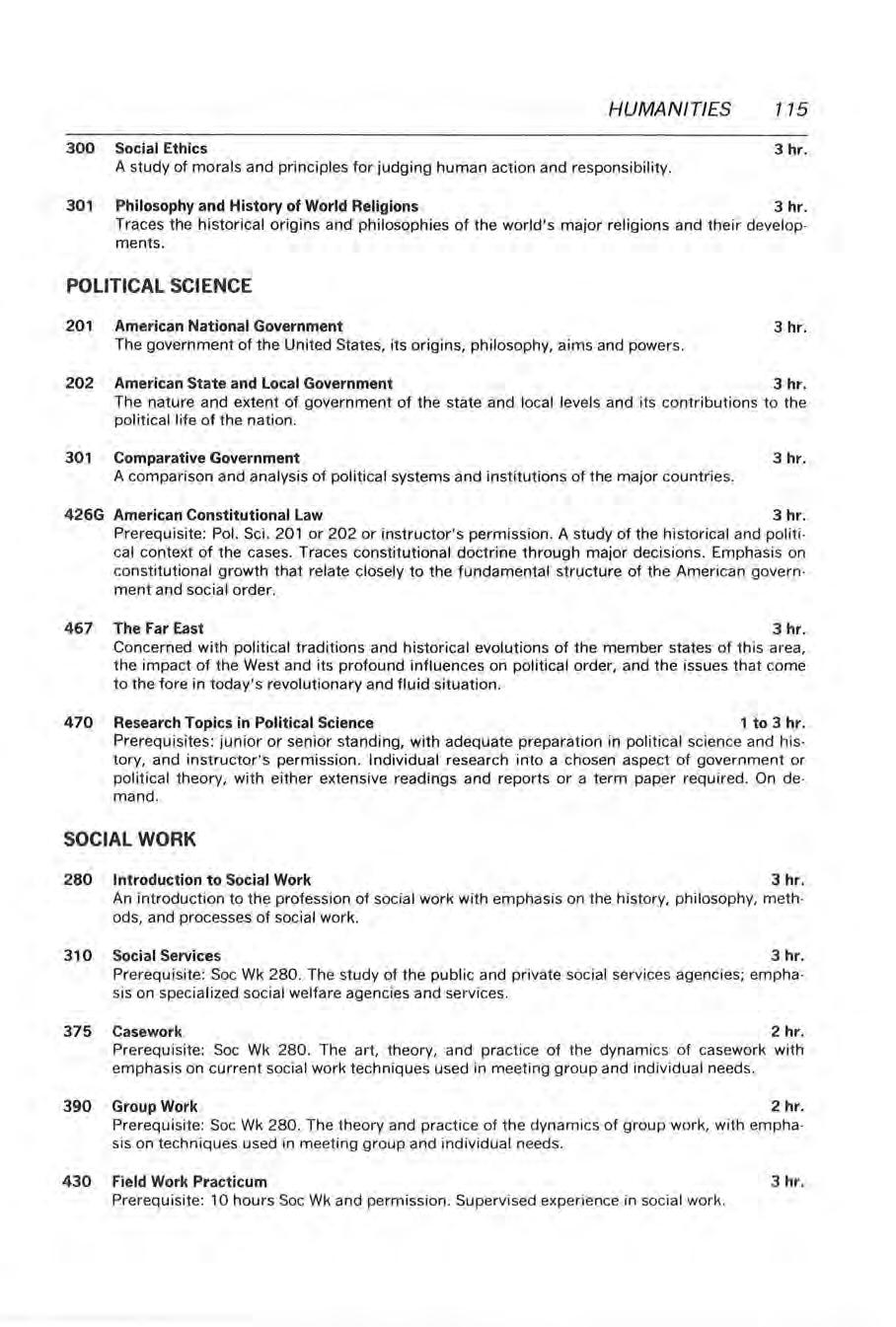
3 hr.
Prerequisite : Pol. Sci 201 or 202 or instructor's permiss io n A study of the historical and political context of the cases Traces constitutiona l doctrine through major decisions. Empha s i s on constitutional growth that relate c losely to the fundamental structure of the American government and soc ial order.
467 The Far East
3 hr.
Concerned with political traditions and historical evolutions of the member states of this area, the impact of the West and its profound influences on political order, and the issues that come to the fore in today's revo lution ary and fluid situation.
470 Research Topics in Political Science
1 to 3 hr.
Prerequisites : junior or senior standing, with adequate preparation in political science and history, and instructor's permission. Individual research into a chosen aspect of government or political theory, with either extensive readings and reports or a term paper requir ed. On demand
280 Introduction to Social Work
3 hr.
An introduction to the profession of social work with emphasis on the history, philosophy, methods, and processes of social work.
310 Social Services
3 hr
Prerequisite: Soc Wk 280. The st udy of the public and private soc ial services agencies; emphasis on specia li zed social welfare agencies and services.
375 Casework
2 hr.
Prerequisite: Soc Wk 280. The art, theory, and practi ce of the dynamic s of casework with emphasis on current soc ial work te c hniques used in meeting group and individual needs.
390 Group Work
2 hr.
Pr e requisite: Soc Wk 280. The theory and practice of th e dynamics of group work, with emphasis on techniques used in meeting group and individual needs.
430 Field Work Practicum
Prerequisite: 10 hours Soc Wk and permission
Supervised experience in soc ia l work.
3 hr.
100 Social Science
3 hr.
An integrated, interdisciplinary survey course in the socia l sciences designed to cover current topics from different social science per spec tives. The course wi ll be team -ta ught by the history and social science in structors.
201 Principles of Sociology
3 hr. Cu ltur e and its relations to specific social problems. The social institutions of American lif e in relation to population changes, ethnic groups and major problems of soc ial policy. The social consequences of social control in the metropolitan world
250 Community Organization
3 hr.
Prerequisite: Soc. 201 Major differentiating characteristics, with specia l emphasis on the urban community, basic patterns of social and eco logica l organization, and factors contributing to com munity integration and disorgani za tion
260 Rural Sociology
3 hr.
Prerequisite: Soc. 201. An examination of rural societies, rural background and characteristics; an analysis of rural groups, institutions and changes and problems of rural -urban relations.
300 Contemporary Social Problems
3 hr.
A seminar in which a student se lects a spec ifi c contemporary social issue for research and ana lysis. Research reports are presented to and discussed by the members of the seminar.
305 Social Psychology
3 hr.
Prerequisite: Soc 201. Analysis of processes involved in the interaction between person and group, including the dynamics of group influence on personal behavior and the impact of persona l variab les on the functioning of primary and secondary groups in contemporary society.
340 The Family
3 hr.
Prerequisite: Soc . 201. The role of the family in contemporary society, factors influencing trends in family structure, functions, roles, stability, and their implications for both the community a nd individuals at varying stages of the family life cycle.
360 Corrections & Preventions
3 hr. Theory and methods of dealing with crimina ls and juvenile delinquents; analysis of current correctional programs.
370 Ethnic-Group Relations
3 hr.
Prerequisite: Soc. 201. The nature of minority groups and their distribution in American society; and an exa mination of t he melting pot concept vs. the pluralistic society.
420 History and Introduction to Modern Sociological Theory
3 hr.
Pr e requisite : Soc. 201. and perm i ssion. An overview of the ear li er socio logical theorists and their contributions to current socio logical theories.
450 Methods of Sociological Research
3 hr.
Prerequisite: Soc 201. Analysis and app li cations of methods of socio logical research with emphasis on nonparametric statistics.
470 Independent Study in Sociology

1-3 hr .
Prerequisite: Soc 201 and p -nission. Topics to be chosen and investigated in consultation with individual instructor.
101 General Biology (Plant)
Two hours c lasswork. Two or three hours laboratory. A basi c course in botany.
102 General Biology (Animal)
Two hours classwork Two or three hours laboratory. A basic course in zoo logy
103 Care and Use of House Plants
Slipping, planting, car ing for, cutting, and arranging house plants
203 Invertebrate Zoology
3 hr.
3 hr.
1 hr.
3 hr.
Prerequisite: Biology 102. Two hours classwork and two to three hour s laboratory. Structure, c lassification, and relationship of the invertebrate a nim al s.
301 Microbiology
4 hr.
Prerequisite: Biology 101, Chemistry 101 and 102. Two hours classwork a nd four hours of lab• oratory per week. An introduction to microbiology.
304 Comparative Anatomy
3 hr.
Prerequisites : Biology 102 and 203 or permission Two hours c lass work and two to three hour s of laboratory per week The anatomy of the shark, sa lamander , and cat.
305 Human Anatomy
A study of the digestive tra cts, n ervous, circu latory, ske leta l, and respiratory systems.
306 Morphology of the Lower Plants
1 hr.
3 hr.
Prerequisit e: Biology 101 Two hours classwork, two to three hours laboratory. Structure, anatomy a nd form of the lower plants, and their effects on man.
307 Morphology of the Seed Plants
3 hr.
Prerequisites: Biology 101 and 306. Two hour s c lasswork, two to three hour s laboratory. Form a nd structure of the seed plants and th e ir econom ic value.
311 Evolutionary Theory
A course designed to acquaint the student with the various theories regarding evo lu tion.
404G Genetics
Prerequisite : 15 hour s of biology Three hours c lasswork. The principles of heredity
405G Histology
1-2 hr.
3 hr.
3 hr.
Prerequisite: 15 hours of biology . One hour c lasswork and at least four hours of lab oratory per week. A detailed study of the microscopic anatomy of mammalian organs
406G Embryo logy
3 hr
Prerequisite : 15 hour s of selected biology courses. Two hours c lasswork a nd three or more hours of laboratory. Embryology as exemp lified by the frog, the ch ick, the pig, and man.
407 Human Physiology

3 hr.
Prerequi site: At least two courses in animal biology. A detailed study of fun c tions of human organs.
408G Modern Biology
Three hours c lasswork and demonstrations. Prerequisite: 15 semester hours of biology
409 Plant Physiology
3 hr.
3 hr.
Study of the function and structure of the different living plant cells, their control mechanisms, and how they operate under the chemica l and physical laws .
417G Ecology
Three hours classwork. A study of organisms in relation to their environments.
450 Environmental Biology
3 hr
3 hr.
A study of the effects of population growth on the earth's resources and environment. An over-
ft 'te wof the needs of man to adapt to changes resulting from biotic and abiotic factors.
101 General Chemistry
4 hr.
Three hours classwork and two hours laboratory The fundamentals of chemistry Non-metals and their compounds. For those who have not had high school chemistry
102 General Chemistry
4 hr.
Prerequisite: Chemistry 101 Three hours classwork, two hours laboratory Application of the fundamentals of chemistry, metals, and their compounds, and an introduction to organic and analytical chemistry.
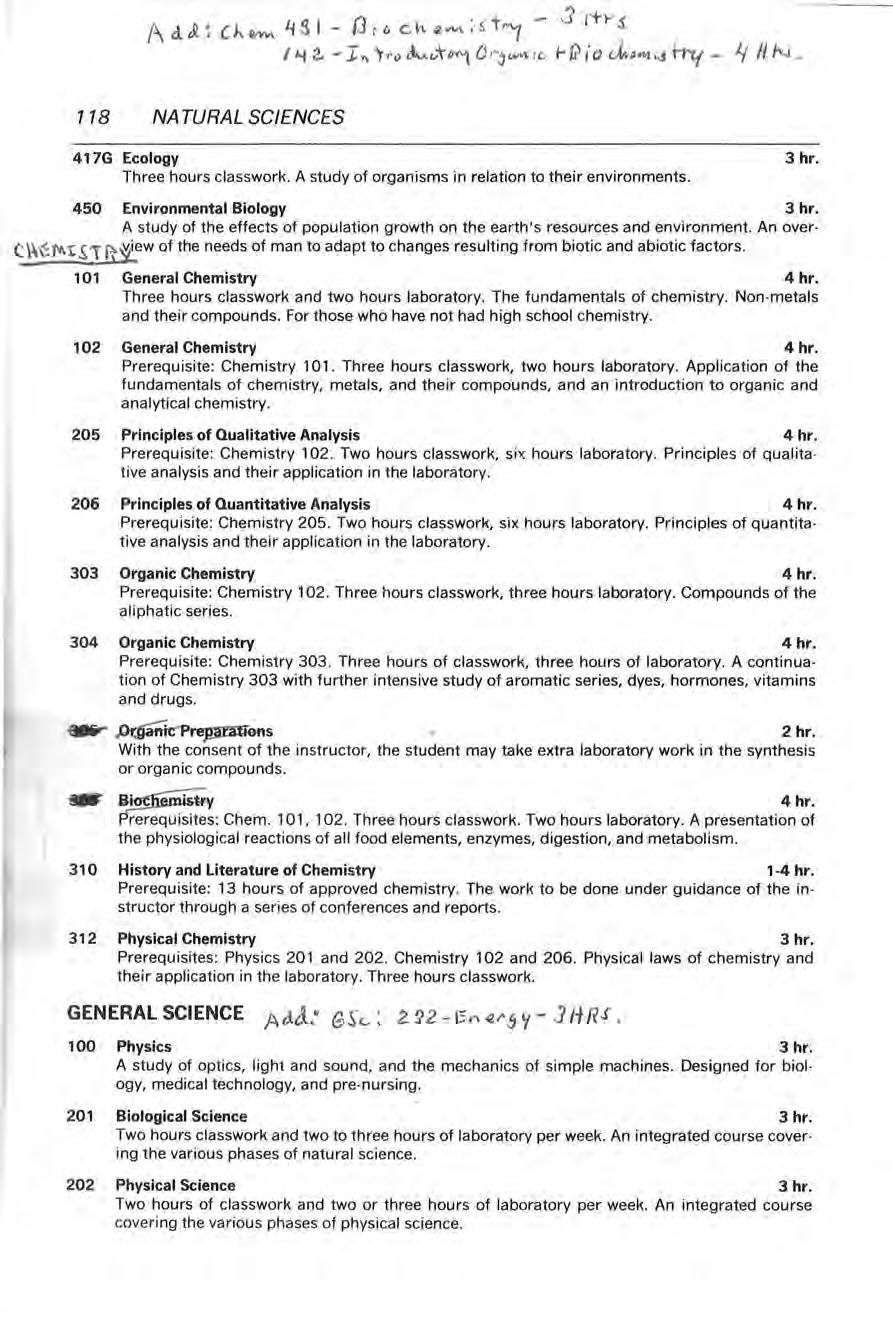
205 Principles of Qualitative Analysis
4 hr.
Prerequisite: Chemistry 102. Two hours classwork, six hours laboratory Principles of qualitative analysis and their application in the laboratory.
206 Principles of Quantitative Analysis
4 hr.
Prerequisite : Chemistry 205. Two hours classwork, six hours laboratory Principles of quantitative analysis and their application in the laboratory
303 Organic Chemistry
4 hr.
Prerequisite: Chemistry 102. Three hours classwork, three hours laboratory Compounds of the aliphatic series.
304 Organic Chemistry
4 hr.
Prerequisite : Chemistry 303. Three hours of classwork, three hours of laboratory A continuation of Chemistry 303 with further intensive study of aromatic series, dyes, hormones, vitamins and drugs.
~n!J!lffliens
2 hr. With the consent of the instructor, the student may take extra laboratory work in the synthesis or organic compounds
4hr.
~ uisites: Chem. 101, 102. Three hours classwork. Two hours laboratory. A pres entation of the physiological reactions of all food elements, enzymes, digestion, and metabolism
310 History and Literature of Chemistry
1-4 hr.
Prerequisite : 13 hours of approved chemistry. The work to be done under guidance of the instructor through a series of conferences and reports.
312 Physical Chemistry
3 hr.
Prerequisites : Physics 201 and 202. Chemistry 102 and 206. Physical laws of chemistry and their application in the laboratory. Three hours classwork
GENERAL SCIENCE Ad.J.: Gfo: ~2 - f;n ~".Sy- J /1R.!.
100 Physics
3 hr.
A study of optics, light and sound, and the mechanics of simple machines . Designed for biology, medical technology, and pre -nursing.
201 Biological Science
3 hr .
Two hours classwork and two to three hours of laboratory per week An integrated course covering the various phases of natural science.
202 Physical Science
3 hr.
Two hours of classwork and two or three hours of laboratory per week. An integ ra ted course cover ing the various phases of physical science.
205 The Principles of Biological Sciences
3 hr.
An integrated course specifica ll y designed for the non-science student, covering the various phases of man's biotic wor ld, by a variety of learning experiences in demonstrations, experimentation and visual aids. Does not apply on the major or support in bio logy
206 The Principles of Physical Science
3 hr.
An integrated course specifically designed for the non-science student, covering the various phases of man's physica l and chemical world Experiences in a variety of learning situations, such as demonstrations, experiments, instructional television, and other visual aids. Does not apply on the major or support in physical science
207 The Inquiry Science for Middle School Teachers
3 hr. Methods, techniques, and academic information employed by teachers in carrying out a lablearning situation in the middle school.
301 Earth Science
3 hr.
Prerequisite: Junior or senior standing, 6 hours of laboratory science. A course dealing with the physical aspects of our environment, including astronomy, c lim ato logy, meterology, geology, and oceanography.
421 Independent Study in General Science
1 hr.
Permit students to do advanced work in the various fields of science and math, thus promoting extensive individual study. Permission must be given by the instructor.
430G Environmental Science
3 hr.
A workshop designed to provide an understanding of the ecological problems of confronting modern man and proposed techniques for their solution.
115P 2hr.
Prerequis ite: 6 hours laboratory science. A study of energy resources. Attention wi ll be focused on both nuclear and conventiona l power stations, design, operation cost, governmental regu lations, safety and environmental effects. Field trips to nuclear and conventiona l generation stations required.

476 Methods of Teaching Science and Mathematics
2 hr. Objectives, content and methods of teachin9 science and mathematics in high school.
499G Aerospace Science
3 or 4 hr.
A workshop designed to provide an understanding of aerospace developments which are vital to our social, economic, and politica l environment. The fourth hour consists of ora l instruction, briefing, and dua l flight instruction.
201 Physical Geology
4 hr.
An introduction to the theories of the earth's origin, the study of the earth's structure and materials with special emphasis on rocks, minerals, and landforms. Two hours lecture, Four hours laboratory.
202 Rock and Minerals
1-3 hr.
An introductory course to the study of the physical properties of rocks and minerals; stressing field work at mineral and rock localities in S.E. Nebraska.
203 Introduction to Fossils
1-3 hr.
An introductory course to methods of Interpreting the fossil record; fossils as evidence of the history of life; evolution of form structure, mainly in the study of invertebrate species; through actual field work at fossil localities in S.E. Nebraska.
301 Historical Geology
4 hr.
Geological history of the earth and the evolution of its animal and plant inhabitants. Will include work at fossil localities in S.E. Nebraska, utilizing stratigraphic methods. Three lecture periods, one two -hour lab.
304 Meteorology and Climatology
3 hr.
The physica l factors influ encing the c lim ate with practical work in interpret ing metero log ica l records and forecasting. Two hours lecture, two h ours laboratory.
315 Physiography of the United States
4 hr.
Prerequi sites : Geog. 101 and 103. A regional study of landform prov in ces, with spec ial emp hasis on the re lati o n s hip between landforms, climate, so il s, vegetation, and min era l resources. Three hours lecture, two hour s laboratory
1O Elementary Descripti ve Statistics
1 hr .
Organization and representation of data. Normal distribution, measures of ce nt ra l te ndency, a nd variatio n Prerequisite: Non-mathematics major or minor.
20 Probability
1 hr.
Permutations, combi n at io n s, probability, odds, and games of chance. Prerequisite: Nonmathematics major or minor.
30 Logic and Sets
1 hr.
Stateme nts truth tables, con n ect iv es, symbo li c proofs, a nd relationship of logic and sets. Pr erequ i site: Non -mathematics major or minor.
40 Geometry
1 hr.
Prerequisite: Non-mathematics major or minor. The study of geometric concepts from an intuitive approach.
50 Practical Trigonometry
1 hr.
Prerequisite: Non -mathematics major or minor. Right tr iang le trigonometry, law of sines, law of cosines, and app li ed problems.
60 Surveying
1 hr.
Prerequ isite: Math 50 or equiva lent Fundamental t h eory and practice, use of transit, U.S Publi c Land Surveys and field off ice work. Will be counted toward a math major or minor.
70 Slide Rule and Logarithms
1 hr.
This course gives t he student skill in the use of th e s lid e ru le and logarithms. Recommended for science majors. Ca n be used on a math minor or m a jor.
80 Mathematics Appreciation
85
1 hr.
Prerequisite: Non-mathematics major or minor. A course of mathematical reaso nin g, sequences, functions, a nd graphs. Metric System
A study of the development, advantages, a nd use of the metr ic system
100 Business Mathematics
1 hr.
3 hr.
A review of the four fundame nt a l operations of arit hm etic app li ed to who le number s, fractio n s, and dec i ma ls; appl ications of percentage; co mputing interest and discounting notes; cons um er credit; cas h a nd trade d i sco un t; comput in g markup, r etai l and comm iss ion; marking goods; the arithmetic of payroll s.
101 College Algebra
3 hr.
Prerequis ite : one year of high school algebra For terminal stude nts or those who specifically need a lgebra in certa in pre-profe ss io n a l programs. Fundam e ntal a lgebraic principles a nd s ub sequence algebra ic processes. This course not to be taken for credit by students who h ave comp leted Math 105.
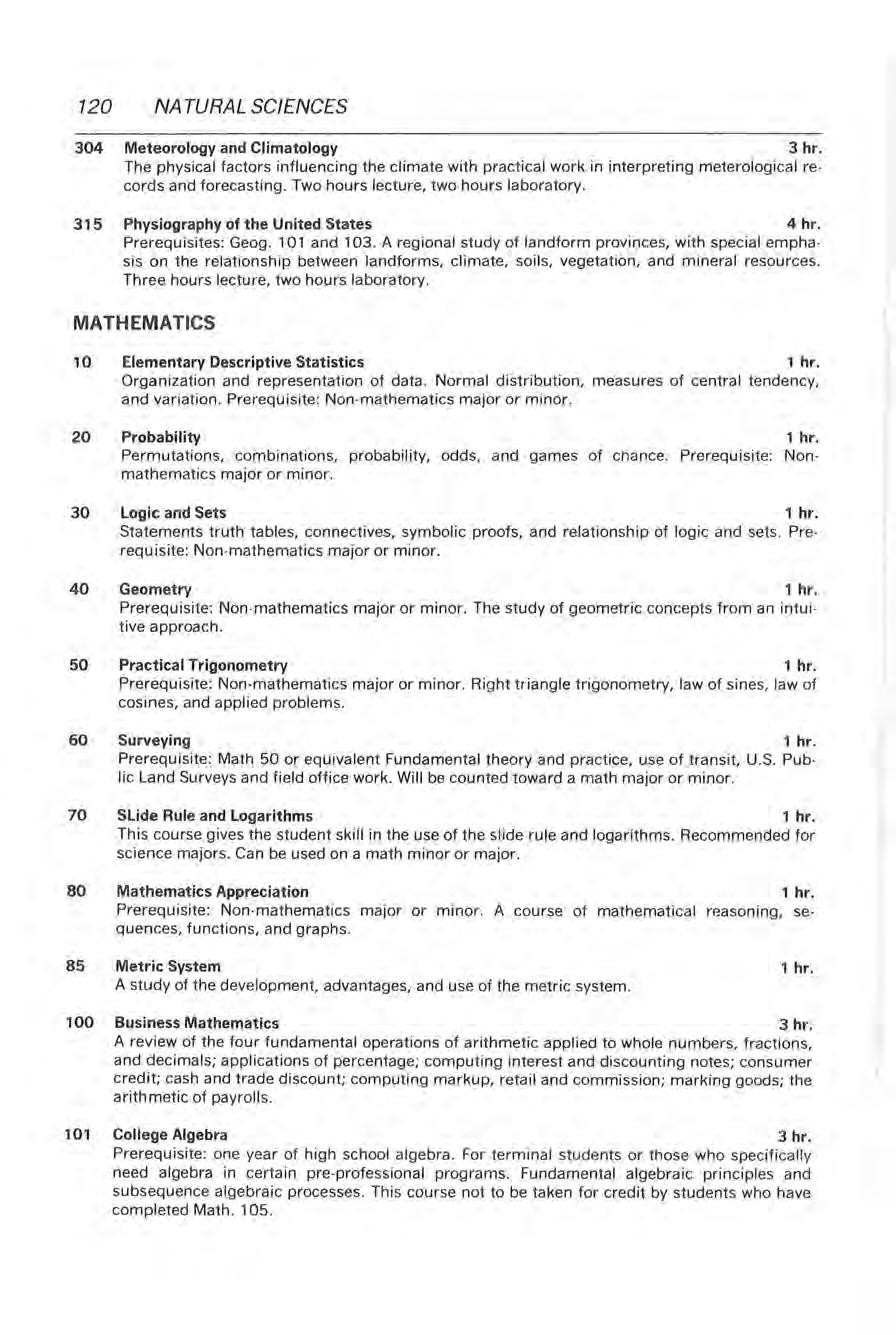
102 Introduction to Data Processing
3 hr.
An introduction to the concepts and basic features of e lectronic computers. An overview of the makeup of computer systems and of the structure and usage of computer languages is presented. FORTRAN IV is used to ill ustrate the course and give the student direct comput in g experience.
105 Precalculus Mathematics
5 hr
A course intended for the student who plans to pursue a college program requiring a substantial amount of training in mathematics. The content of this course includes an introduction to symbo li c logi c and set theory of applications, a study of the number system, elementary theory of groups and fields, an introduction to the function concert, and study of alg ebraic functions.
106 Precalculus Mathematics
5 hr.
Prerequisite : Math. 105. Content includes the study of trigonometric, exponential and logarithmic functions, and introduction to ana lyti c geometry, and some calculus.
200 Basic Concepts of Mathematics
3 hr.
An introduct ion to the various number bases and the development of concepts fundamental to each. Other topics included are: e lementary set theory, algebra, geometry, and problems related to the field of business; does not apply on the mathematics major.
204 FORTRAN Programming

3 hr.
Prerequisite: Math 102 or consent of in structor. The FORTRAN IV Language and its application to problem solv ing is discussed in detail. The student's work includes analyzing a problem and developing a program relative to this field of interest. Second semester.
300 Algebraic and Geometrical Concepts
3 hr.
Prerequis ite : Math 200 or permission. A course dealing with algebra ic and geometric! concepts. Specific topics include logic, sets, positive and negative numbers, equations and inequ a lities. Geometric phrases include measurements, space, plane, line and properties of such closed curves as the triangle, rectangle, and c ir cle, as well as other figures with their properties developed intuitiv ely; does not apply on the mathematics major
304 Modern Geometry
3 hr.
Prerequisite: 10 hours of mathematics. A course designed primarily to prepare mathematics teachers for dealing with a modern high school mathematics program. A point set approach to geometry.
309 Calculus with Analytic Geometry
5 hr.
Prerequisite: Math 105 and 106 or eq1J ivalent. The course includes the study of analytic geometry, functions, limits, continuity, velocity, differentiation, inverse of differentiation, second derivatives, maxima and minima, as well as other related topics
310 Calculus with Analytic Geometry
5 hr.
Prerequisite: Math. 309 or equivalent. Topics include trigonometric functions, antiderivaties, the definite integral, three-dimensional figures, integration, polar coordinates, and related topics .
312 Calculus Ill
3 hr.
Prerequ isite s: Math. 309 and 31 0 or equivalent. Designed to give the student a review of calculus and applying it for complex problems in mathematics.
340 Statistics
3 hr.
A study of the methods of summarizing and interpreting data, elementary probability, and its relation to distributions. The meanings, importance, and applications of the normal and binomical distributions. The methods of random sampling, testing of hypotheses, analysis of paired data, and interpretation of standardized test scores.
406 Modern Algebra
3 hr.
Prerequisites: Math. 105, 106, 309 and 31 0 or equ ivale nt A study of various algebraic systems ar i sing in modern mathematical computat ion s. Contro l includes a study of sets, mappings and operations, re lations, development of rea l numbers systems, integral domains and fields, polynom ial domains, and comp lex number field .
407 Modern Algebra
3 hr.
Cont inu ation of Math. 406. A study of groups, vector spaces, lin ear transformations and matrices, linear equat ion s and determinants, lin ear algebras, rings and Boolean algebras.
416 Differential Equations
3 hr .
Formation of differential equations, equations of high order, lin ear equat ion with constant and variable co-efficients, partial differentiation, app li cat ion of geometry, mechanics, and physics. Students must have proficiency in ca lculus
417G Introduction to Real Analysis
3 hr.
Prerequisite: Math. 310. Topics included are number, limits, convergence, conti nuity differentiabi lity, the Reimann integral, sequences, series, and specia l functions of the Real Calculus.
418G Linear Algebra
3 hr .
The theory of lin ear transformations in vector spaces, the representation of linear spaces in matrices, lin ear functionals, and the app li cat ion of these concepts.
419G Topology
3 hr.
A modern treatment of topology with emphasis on fundamental concepts and principal results of homology theory, topological spaces, lin ear graphs, set theory, metric interpretation, as well as other related topics.
201 General Physics
4 hr.
Prerequisite: Mathematics 105 Three hours classwork, two hours laboratory Mechanics, sound, and heat.
202 General Physics
4 hr.
Prerequisite: Physics 201 or permission. Three hours c lasswork, two hour laboratory. Light, electr icity, and magnetism.
302 Analytical Mechanics
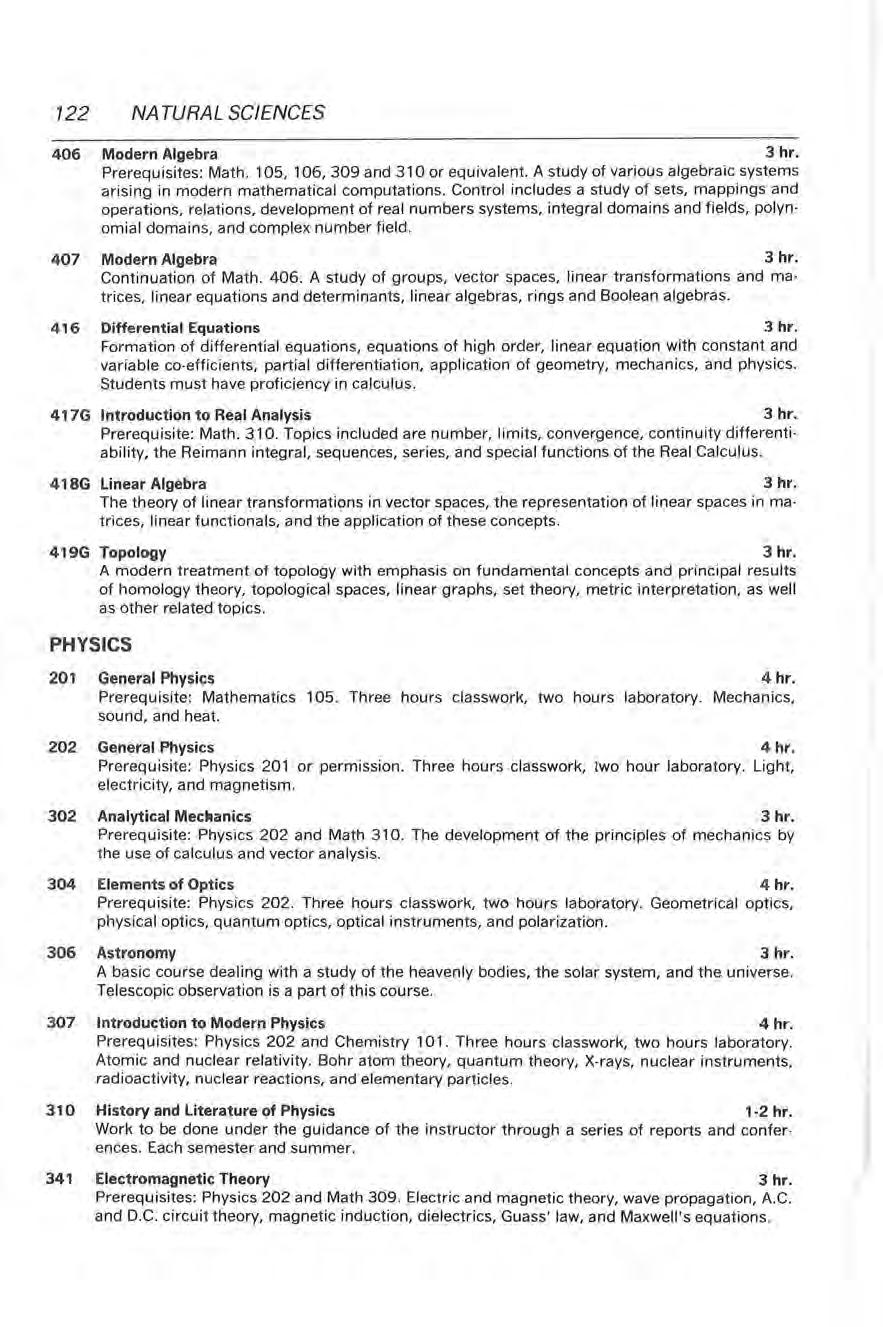
3 hr.
Prerequisite: Physics 202 and Math 310. The development of the principles of mechanics by the use of ca lcu lu s and vector analysis.
304 Elements of Optics
4 hr.
Prerequisite: Physics 202. Three hours c lasswork, two hours laboratory. Geometrical optics, physical optics, quantum optics, optical instruments, and polarization.
306 Astronomy 3 hr.
A basic course dealing with a study of the heavenly bodies, the solar system, and the universe. Telescopic observation is a part of this course.
307 Introduction to Modern Physics
4 hr.
Prerequisites : Physics 202 and Chemistry 101. Three hours classwork, two hours laboratory. Atomic and nuclear relativity. Bohr atom theory, quantum theory, X-rays, nuclear instruments, radioactivity, nuc lear reactions, and elementary particles.
310 History and Literature of Physics
1-2 hr. Work to be done under the guidance of the instructor through a series of reports and conferences. Each semester and summer.
341 Electromagnetic Theory 3 hr.
Prerequisites: Physics 202 and Math 309. Electric and magnetic theory, wave propagation, A.G. and D C. circuit theory, magnetic induction, dielectrics, Guass' law, and Maxwell's equat ions.
400 Thermodynamics
3 hr.
Prerequisites: 15 hours of physics and Math 310. A study of temperature and thermometry, the laws of thermodynamics and their applications, and an introdu ct ion to kinetic theory.

ART
101 Drawing I
A study of basic drawing techniques using a var iety of drawing media.
102 Drawing II
3 hr.
3 hr.
Prerequisite: Art 101. Continuation of Drawing I with emph a sis on figure drawing and improving of techniques.
111 Lettering
3 hr.
Sing le stroke. Gothic Roman and manuscript alphabets, poster design, and co mm erc ial techniques.
203 Design I
A study of two -dimensional design with emphasis on color theory
204 Design II
A study of three dimensional design using a vari ety of media.
210 Water Color Painting
3 hr
3 hr .
3 hr.
Prerequisites : Art 101, 102, 203 Compositions in color, using opaque, and transparent water co lor
221 Printing Processes
3 hr
History of the graph ic arts of block printing, etching, lithography, and silk screen print ing Reading on the techniques of each process, followed by the making of prints in three or more of the methods.
300 Ceramics
3 hr.
Experiences in hand built and thrown projects Includes a basic study of glaze preparation and c lay ana ly sis
305 Methods and Supervision
2 hr.
Prerequisites : Art 101, 103, and 203 or 204. Study of relation of art education to other school subjects; and contemporary art educat ion teaching techniques, lesson plans , teaching experiences, and the ordering of materials. Emphas i s is also p laced upon the use of materials in the schoo l art program.

306 Art Appreciation
2 hr.
Planned to give some standards of measurement for art. Study of art princip les in connection w ith crafts, painting, sculpture, and architecture.
308 Art Explora tion
A study of the purpose of art education in the elementary school program The student is presented with a survey of the history and philosophy of art in the elementary sc hool, and becomes actively involved in art activities designed for the elementary school classroom.
310 Sculpture
3 hr.
Prerequisit es: Art 203 and 300 . Experiences in three dimensional form using a variety of materials such as clay, wood, and stone
311 Painting I
3 hr .
Prerequisites: Art 101, 203. A study of techniques and media used in painting. Studio activities are dev e lop ed from student research in at least three styles of painting Media emphasized are acrylic and / or oil.
312 Painting II 3 hr.
Prerequisite: Art 311. Continuation of Painting I with emphasis on development of a personal style.
313 Mural Painting 3 hr.
Study of the history and procedures used in mural production Group projects in the execution of murals
317 Art History I 3 hr.
A study of painting, sculpture, and architecture from ancient times to the Renaissance.
318 ArtHistoryll 3hr.
A study of art in the West since the Renaissance.
319 Midwestern Museums of Art 3 hr.
A survey of some of the major museums in the midwest, including field trips designed to promote on -site analysis of art collections.
400 Studio Activities
1-6 hr
Prerequisite: Consent of instructor Suggested for advanced art students wanting to gain additional competence in a particular area The student may choose to do additional work in his area of interest.
19 Chorus
1 hr
Open to all college students with consent of the instructor. Performance and study of representative choral works of all periods.
21A Band
1 hr. (Fall Semester) This organization is primarily a marching band. It functions at Pep Rallies, Parades, and Football Games during the fall semester The General Studies P.E. Activity Requirement can be fulfilled by participating in Mus 21 A. 4 hours attendance
21 B Band 1 hr.
This organization is primarily a Concert Band During the semester concerts are presented both on and off campus. 3 hours attendance.
28
Choral Ensemble
A select membership for the study and performance of choral works for small groups.
1 hr.
29 Instrumental Ensembles 1 hr. (Brass Choir) A select membership for the study and performance of brass compositions for small emsemble. 1 hr. (Woodwind Choir) A select membership for the study and performance of woodwind compositions for small ensemble 1 hr. (Stage and Pep Band) This organization functions primarily as a pep band and for the performance and study of popular music.

100 Fundamentals and Elementary Music Materials 3 hr.
The rudiments of music, including letter and syllable names of notes, time values of notes and rest, time, and key signatures, chromatic, intervals, chords, keyboard experience, and the writing of original melodies . Study of children's musical literature and of their tonal and rhythmic problems.
101 Theory 5 hr.
An integrated course which includes scales, intervals, harmonic progressions, modality, modulation, seventh chords, figured bass, ear training, and sight singing.
102 Theory 5 hr .
Prerequisite: Theory 101. Irregular resolution, diminished sevenths, secondary dominants, ninth, eleventh and thirteenth chords, altered chords, chromatic harmony, and creative work
and sty le s in music and their application, including two and three part eighteenth century style, descant and invention . 308 Keyboard, Vocal or Instrumental Pedagogy
hr.
exper ience in teaching applied music to the individual for piano, voice, or instruments. (May be repeated.) 309 Introduction to Music Therapy
hr. An orientation course presenting a survey of effect ive therapeutic uses of the elements of music
311 Music Appreciation and History of Music
hr. Various forms and styles of music, ranging from folk songs to opera, oratorio and symphony, analyzed and discussed through the use of records. 313 Music for Recreation
hr. Practical guide for the planning and execution of music programs for community recreation, camping, correctional and clinical institutions, sen ior citizens, industry and the armed services.
320 Piano, Voice, Woodwind, Brass, String, Percussion, and Organ Instrument study on the junior level. (May be repeated.)
400 Vocal or Instrument Practicum
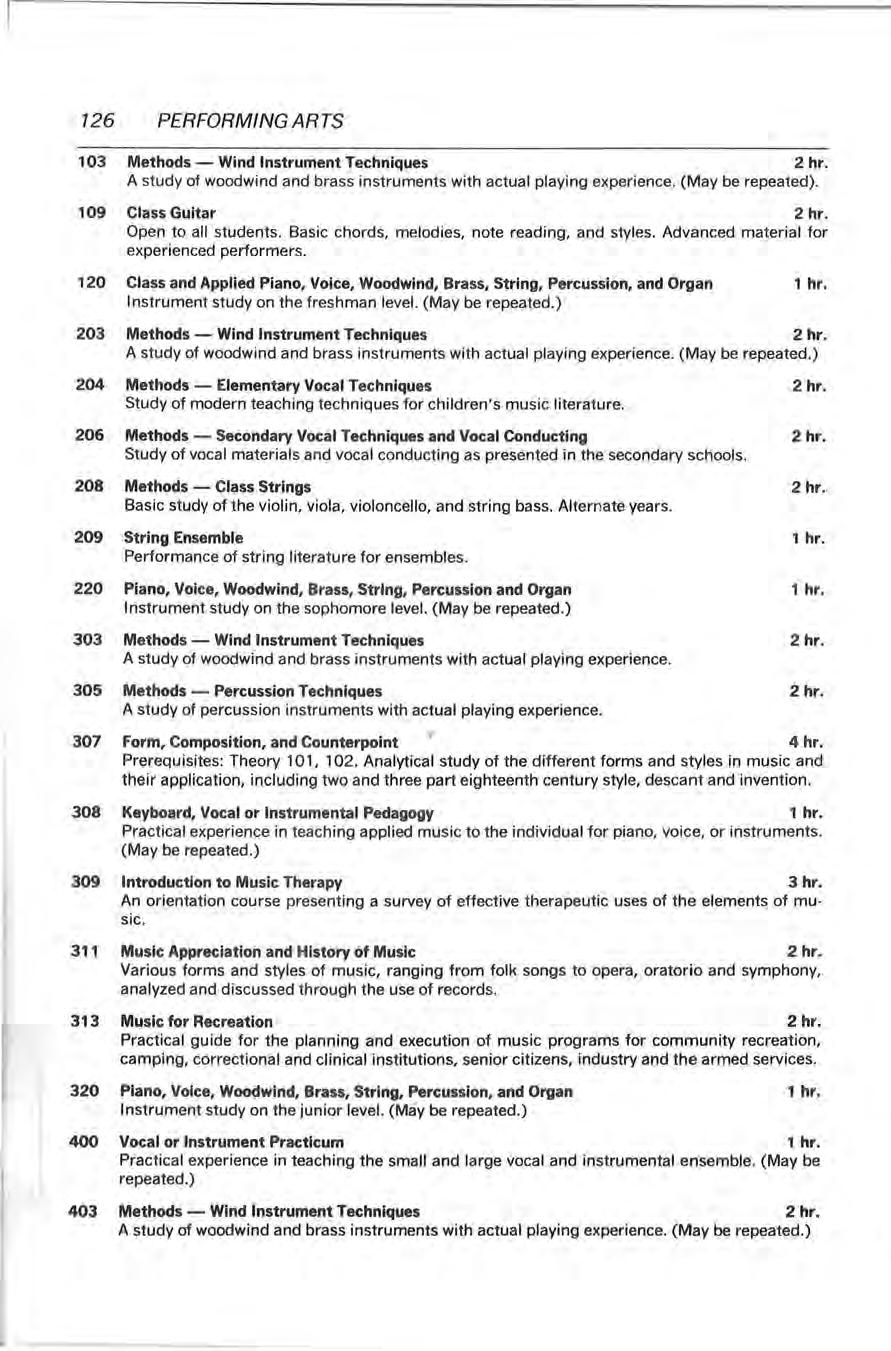
hr.
hr.
experience in teaching the small and large vocal and in strumental ensemble (May be repeated.)
403 Methods - Wind Instrument Techniques
hr.
study of woodwind and brass instruments with actual playing experience (May be repeated.)
404 Conducting
2 hr.
Knowledge of baton techniqu e, reading and interpretation of a musical score and the presentation of techniques in rehearing instrumental organizations.
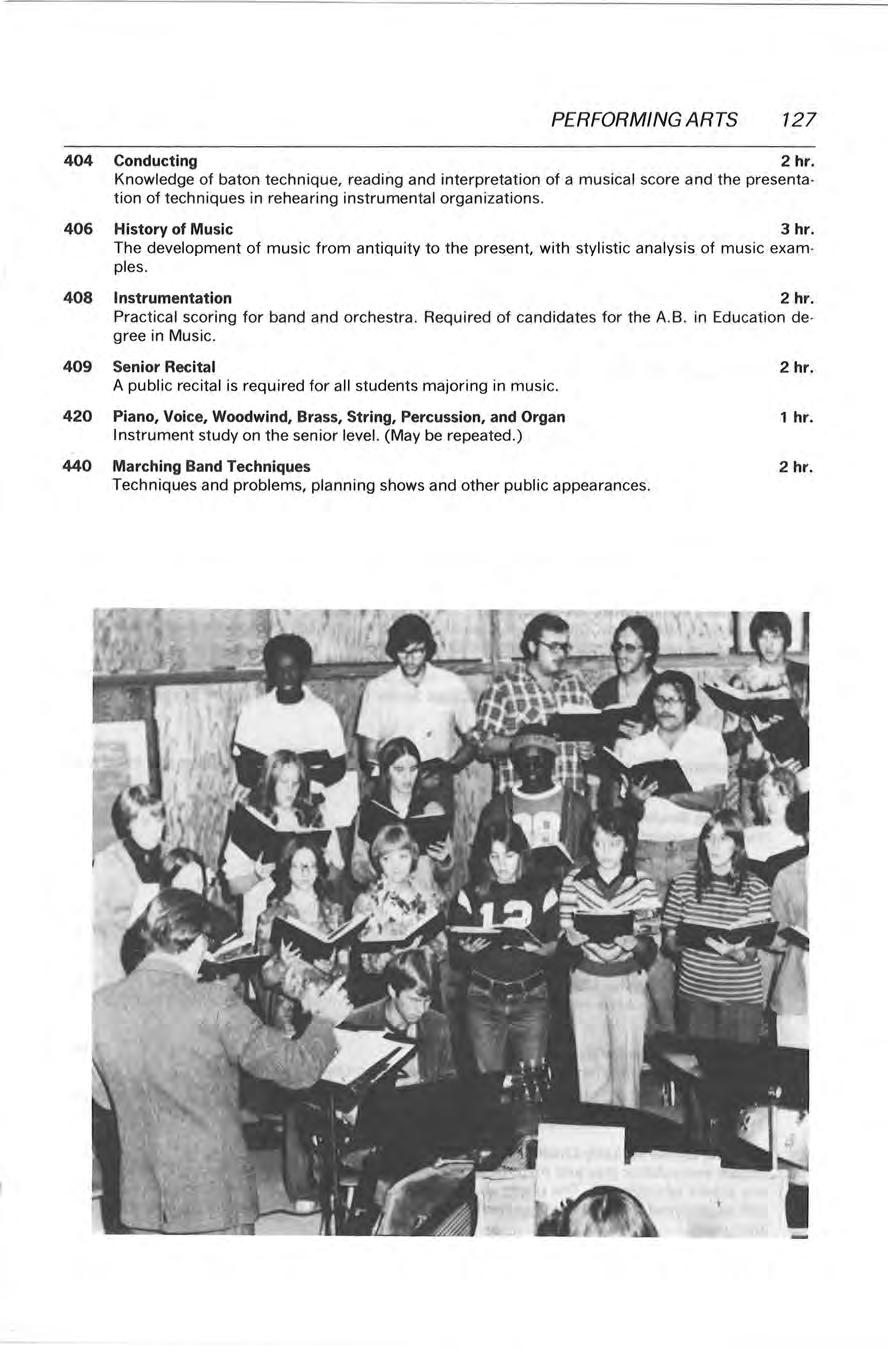
406 History of Music
3 hr .
The development of music from antiquity to the present, with stylistic analysis of music examples.
408 Instrumentation
2 hr.
Practical scoring for band and orchestra. Required of candidates for the A.B. in Education degree in Music
409 Senior Recital
A public recital is required for all students majoring in music.
420 Piano, Voice, Woodwind, Brass, String, Percussion, and Organ Instrument study on the senior level. (May b e repeated.)
440 Marching Band Techniques
2 hr.
hr.
A maximum of four credits of varsity sports may be included to meet the 125 semester hours of course credit required for degree purposes.

Scope of the field of physical education and its relat ion to modern educational theory; history, principles of physical education furnished by the basic sciences, and the philosophies of physica l education .

Three hours attendance In struction in tumbling, trampoline, mini-trampoline, side horse, vaulting box, high bar, parallel bar, and balancing . Uniform required.
A study of the function and care of the human body in health and disease, and the harmful effects of stimulants and narcotics.
308b Principles of Officiating Spring Sports
2 hr. Two hours class attendance, two hours of lab Officiating techniques in baseball, softball, track and field. Study of rules.
309 Organization and Administration of Programs in Physical Education and Recreation
2 hr. Consideration of general principles of administrative techniques and responsibilities and related to fields of Physical Education and Recreation
310 Physical Education in the Primary Grades
2 hr.
The selection and organization of materials and techniques of instruction for the primary grades.
311 Physical Education In the Intermediate Grades
2 hr.
The selection and organization of materials and techniques of instruction in the intermediate grades.
312 Kinesiology and Anatomy
3 hr. Study of bones, body movements, muscle action and joint mechanics in relation to P.E. activities; co mmon postural defects and joint injuries.
320 Special Methods in Physical Education
2 hr.
Prerequisite: Junior standing. An analysis of the techniques used today in the teaching of health and physical education
350 Independent Study in Physical Education
1 to 3 hr.
An in-depth study of an issue selected by the student. Must be approved by department chairman.
360 Physiology of Exercise
3 hr.
A working understanding of how exercise effects the different systems of the body Three hours class attendance.
400 Advanced Techniques in Physical Education for Men I
1 hr.
Prerequisite : P E 216. Required of all men with areas of concentration in Physical Education. A practicum involving laboratory experien es in P.E. 101
401 Advanced Techniques in Physical Education for Men II
1 hr.
Prerequisite: P.E . 217 . Required of all men with areas of concentration in Physical Education. A practicum involving laboratory experiences in P.E. 102.
402 Advanced Techniques in Physical Education Women I
1 hr.
Prerequisite : P E 218. Required of all women with majors in Physical Education. A practicum involving laboratory experiences in P.E. 103 .
403 Advanced Techniques in Physical Education for Women II
1 hr.
Prerequisite : P.E 219 Required of all women with majors in Physical Education. A practicum involving laboratory experiences in P.E. 104
410 Health Programs
2 hr.
Required for area of concentration in Physical Education Prerequisite: P.E 205 A study of the structure and functions of the various health agencies at the national, state, and local levels.
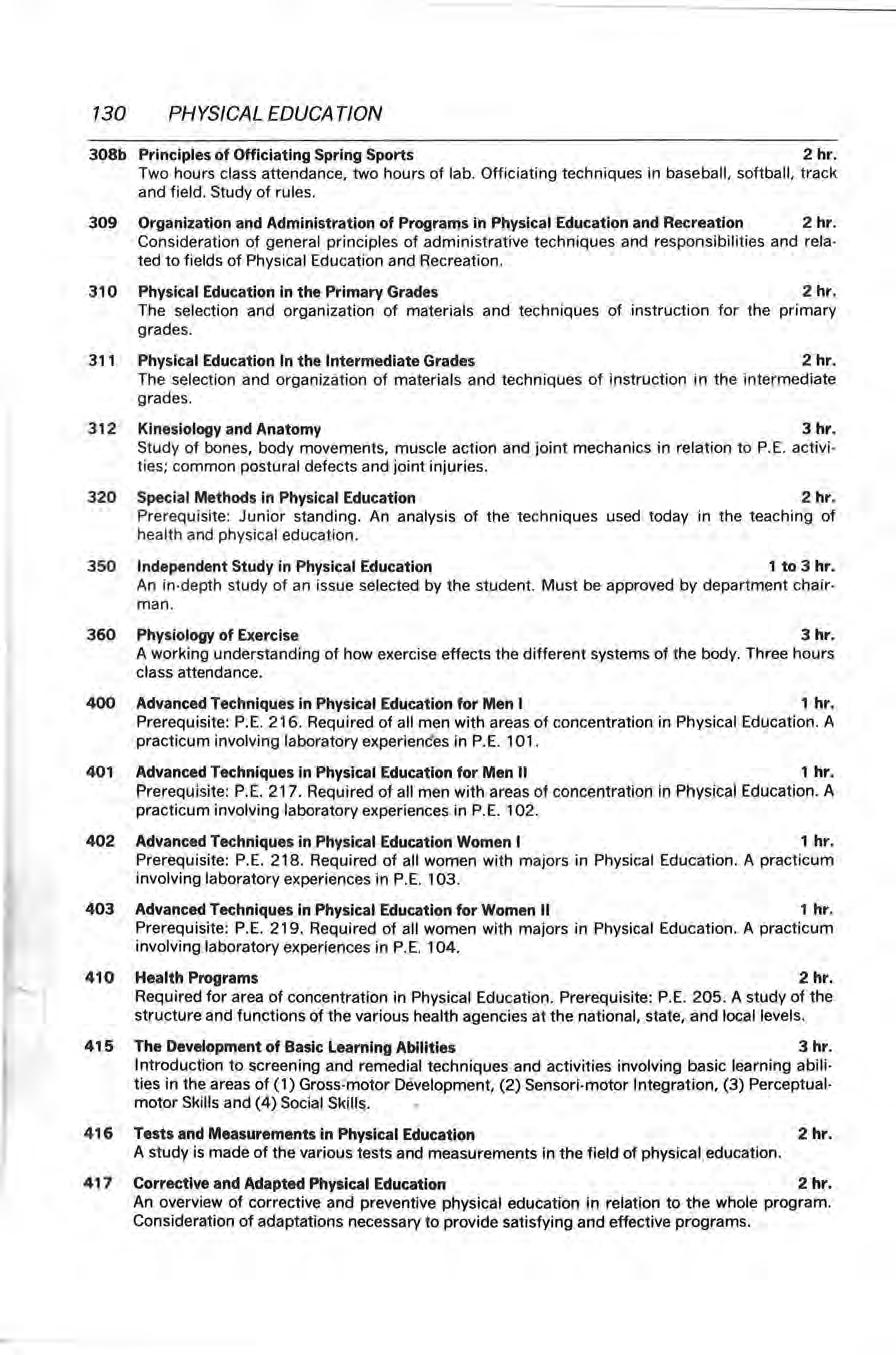
415 The Development of Basic Learning Abilities
3 hr.
Introduction to screening and remedial techniques and activities involving basic learning abilities in the areas of (1) Gross -motor Development, (2) Sensori-motor Integration, (3) Perceptualmotor Skills and (4) Social Skill~.
416 Tests and Measurements in Physical Education
A study is made of the various tests and measurements in the field of physical education.
417 Corrective and Adapted Physical Education
2 hr.
2 hr. An overview of corrective and preventive physical education in relation to the whole program. Consideration of adaptations necessary to provide satisfying and effective programs.
418 Administration of lnterschool Athletics
2 hr. Includes a history of the development of athletic programs, a study of various national and state athletic organizations, the role of athletics in education, and the responsibilities of the athletic director.
C.i,i11g P,~ricum
1-3 hr.
On-site coac mg experience on the junior high school level. Participants are involved in assisting in coaching areas compatible to their interests and expertise. They are to be under the guidance of the regular employee of the school system who is designated head coach for that sport . Practicum participants will be required to participate in daily practice sessions and on scheduled game dates for the duration of the particular season
Each head coach, as supervisor, will submit to the Division of Physical Education a Final Report of the Practicum on each student. This report will be a checklist with a narrative section to finalize the school system report on each practicum student Prerequisite: Senior status with coaching block.

425 Current Problems in Physical Education
1 hr. Discussion and reporting of current issues in the area of physical education.
220 Recreation Leadership
3 hr. History, theory, and philosophy of recreation. Practical Techniques of leadership for low organization activities.
308 Recreational Swimming
1 hr.
A course designed to provide students with a background of activities and games, which could be utilized in recreational programs.
319 Programs in Recreation
3 hr. A principles course to encompass industrial, social, youth organizations and community recreation.
322 Outdoor Recreation and Camping
3 hr
This course investigates all aspects of outdoor recreation . Camping theory and experience in a camping situation are a part of this course.
405 Seminar
1 hr. Special assignments made by the instructor relative to new areas in recreation .
406 Recreation Research
1-3 hr. Prerequisite: P.E. 405. Investigation of legal, financial, personnel, public relations, political, and philosophical problems of management of federal, state, and local government agencies in the field of recreation.
460 Recreation Internship
6-8 hr. Prerequisites: all required Rec. courses. A practical application of the principles of recreation. The internship will be offered during the summer. Students will be placed in public or industrial recreation programs to work with leaders, directors, and supervisors in the field.


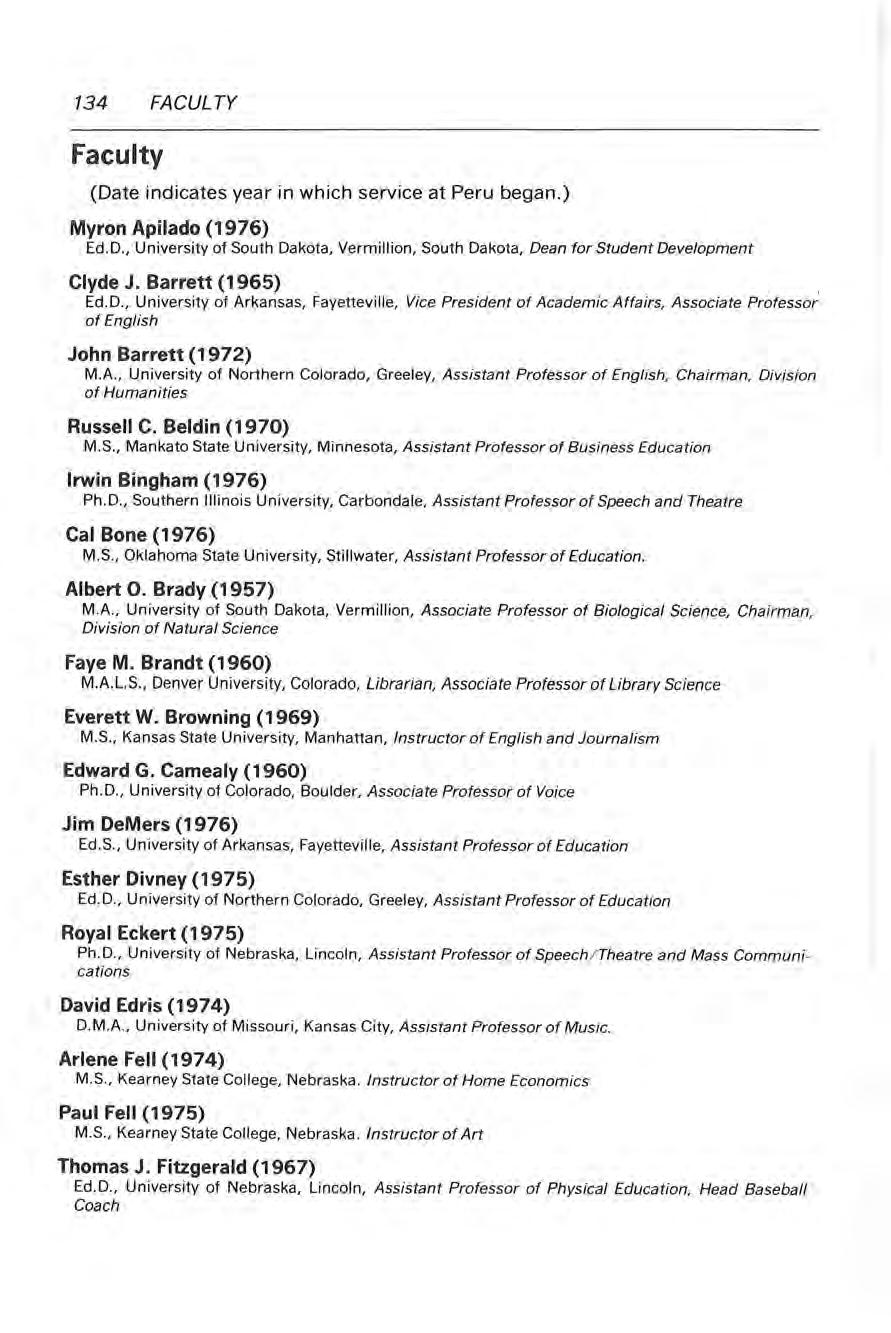
(Date indicates year in which service at Peru began.)
Myron Apilado (1976)
Ed.D , University of South Dakota, Vermillion, South Dakota, Dean for Student Development
Clyde J. Barrett (1965)
Ed.D., University of Arkansas, Fayetteville, Vice President of Academic Affairs, Associate Professor of English
John Barrett (1972)
M A., University of Northern Colorado, Greeley, Assistant Professor of English, Chairman, Division of Humanities
Russell C. Beldin (1970)
M S., Mankato State University, Minnesota, Assistant Professor of Business Education
Irwin Bingham (1976)
Ph D., Southern Illinois University, Carbondale, Assistant Professor of Speech and Theatre
Cal Bone (1976)
M S., Oklahoma State University, Stillwater, Assistant Professor of Education.
Albert 0. Brady (1957)
M.A., University of South Dakota, Vermillion, Associate Professor of Biological Science, Chairman, Division of Natural Science
Faye M. Brandt (1960)
M.A L.S., Denver University, Colorado, Librarian, Associate Professor of Library Science
Everett W. Browning (1969)
M.S., Kansas State University, Manhattan, Instructor of English and Journalism
Edward G. Camealy (1960)
Ph.D., University of Colorado, Boulder, Associate Professor of Voice
Jim DeMers (1976)
Ed.S., University of Arkansas, Fayetteville, Assistant Professor of Education
Esther Divney (1975)
Ed.D., University of Northern Colorado, Greeley, Assistant Professor of Education
Royal Eckert (1975)
Ph.D., University of Nebraska, Lincoln , Assistant Professor of Speech / Theatre and Mass Communications
David Edris (1974)
D. M A., University of Missouri, Kansas City, Assistant Professor of Music
Arlene Fell (1974)
M.S., Kearney State College, Nebraska. Instructor of Home Economics
Paul Fell (1975)
M.S., Kearney State College, Nebraska. Instructor of Art
Thomas J. Fitzgerald (1967)
Ed.D., University of Nebraska, Lincoln, Assistant Professor of Physical Education, Head Baseball Coach
Roger A. Flanders (1976)
B.G S., University of Nebraska at Omaha, Director of Public :ntormation
Pamela Gere (1976)
M.A ., University of Illinois , Urbana, Instructor of Music
Patricia A. Gilbert (1976)
M A., University of Northern Iowa, Cedar Falls, Instructor of Physical Education
Ruth A. Gottula (1976)
B.S ., Peru State College, Nebraska, Assistant Director of Admissions
Kenneth T. Gress (1969)
B A., Peru State College, Neb raska , Business Office Manager
Richard Gulizia (1974)
Ed D , University of Nebraska , Lincoln, Assistant Professor of Education.
John Hahn (1968)
M A. , University of Minnesota, Minneapolis, Associate Professor of Political Science
Fredrick Hamann (1973)
M S., Fort Hays Kansas State University, Hays, Assistant Professor of Science
Jack Hamilton (1972)
M.S., Pittsburg State University , Kansas, Assistant Professor of Business Education
Wreathea Hicks (1968)
M A., Emporia Kansas State University, Emporia, Assistant Professor of English
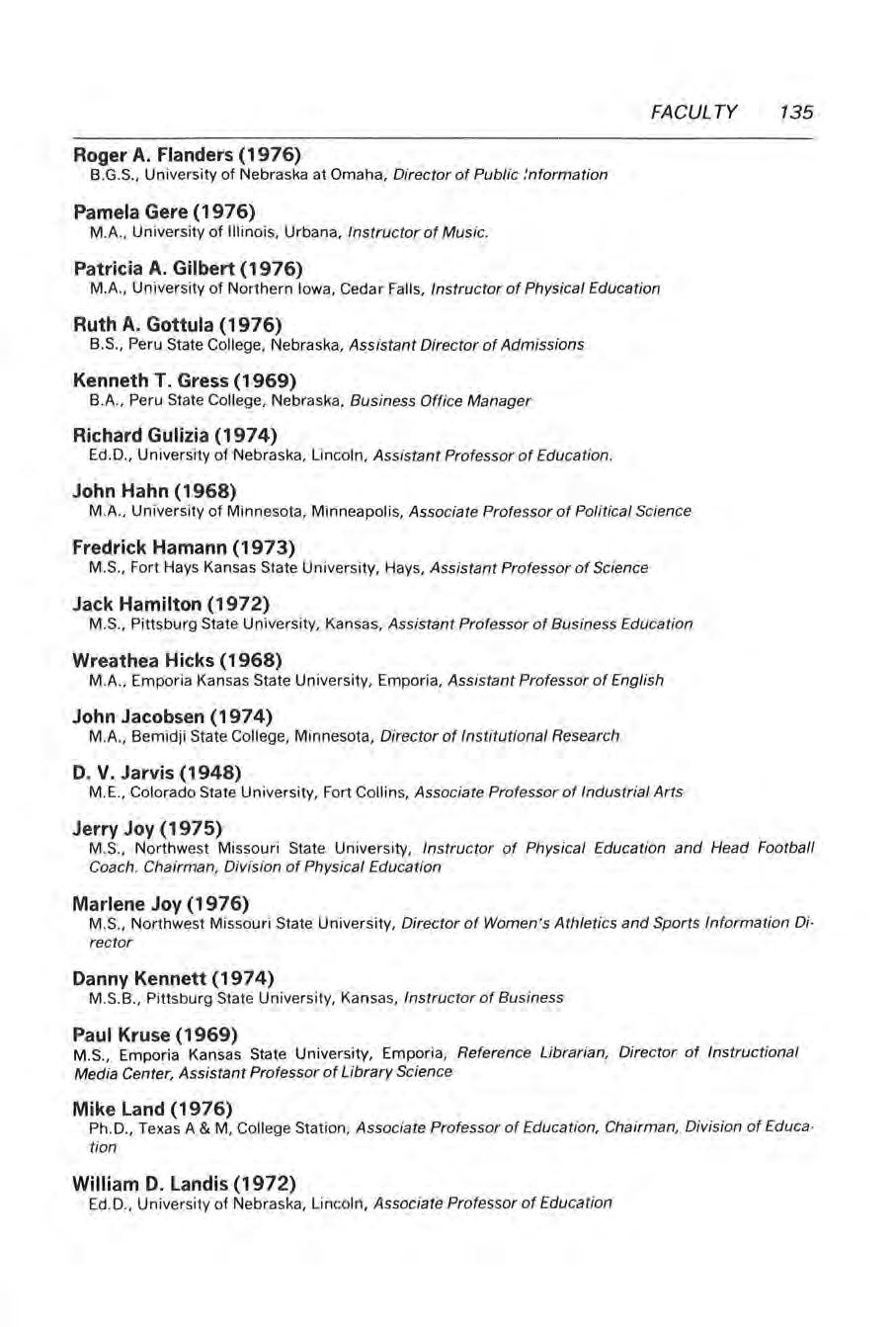
John Jacobsen (1974)
M .A., Bemidji State Co ll ege, Minnesota, Director of Institutional Research
D. V. Jarvis (1948)
M.E., Colorado State University, Fort Collins, Associate Professor of Industrial Arts
Jerry Joy (1975)
M S., Northwest Missouri State University , Instructor of Physical Education and Head Football Coach. Chairman, Division of Physical Education
Marlene Joy (1976)
M.S., Northwest Missouri State University, Director of Women's Athletics and Sports Information Director
Danny Kennett (1974)
M.S.B. , Pittsburg St ate Univer si ty, Kansas, Instructor of Bu s iness
Paul Kruse (1969)
M.S ., Emporia Kansas State University, Emporia, Reference Librarian, Director of Instructional Media Center, Assistant Professor of Library Science
Mike Land (1976)
Ph D., Te xas A & M, Co ll ege Station , Asso c iate Professor of Education, Chairman, Division of Education
William D. Landis (1972)
Ed . D., Univer sity of Nebraska, Lincoln, Associate Professor of Education
Robert Lewellen (1972)
M.S., Northwe st Missouri State University, Maryville, Assistant Professor of Business Administration
Kelly Liewer (1968)
Ed.D., University of Nebraska, Lincoln, Registrar
Daryl C. Long (1967)
Ph.D., University of Nebraska, Lincoln, Associate Professor of Science
Sharon Mccaslin (1971)
M L., Emporia Kansas State University, Emporia, Assistant Librarian

Stanley Mccaslin (1971)
M .S., California Institute of Technology , Pasadena, Director of Data Processing
Lyle C. McKercher (195 9 )
M.S ., University of Iowa, Iowa City, Associate Professor of Mathematics
Michael McKibbin (1975)
M.S., University of Wisconsin - Stout, Instructor of Industrial Arts.
Donald Miller (1969)
M.S ., Kansas State University, Manhattan, Director of Financial Aid, Instructor of Educational Psychology
Virginia Miller (1970)
S.S., Peru State College, Nebraska, College Nurse
John T. Pardeck (1974)
M A., Central Missouri State University, Warrenburg, Instructor of Social Work
Douglas W. Pearson (1973)
Ph.D., Higher Education Administration, George Peabody College, Nashville, Tennessee, President
Ervin R. Pitts(1964)
Ed.D., University of Mi sso uri, Columbia, Head Golf Coach, Professor of Health and Physical Education
Steven J. Quade (1976)
M .B.A ., Mankato State University, Minnesota, Instructor of Business
Paul D. Read (1976)
M.S., Northwest Missouri State, Kirksville, Instructor of Physical Education
Guy L. Rosenberg (1966)
Ph.D., University of Iowa, Iowa City, Director of Student Personnel Services, Associate Professor of Psychology
Lester Russell (1956)
Ed D., University of Nebraska, Lincoln, Professor of Industrial Arts, Chairman, Division of Applied Arts
Jack Scammahorn (1976)
M.A., Central State University, Edmond, Oklahoma Instructor of Physical Education, Head Wrestling Coach
George Schottenhamel (1957)
Ph.D., University of Illinois, Urbana, Professor of History and Social Sciences
Leland H. Sherwood (1963)
Ed.D., Indiana University, Bloomington, Professor of Art, Chairman, Division of Performing Arts
Jack Stewart (1975)
M S , University of South Dakota, Instructor of Physical Education, Head Basketball Coach.
Michael 0. Stewart (1974)
Ph.D ., Kansas State University, Manhattan, Vice-President for Administration
PaulF.Stubbe(1976)
M.S , Kearney State College, Nebraska, Dean of Student Services

Evan Van Zant (1961)
M.A ., University of Nebraska, Lincoln, Associate Professor of Education
Scott J. Williams (1966)
M.A , Arizona State University, Tempe, Assistant Professor of Geography
Gilbert E. Wilson (1957)
D. M.A., University of Missouri, Kansas City, Director of Musical Activities, Professor of Instrumental Music
Mary Ruth Wilson
M A., Peru State College, Nebraska, Assistant Professor of English and Speech, Director of Continuing Education
PHYLLIS DAVIDSON (1929-1957
EDNA WEARE (1929· 1957)
Professor of Women's Physical Education
Professor of Home Economics
L. B MATHEWS ( 1927 • 1961) Professor of Physic s
MARY CLARKE ( 1951 · 1964) Professor of Education
ALFRED G WHEELER (1938.1965) Professor of Health and Physical Education
HAROLD 0 . BORASS ( 1951 · 1966)
Professor of Education Psychology
ROBERT D MOORE (1937 • 1970) Professor of English and Speech
ALMA ASH LEY (1946 · 1970) Professor of Elementary Education
FRIEDA D . ROWOLDT (1952• 1970)
HANFORD MILL ER (1947· 1971 )
HAROLD JOHNSON 1951 · 1972)
Professor of Business Education
Professor of Chemistry
Professor of Education
SILAS SUMMERS (1960· 1972) Professor of English
JOHN C. CHRIST (1947 •1973) Professor of Biology
LUCY HOVEY (1967 · 1973)
NEAL S. GOMON (1950 1973)
LOUISE KREGEL (1957 · 1974)
Professor of Home Economics
President
Assistant Professor of Home Economics
JUAN IT A BRADLEY ( 1956· 1976) Associate Professor of Education
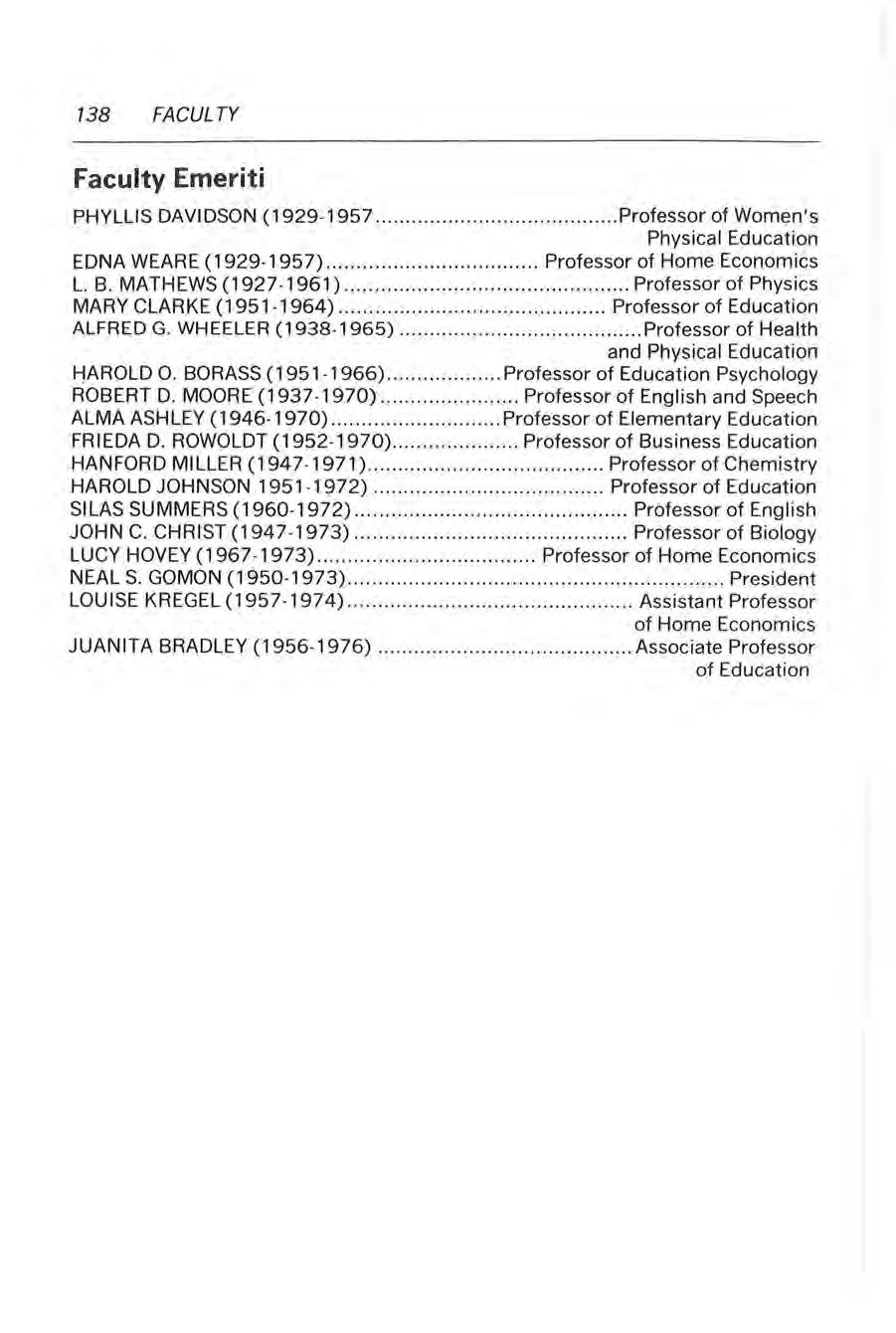
The Council is the representative of the professional staff of the College and is concerned with the general welfare of the professional staff and the students. It establishes and revises all policies related to the internal affairs of the college.
The Commission carries on a continuous study of the instructional program and recommends policy to the College Affairs Council. It is concerned with interschool and interdepartmental coordination and relationships. The various instructional programs are evaluated in terms of accrediting standards and guidelines of national academic association . It evaluates the work and responsibility of its various committees.
The Committee reports regularly to the Academic Affairs Commission and recommends policy to the Commission. It serves in a liaison capacity between the Library and the faculty-student bodies. It advises in regard to the administration of the policies and regulations related to the Library, and makes suggestions regarding the services, the budget, purchases, allocation of funds, accreditation standards, and over-all needs.
The Teacher Education Committee explores and identifies areas needing policy statements Since the responsibility of the Committee is chiefly in academic affairs, the Commission on Academic Affairs is advised of all recommendations that will be made to the College Affairs Council. It formulates these policies and recommends them to the College Affairs Council. The Committee is authorized to delegate some of its responsibilities, such as Admission to Teacher Education, to a subcommittee.
The Commission recommends policy to the College Affairs Council. It interprets the philosophy and policy to students, faculty, parents, and the public. It provides for the centralized administration and coordination of all student personnel functions. The Commission serves as an appeal of hearing body on decisions related to non-academic matters of the student. The Commission shall advise the Director of Financial Aid, as he requests, in the administration of Financial Aids and awards scholarships which are available.
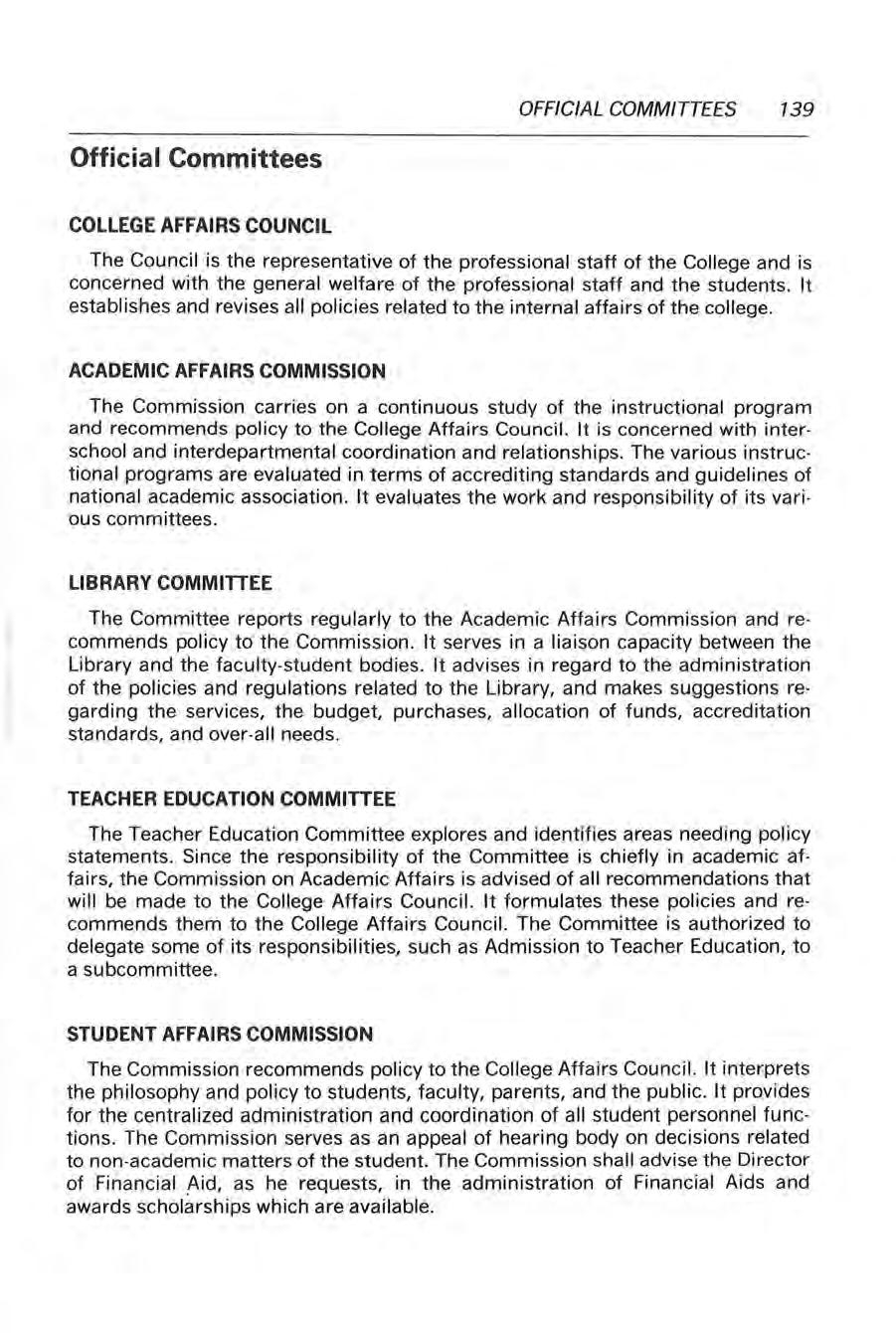
The Committee shall act independently of the Student Center Board , and i s answerable only to the President of the College and the Board of Trustee s . It is th e responsibility of this Committee to provide for college , social , cultural, and recreational programs using money derived from the Student Progr a m fees.
The member s hip of the committee representing the Faculty As sociation consists of the Executive Committee of the Association. The Chairman of the Executive Council is the chairman of this committee. The Committee concerns itself with both academic and personnel matters of the faculty and reports to either the Academic Affairs Commission or the College Affairs Council. The Faculty Association has the responsibility of assisting with the orientation of new faculty members, and assisting in the evaluation of objectives, policies, and with the profe ssional growth and development of faculty member s.
COO PERAT IN G SC HOOLS in Th e St udent T ea chin g Progra m
1976 -1977
Auburn Albert C Austin, Superintendent
Principal: Marvin H. Gerdes
Beatrice Robert Cothren, Superintendent
Assistant Superintendent: W. A. Schlichting
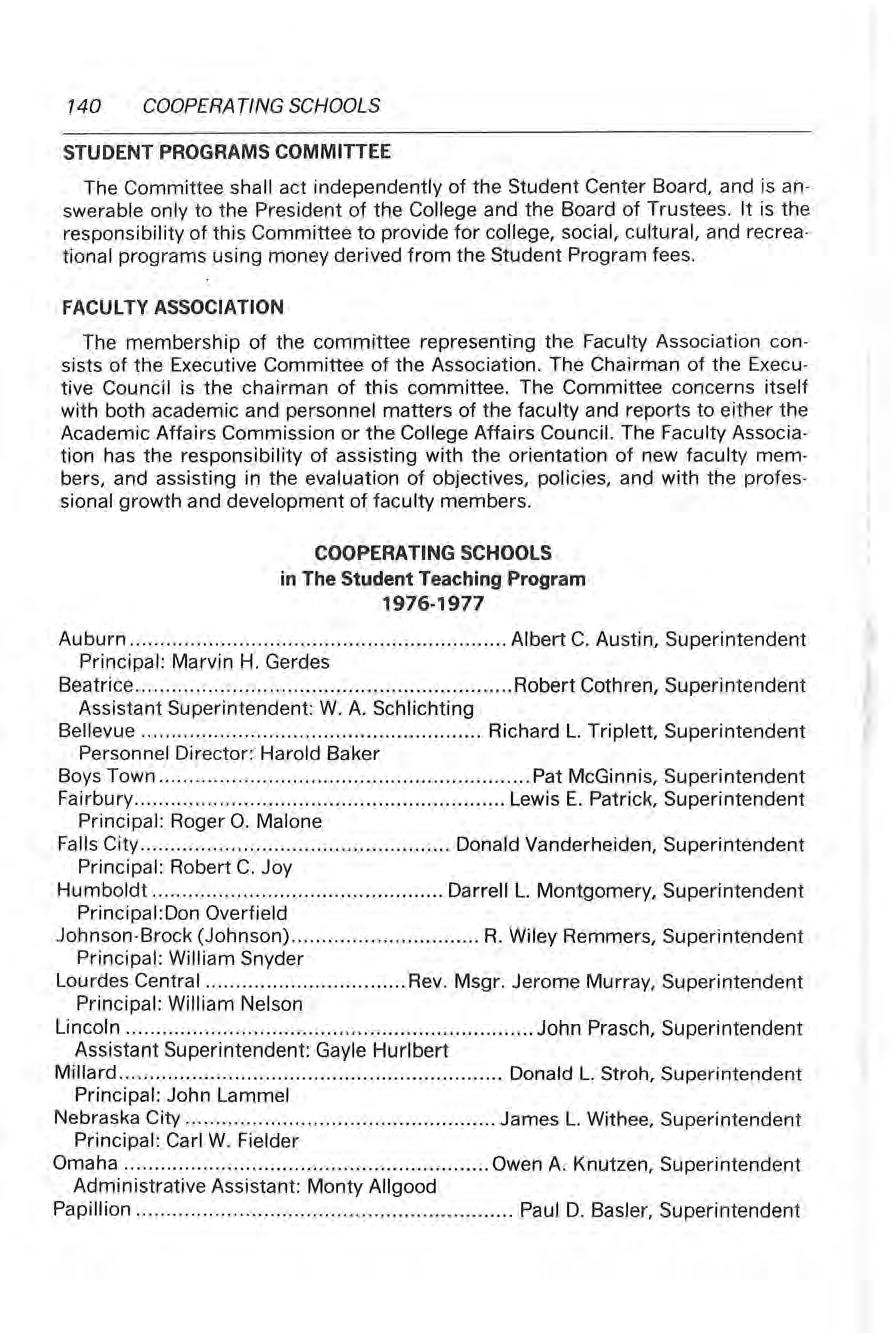
Bellevue Richard L. Triplett, Superintendent
Personnel Director: Harold Baker
Boy s Town Pat McGinnis, Superintendent
Fairbury Lewis E. Patrick, Superintendent
Principal: Roger 0. Malone
Falls City Donald Vanderheiden, Superintendent
Principal: Robert C. Joy
Humboldt Darrell L. Montgomery, Superintendent
Principal:Don Overfield
Johnson -Brock (Johnson) R. Wiley Remmers, Superintendent
Principal: William Snyder
Lourdes Central Rev Msgr Jerome Murray , Superintendent
Principal: William Nelson
Lincoln
Assistant Superintendent: Gayle Hurlbert
...... John Prasch, Superintendent
Millard Donald L. Stroh, Superintendent
Principal: John Lammel
Nebraska City James L. Withee, Superintendent
Principal: Carl W Fielder
Omaha Owen A. Knutzen, Superintendent
Administrative Assistant: Monty Allgood
Papillion .. .. .. .. .... ...... ...... .. ........ ........ .................... Paul D. Basler, Superintendent
Principal: Keith G. Pollard
Pawnee City Alvin Nelsen, Superintendent
Principal: Max Martin
Plattsmouth ........................................... . .......... Fred J. Kaufman, Superintendent
Principal: John J. Beck, Jr
Ralston Brice Stallard, Superintendent
Principal: Lonnie Bernth
Southeast Nebraska (Stella) Allan Lavigne, Superintendent
Principal: W. A. Hladik
Springfield (Platteview)
Principal: Louis V. Dambrosia
Oscar Mussman, Superintendent
Syracuse•Dunbar•Avoca (Syracuse) ............. . ..... Donald W. Craig, Superintendent
Principal: John Rhodus
Tecumseh .. .. . . ............................ . ....... Richard A. Brommer, Superintendent
Principal: Dean Stewart
Westside (Omaha) H Vaughn Phelps, Superintendent
Assistant Superintendent: William Hoyt

Farragut, Iowa .................................... ... . . ............ Leo Humphrey, Superintendent
Principal: C. N. Heaton
Femont·Mills, Iowa (Tabor)
Principal: Larry Psannebecker
Glenwood, Iowa
Principal: Robert Blasi
Hamburg, Iowa
Principal: Clarence Devine
Arnold Hjelle, Superintendent
Eugene Nasalnoad, Superintendent
R. F. Leland, Superintendent
Lewis Central, Iowa (Council Bluffs) ........................
Principal: Clarence E. Miles
Shenandoah, Iowa .................... .. ................ .. . .. .. . ...
Principal: Alvin S. Carlson
Sidney, Iowa .. ....... . ....... . ........................................
Principal: Duane Ridnour
Rock Port, Missouri
Principal: Gerald W. Shineman
James Smith, Superintendent
Larry Seckels, Superintendent
Eugene Hess, Superintendent
Frank Rybnick, Superintendent
Educational Service Unit No. 4, Auburn ... . ................
Kenneth Gardner, Director
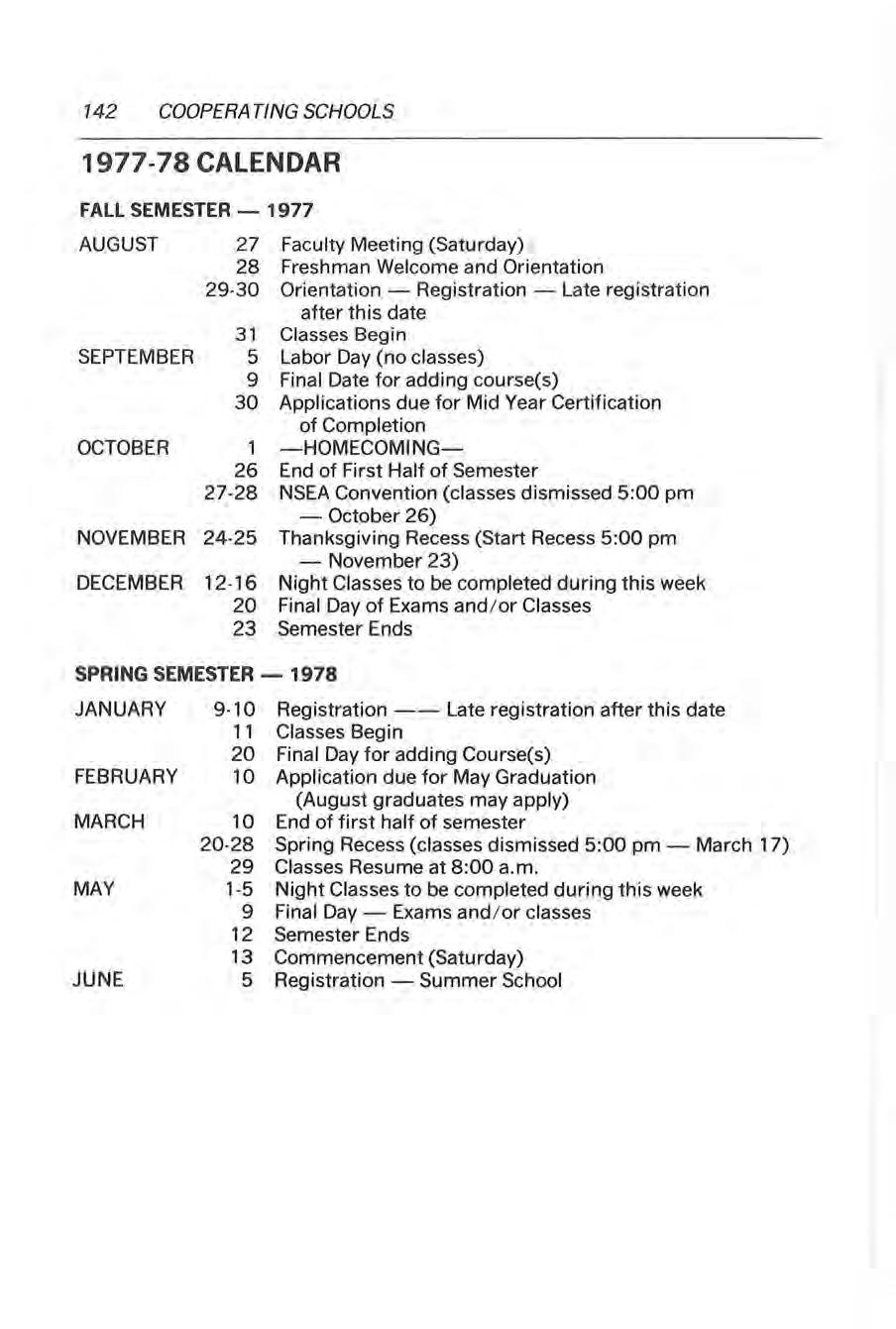
FALL SEMESTER - 1977
AUGUST 27
SEPTEMBER
NOVEMBER
DECEMBER
SPRING SEMESTER - 1978
JANUARY
